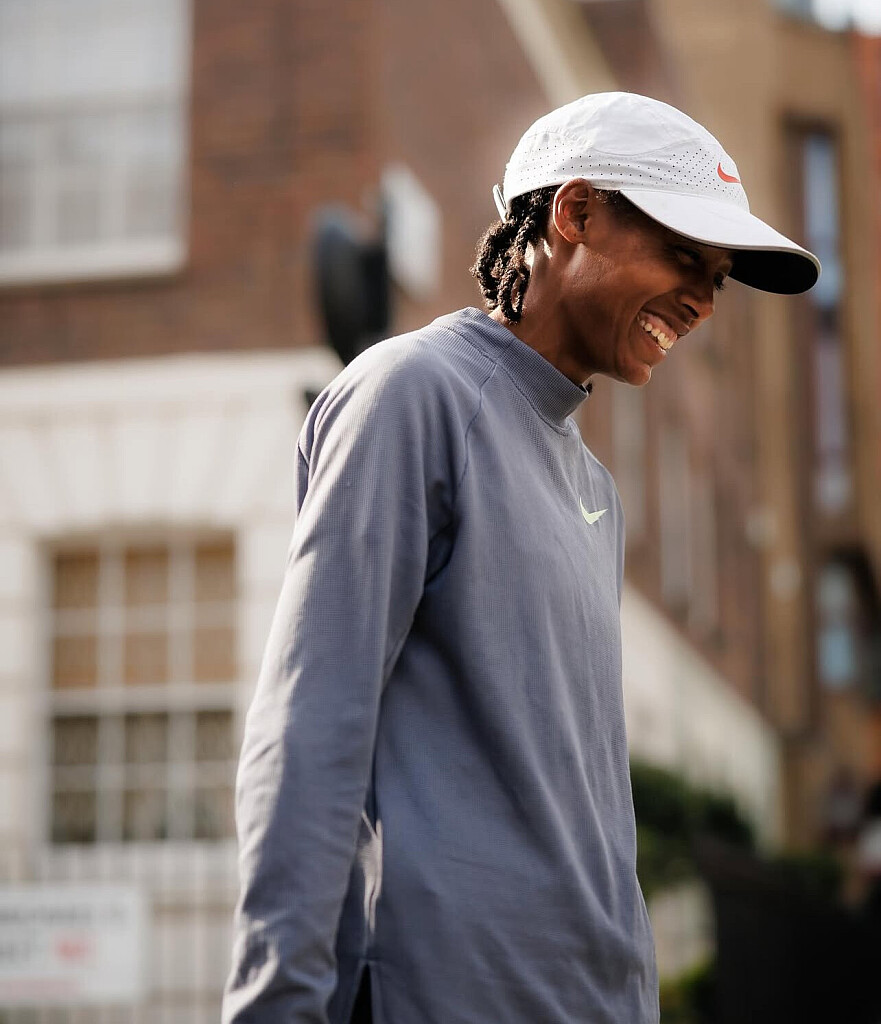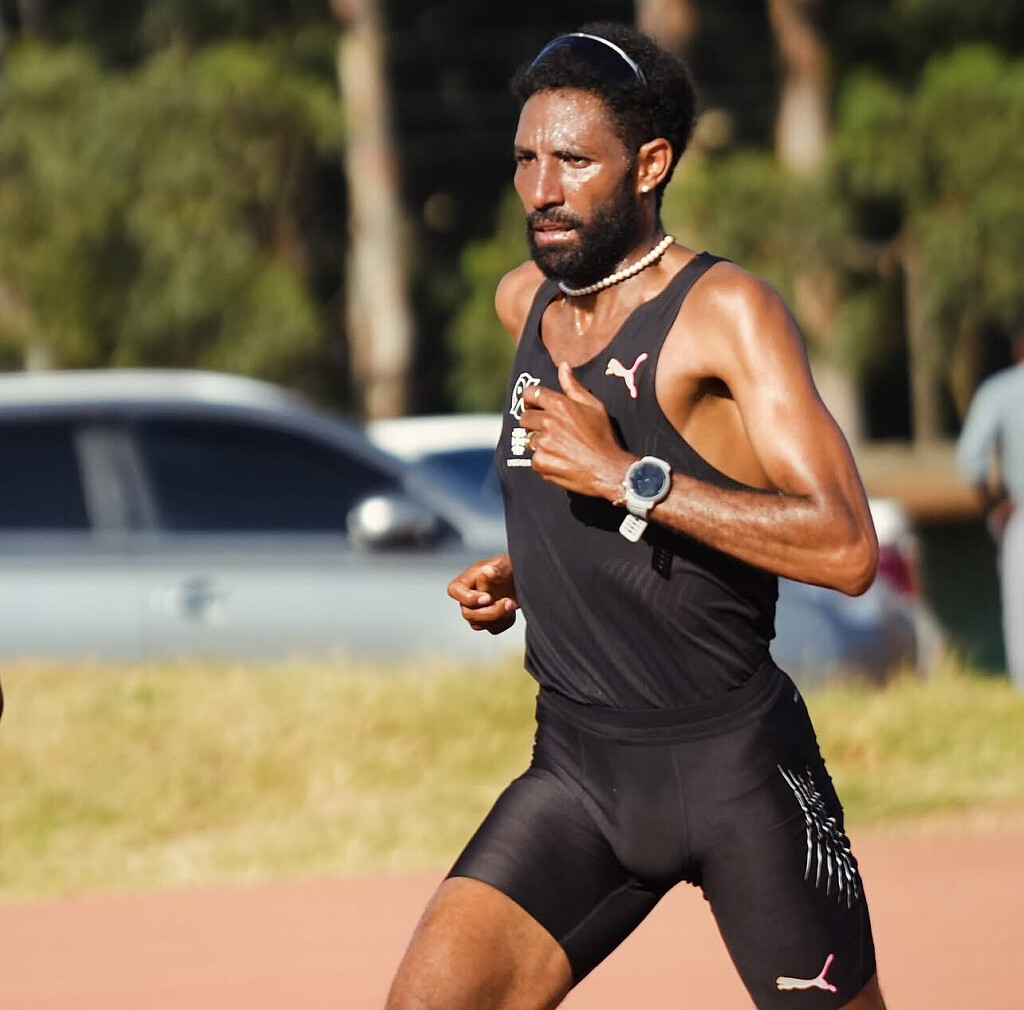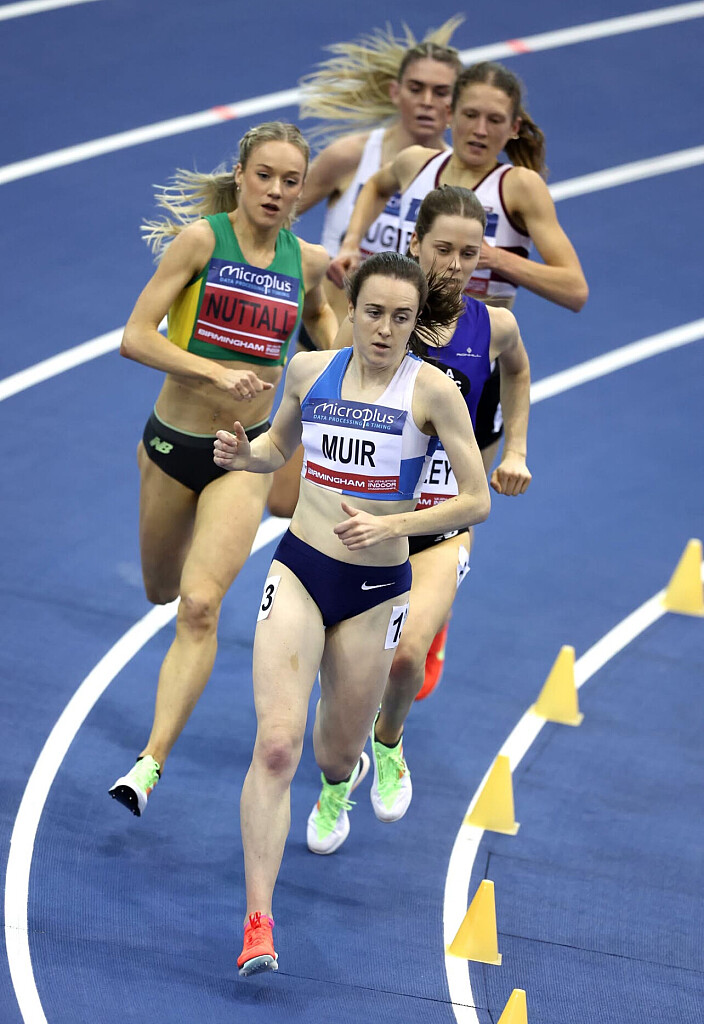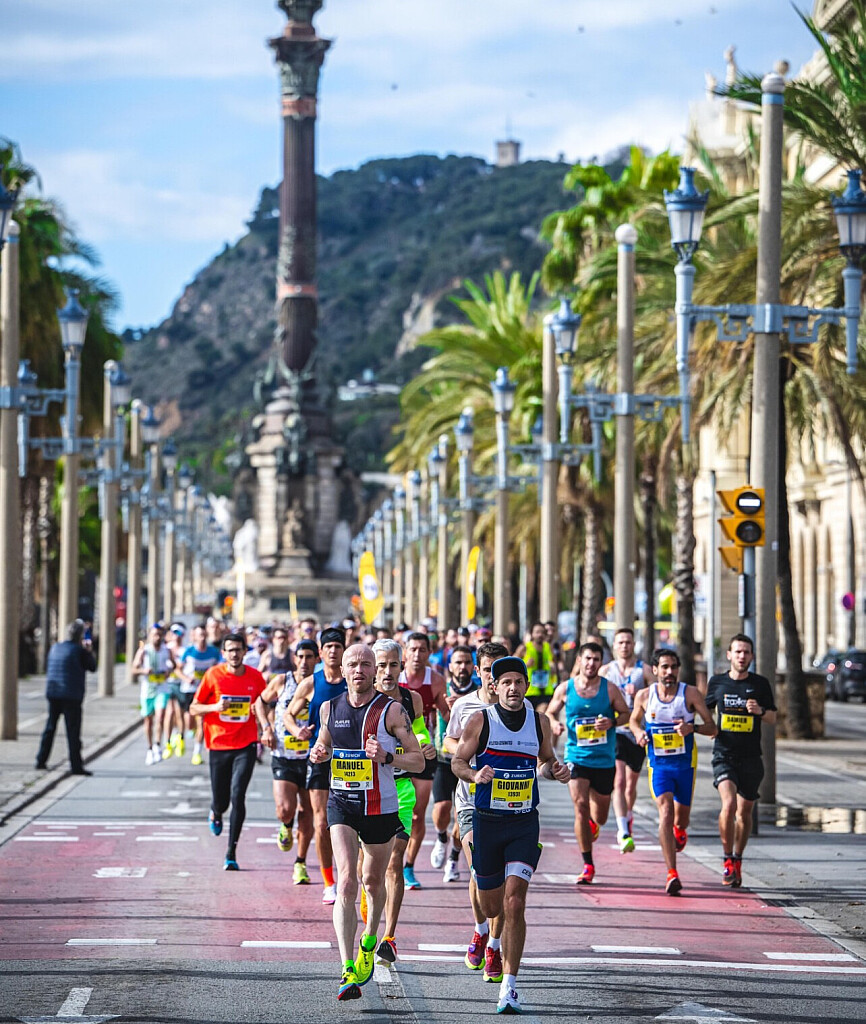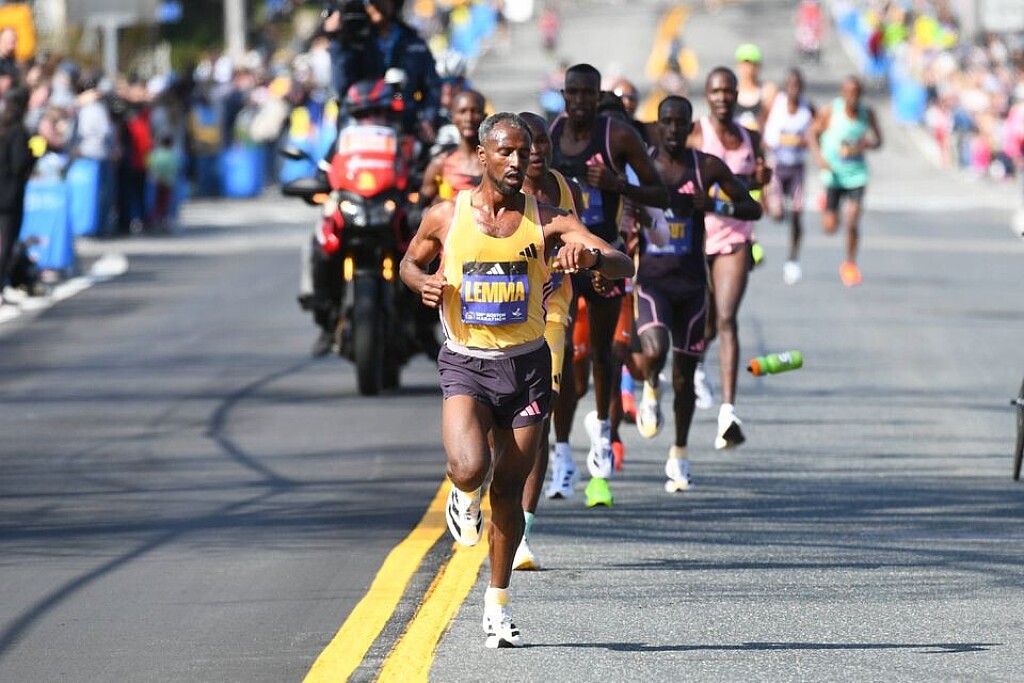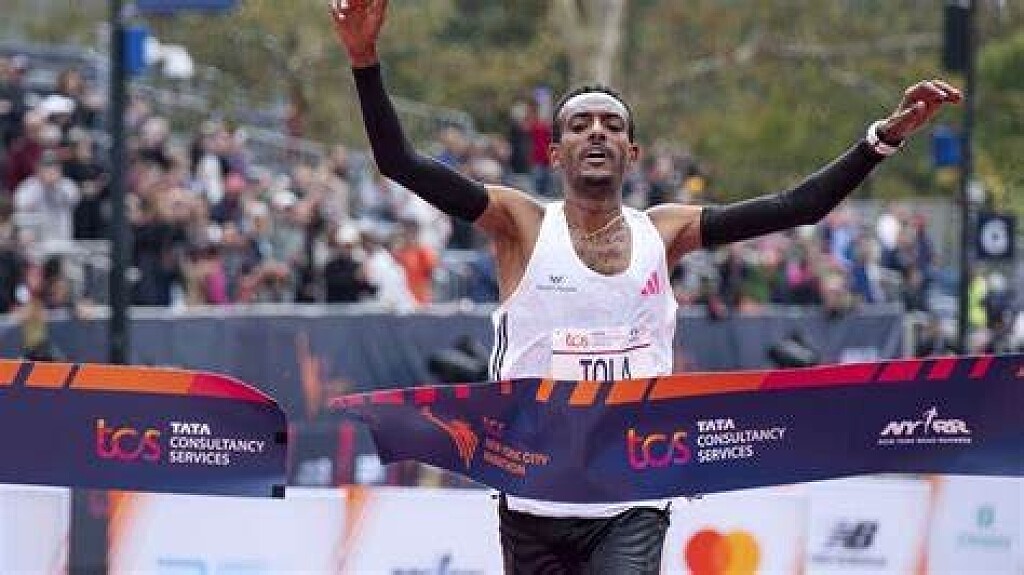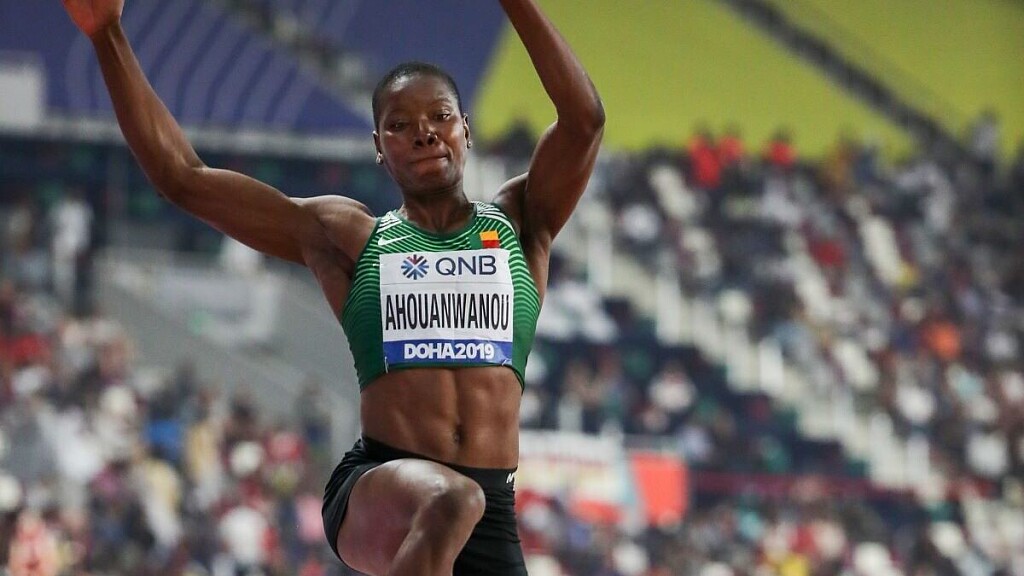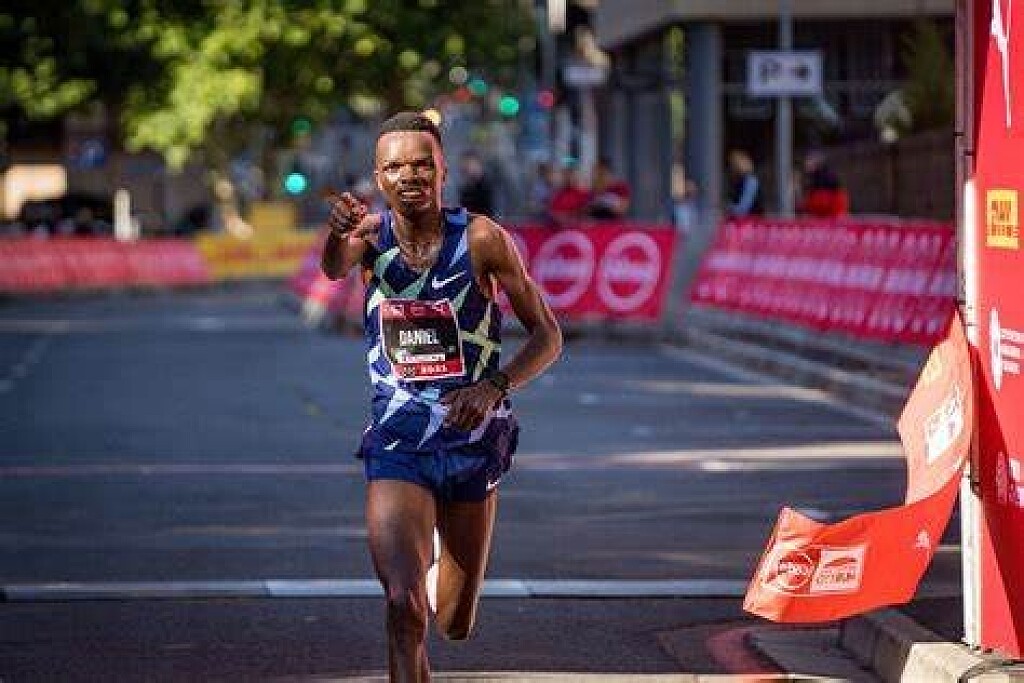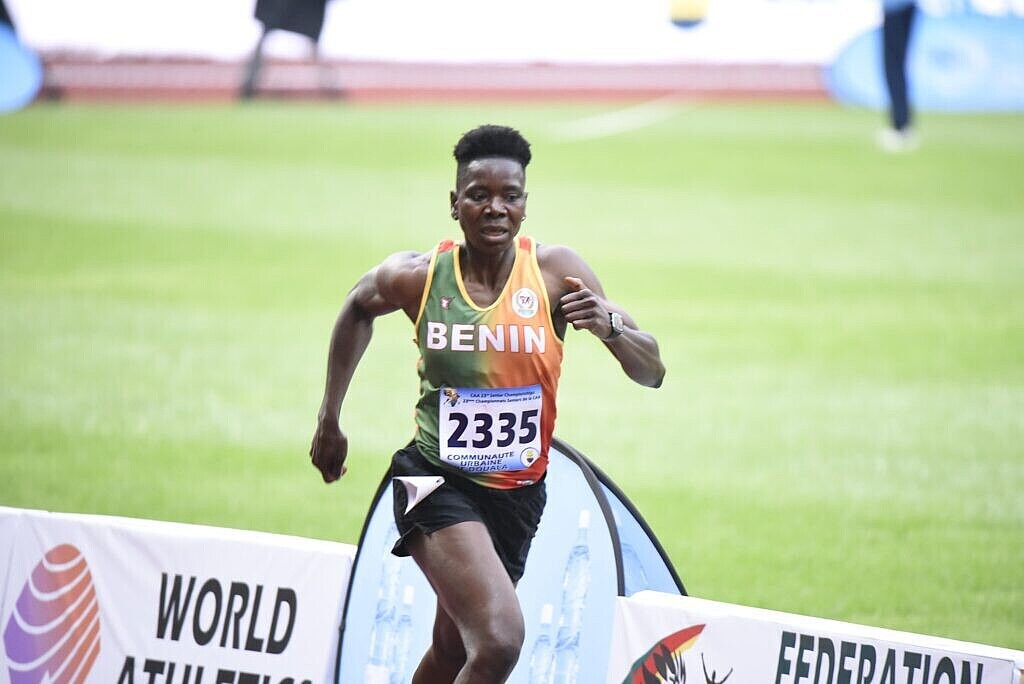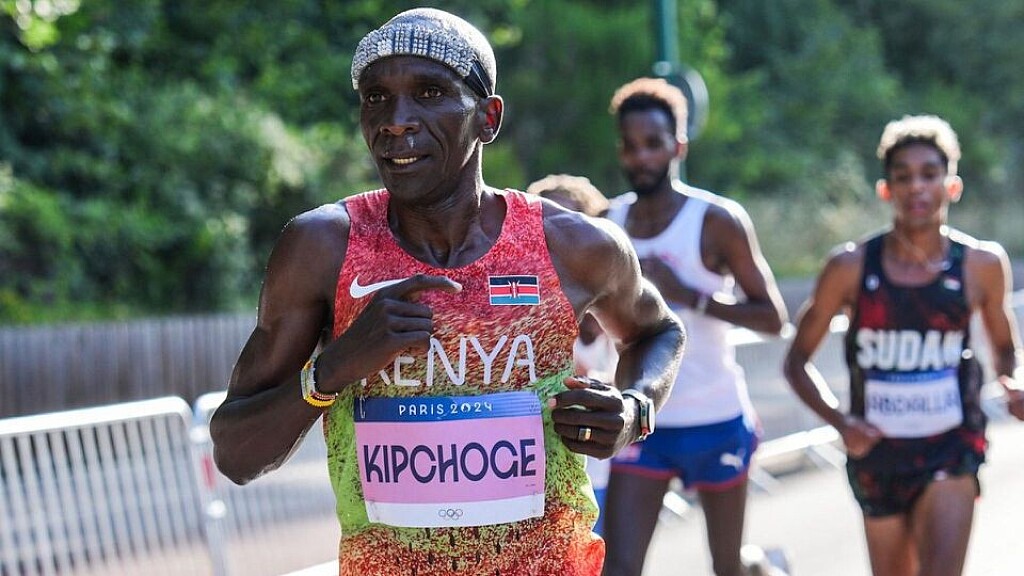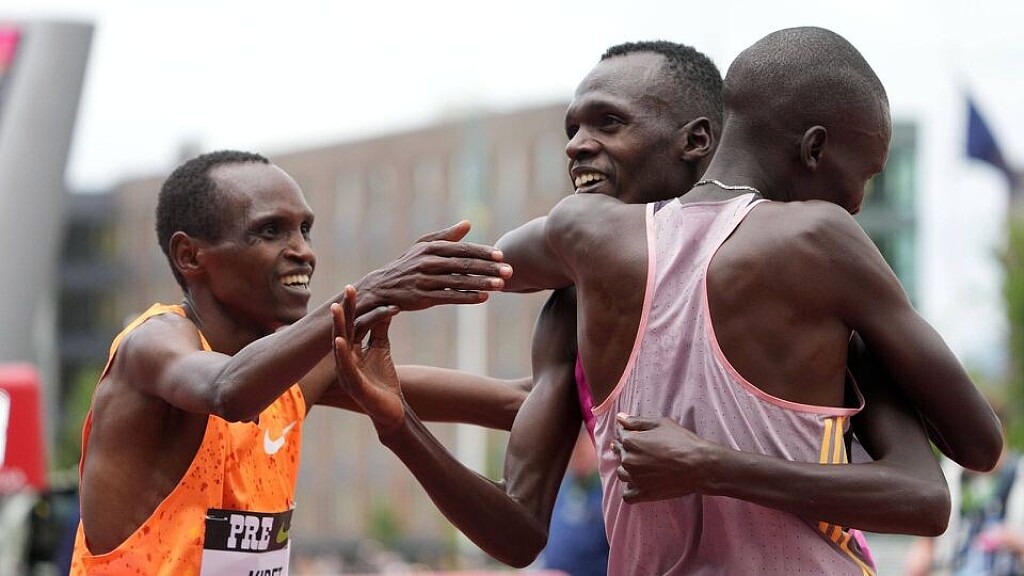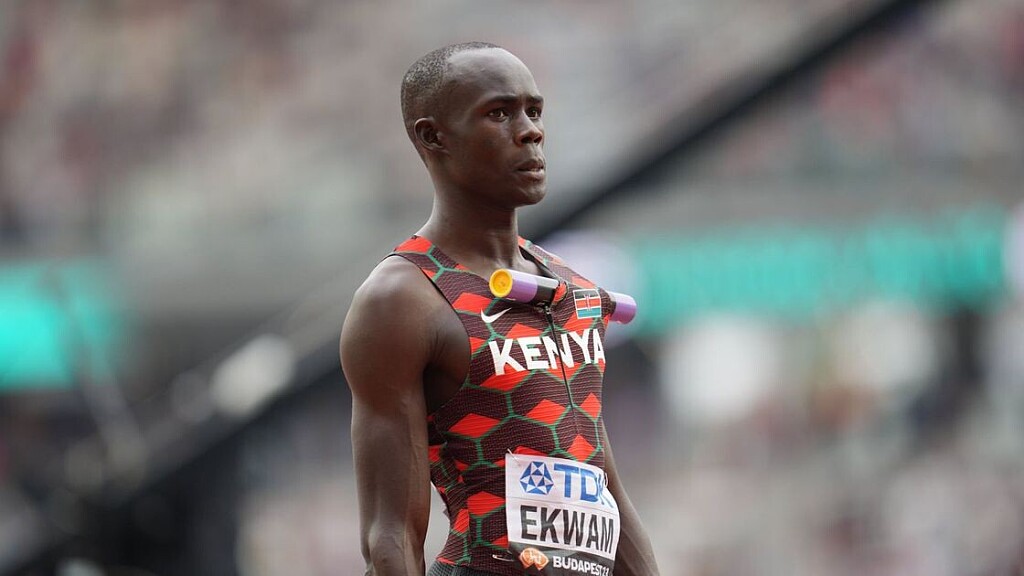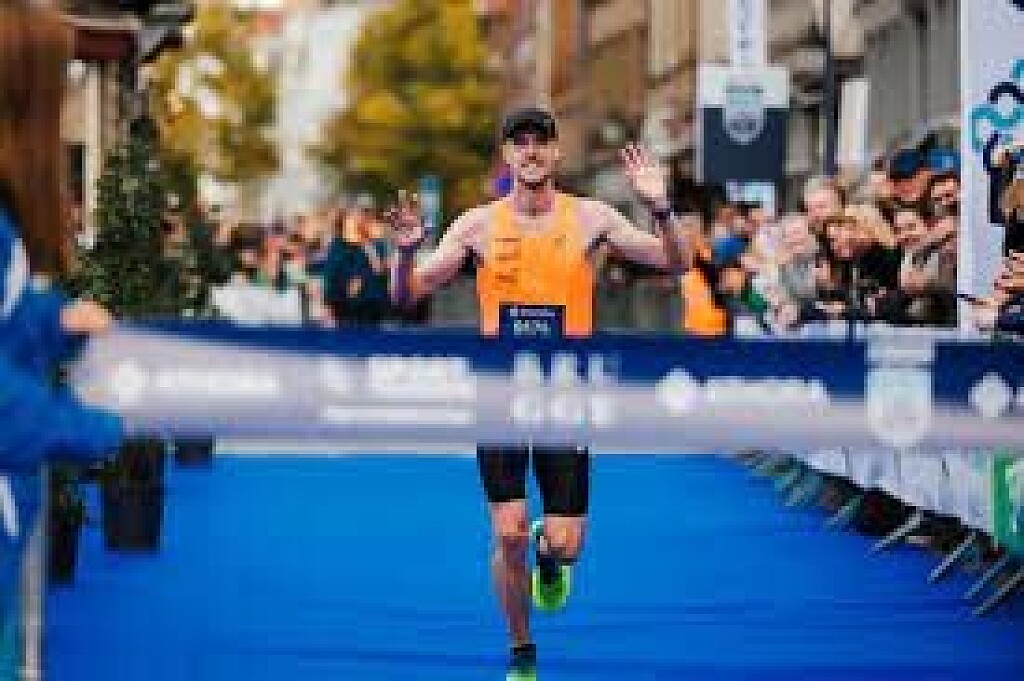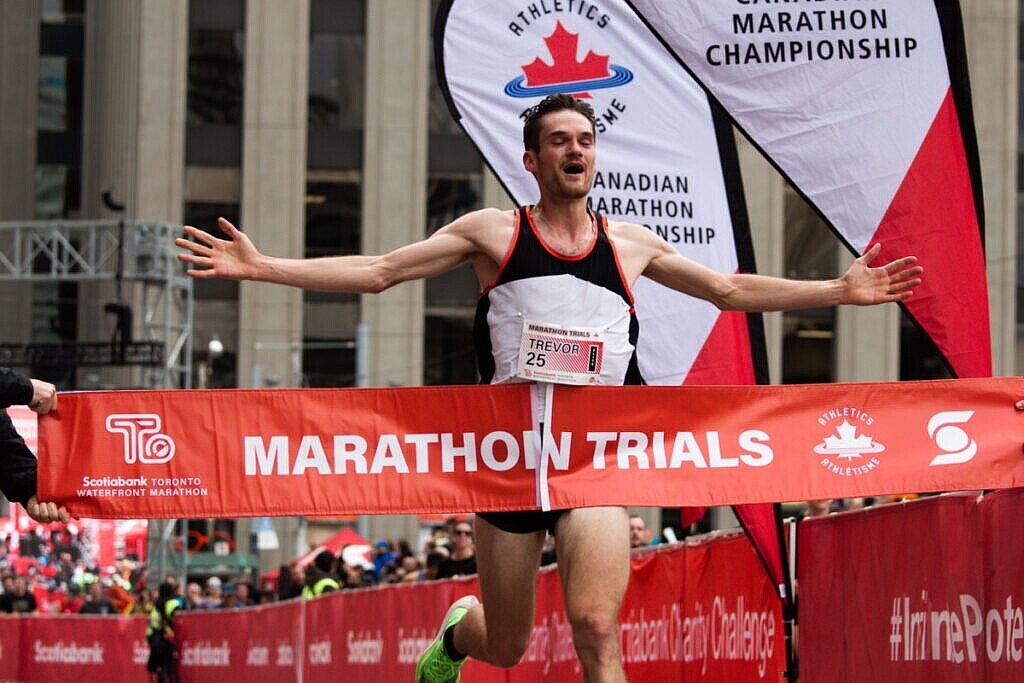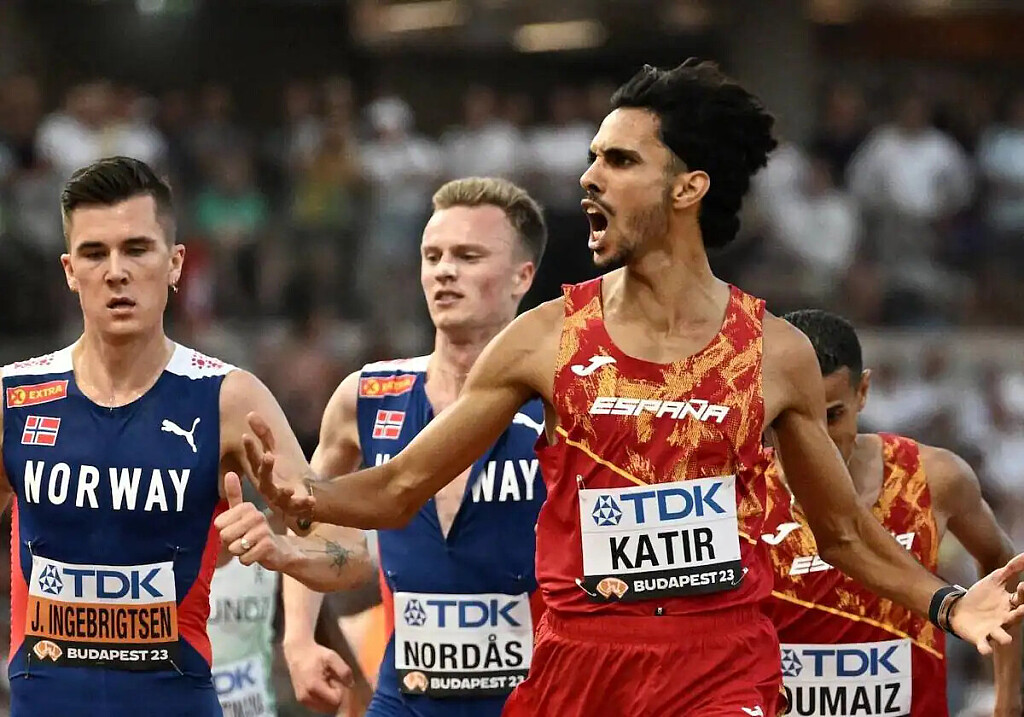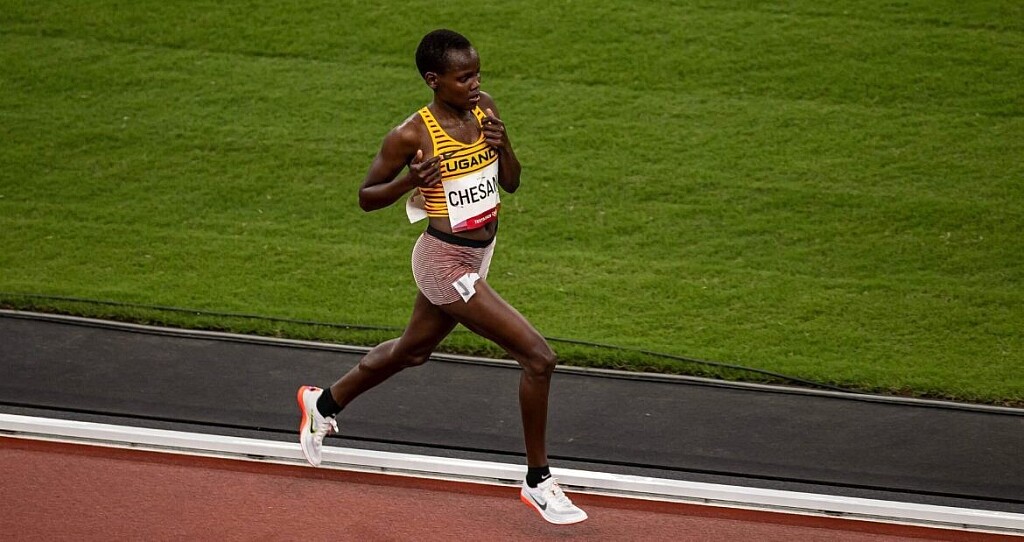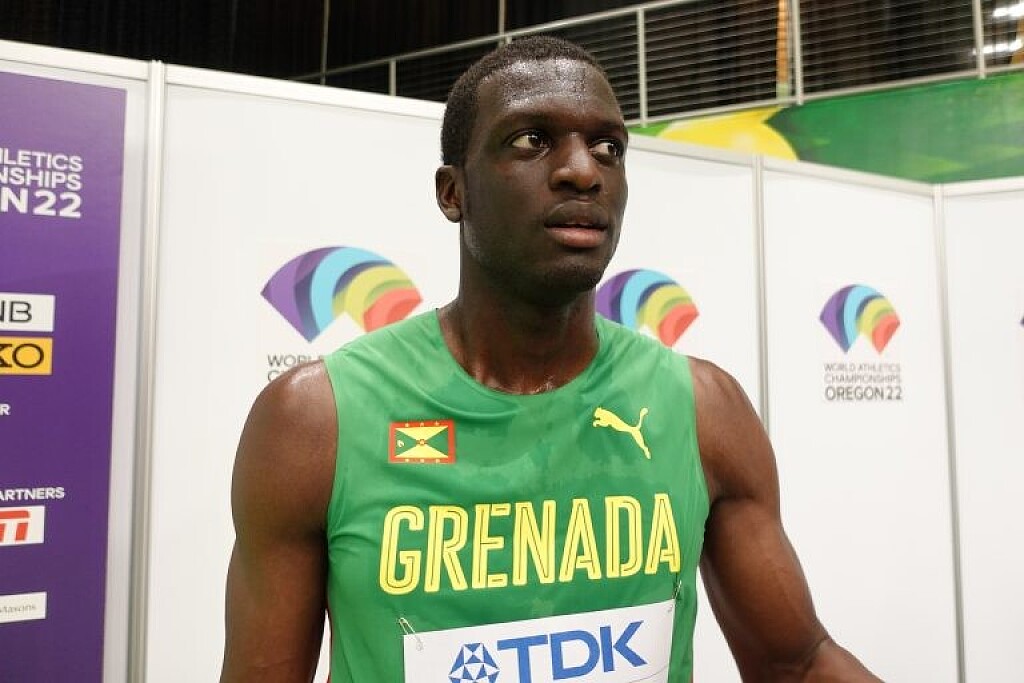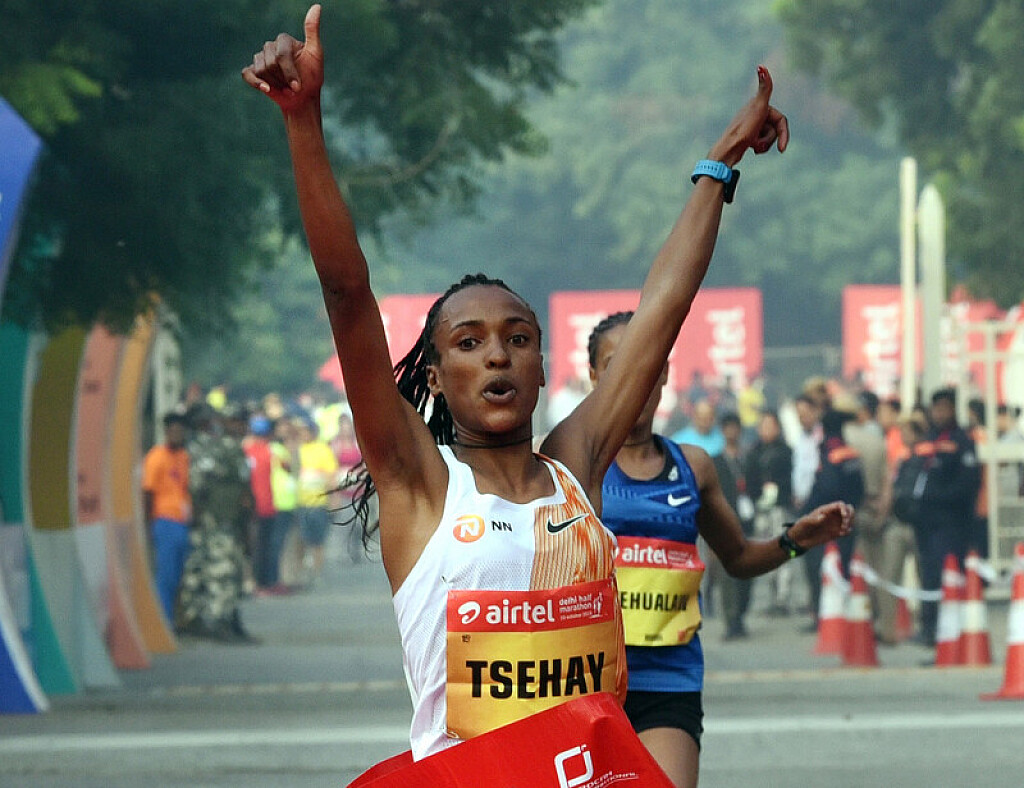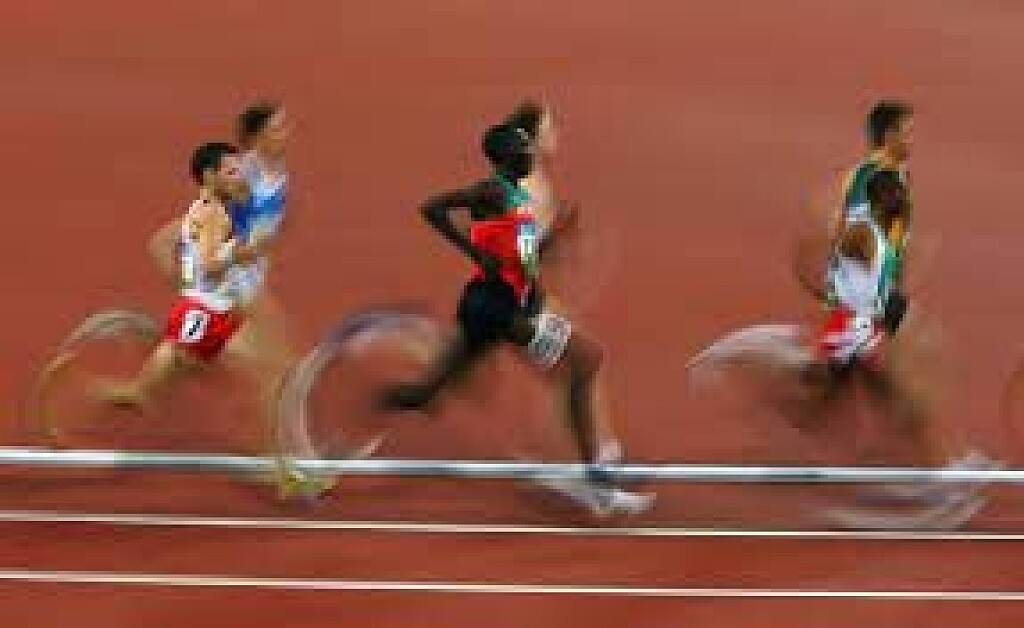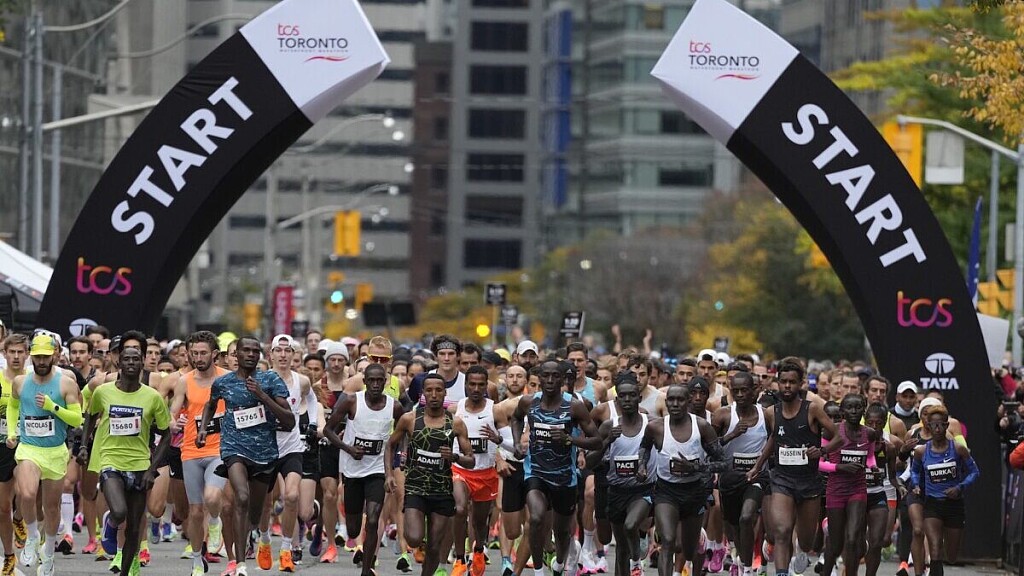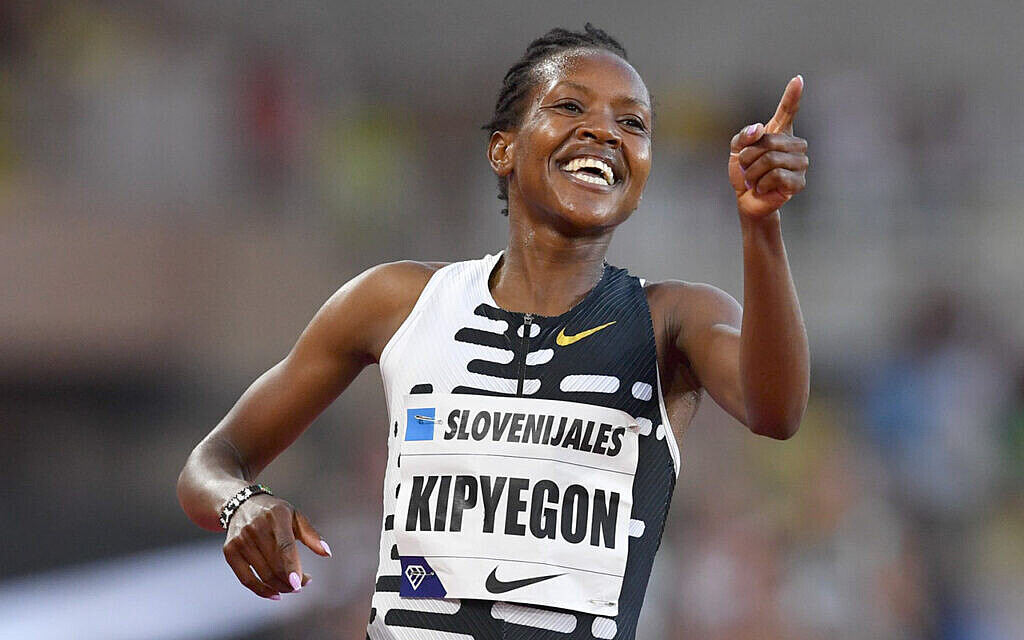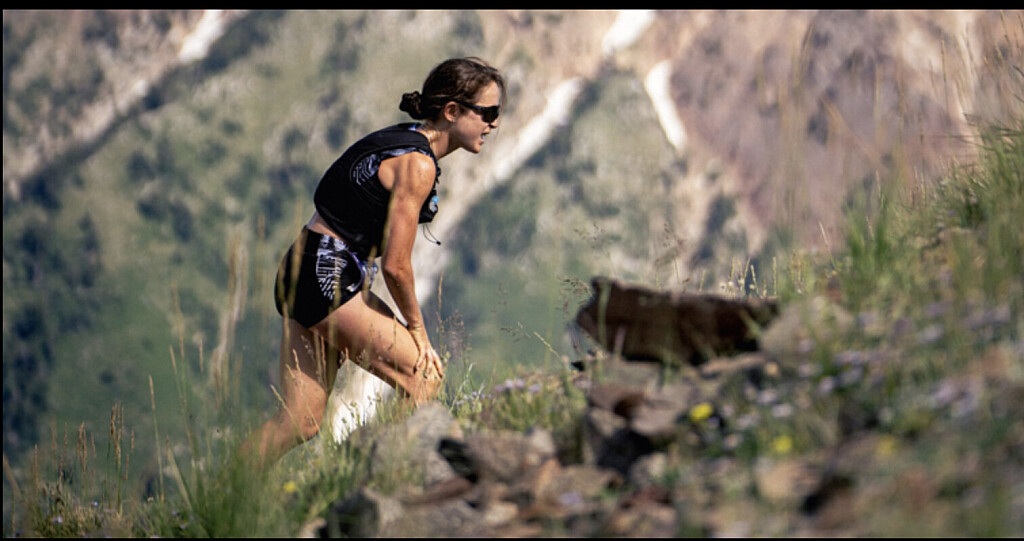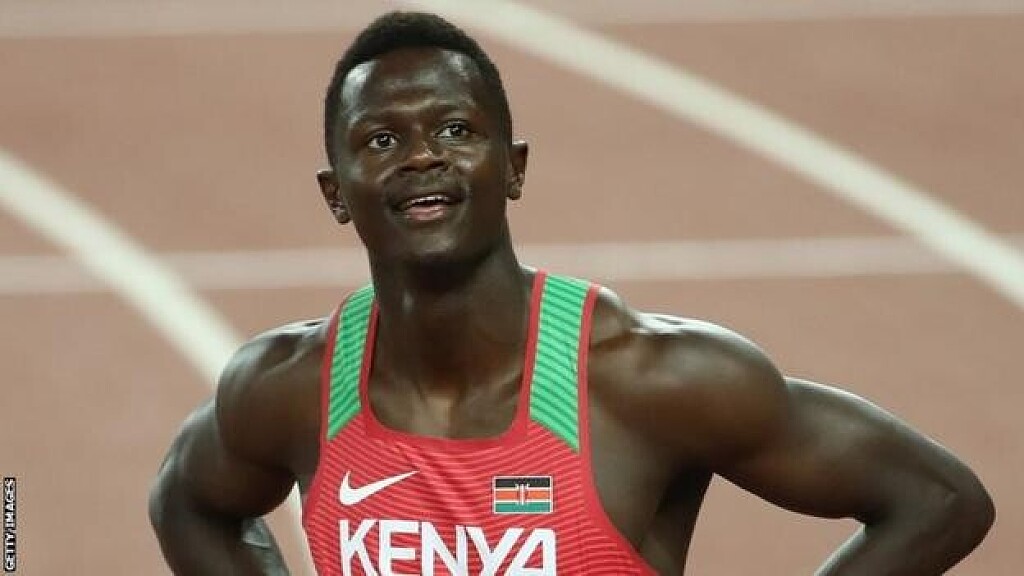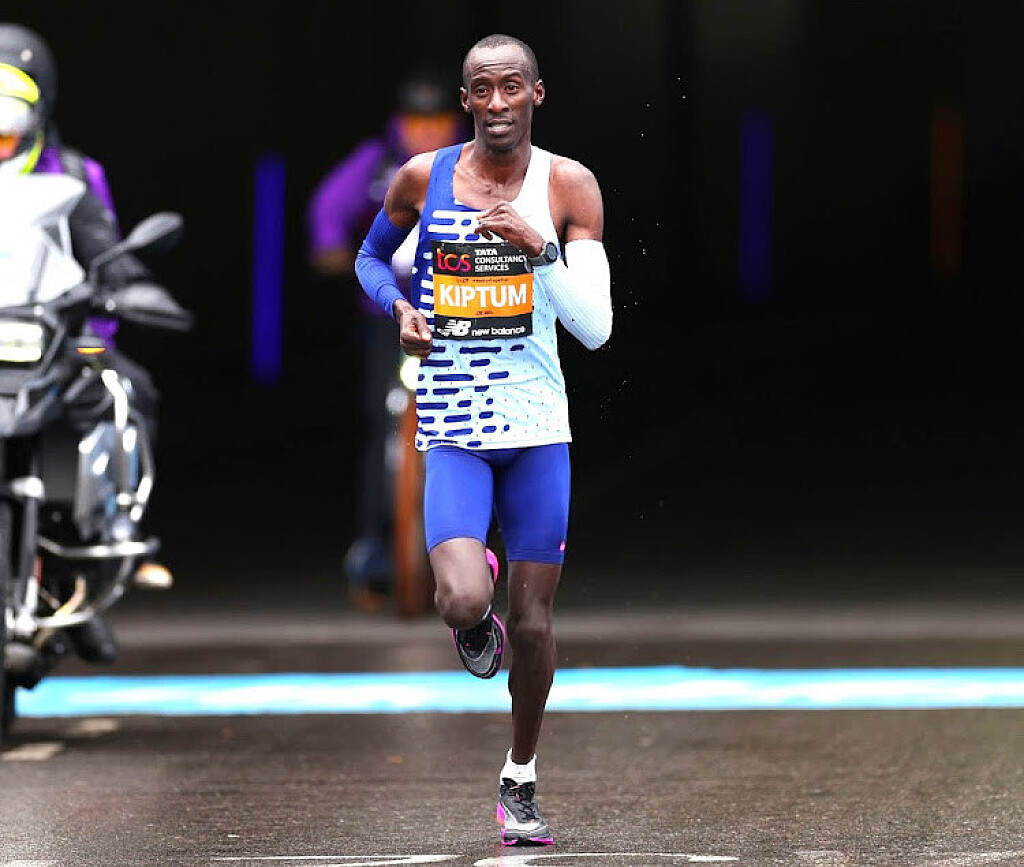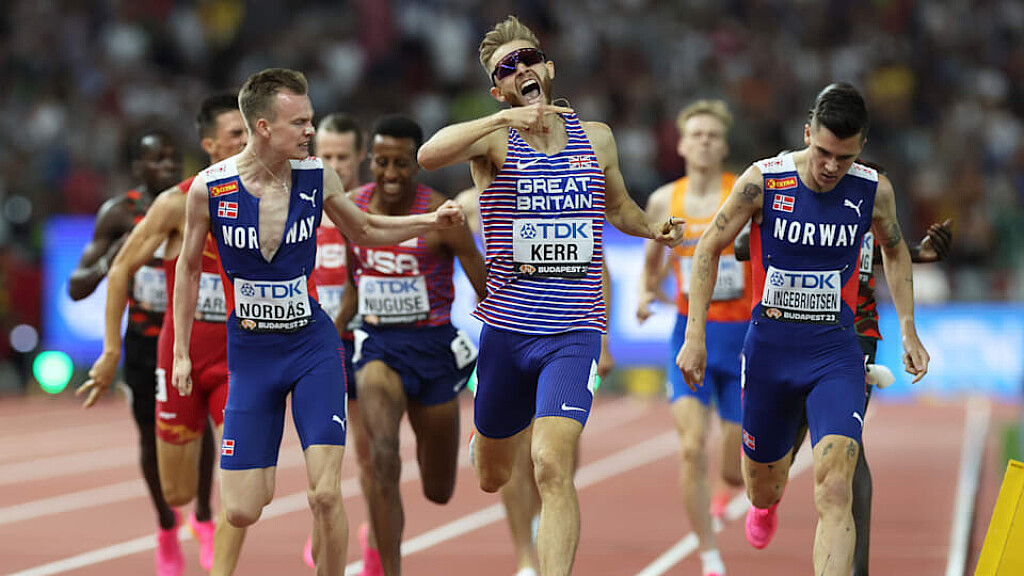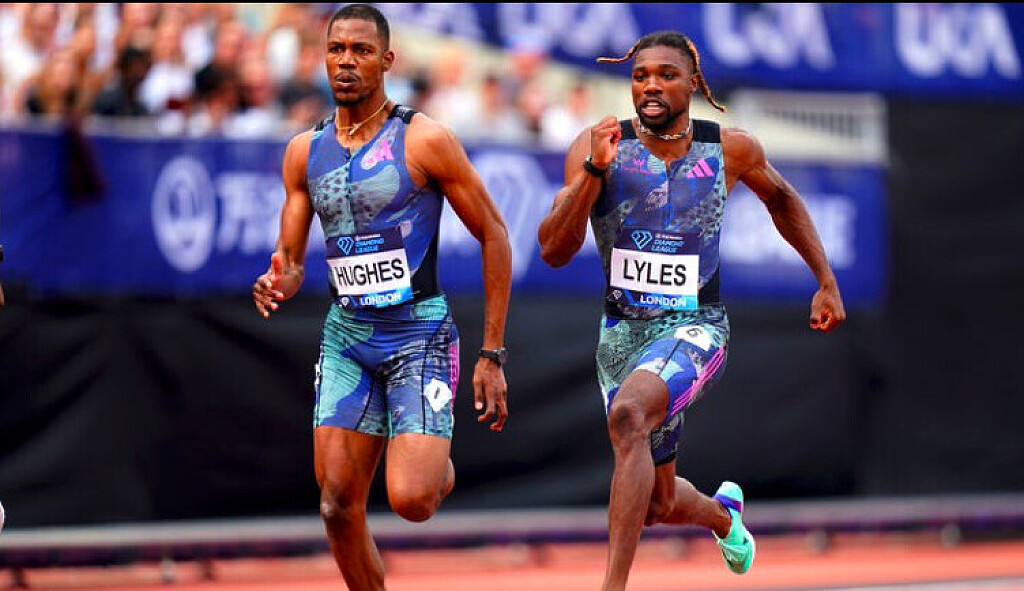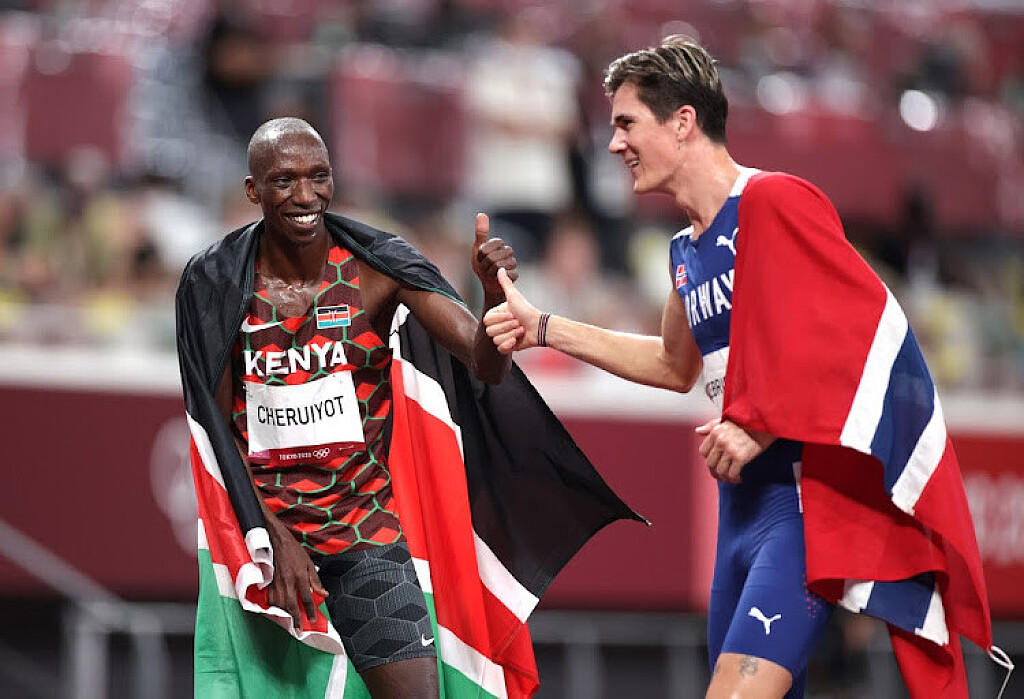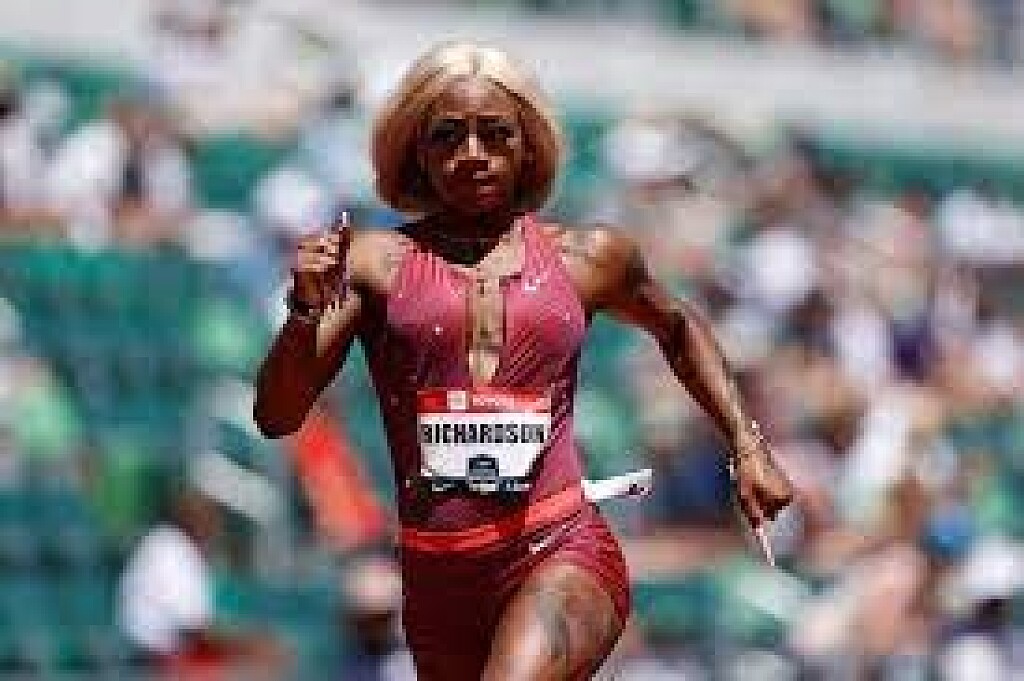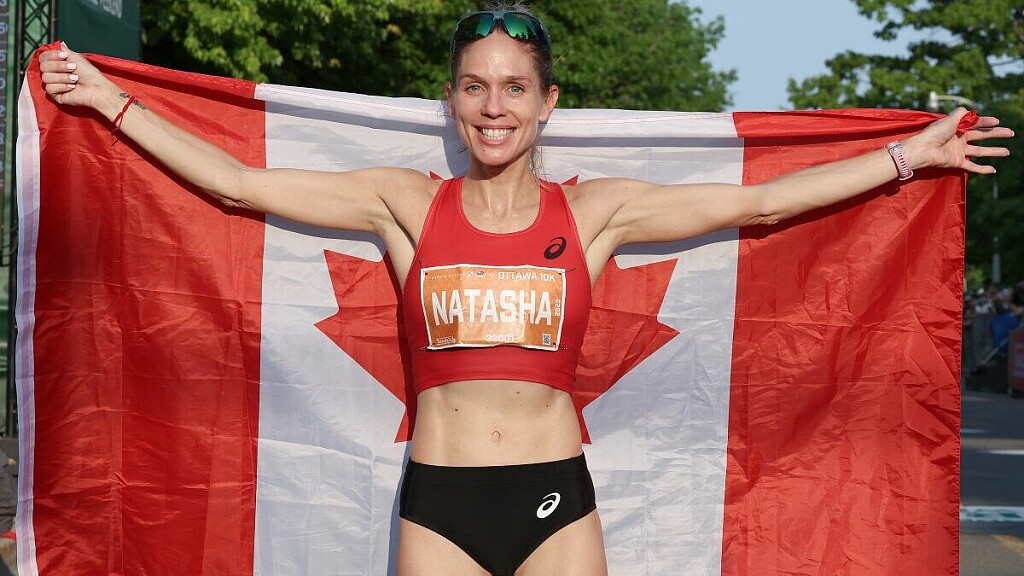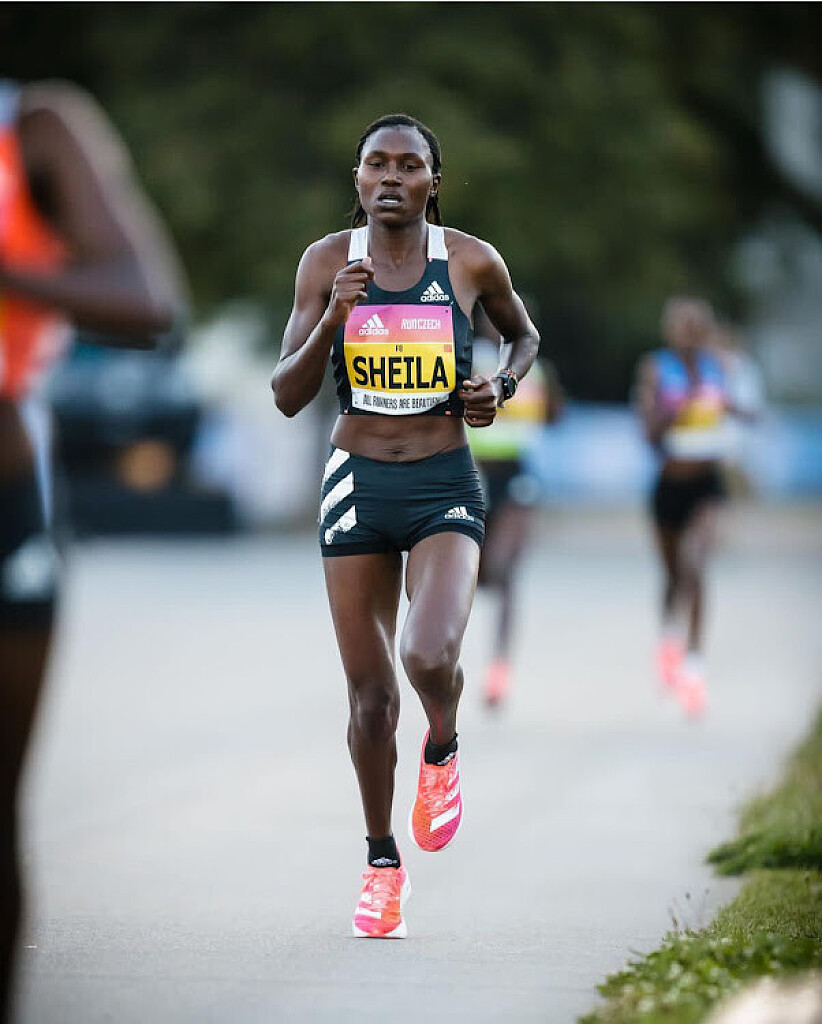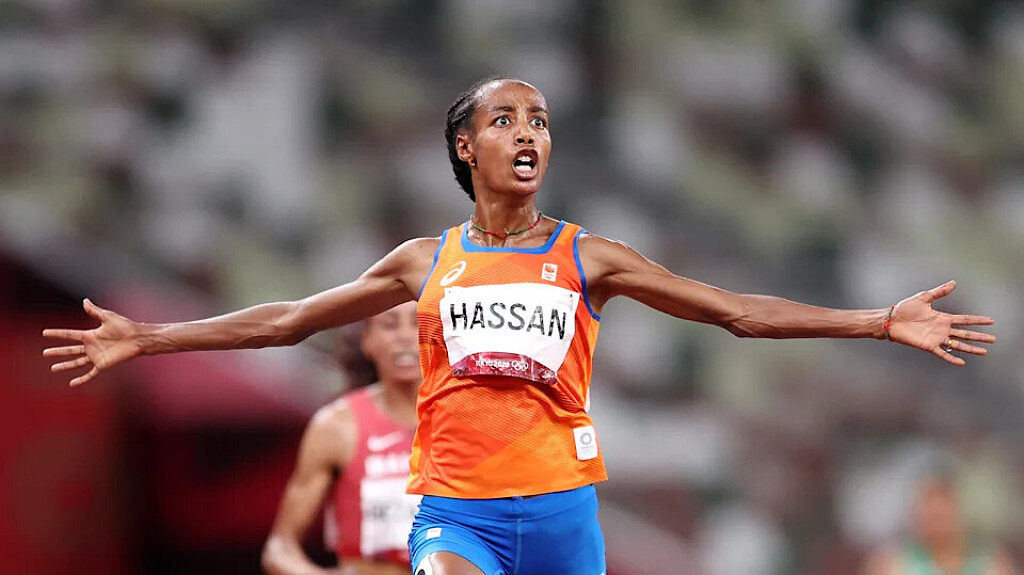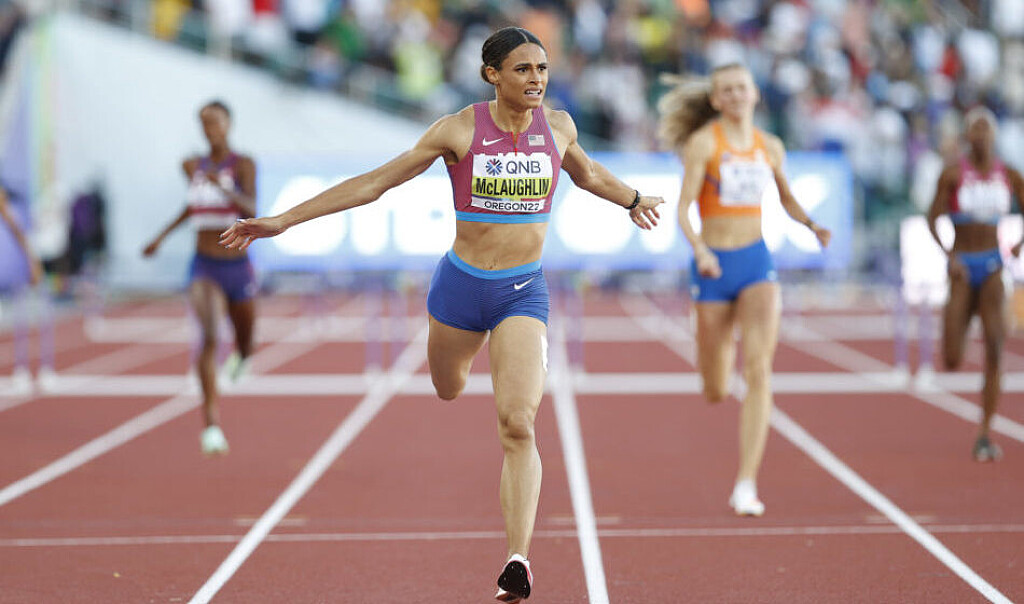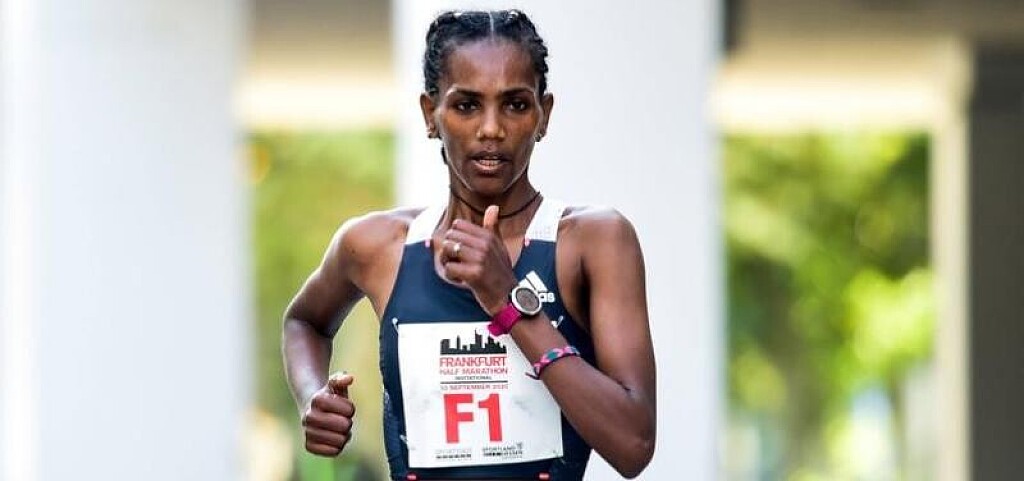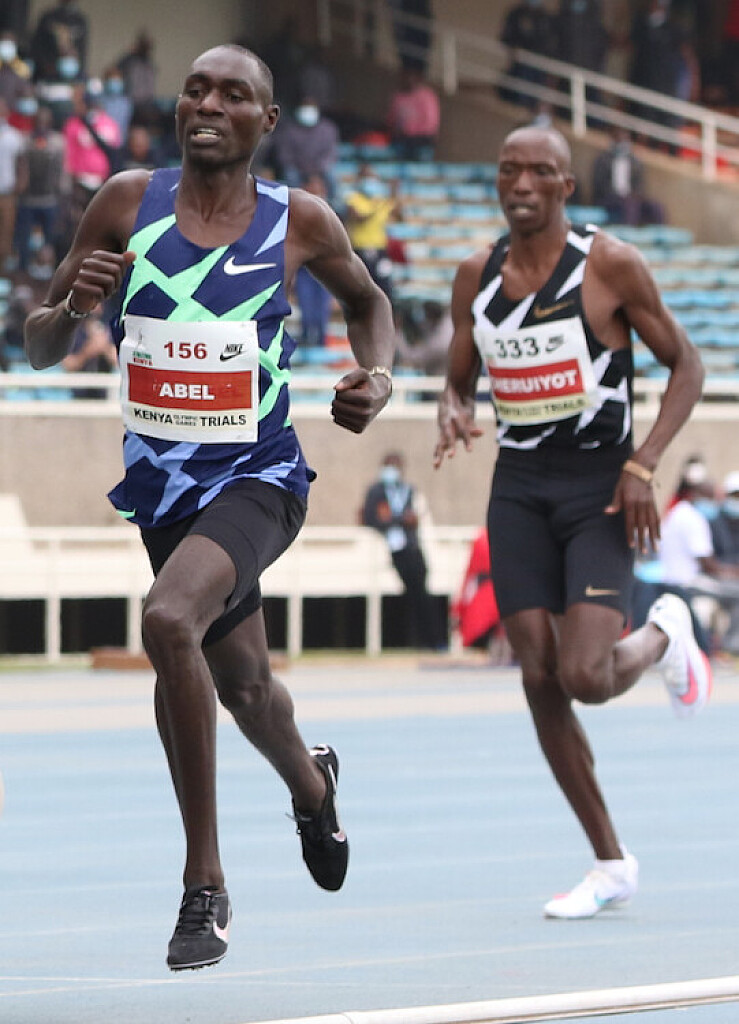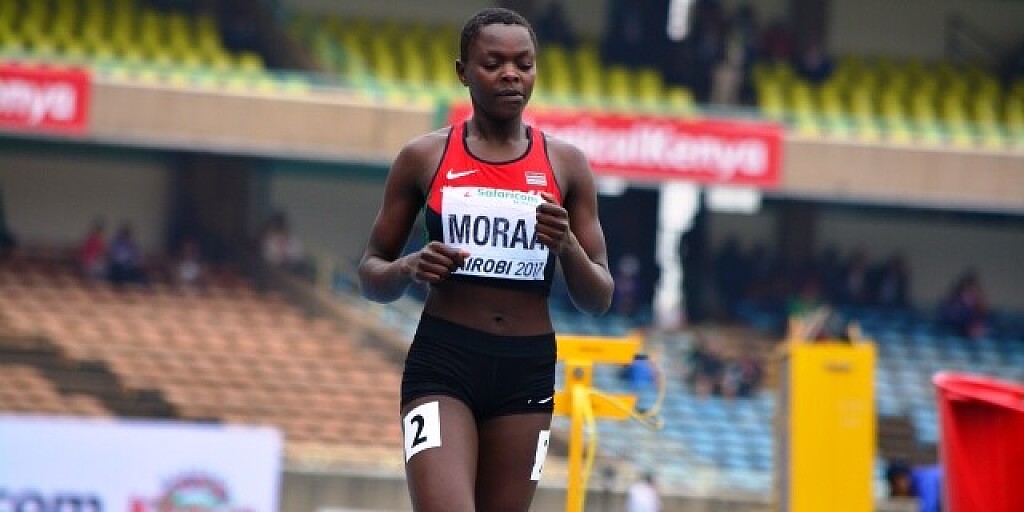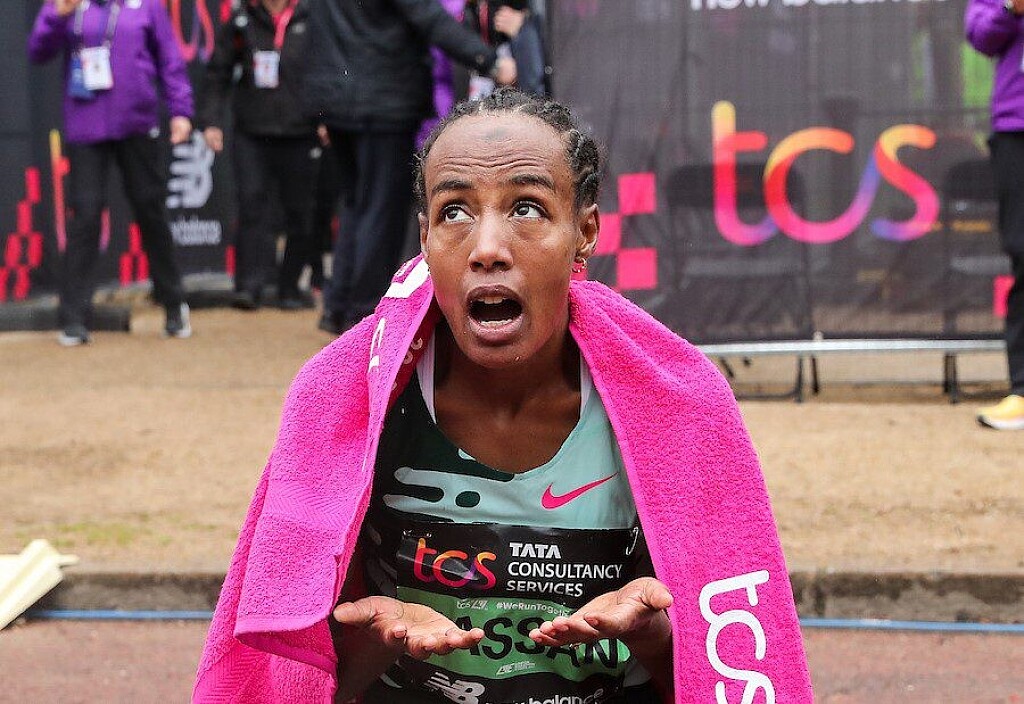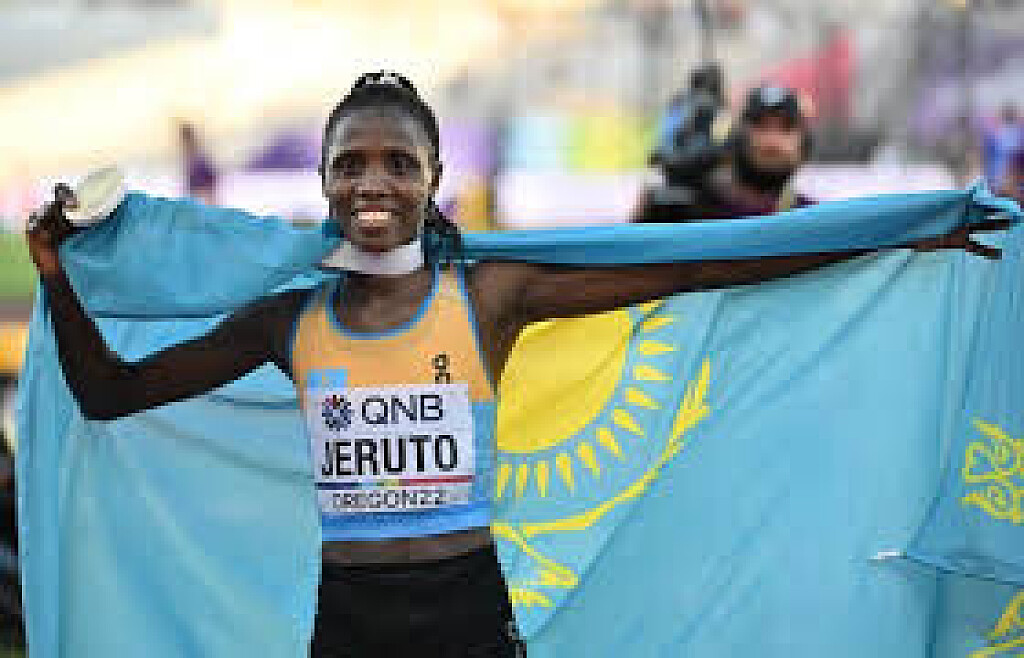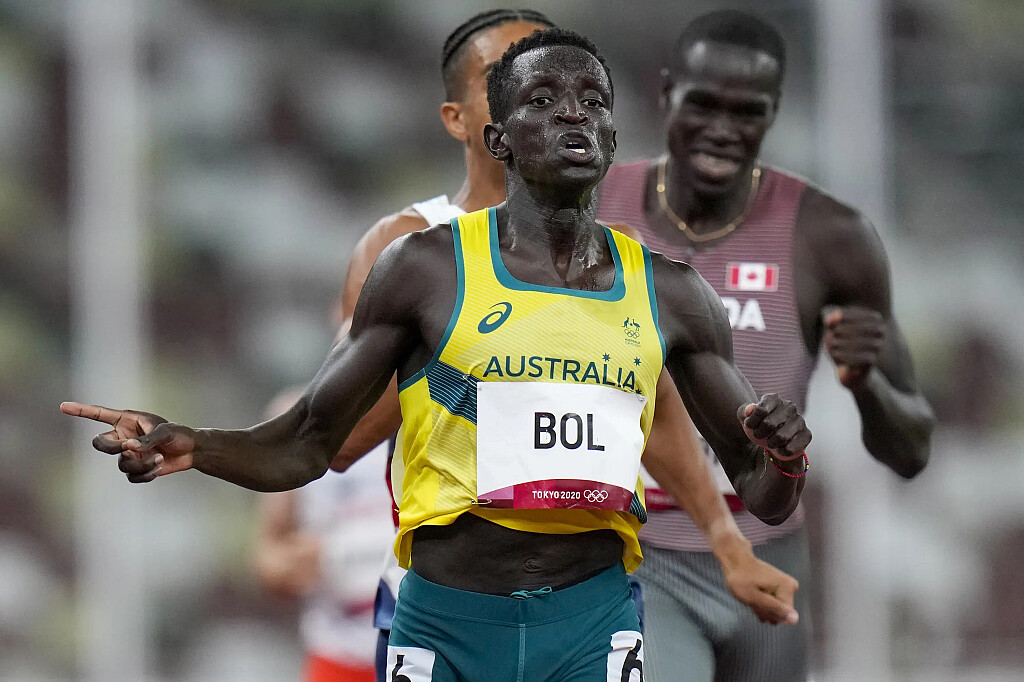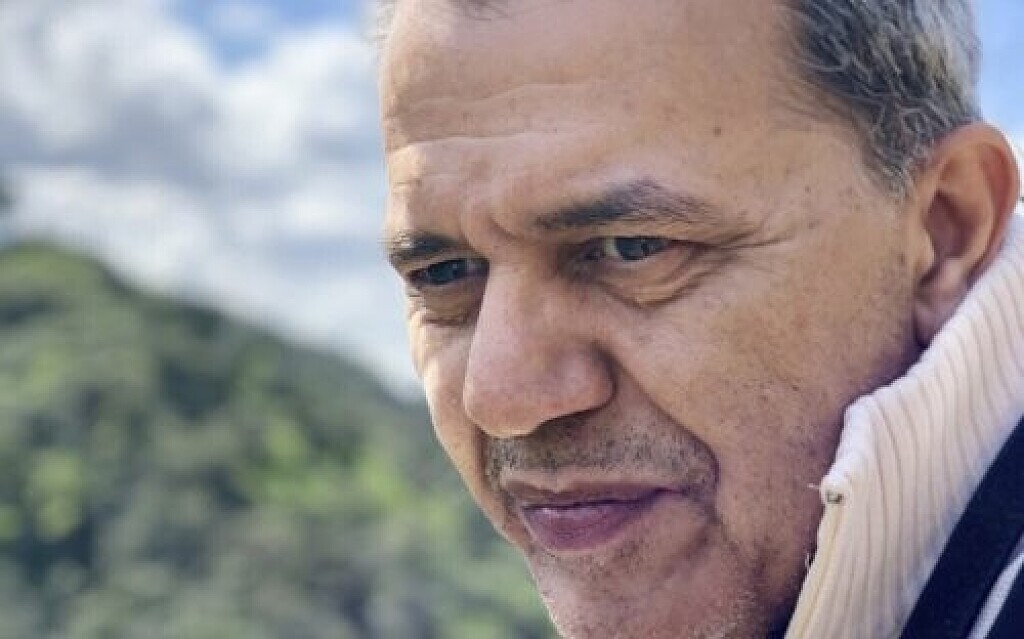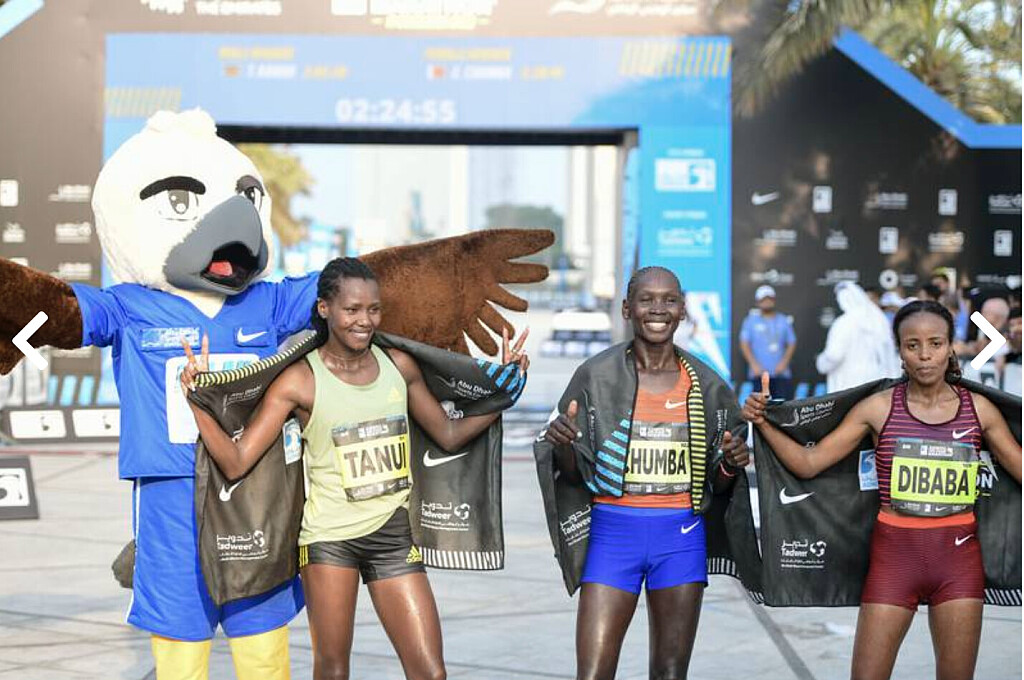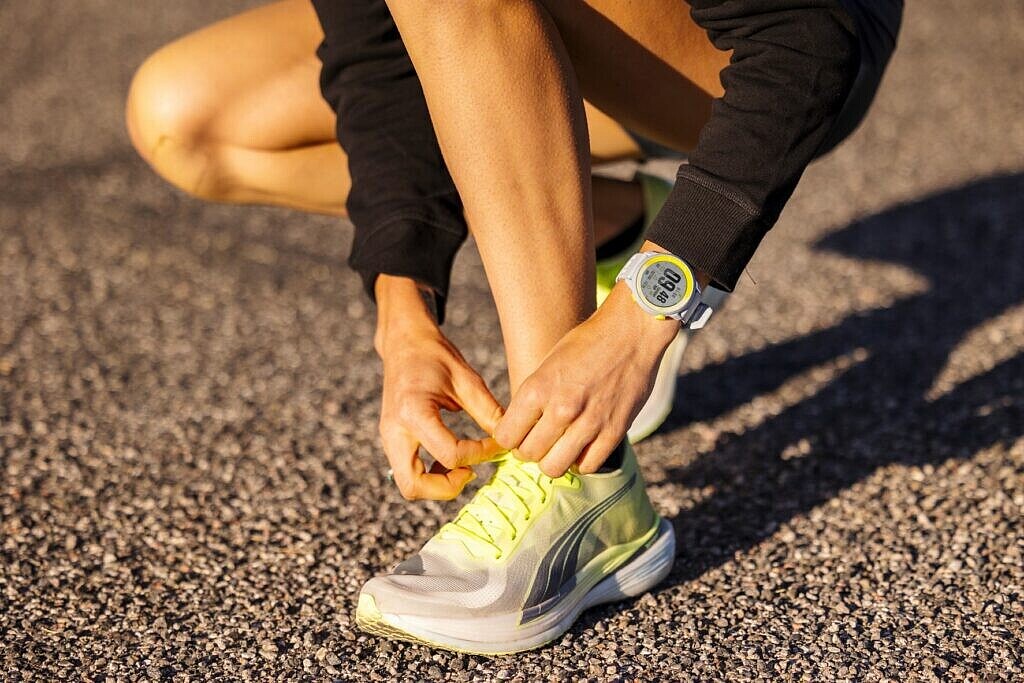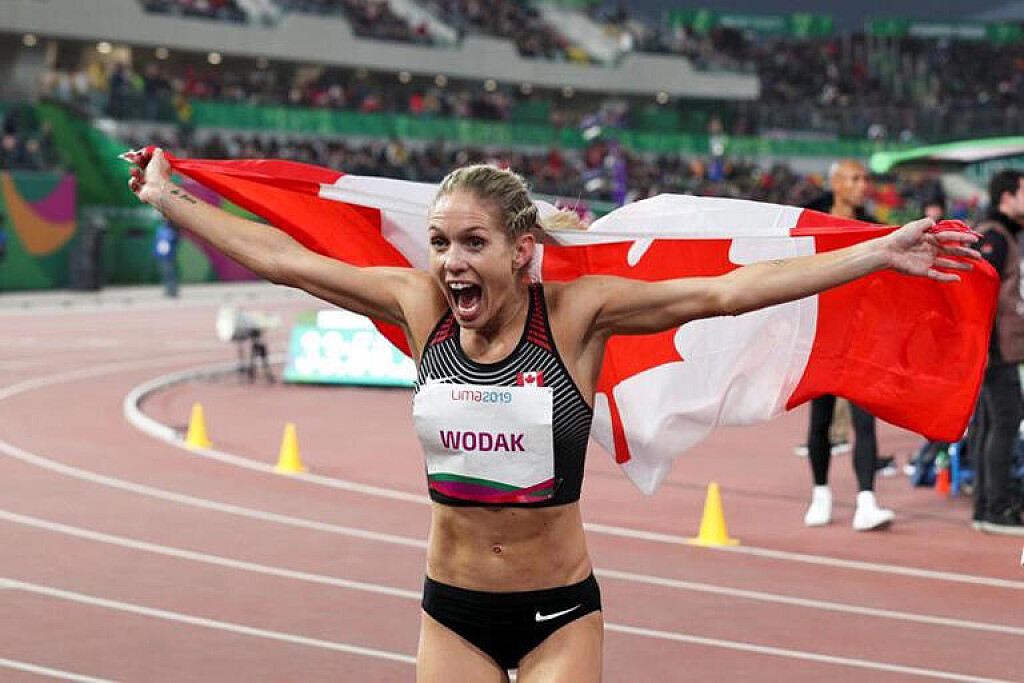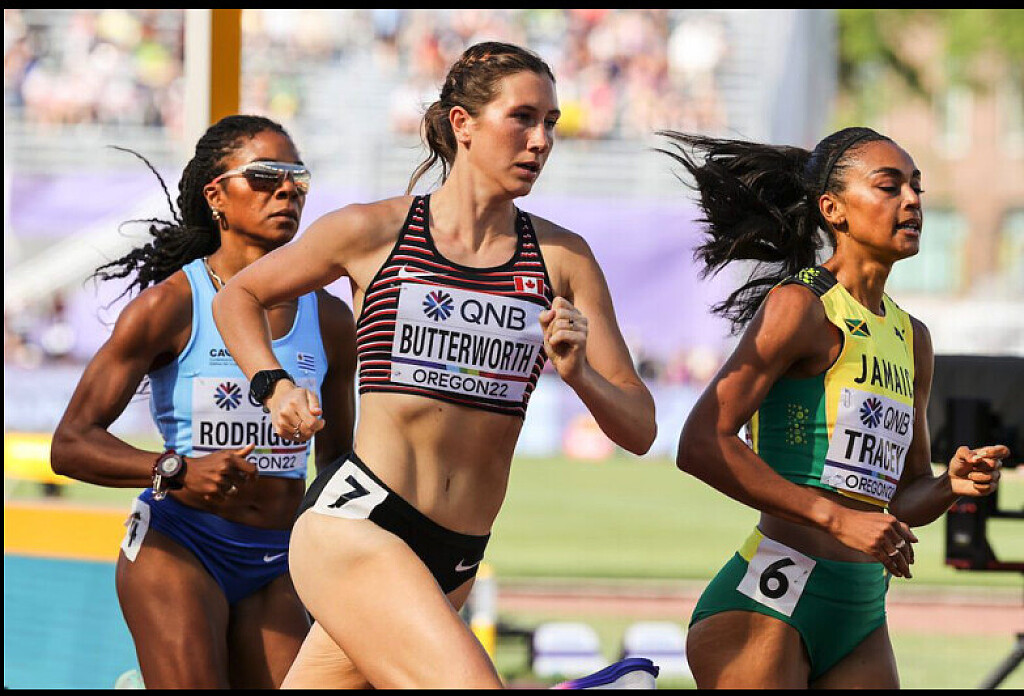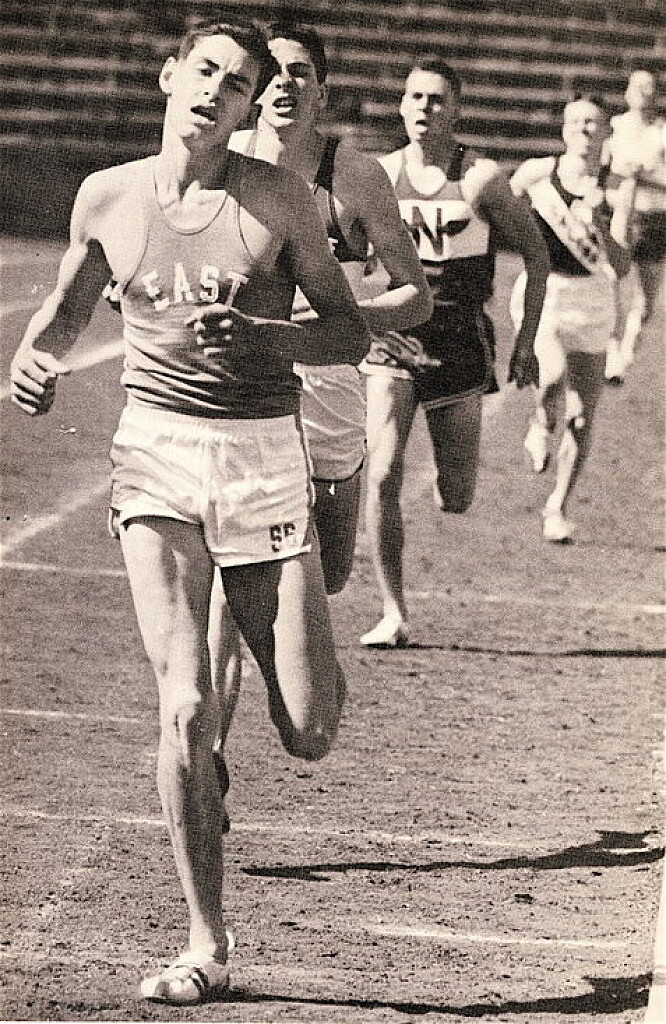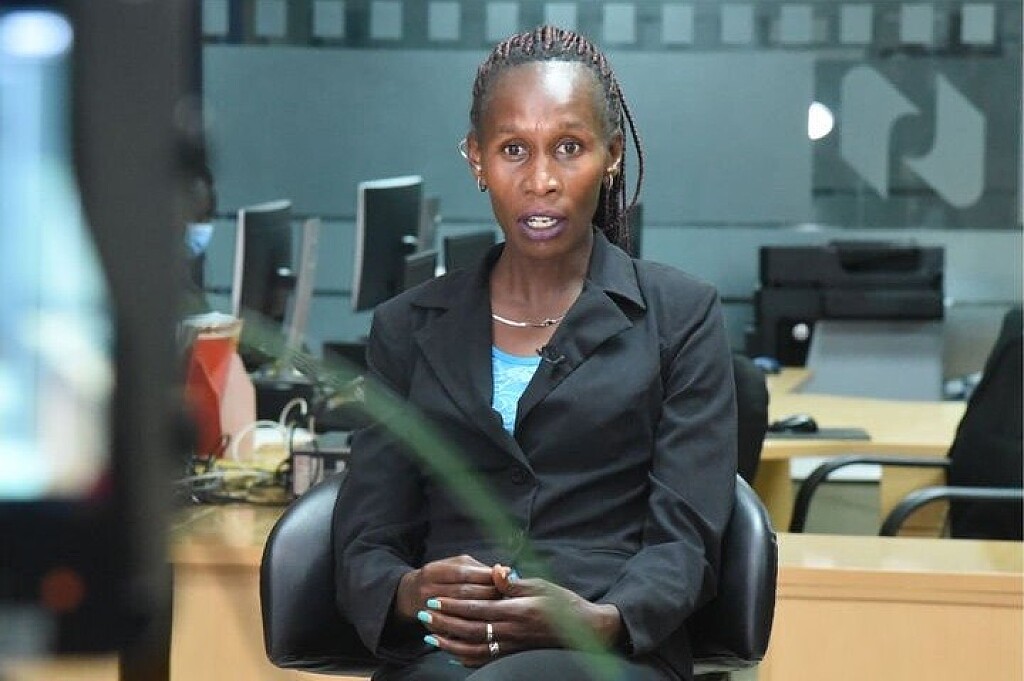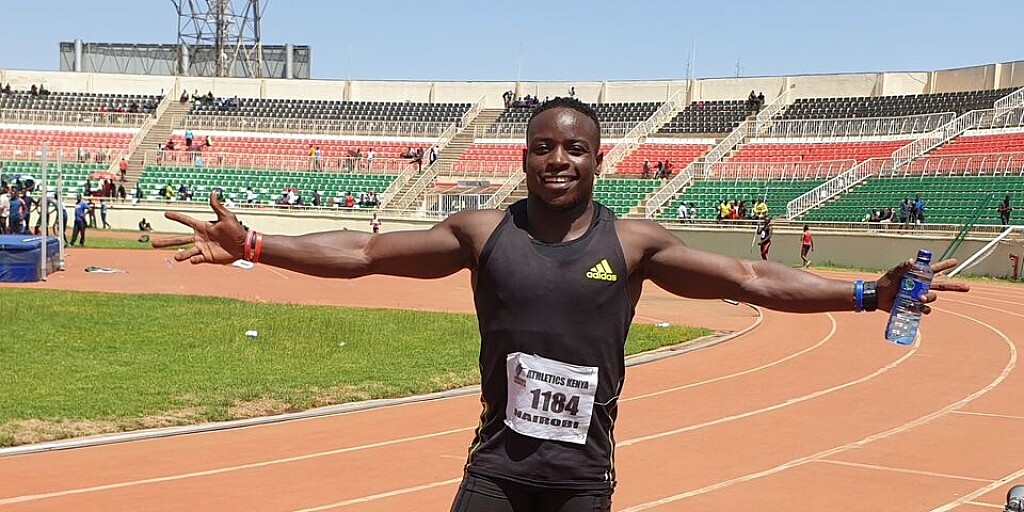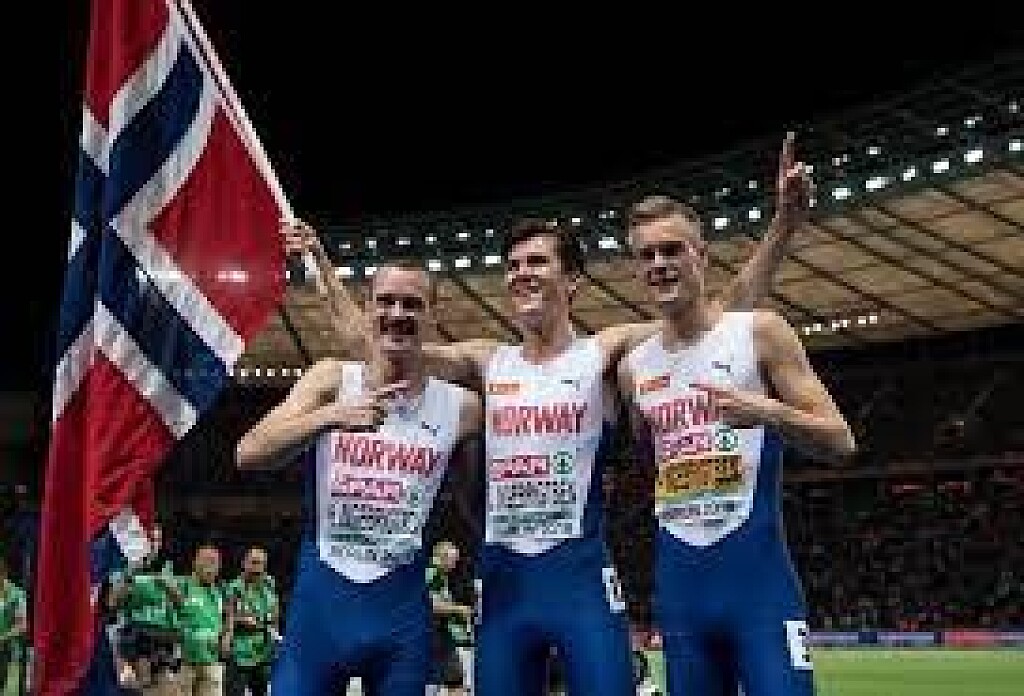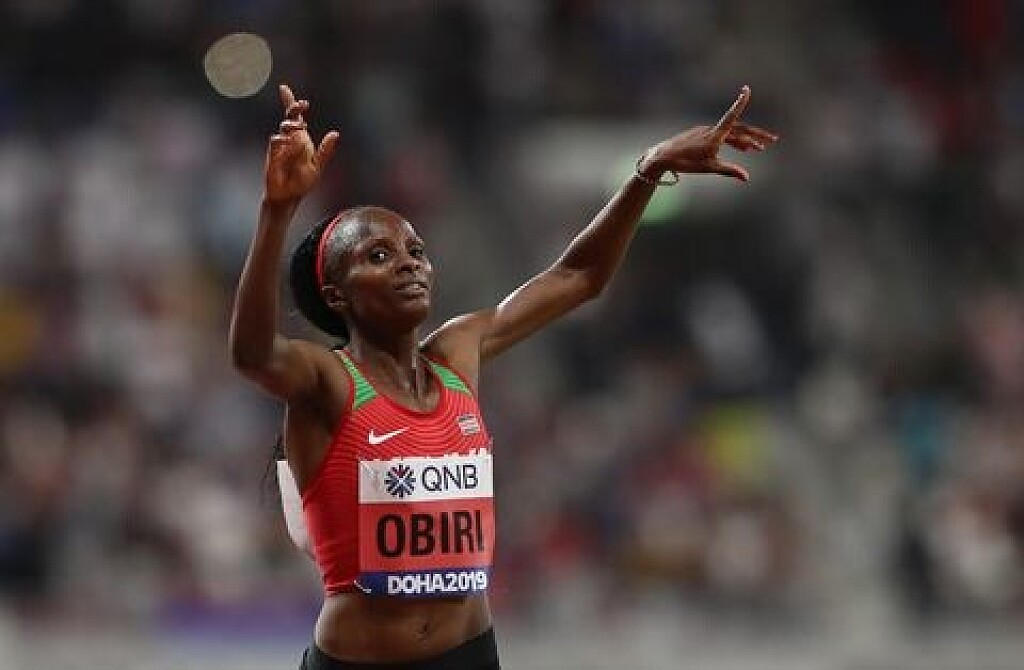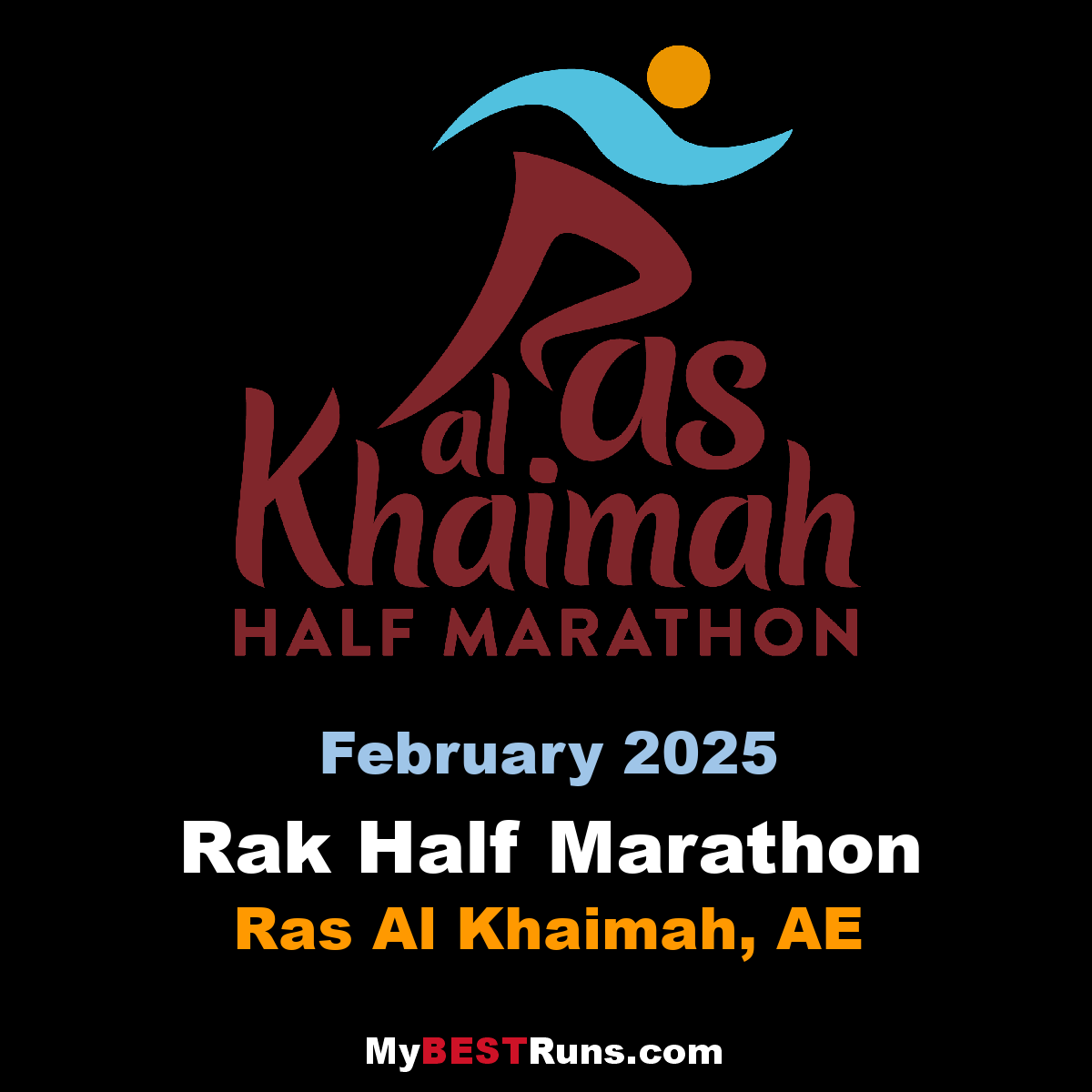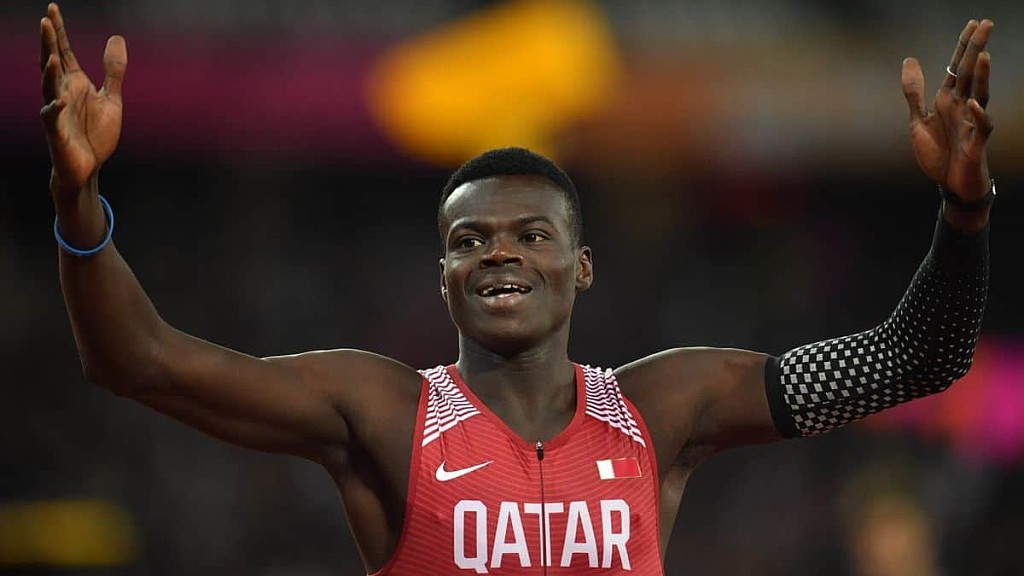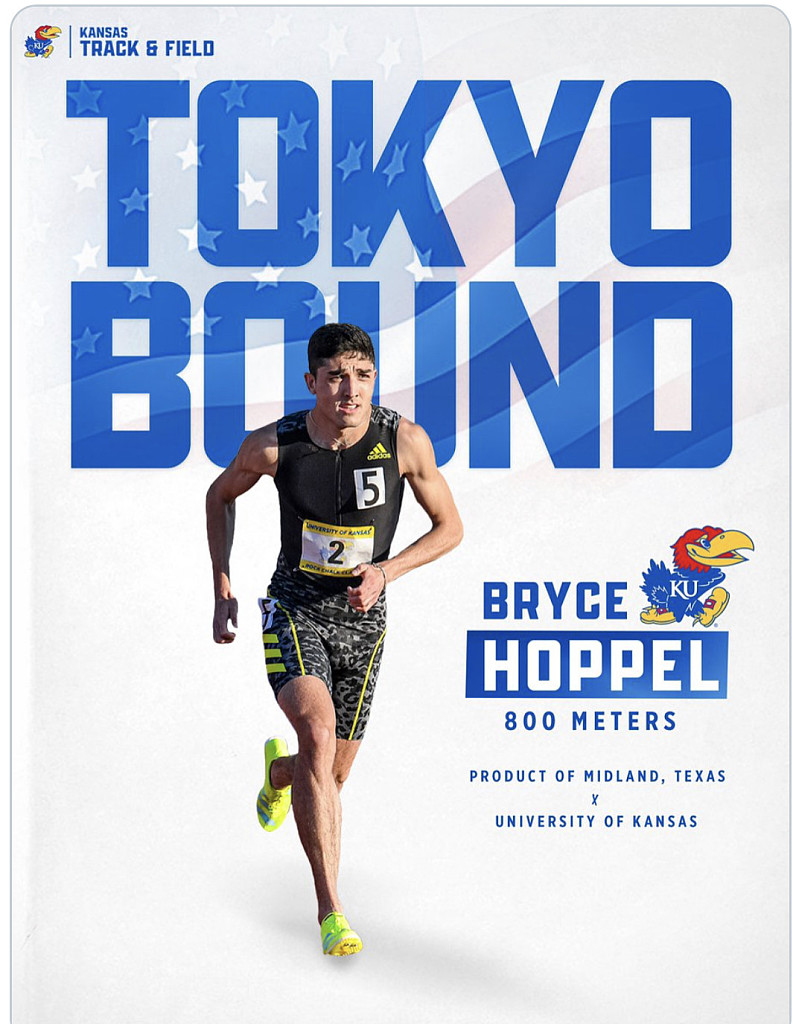Running News Daily
Running News Daily is edited by Bob Anderson. Send your news items to bob@mybestruns.com Advertising opportunities available. Train the Kenyan Way at KATA Kenya and Portugal owned and operated by Bob Anderson. Be sure to catch our movie A Long Run the movie KATA Running Camps and KATA Potato Farms - 31 now open in Kenya! https://kata.ke/
Index to Daily Posts · Sign Up For Updates · Run The World Feed
Articles tagged #2020 Tokyo Olympics
Today's Running News
Sifan Hassan Withdraws from London Diamond League 2025, Leaving a Void in the Distance Lineup
Alright, track and field fans—buckle up, because the London Diamond League 2025 is nearly here, and while anticipation is high, one major name has just dropped out, shaking up the event’s buzz.
The eleventh stop on this year’s Diamond League circuit, London has long been a fan-favorite meet. With global sprint star Noah Lyles set to light up the straightaway, Femke Bol ready to command the hurdles, and a stacked roster of middle-distance talent, expectations were sky-high. But one race—the women’s mile—was drawing extra attention for a reason: it was supposed to feature Sifan Hassan, one of the sport’s most versatile and dominant athletes.
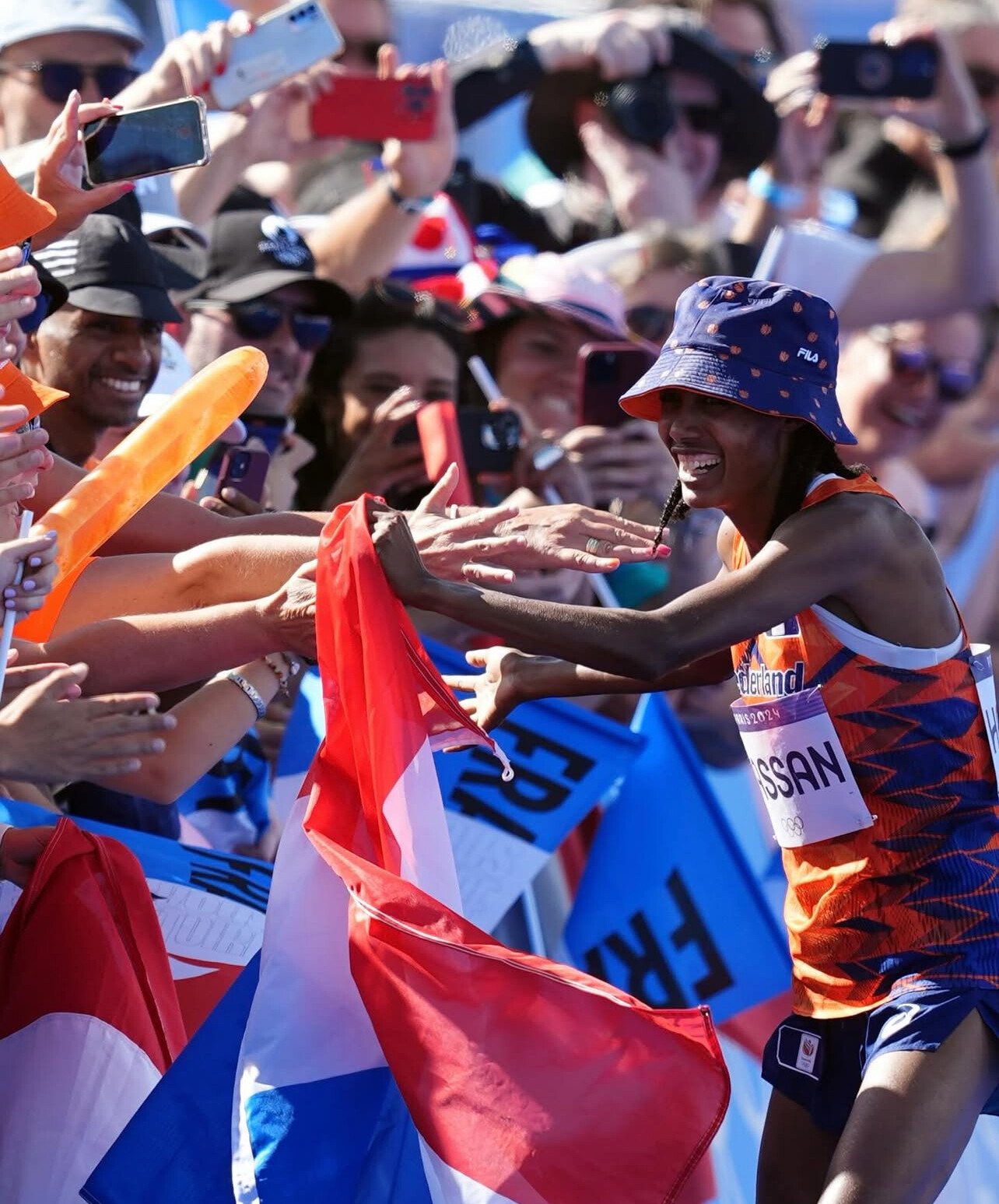
A Stunning Turn of Events
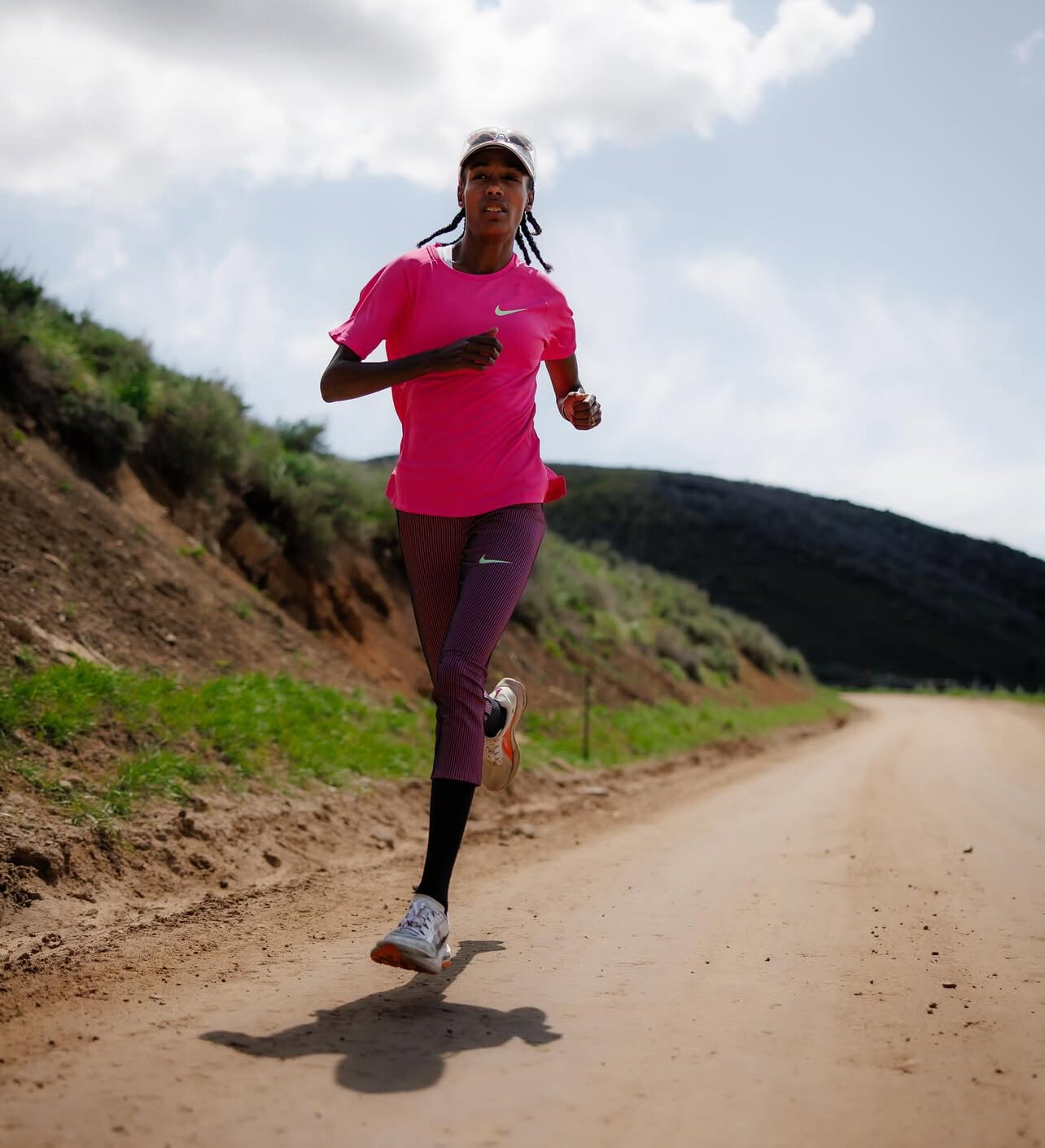
In a surprise Instagram post that landed just days before the event, the Olympic marathon championannounced her withdrawal. “I was really looking forward to racing at the @londonathleticsmeet,” Hassan wrote, “but I haven’t been feeling my best last week with my body not responding as well as I wanted. I love this meet and I feel really bad towards the organisers and my fans. But after talking with my team, we decided it’s smarter to skip it, stay focused and keep preparing for what’s next this season!”
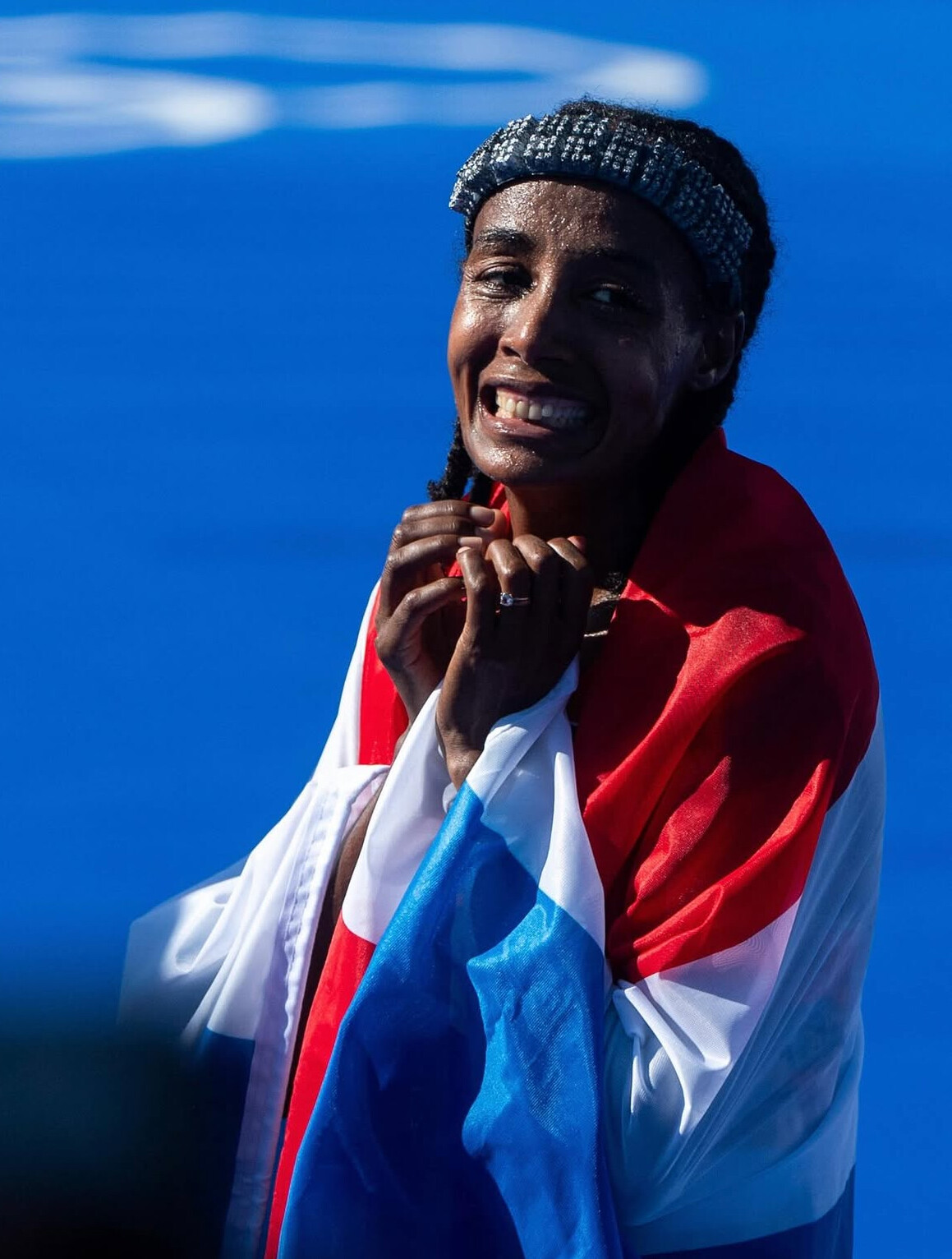
The words hit hard. Hassan’s disappointment was palpable—and shared by fans worldwide.
A Legend in Her Prime
Hassan is no ordinary athlete. The Dutch superstar is known for doing the impossible—winning gold in the 5,000m and 10,000m and bronze in the 1,500m at the 2020 Tokyo Olympics, and later making headlines with her 2:13:44 marathon win in Chicago in 2023. She returned to the London Marathon earlier this year, building momentum that had fans itching to see her take to the track again.
Her absence from London robs the meet of a major draw, especially in the women’s mile, which was set to be one of the headline events of the weekend.
What Happens Now?
With Hassan out, the field remains strong—but no doubt the spotlight dims just a bit. The question becomes: Who will rise in her absence? Can the other middle-distance stars deliver a race worthy of her legacy? Will new names break through and capitalize on the opportunity?
The London Diamond League still promises firepower across multiple events, with top-tier battles lined up in the sprints, hurdles, and field events. But there’s no denying that the loss of one of track’s most beloved icons changes the emotional tone of the weekend.
Still, Hassan’s decision serves as a reminder: even the best need to listen to their bodies. And with her eyes still firmly set on the remainder of the season—and perhaps another Olympic run—fans will be watching and waiting for her next move.
Stay with My Best Runs for complete coverage of the London Diamond League and all the latest from the global distance running scene.
by Boris Baron
Login to leave a comment
Amanal Petros - From Refugee to Record-Breaker, Eyes Set on London Marathon Glory
German marathon record-holder Amanal Petros is preparing for a significant milestone in his athletic career as he sets his sights on the 2025 London Marathon, scheduled for April 27, 2025. This event will mark his inaugural participation in the London Marathon, where he will compete alongside an elite field featuring renowned athletes such as Eliud Kipchoge and Kenenisa Bekele. Petros’s personal best of 2:04:58, achieved at the 2023 Berlin Marathon, positions him as a formidable contender in this prestigious race.
A Journey of Resilience and Achievement
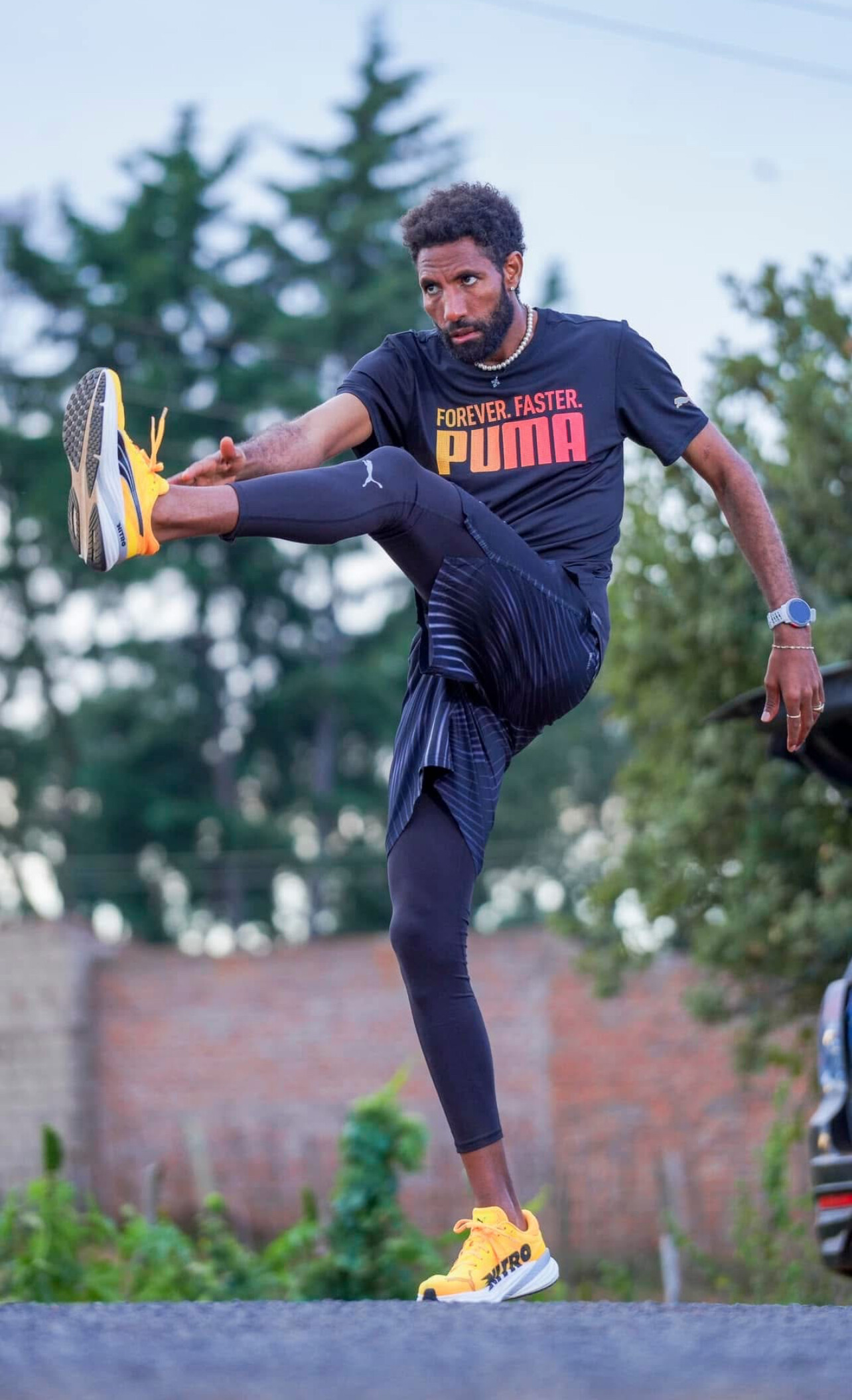
Born on May 17, 1995, in Assab, Eritrea, Petros’s early life was marked by adversity. At the age of two, his family fled the Eritrean-Ethiopian conflict, seeking refuge in Ethiopia. In 2012, as a teenager, Petros embarked on a journey to Germany, where he sought asylum and eventually acquired citizenship in 2015. It was in Germany that he discovered his passion and talent for long-distance running, setting the stage for a series of remarkable achievements.
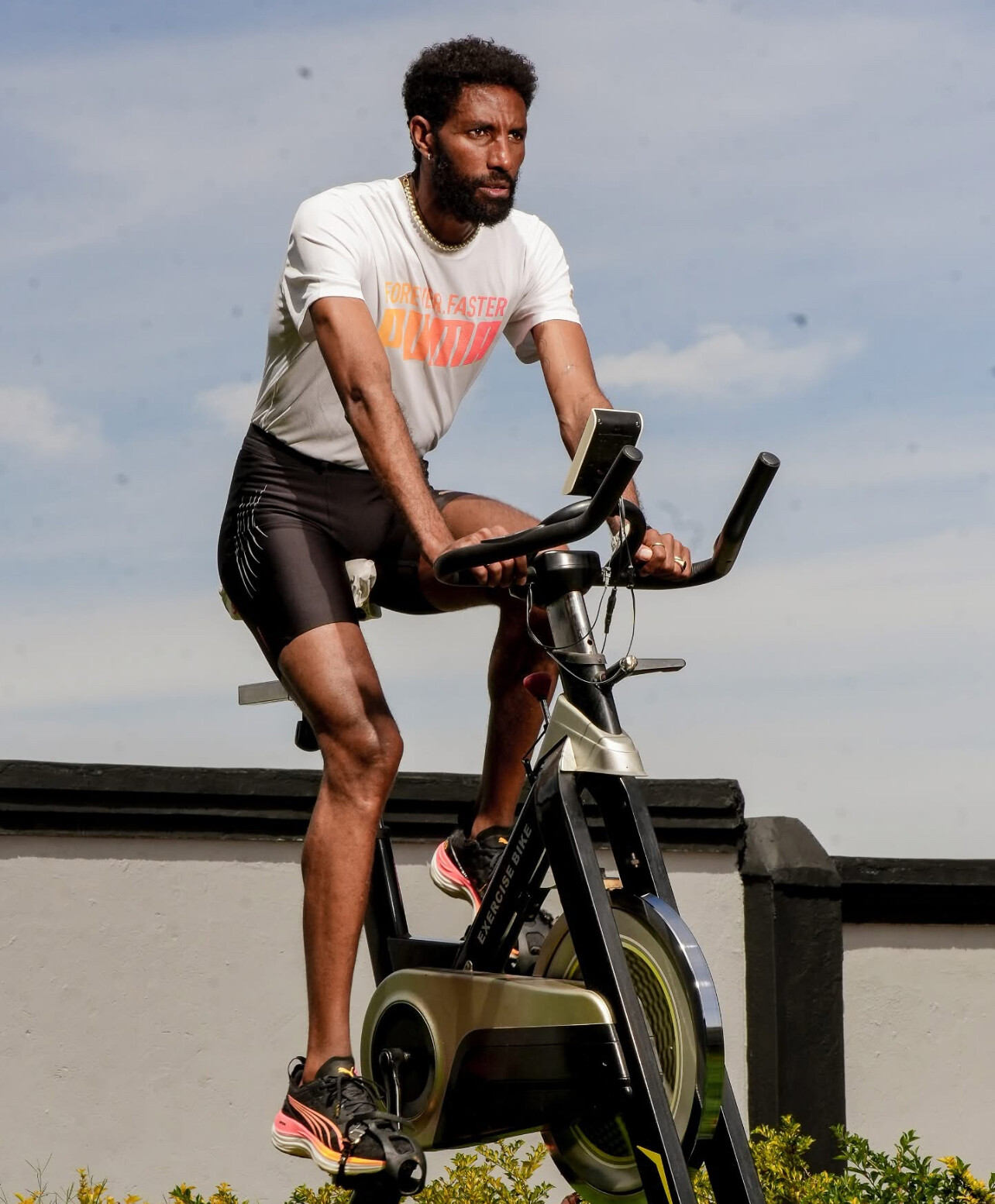
Record-Breaking Performances
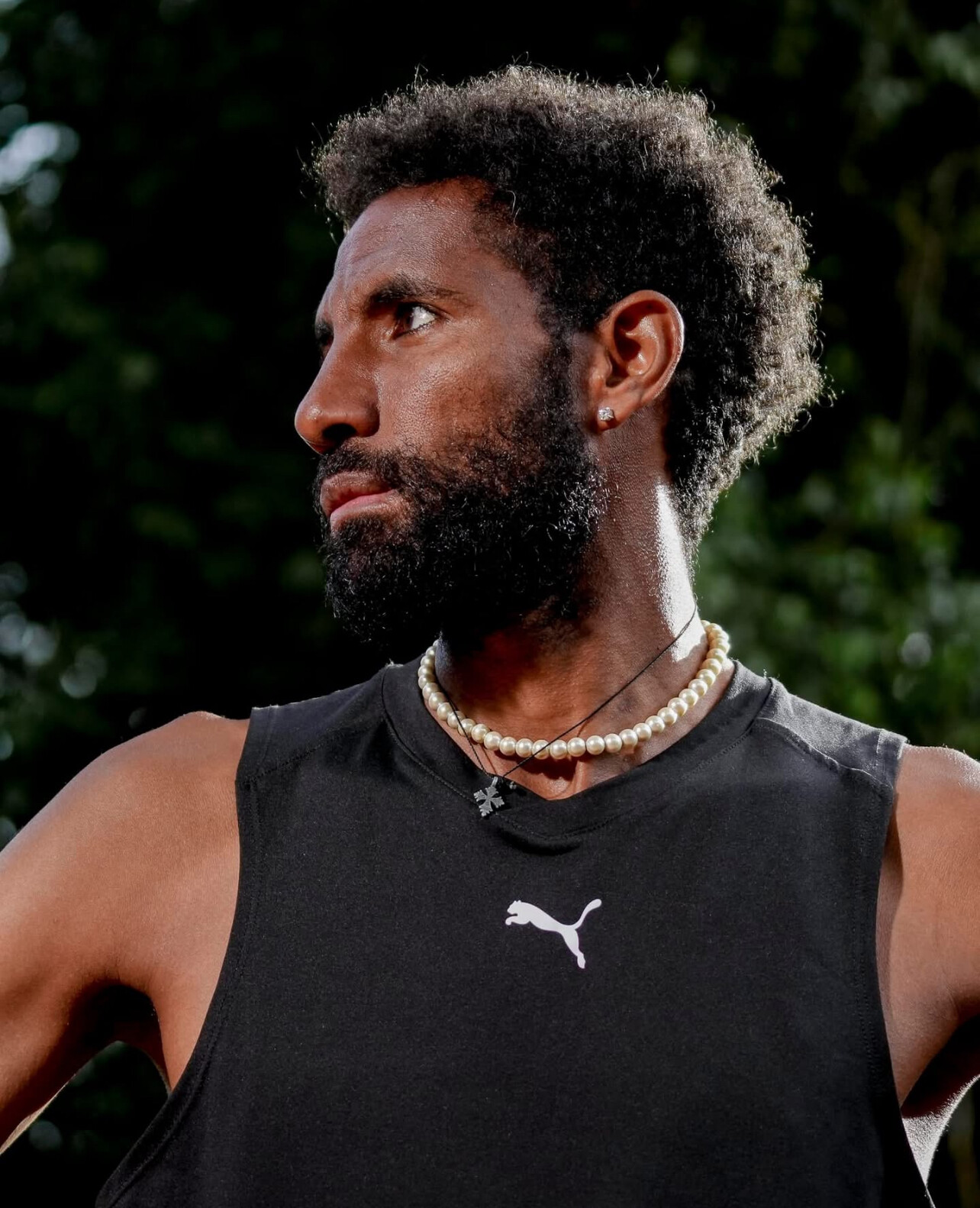
Petros’s dedication and perseverance have led to several national records:
• Marathon: German national record of 2:04:58, set at the 2023 Berlin Marathon.
• Half Marathon: National record of 1:00:09, achieved in Valencia on October 24, 2021.
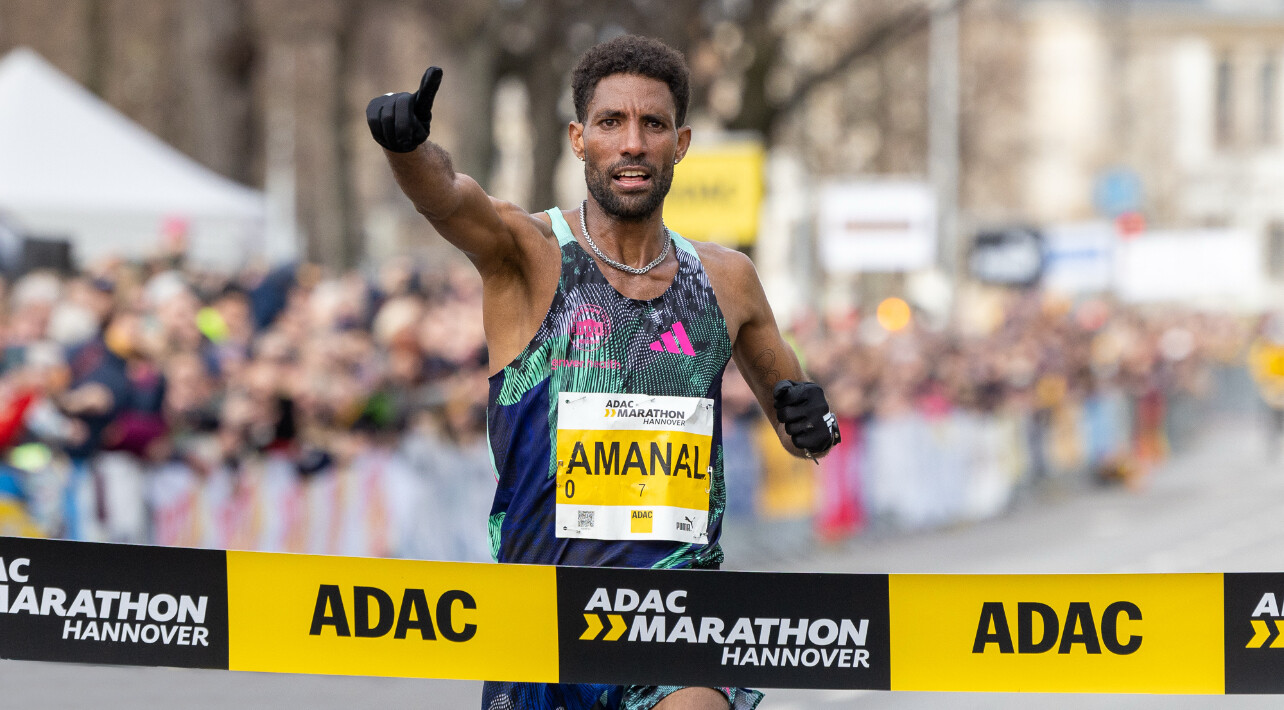
• 10 km Road Race: National record of 27:32, set in Castellón, Spain, on February 26, 2023.
International Representation
Petros has proudly represented Germany on the international stage:
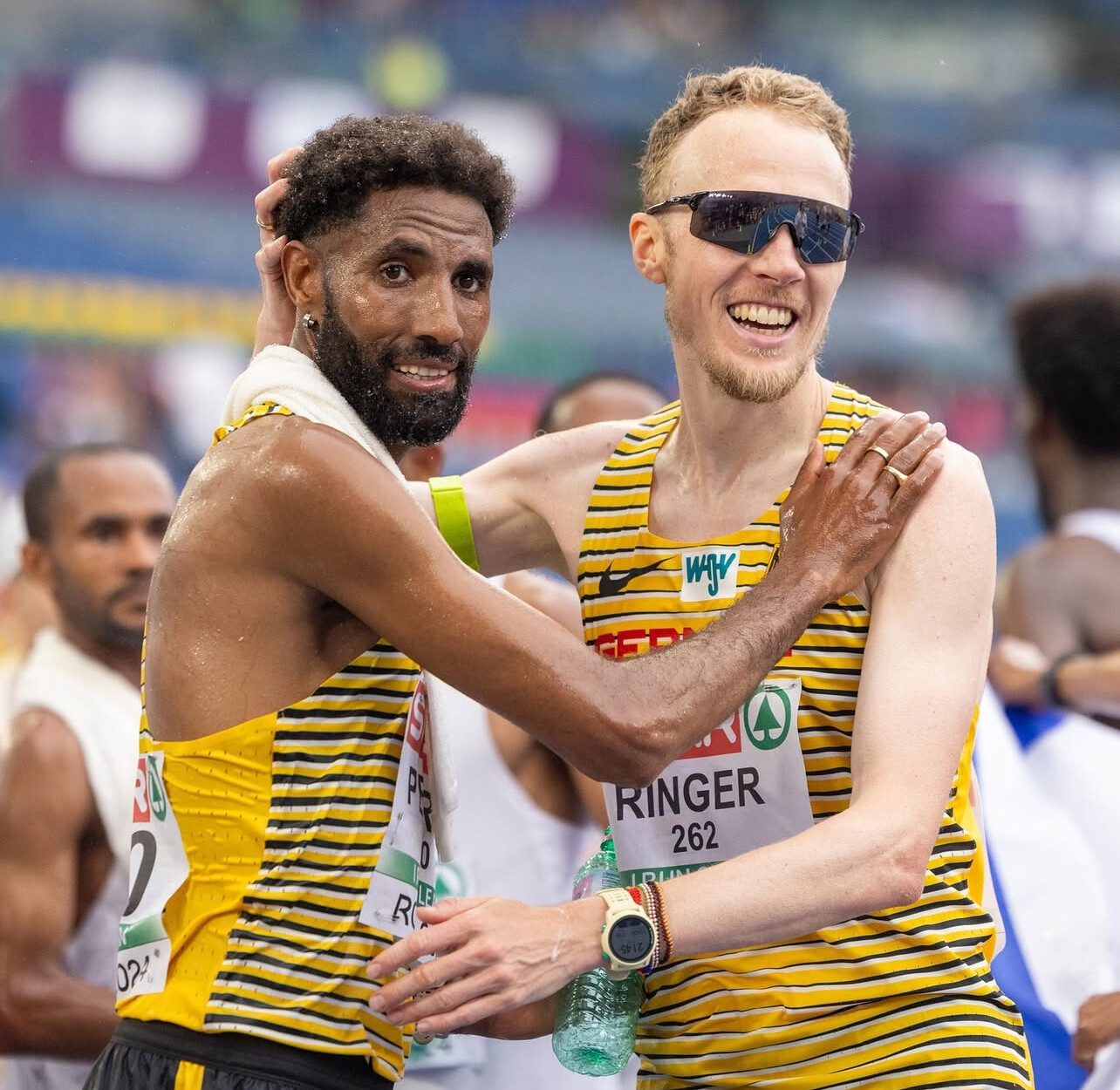
• Olympic Games: Competed in the men’s marathon at the 2020 Tokyo Olympics, finishing 30th.
• European Championships: Secured a silver medal in the team marathon event and placed fourth individually at the 2022 European Athletics Championships in Munich.
Recent Preparations and Professional Milestones
In preparation for the London Marathon, Petros participated in the eDreams Mitja Marató Barcelonaon February 16, 2025, completing the half marathon in 1:01:51. Reflecting on his performance, he stated:
“Today I ran quite far from my German record, but I am happy to run my first competition in 61:50 after the Olympic Games in Paris. Looking forward to my first marathon in London 2025.”
In addition to his athletic endeavors, Petros has recently joined the Puma Running Team, expressing enthusiasm about this new partnership and the opportunities it presents for the upcoming seasons.
Looking Ahead
As the 2025 London Marathon approaches, the running community eagerly anticipates Petros’s performance. His journey from a refugee seeking asylum to a national record-holder exemplifies resilience and determination. With his eyes set on London, Petros continues to inspire and set new benchmarks in long-distance running.
The last photo
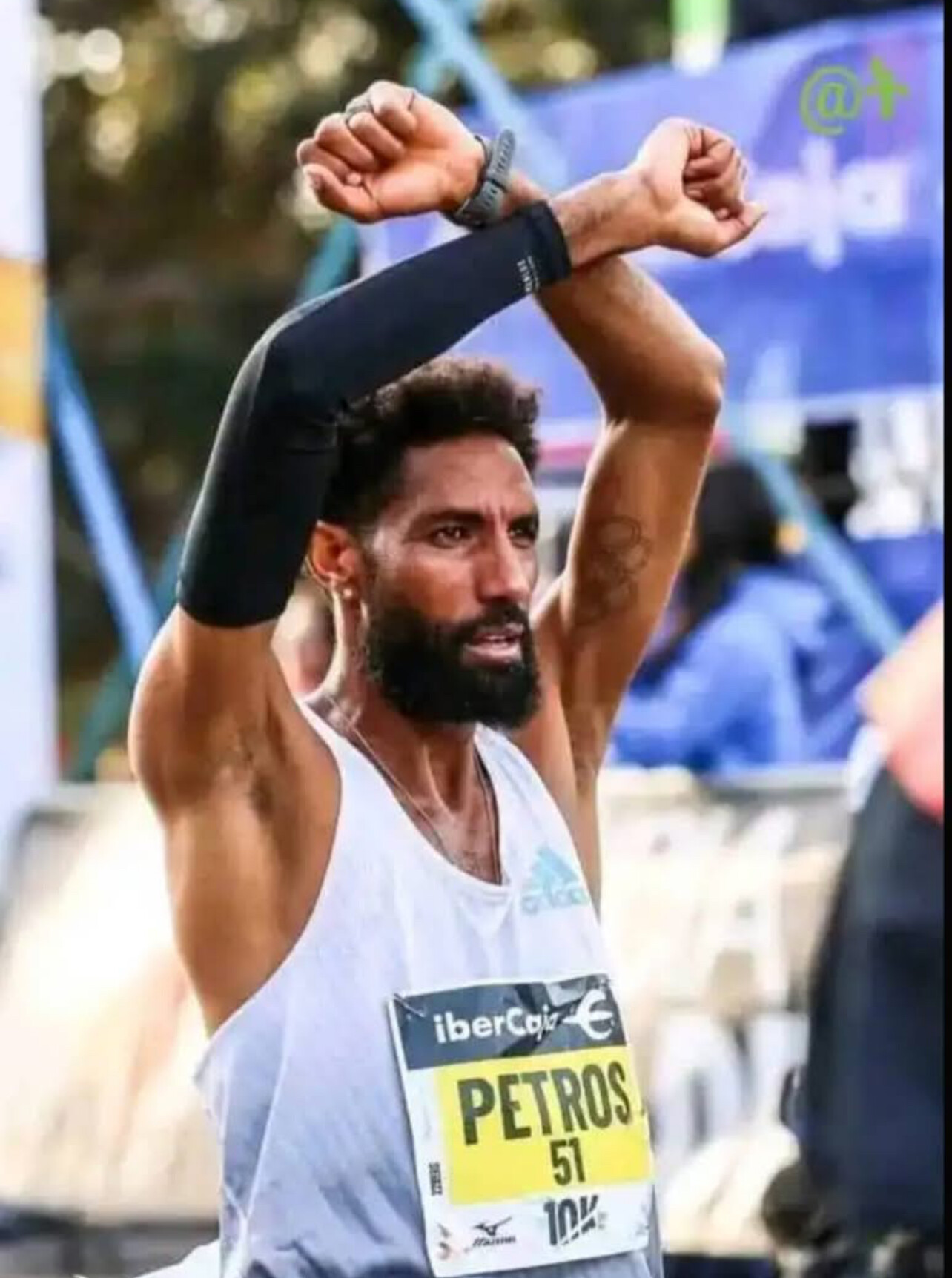
The gesture Amanal Petros is making in this photo — crossing his arms above his head — is a powerful and symbolic act. He does not do this gesture often but his beliefs have not changed.
This “X” gesture has been widely recognized as a sign of solidarity with the Tigray people in northern Ethiopia. It’s used by athletes and others to bring attention to the humanitarian crisis and conflict in the region, where countless civilians have suffered due to war, famine, and displacement.
Petros, who was born in Eritrea and whose roots are in Tigray, is using this moment at the finish line to make a public statement of support and raise awareness.
by Boris Baron
Login to leave a comment
Hannah Nuttall's Electrifying Finish Surpasses Laura Muir at UK Indoor 3000m Championship
In a thrilling climax at the UK Athletics Indoor Championships in Birmingham on February 23, 2025, Hannah Nuttall delivered a remarkable performance to overtake Laura Muir in the final 100 meters of the women's 3000m race. Nuttall secured the title with a personal best time of 8:49.49, narrowly edging out Muir, who finished at 8:50.16. Emerging talent Innes FitzGerald claimed third place with a time of 8:52.56.
Hannah Nuttall, born on July 7, 1997, has been steadily rising in British middle-distance running. In 2021, she was part of the victorious mixed relay team at the European Cross Country Championships in Dublin. Shortly thereafter, she joined Team New Balance Manchester under the guidance of coach Helen Clitheroe. Nuttall's dedication led to a fifth-place finish at the 2023 European Indoor Championships, where she set a personal best of 8:46.30 in the 3000m final. In 2024, she continued her upward trajectory, recording a 5000m personal best of 14:52.65 in Leiden, Netherlands, and clinching the British national title in the same event. Her recent triumph over Muir underscores her growing prominence on the national stage.
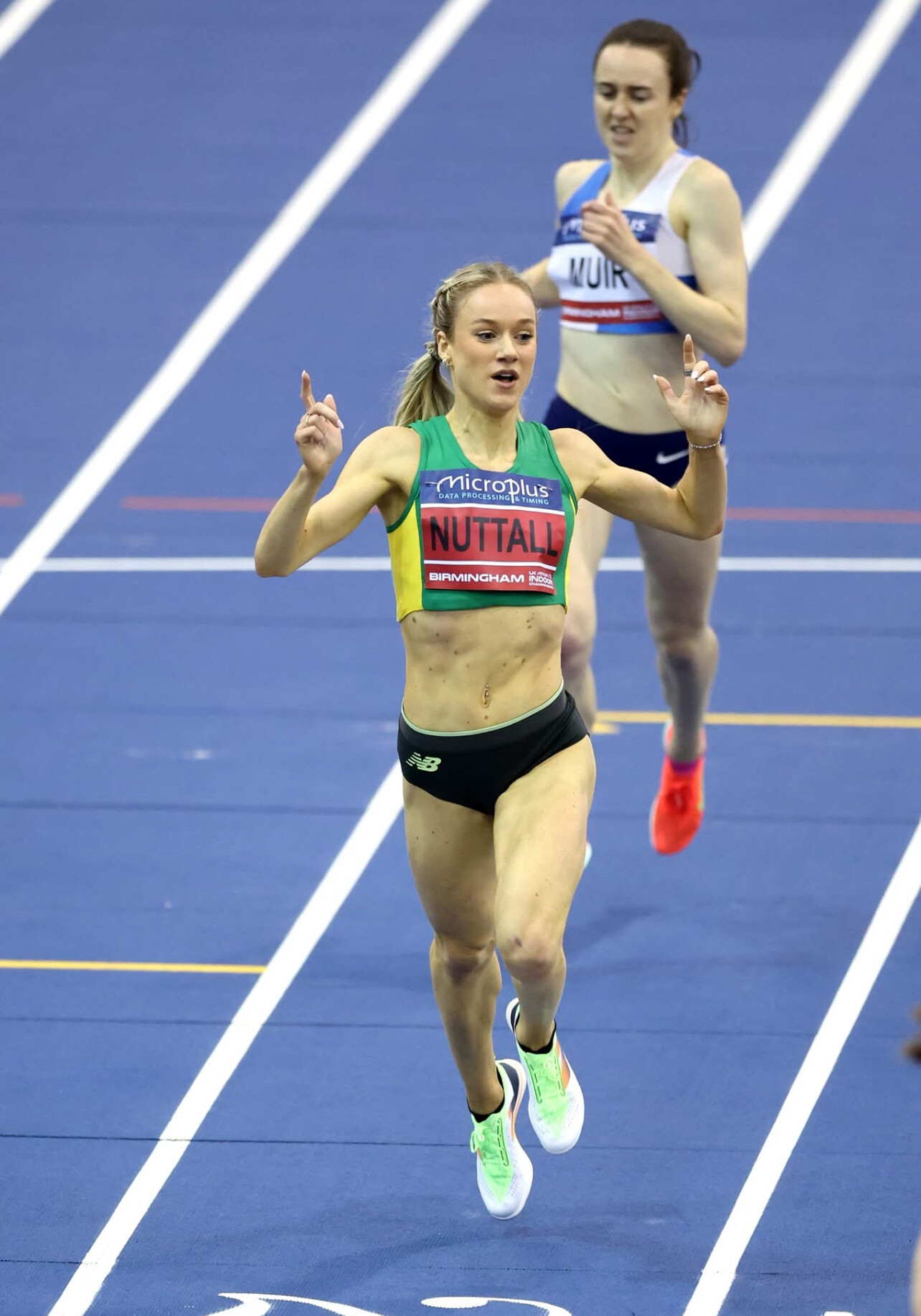
Laura Muir, born on May 9, 1993, in Inverness, Scotland, is a celebrated figure in middle-distance running. A veterinary medicine graduate from the University of Glasgow, Muir has an impressive track record, highlighted by a silver medal in the 1500m at the 2020 Tokyo Olympics. Her accolades include multiple European Indoor Championships titles and a bronze medal at the 2022 World Championships. Muir's dominance in the 1500m is further evidenced by her British record of 3:52.61, set in 2024. Despite her recent second-place finish to Nuttall, Muir's legacy as one of Britain's premier middle-distance runners remains firmly intact.
The women's 3000m final was a showcase of strategic racing and competitive spirit. Muir, known for her front-running style, took the lead early, setting a strong pace. Nuttall remained patient, staying within striking distance throughout the race. As the final lap approached, Nuttall unleashed a powerful kick, closing the gap and ultimately surpassing Muir in the last 100 meters. This victory not only highlights Nuttall's tactical acumen but also signals a potential shift in the competitive landscape of British middle-distance running.
Nuttall's performance at the UK Athletics Indoor Championships positions her as a formidable contender for upcoming international competitions. Her continued development and recent successes suggest a promising future on the global stage. Meanwhile, Muir's experience and proven track record ensure that she remains a key figure in the sport, setting the stage for exciting rivalries and compelling narratives in the seasons to come.
Login to leave a comment
Olympic 10000m Champion Selemon Barega Wins Seville Marathon with a 2:05:15 debut
The 2025 Zurich Maratón de Sevilla delivered unforgettable performances on Sunday, February 23, as Ethiopia’s Selemon Barega stormed to victory in his marathon debut with an impressive time of 2:05:15, This marks the third-fastest marathon time of the year and continues Ethiopia’s dominance in the prestigious event.
Barega’s Marathon Debut: A Statement Victory
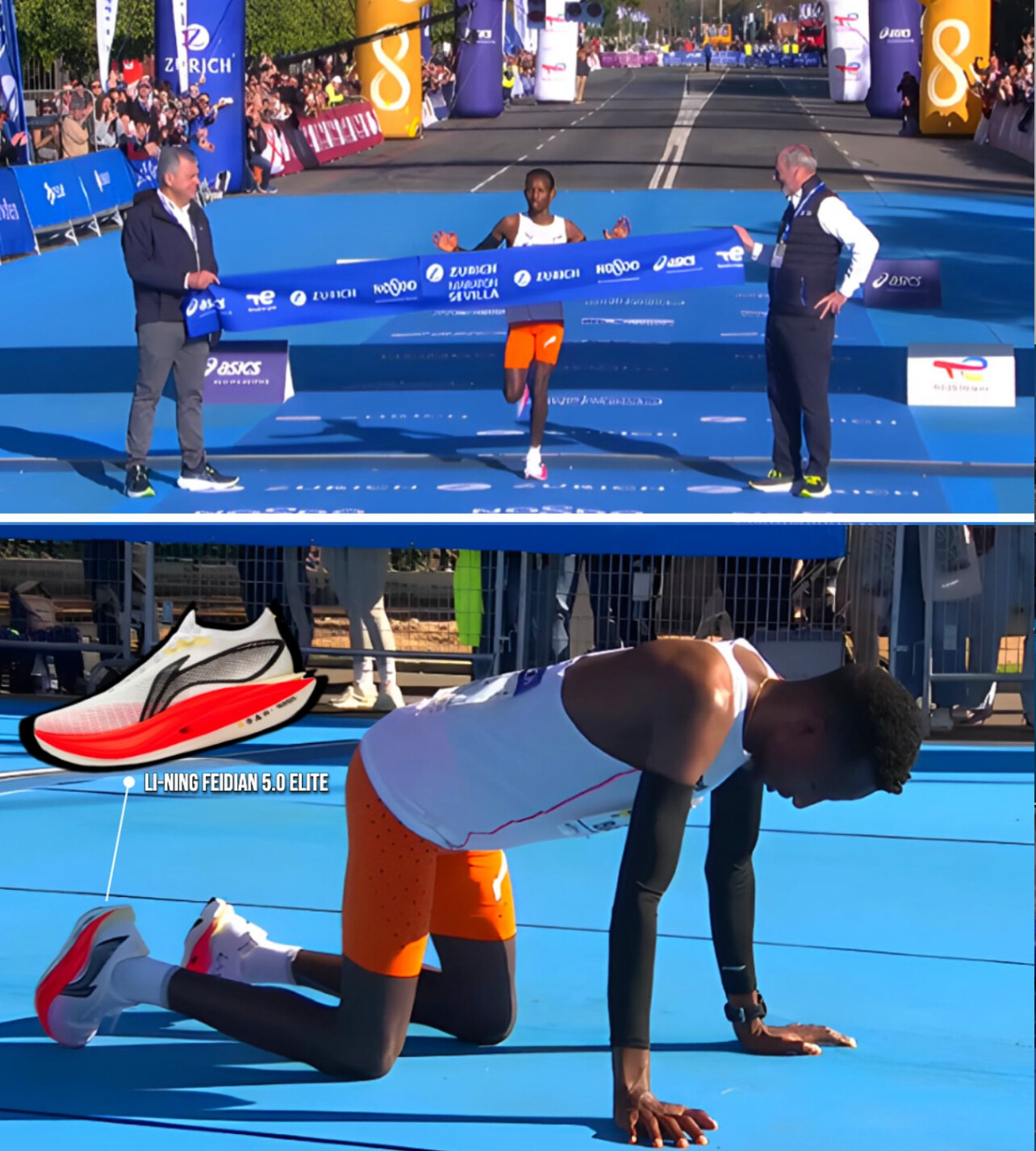
Selemon Barega, the reigning 10,000m Olympic champion, transitioned seamlessly to the marathon distance, showcasing his endurance and tactical brilliance. Running much of the second half alone, Barega maintained composure to cross the line well ahead of the field.
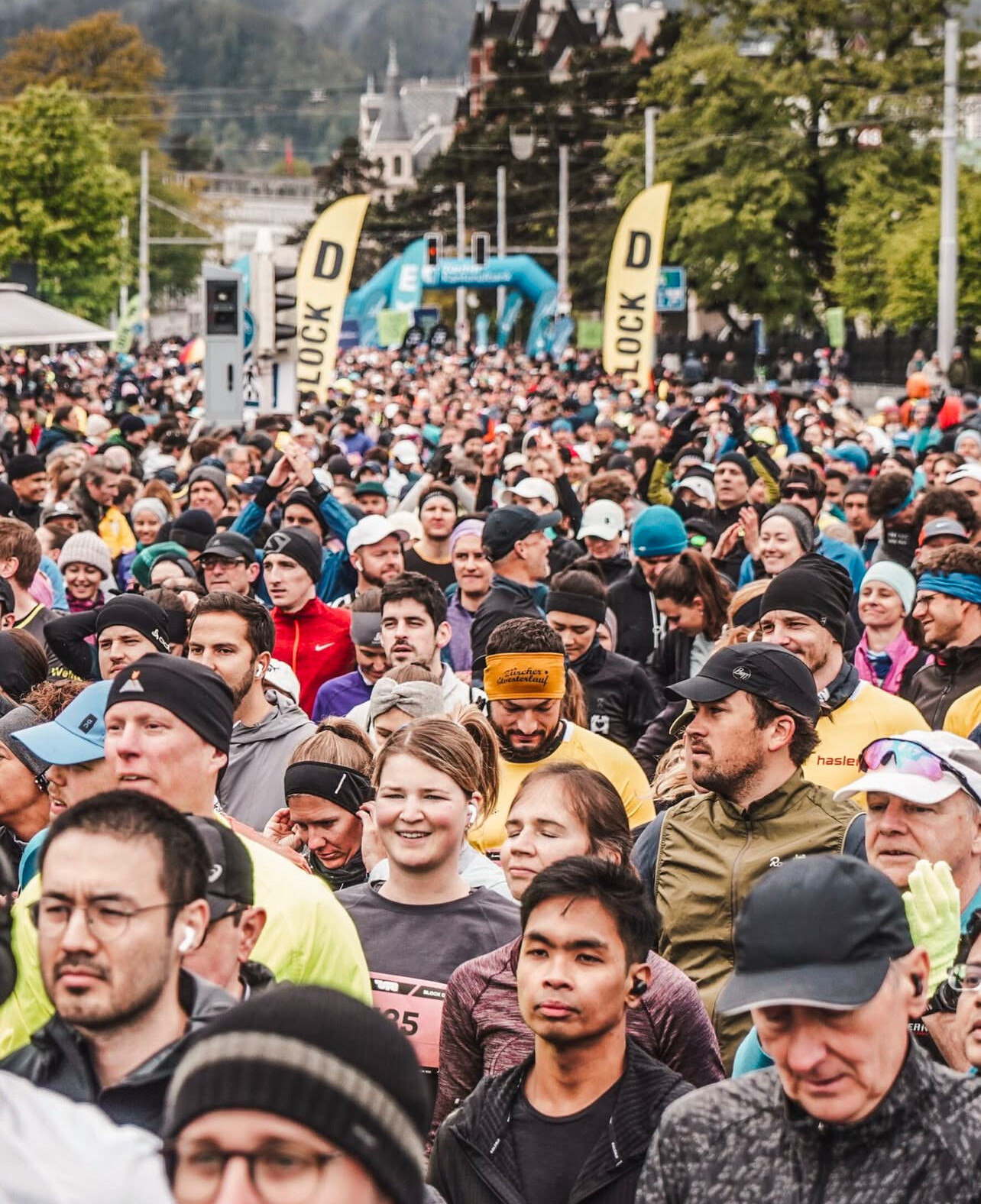
He was followed by compatriot Adisu Tesfahun, who finished second in 2:06:27, and Mohamed Reda of Morocco, clocking 2:06:45 for third place.
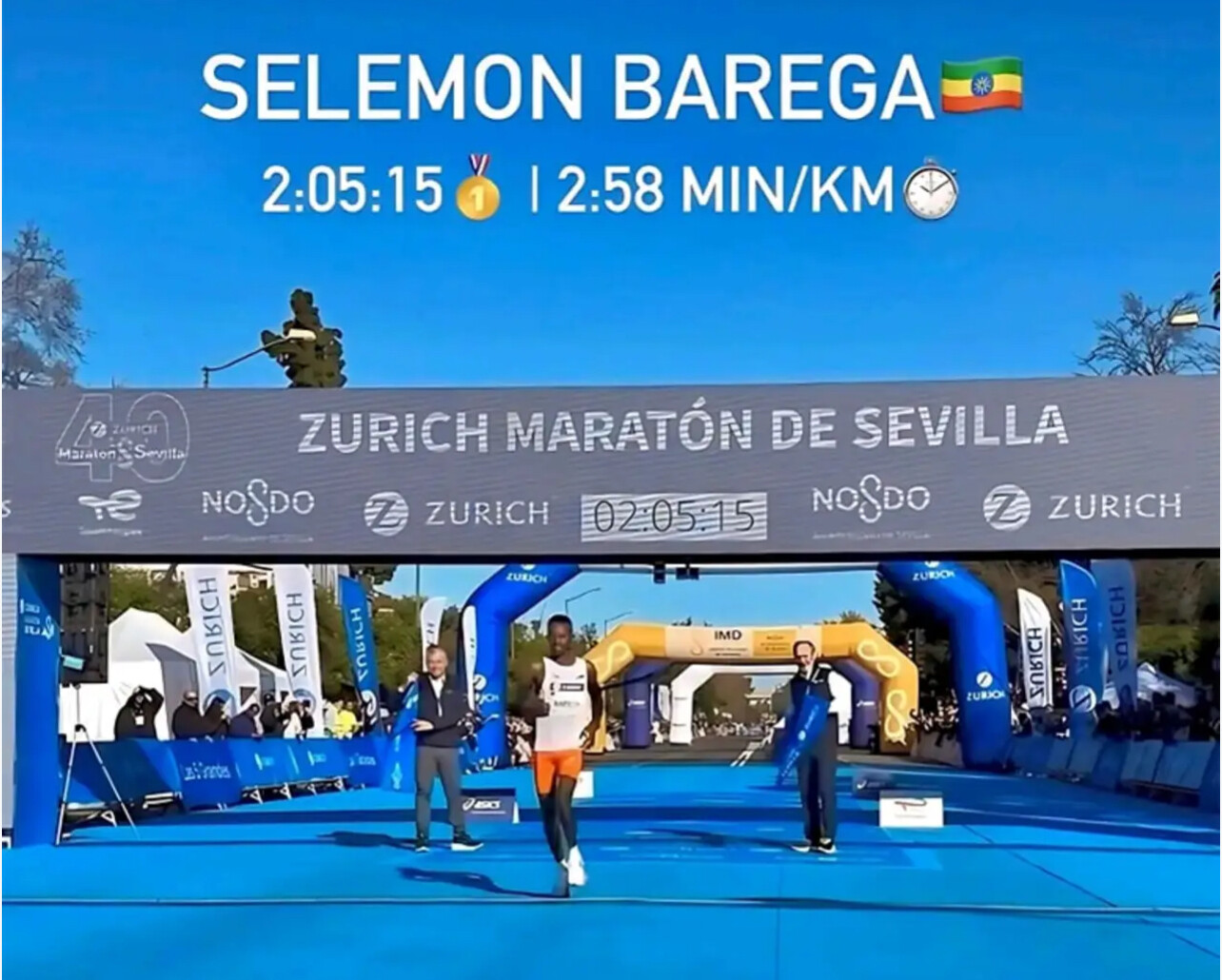
Barega’s performance not only secured his place among the marathon elite but also extended Ethiopia’s winning streak to six consecutive victories at the Seville Marathon.
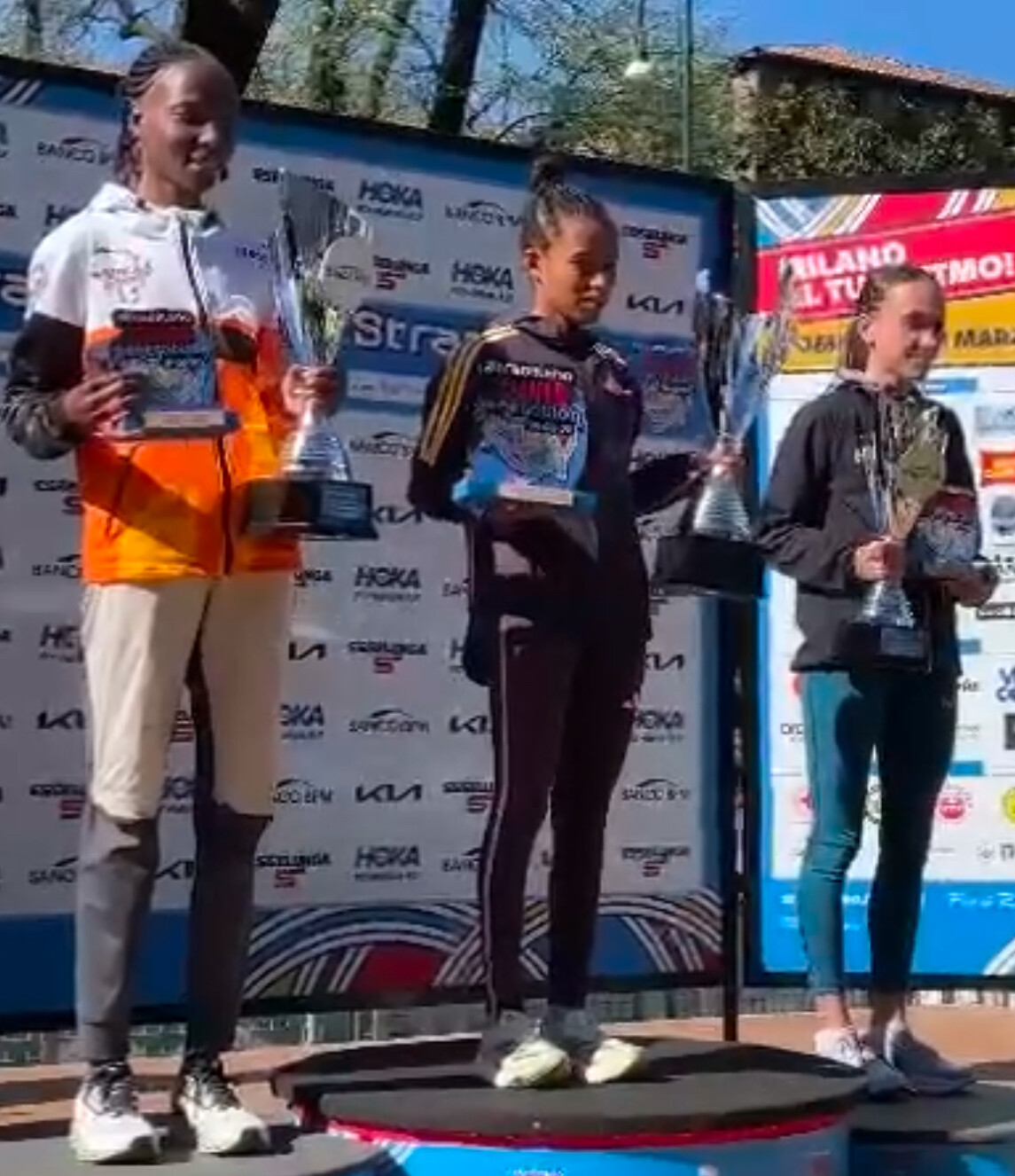
“I’m proud of this result. My training for the marathon has been intense, and Seville was the perfect place to debut. I hope to build on this and aim for even faster times,” Barega said after the race.
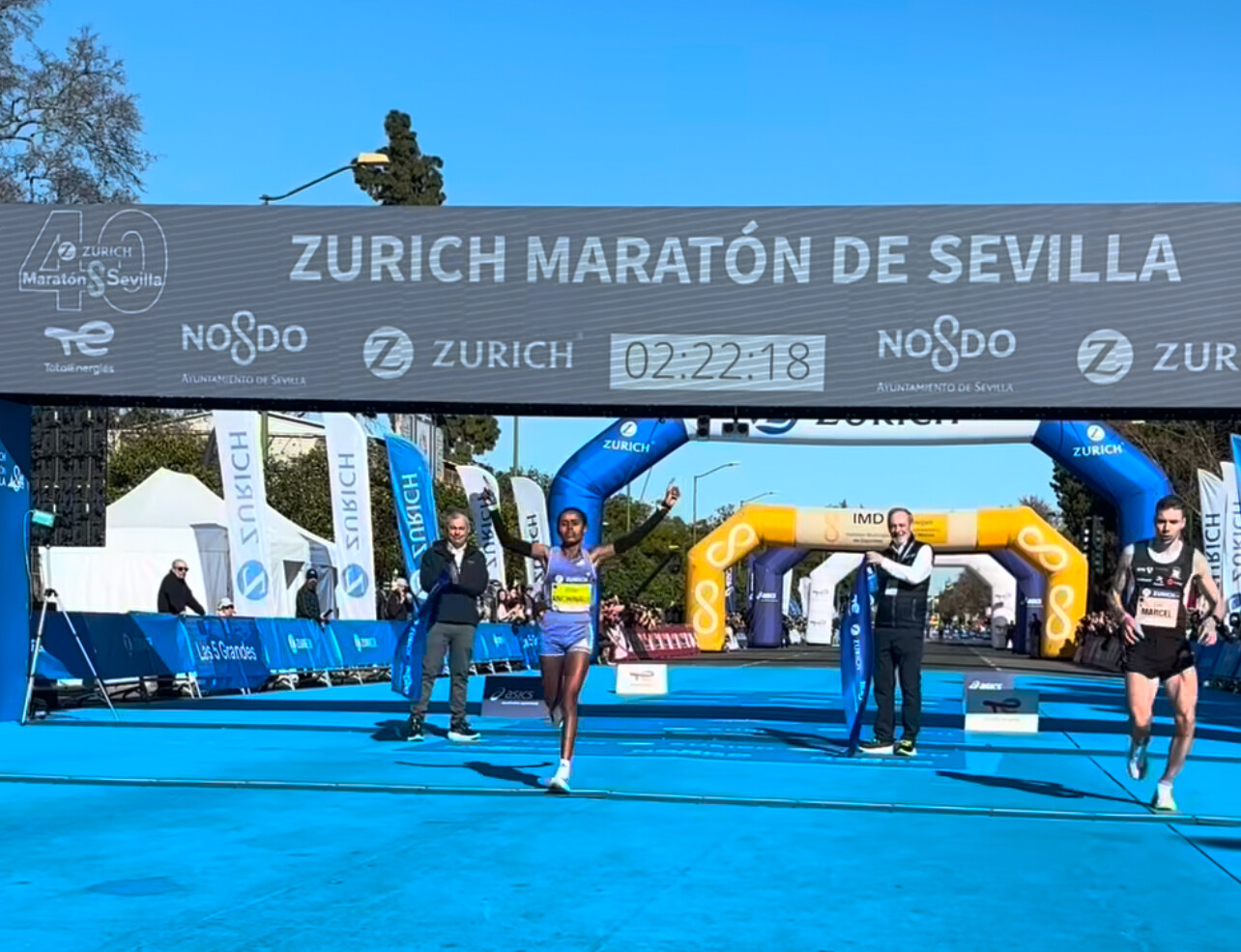
Women’s Race: Anchinalu Dessie Genaneh Triumphs
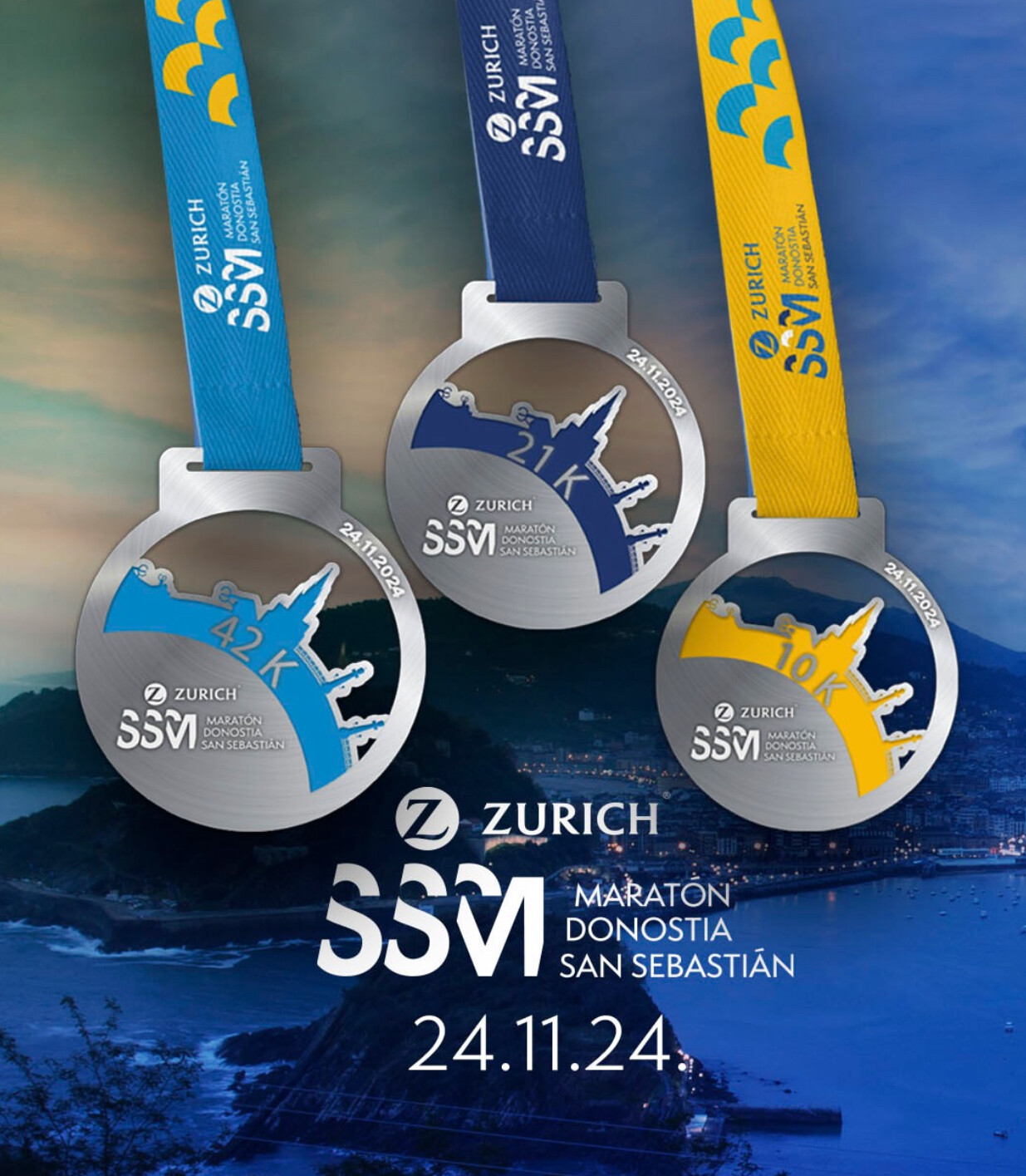
In the women’s race, Ethiopia’s Anchinalu Dessie Genaneh delivered a dominant performance, breaking the tape in 2:22:17. This victory further cemented Ethiopia’s success in Seville, with Dessie Genaneh holding off a strong international field.
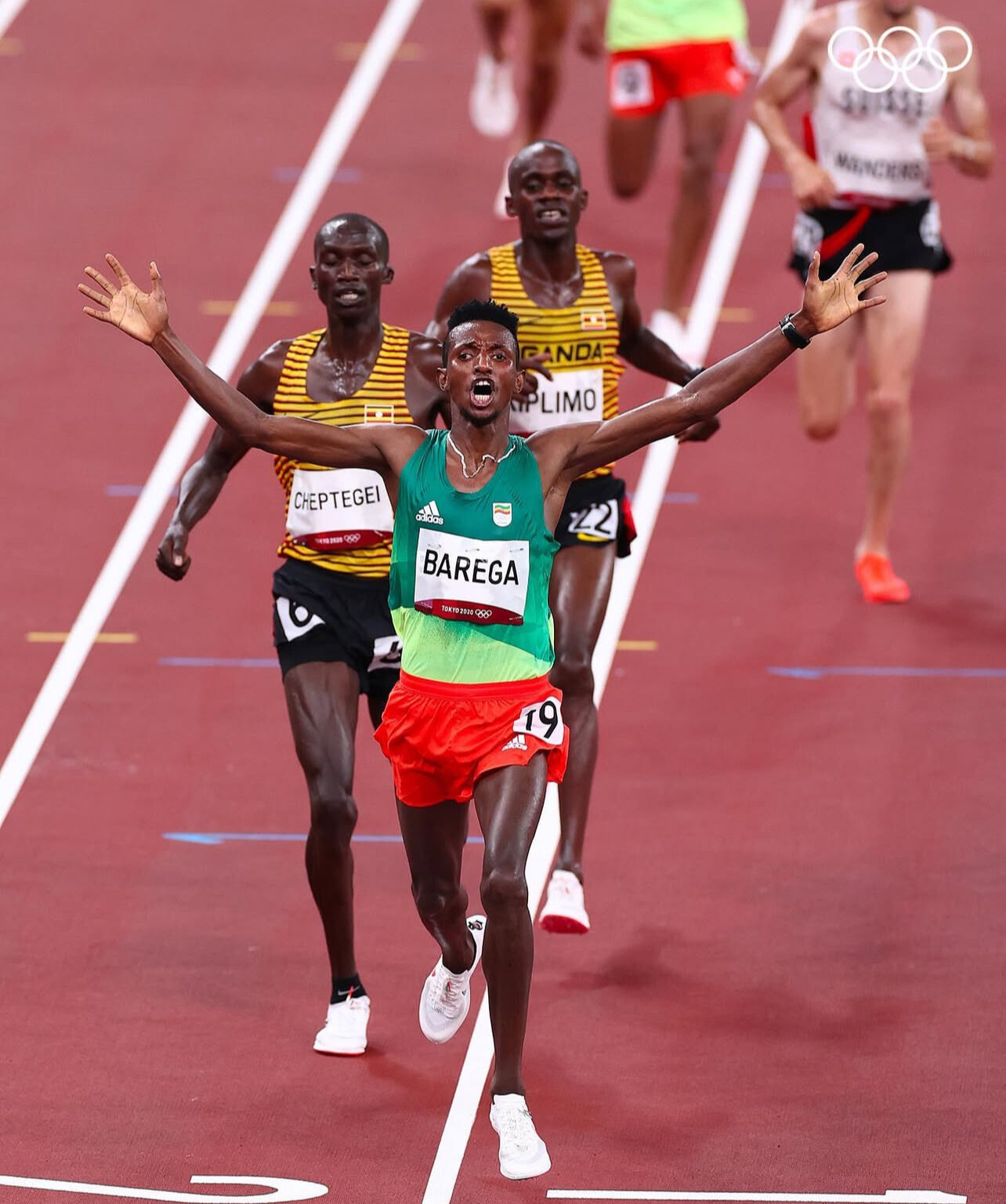
France’s rising star Manon Trapp took second place in 2:23:38, while Cynthia Chepchirchir Kosgei of Kenya secured third in 2:23:43.
Dessie Genaneh, already known for her strong half-marathon performances, proved she has the strength and speed to excel over the full 26.2 miles.
Selemon Barega: From Track Star to Marathoner
Born on January 20, 2000, in the Gurage Zone of Southern Ethiopia, Selemon Barega rose to prominence as a middle-distance prodigy. He clinched gold in the 5000 meters at the 2016 World U20 Championships and 3000 meters at the 2017 World U18 Championships.
In 2018, he set a world U20 record in the 5000 meters, clocking 12:43.02, one of the fastest times in history. His crowning achievement came at the 2020 Tokyo Olympics, where he won the 10,000 meters gold medal, solidifying his place among the sport’s elite.
Now, with a 2:05:13 marathon debut, Barega has proven that his talents extend far beyond the track. The running world will be watching closely as he targets future marathons and, possibly, world record attempts.
Record Participation and Global Appeal
The 2025 Zurich Maratón de Sevilla also witnessed record participation, with 14,000 runners from around the world lining up to tackle the fast, flat streets of Seville. Known for its ideal conditions and scenic course, the race continues to attract elite athletes and passionate amateurs alike.
With Selemon Barega’s stunning debut and Anchinalu Dessie Genaneh’s commanding victory, the 2025 Seville Marathon has once again proven itself as a stage for breakthrough performances. Both champions are now firmly on the radar as contenders for future World Marathon Majors and Olympic glory.
by Boris Baron
Login to leave a comment
Zurich Marathon Sevilla
This urban, flat, fast and beautiful brand new race course will drive athletes through the most beautiful monuments of the city. Zurich Maraton de Sevilla brings the unique opportunity to brake the Best personal result over the mythical distance to all the athletes, professional or age groupers, in one of the most perfect international marathon circuits. This fast marathon takes...
more...Ethiopian Sisay Lemma eyes successful Boston Marathon title defence against Kenyans John Korir, Cybrian Kotut & Co
Sisay Lemma is looking to replicate his 2024 success at this year's Boston Marathon but Kenyans John Korir and Cybrian Kotut are among those standing in his way.
Ethiopian marathon star Sisay Lemma is gearing up to defend his title at the 2025 Boston Marathon, set to take place on April 21.
Fresh off his thrilling victory in 2024, Lemma will look to replicate his success and conquer the demanding course once again.
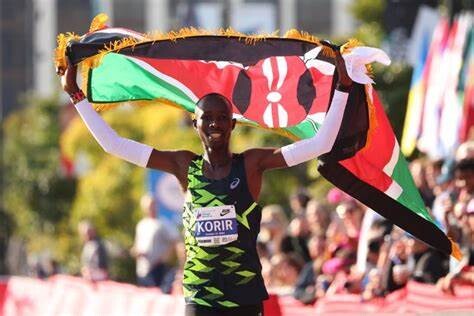
In the 2024 edition, Lemma surged ahead of a fierce field that included his fellow Ethiopian Mohamed Esa, as well as Kenyan marathon giants Evans Chebet and John Korir, who finished second, third, and fourth, respectively.
Lemma's winning time of 2:06:17 was a testament to his impressive form, but he remains aware of the heightened challenge awaiting him this year.
“I was very happy after winning the Boston Marathon last year, and in 2025 I know it will be an even bigger challenge to win again,” Lemma said via World Athletics, acknowledging the difficulty of repeating such a remarkable performance.
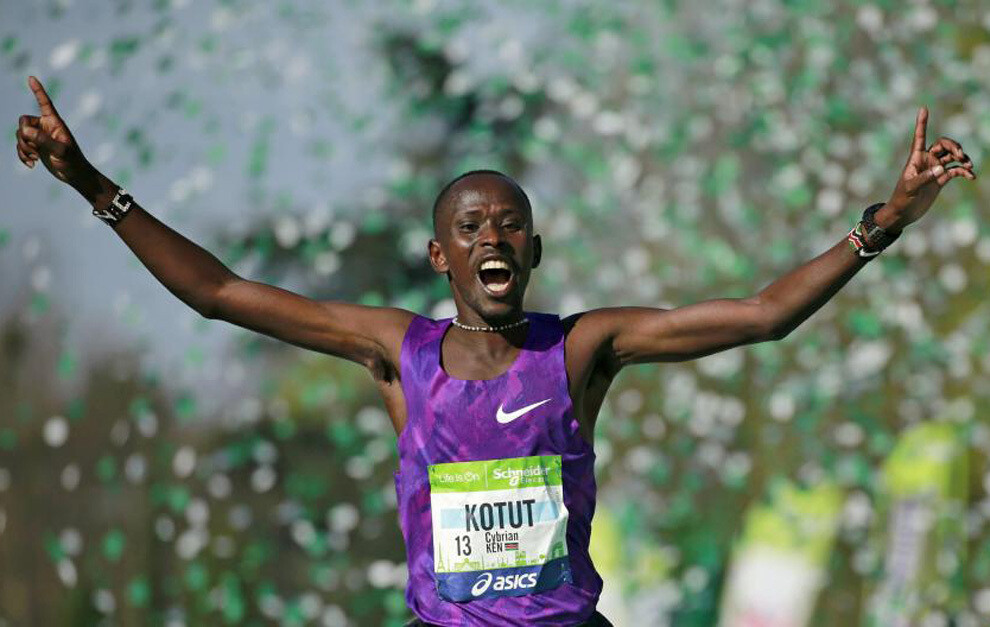
While the Boston Marathon holds a special place in his heart, Lemma’s 2024 season was marred by injury setbacks.
The Ethiopian was hoping to redeem his Olympic performance after a disappointing debut at the 2020 Tokyo Olympics, where he failed to finish the race.
Unfortunately, injury prevented him from competing in Paris in 2024, further hindering his plans for an Olympic comeback.
His struggles continued as he missed a podium finish at the Valencia Marathon that same December due to a lack of full fitness.
“I was unlucky, because of an injury, not to be able to participate at the 2024 Olympic Games in Paris and I was not completely ready at the Valencia Marathon last December,” Lemma confessed.
Now, with the Olympics behind him, Lemma has set his sights firmly on the Boston Marathon. Despite the challenges of the past year, he remains confident in his preparation.
“I will be 100% ready in April because the Boston Marathon is a special event,” Lemma asserted, emphasizing the importance of the race in his career.
However, Lemma will face stiff competition. Among the challengers is last year’s bronze medalist, Kenyan marathon star Evans Chebet, who clocked 2:07:22, just behind Lemma’s winning time.
Chebet, who has proven his endurance and speed on the Boston course, will be looking to outpace the Ethiopian this time around.
He will be joined by a strong Kenyan contingent, including John Korir, who finished fourth last year, as well as Cybrian Kotut, Daniel Mateiko, Abel Kipchumba, and Albert Korir.
With a fierce field and his sights set on history, Lemma’s journey toward a successful title defense will undoubtedly be one of the highlights of the 2025 marathon season.
by Stephen Awino
Login to leave a comment
Boston Marathon
Among the nation’s oldest athletic clubs, the B.A.A. was established in 1887, and, in 1896, more than half of the U.S. Olympic Team at the first modern games was composed of B.A.A. club members. The Olympic Games provided the inspiration for the first Boston Marathon, which culminated the B.A.A. Games on April 19, 1897. John J. McDermott emerged from a...
more...'This is my favorite course' - Tamirat Tola reveals what gives him confidence ahead of New York Marathon title defence
Tamirat Tola is counting on experience to drive him to another New York Marathon victory as bids to make further history.
Ethiopia's Tamirat Tola is looking to become the first man ever to win both the Olympics and in New York marathons in the same season as he gears up for the New York City marathon on Sunday, November 3.
The Ethiopian faces a herculean task to defend his title despite his remarkable 2024 season.
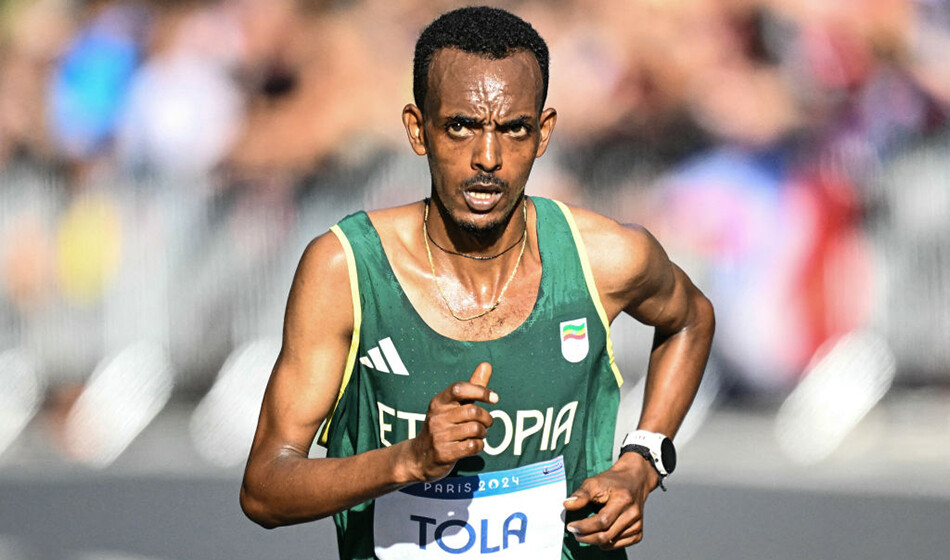
A year ago, the Ethiopian distance runner captured his first marathon major in New York City, and in July, he became the first man from his country to win an Olympic marathon title since Sydney 2000. Now a national hero, he wants to defend his title in New York and is banking on the Paris experience.
"This is my favorite course. My coach gave me very hard training coming in; that’s very important for me. My body is OK. On Sunday we will see,” Tola told Olympics.com. The 33-year-old bagged bronze both at the 2020 Tokyo Olympics and the 2023 London Marathon.
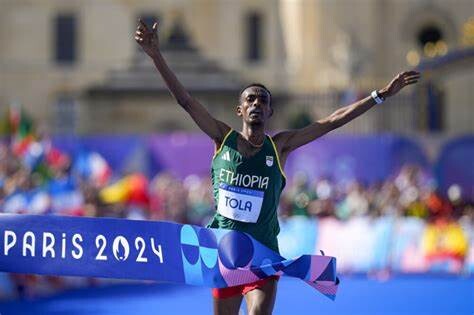
Tola is confident of crossing the finish line first and believes his mentality will make the difference. "I arrive with confidence; I feel good mentally, so I think I can win. I expect I'll have a good race. And I can see if there's anything that I can improve on moving forward," the 2022 World Championships gold medalist added.
Tola is trying for history on Sunday even though no man has successfully defended his title since Geoffrey Mutai won two in a row in 2011 and 2013 (the 2012 race was canceled); while only Peres Jepchirchir on the women’s side has won the Olympics and New York in the same year (2021).
by Evans Ousuru
Login to leave a comment
TCS New York City Marathon
The first New York City Marathon, organized in 1970 by Fred Lebow and Vince Chiappetta, was held entirely in Central Park. Of 127 entrants, only 55 men finished; the sole female entrant dropped out due to illness. Winners were given inexpensive wristwatches and recycled baseball and bowling trophies. The entry fee was $1 and the total event budget...
more...Olympic heptathlete found safe after two-week disappearance
The two-time Olympic heptathlete Odile Ahouanwanou of Benin has returned home "safe and sound" after missing for 17 days.
Olympic heptathlete Odile Ahouanwanou of Benin has been found safe in France after disappearing for two weeks. The 33-year-old was last seen on Sept. 10, after dropping her child off at a daycare center in Sotteville-lès-Rouen, France.
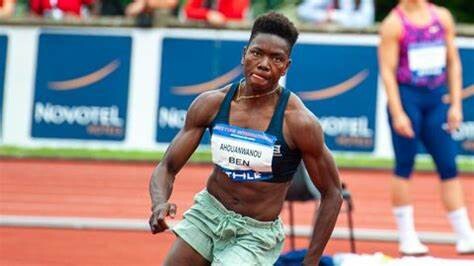
According to a report from Le Parisien, Ahouanwanou returned home on the night of Sept. 26. However, the details surrounding her disappearance remain unclear and police are continuing to investigate.
Ahouanwanou’s sudden disappearance was a mystery in France and Benin, where she is a prominent figure in the sport of track and field. She is a double gold medalist at the African Championships and the Beninese national record holder in the heptathlon.
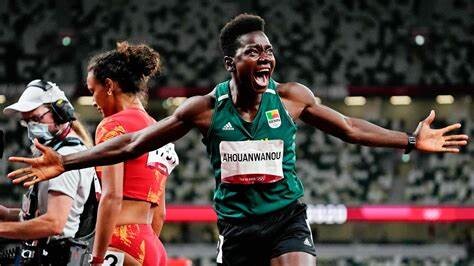
On Sept. 18, Ahouanwanou was placed on the wanted persons list. Investigators looked into her lifestyle habits, interviewed members of her inner circle, and reviewed data from her mobile phone and bank accounts. French police are still considering the possibility of a voluntary disappearance. The investigation is still ongoing.
Despite intensive searches and public appeals, the exact reason behind her disappearance has not yet been disclosed.
Ahouanwanou placed 15th in the heptathlon at the 2020 Tokyo Olympics and finished eighth at the 2019 World Championships in Doha. Her best score of 6,274 points is the national record for Benin.
by Marley Dickinson
Login to leave a comment
2024 Bank of America Chicago Marathon Elite Athlete: Daniel Ebenyo will make his long-awaited marathon debut
Kenyan long-distance runner Daniel Ebenyo will make his long-awaited marathon debut at the 2024 Bank of America Chicago Marathon.
Ebenyo has yet to run a competitive marathon. But in his most recent race, he won the 2024 Berlin Half Marathon, running a scorching 59:30.
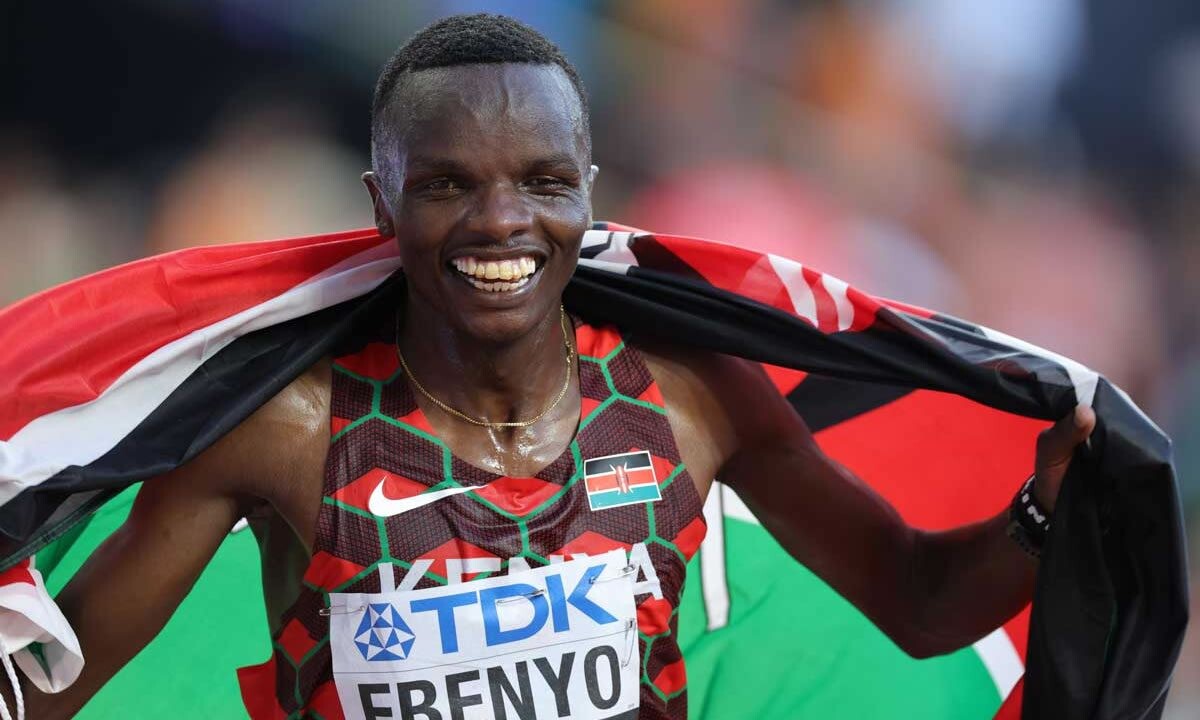
Ebenyo, 29, is the reigning World silver medalist in the 10,000-meter run and in the World Championship Half Marathon.
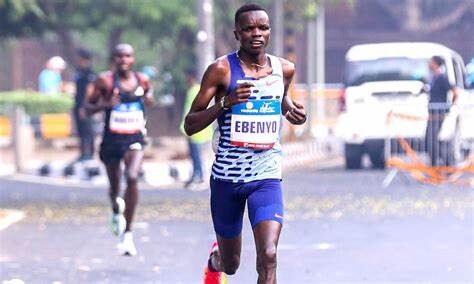
He's a three-time Kenyan national champion in the 5,000-meter run; he competed at the 2020 Tokyo Olympics in the same event, finishing 10th.
He's run a slew of half-marathons. His best time of 59:14 came from the World Athletics Running Championships, where he took second place.
Login to leave a comment
Bank of America Chicago
Running the Bank of America Chicago Marathon is the pinnacle of achievement for elite athletes and everyday runners alike. On race day, runners from all 50 states and more than 100 countries will set out to accomplish a personal dream by reaching the finish line in Grant Park. The Bank of America Chicago Marathon is known for its flat and...
more...Two-time Olympic heptathlete reported missing in France
On Sept. 10, Odile Ahouanwanou of Benin dropped off her son at a nursery and has not been seen since.
French authorities are searching for Odile Ahouanwanou, an Olympic heptathlete, who has been missing since Sept. 10. The 33-year-old, who represented the small west African nation of Benin at the 2012 and 2020 Olympics, was last seen in Rouen dropping off her child at a nursery on the morning of Sept. 10. She did not return to pick up her son, and was later reported missing.
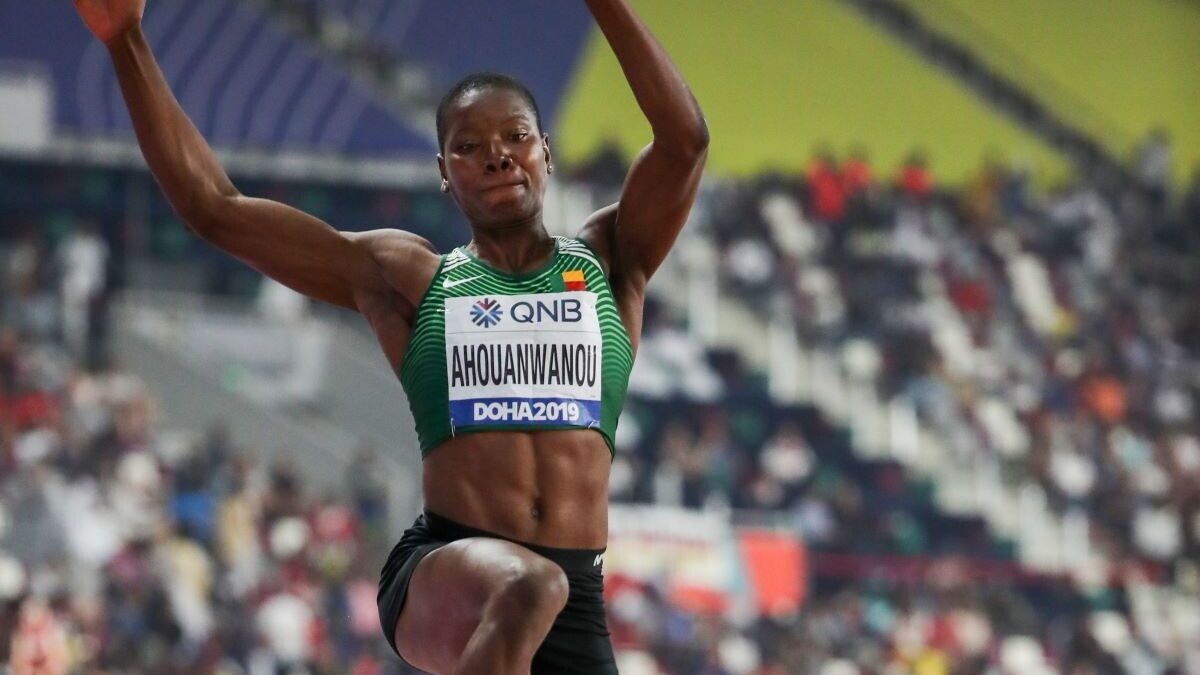
According to a report from France Bleu, the police are considering the possibility of a voluntary disappearance. This scenario refers to a situation where a person deliberately goes missing without being a victim of a crime or other external factors. People may voluntarily disappear for various personal reasons, such as to escape financial difficulties or to start a new life.
Ahouanwanou placed 15th at the 2020 Tokyo Olympics and eighth at the 2019 World Championships in Doha. Her best score of 6,274 points stands as the Benin national record.
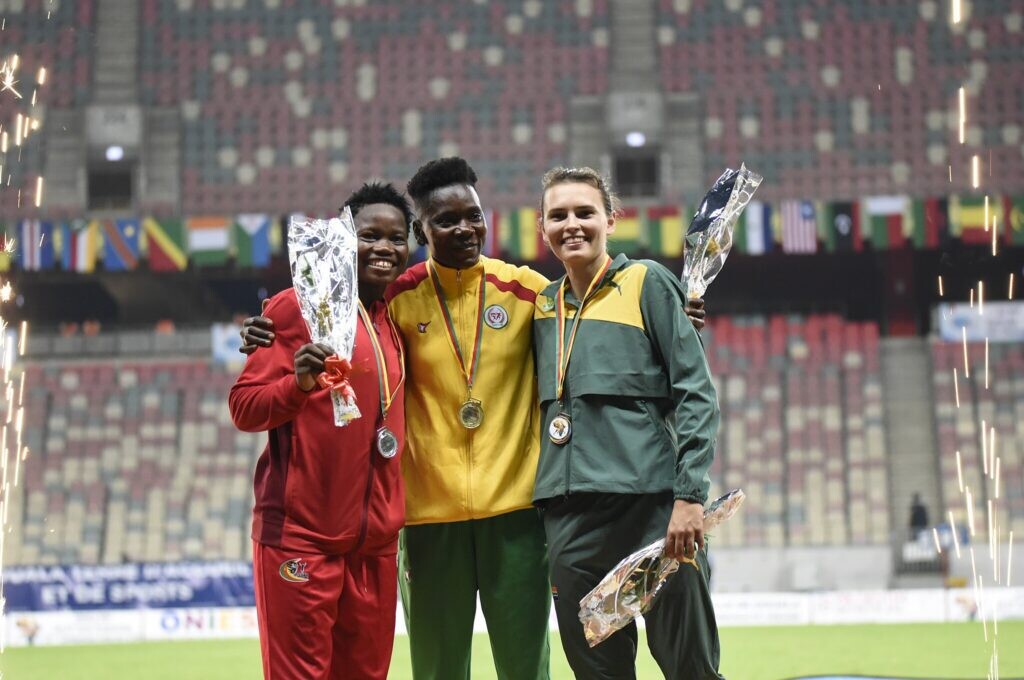
French police have reportedly registered Ahouanwanou in the national wanted persons file, questioned witnesses and examined her daily habits. They are also working with phone operators, hospitals, banks and airlines to help trace her steps. The athlete’s Volkswagen Polo is believed to be in use, although no sightings have been confirmed.
Authorities stress that, at this stage, there is no evidence to suggest foul play, but the investigation remains open. Her son is currently in the care of a family friend. The police are looking to the public for any information that could help locate Ahouanwanou, and her disappearance remains a mystery.
by Marley Dickinson
Login to leave a comment
Eliud Kipchoge hints at retirement after 'worst marathon' at Paris Olympics
Eliud Kipchoge has hinted at ending his illustrious marathon career following a major setback at the Paris Olympics on Saturday.
Eliud Kipchoge hit the streets of Paris in the men’s marathon hoping to win his third Olympic title on Saturday morning.
However, the script did not go as planned as Kipchoge failed to finish the race. He was off to a great start but conditions worsened and he started trailing.
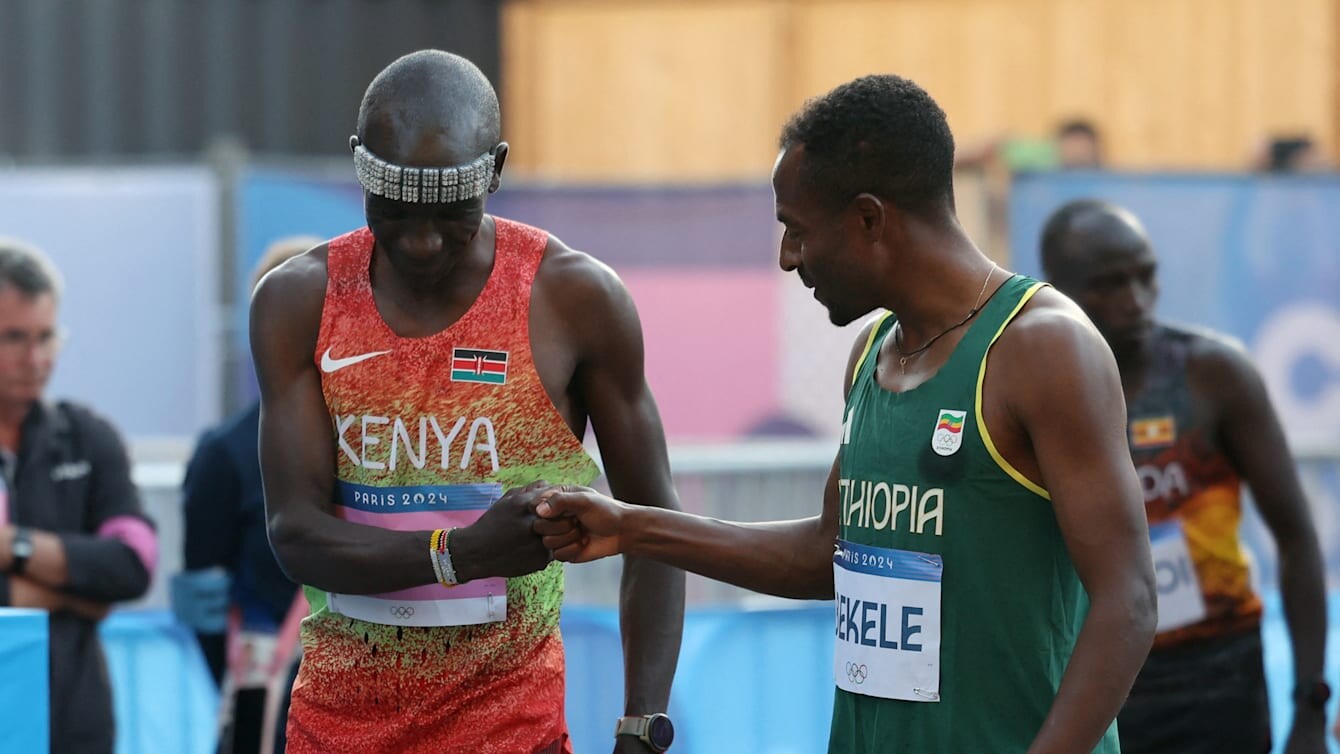
At some point in the race, the two-time Olympic champion was seen holding his left hip as though in pain but he kept going. It was until the 31km mark that Kipchoge could not continue with the race.
The five-time Berlin Marathon champion stood and waited for the last athlete Ser-Od Bat-Ochir to pass before he officially pulled out of the race.
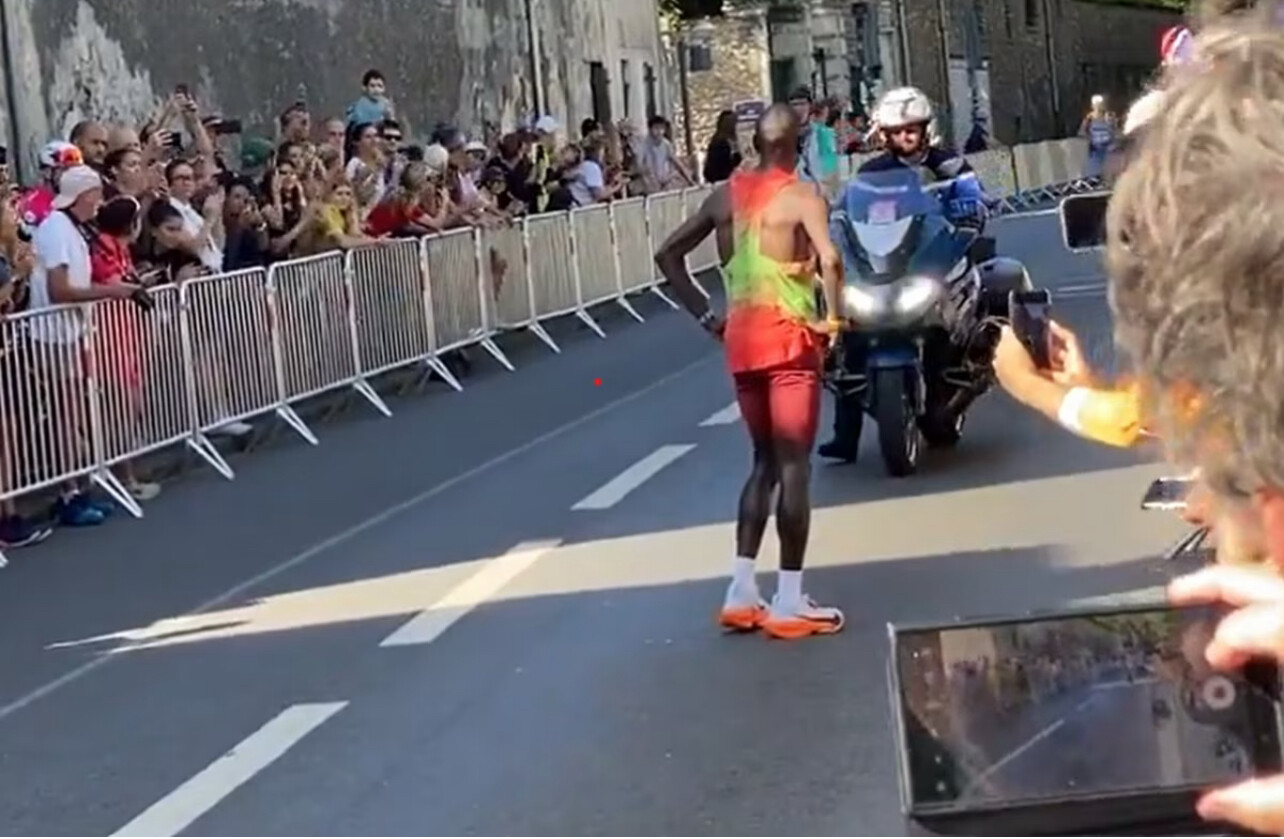
Following the setback, the four-time London Marathon champion told Olympics.com that the race was his worst marathon. Kipchoge had never recorded a DNF [Did not finish] until Saturday's race.
"This is my worst marathon. I have never done a DNF (did not finish). That’s life. Like a boxer, I have been knocked down, I have won, I have come second, eighth, 10th, fifth – now I did not finish. That’s life,” he said.
Kipchoge started his season on quite a low note, finishing 10th at the Tokyo Marathon won by Benson Kipruto. He hinted at not being mentally okay following threats to his life and that of his family after Kelvin Kiptum’s death.
At the Paris Olympics, Kipchoge was aiming to become the first marathoner to win three Olympic gold medals. He started his winning streak at the 2016 Rio Olympic Games before defending his title at the delayed 2020 Tokyo Olympics.
The marathon legend then hinted at calling time on his illustrious career.
“It is a difficult time for me. You will see me in a different way, maybe giving people motivation, but I will not run," he said.
"I don't know what next. I need to go back [home], sit down, try to figure my 21 years of running at high level. I need to evolve and feature in other things.”
by Abigael Wagula
Login to leave a comment
Paris 2024 Olympic Games
For this historic event, the City of Light is thinking big! Visitors will be able to watch events at top sporting venues in Paris and the Paris region, as well as at emblematic monuments in the capital visited by several millions of tourists each year. The promise of exceptional moments to experience in an exceptional setting! A great way to...
more...Kenya's hopes rest on Daniel Mateiko, Nicholas Kimeli & Bernard Kibet to win 10,000m gold since 1968
Daniel Mateiko, Nicholas Kimeli, and Bernard Kibet will have the pressure to deliver Kenya's gold medal since Naftali Temu's exploits at the 1968 Mexico City Olympics.
The trio of Daniel Mateiko, Nicholas Kimeli and Bernard Kibet are tasked with a daunting task to reclaim Kenya’s 10,000m title once they toe the line at the Stade de France on Friday, August 2.
The men’s race starts at 10:20 p.m. East African Time with the trio taking on one of the strongest fields in history with the main aim to reclaim Naftali Temu’s title won at the 1968 Mexico City Olympics.
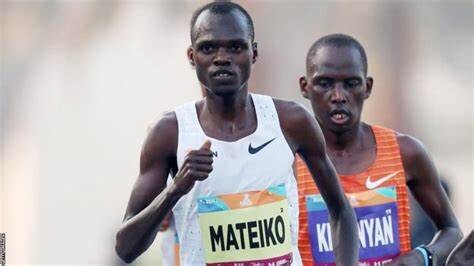
Kenyans have had a rough time of winning the gold medal following the emergence of Ethiopians and Ugandans who have dominated the race. Kenenisa Bekele, Mo Farah, Joshua Cheptegei have dominated the global stage with Bekele and Farah winning two titles each.
Selemon Barega won the title at the delayed 2020 Tokyo Olympic Games with Cheptegei and Jacob Kiplimo taking second and third place respectively.
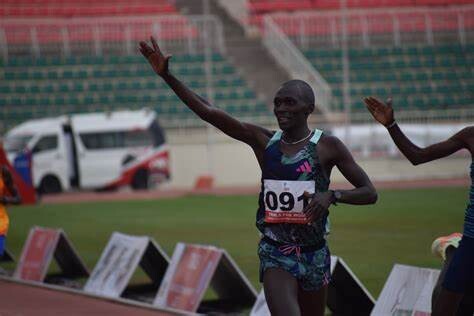
Mateiko made headlines, winning the Prefontaine Classic to secure his slot to the Olympic Games with Kimeli and Kibet finishing second and third respectively. The trio has the much-needed confidence to impress following their training sessions that have been extensive so far.
Mateiko and Kimeli train with Eliud Kipchoge and they certainly draw inspiration from the two-time Olympic champion who will also be chasing his third Olympic title.
However, they will not have an easy task in title reclamation as they go up against very strong opponents. Defending champion Barega will be out to defend his Olympic gold with Cheptegei also in the mix.
Being the world record holder and a three-time world champion, Cheptegei will going for the only title missing in his decorated CV. The Ethiopians have fielded their best, with world leader Yomif Kejelcha and Berihu Aregawi also in the mix. Paris marks the first Olympics for Kejelcha who will have the pressure on him after the world lead.
Cheptegei has raced sparingly, making it difficult to gauge his shape. He will be competing for the first time since end of May when he finished ninth in the 5000m at the Diamond League Meeting in Oslo.
The American duo Grant Fisher and Nico Young have also been entered and they will also be chasing history for the US. Young will b debuting at the Olympics and the race will just be his third 10,000m race on a track.
On his part, Fisher has great experience racing on the global stage and after finishing fifth at the delayed 2020 Tokyo Olympics, he will be out to improve on that.
by Abigael Wafula
Login to leave a comment
Paris 2024 Olympic Games
For this historic event, the City of Light is thinking big! Visitors will be able to watch events at top sporting venues in Paris and the Paris region, as well as at emblematic monuments in the capital visited by several millions of tourists each year. The promise of exceptional moments to experience in an exceptional setting! A great way to...
more...Ekwam looks to leave a mark at the Paris Olympics
Zablon Ekwam is keen to leave his mark in the 400m event at the Paris Olympics after securing his qualification time at the Kip Keino Classic last week.
Ekwam powered to fourth place in 44.69 seconds, closely trailing Botswana’s Leungo Scotch at 44.54. Bryce Deadmon of the USA took second (44.41), while Botswana’s Bayapo Ndori clinched the title (44.10).
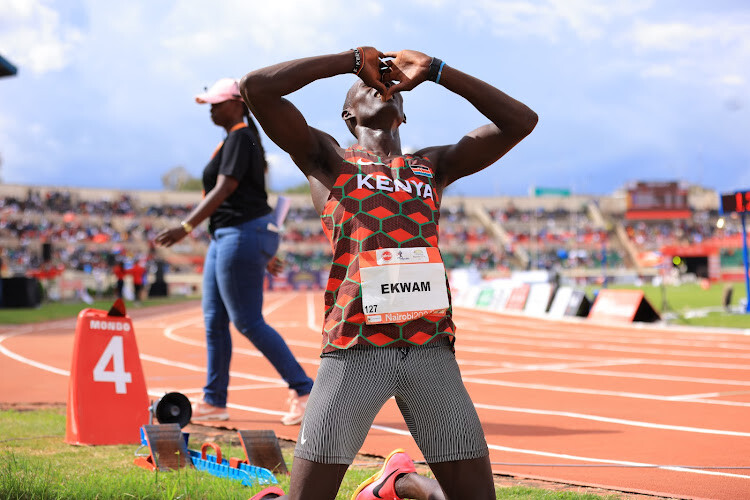
With the 2024 Olympic mark set at 45.00 for men and 50.95 for women, Ekwam’s performance puts him in prime position for the global showdown.
“The Olympics is the climax of any sporting event and every athlete's dream is to make it to the global showpiece. I look forward to making my mark in Paris,” Ekwam remarked.
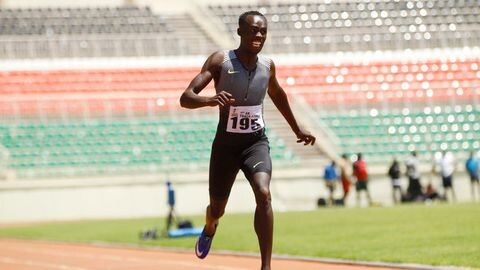
Ekwam highlighted the privilege of representing the country in an event where few Kenyan athletes qualify. “Representing the country in an event where there are not as many athletes qualifying is a nice feeling,” he stated.
Kenya has only secured two medals at the Olympics in the 400m, first at the 1972 Olympics in Munich, where Julius Sang clocked 44.92 to secure bronze and in 1992 in Barcelona, where the late Samson Kitur also won bronze in 44.24.
The last athlete to represent the country at the Olympics in the 400m was Emmanuel Korir at the 2020 Tokyo Olympics, where he was disqualified for a false start.
Despite missing out on the 2020 Tokyo Olympics, Ekwam remains determined to post impressive results this time around.
“I have been fighting for this spot for four years. I missed out on the 2020 Tokyo Olympics because I did not make the cut,” he stated.
He pointed out that consistent training was the key to making the Olympic team. “I went back to training consistently for three years to make the 2024 Olympics.”
Ekwam’s dedication paid off, as he recently contributed to shattering two African records with the 4x400m men’s relay team at the World Athletics Indoor Championships in Glasgow, Scotland in March.
He was in the company of Wiseman Were, Boniface Mweresa and Kelvin Tauta.
Looking ahead, Ekwam is also set to represent Kenya at the World Relay Championships in Nassau, Bahamas as he seeks to showcase his prowess in the 4x400m mixed relay.
He will be joined by Were, Kennedy Kimeu, Mercy Chebet, Mary Moraa and Maureen Thomas as they hunt for a top-14 finish that will secure Olympic qualification for the relay team.
by Teddy Mulei
Login to leave a comment
Paris 2024 Olympic Games
For this historic event, the City of Light is thinking big! Visitors will be able to watch events at top sporting venues in Paris and the Paris region, as well as at emblematic monuments in the capital visited by several millions of tourists each year. The promise of exceptional moments to experience in an exceptional setting! A great way to...
more...'I’ve found my spot in Iten'- Belgian marathoner training in Kenya ahead of Paris 2024 Olympics
A Belgian long-distance runner has opened up about how training in Kenya has changed his mindset ahead of the Paris 2024 Olympic Games.
Koen Naert, a Belgian long-distance runner loves training in Kenya and he also has a favorite spot he loves training at as he gears up for the Olympic Games in Paris, France later this year.
The 34-year-old already qualified for the Olympic Games, clocking a stunning personal best of 2:06:56 at last year’s Rotterdam Marathon.
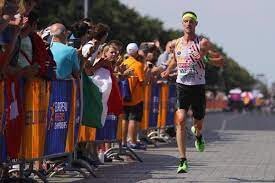
The Belgian is targeting a top-eighth finish after finishing 22nd at the 2016 Rio Olympics and then improved that with a 10th-place finish at the delayed 2020 Tokyo Olympics.
To achieve the goal, Naert has been burning the midnight oil in Kenya, and in an interview with Athletics Weekly, he explained how it feels training in his new-found spot in Iten.
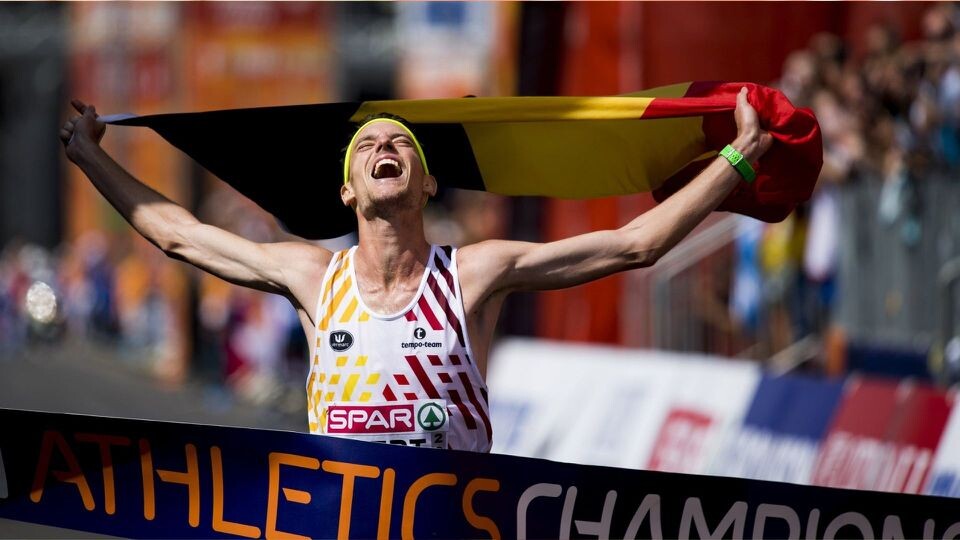
He explained that being in Kenya has helped him work on different aspects of his training since he is away from family and has time to work.
“It depends on the build-up. I think right now I’m doing 100km of running and a 50/60km alternative on the Elliptical Machine. In between my marathon blocks, I’ll do a lot of alternative training like aqua jogging but during the marathon block itself – the 12 weeks preceding my marathon – I’ll run 200km a week. Sometimes even 240km or 250km.
“I meditate at least twice a day and when I’m on camp at altitude I do a lot more sessions of meditation. That’s one advantage of being in Kenya. I also like to train in the US and have been to train with Deena Kastor’s group on occasion.
“Since 2021 however, I’ve found my spot in Iten. I waited a long time to go to Kenya because I was a little bit afraid of the food and life there but once you are on the ground, there’s no distraction and it’s a bit like living like a monk on a mountain,” he told Athletics Weekly.
He added that Olympic success for him would be to have to be honest with himself and he explained that he would need a little miracle to get on the podium.
“However, sometimes miracles exist and you never know. It will be challenging with the weather and the course. I will prepare myself the best I can but the top eight is my absolute goal. I was pretty close in Tokyo but we will see and every race/championship is different,” he said.
There are a lot of training camps in Kenya. One of the best is the KATA Running Retreat located near Thika. At any one time there are 20 or more athletes training at the Kenyan Athletics Training Academy (KATA).
by Abigael Wuafula
Login to leave a comment
Paris 2024 Olympic Games
For this historic event, the City of Light is thinking big! Visitors will be able to watch events at top sporting venues in Paris and the Paris region, as well as at emblematic monuments in the capital visited by several millions of tourists each year. The promise of exceptional moments to experience in an exceptional setting! A great way to...
more...Canadian marathoner Trevor Hofbauer to miss Paris Olympics due to injury
2020 Canadian Olympic marathoner Trevor Hofbauer will not be aiming for the final spot on the Canadian men’s marathon team. The 32-year-old revealed in a social media post that he will not be taking one more shot to make the 2024 Olympic Team, after injuring his Achilles tendon in training.
“After a disappointing outcome in Valencia, I was left looking at the stars for answers,” Hofbauer said on Instagram. “I was so upset that a great opportunity slipped through my fingers, and it was a hard pill to swallow, but I’ve been using it as motivation this winter to work towards one more shot at making the 2024 Olympic Team.
“Again, I’m looking up to the stars for answers after injuring my Achilles a couple of weeks ago. I will not be racing this spring, and for the first time in a long time, I will cheer on Team Canada from the couch. Luck plays a big role in making teams, and I feel like luck did not go my way this time. Also, thank you @saucony for being in my corner through this time.”
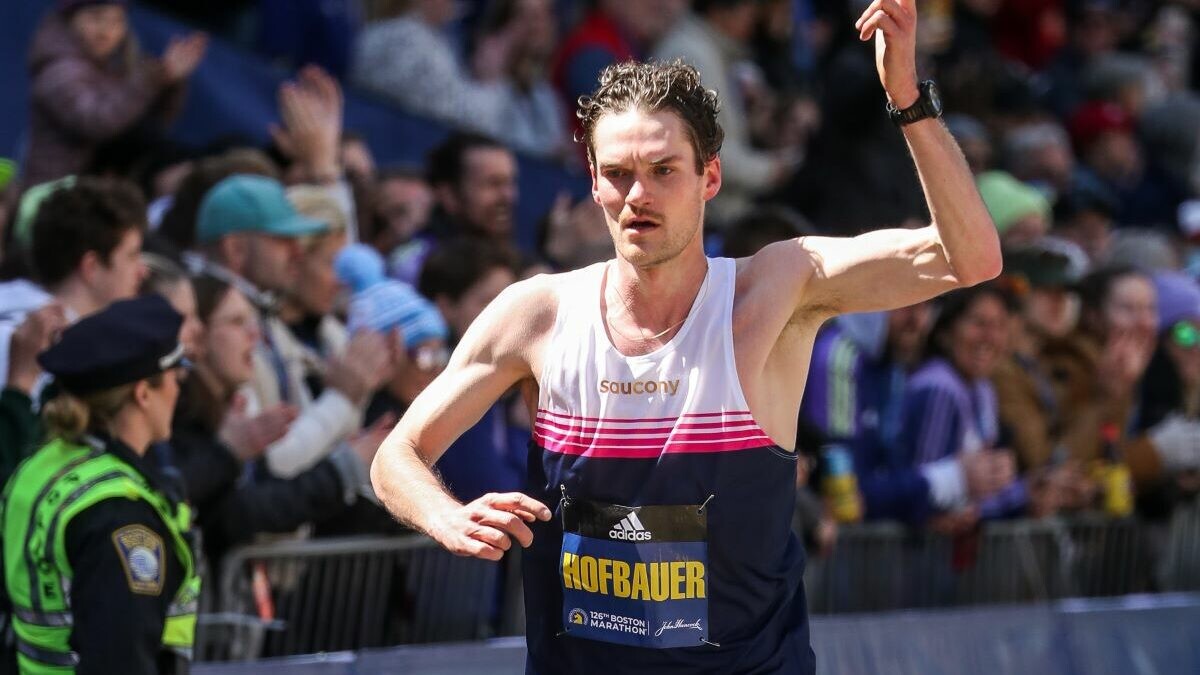
Hofbauer, a three-time Canadian marathon champion, represented Team Canada in the event at the 2020 Tokyo Olympics, where he placed 47th, in 2:19:57. He is only one of four Canadian men to run under the 2:10 mark for the marathon, and his personal best of 2:09:51 from the 2019 Toronto Waterfront Marathon stands as the sixth-fastest time in Canadian history.
The Burnaby, B.C., native gave qualifying for Paris a shot but came up well short of the men’s Olympic standard of 2:08:10 at the 2023 Valencia Marathon, finishing 175th overall, in 2:22:55—the slowest time of his career.
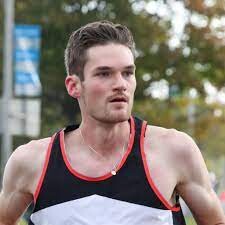
With the Olympic marathon window closing in less than 60 days, there are only two Canadian marathoners currently qualified for Paris (Cam Levins and Rory Linkletter). Ben Preisner, who also represented Canada in the marathon in 2021, is on the outside looking in—ranked 87th of 80 allotted spots. Preisner will likely need to run another marathon and hit the standard to move up in the rankings and punch his ticket to Paris.
Two other marathoners on the outside looking in are 2023 Canadian marathon champion Thomas Broatch and 2:10 marathoner Tristian Woodfine. Woodfine will be competing at the 2024 Boston Marathon, while Broatch eyes a late spring race after running 2:11 two months ago in Houston.
by Marley Dickinson
Login to leave a comment
Paris 2024 Olympic Games
For this historic event, the City of Light is thinking big! Visitors will be able to watch events at top sporting venues in Paris and the Paris region, as well as at emblematic monuments in the capital visited by several millions of tourists each year. The promise of exceptional moments to experience in an exceptional setting! A great way to...
more...Spanish Olympic medal suspended on whereabouts violations
On Wednesday, two-time world championship medalist and one of the top distance runners in the world, Mohamed Katir, was provisionally suspended for a year by the Athletics Integrity Unit (AIU) on whereabouts violations.
Katir was suspended for missing three doping tests in a 12-month window, which is a minimum one-year suspension per World Athletics anti-doping rules. This suspension will most likely leave the Spanish runner, who could otherwise contend for a medal in the 1,500m and 5,000m, out of the 2024 Paris Olympics. According to a statement from his agent in Spain’s Soy Corredor, Katir will appeal the suspension.
Katir is a two-time world championship medalist, winning silver in the men’s 5,000m in Budapest 2023, and bronze in the men’s 1,500m at Eugene in 2022. On both occasions, Katir was beaten by Norway’s Jakob Ingebrigtsen. Katir is also the European record holder over 5,000m, running 12:45.01 at the Monaco Diamond League–the 11th fastest time in history.
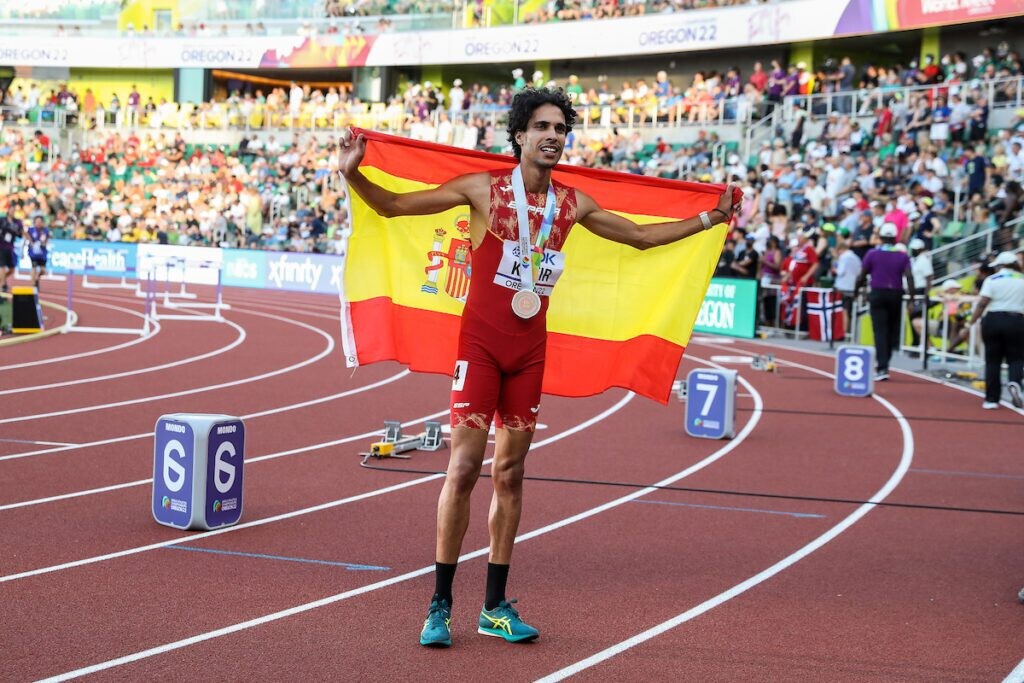
Katir last raced on Jan. 28, running 3:51.91 for the mile at the Meeting de l’Eure in France–the second fastest time in the world this year.
Katir had this to say in a statement (translated from Spanish):
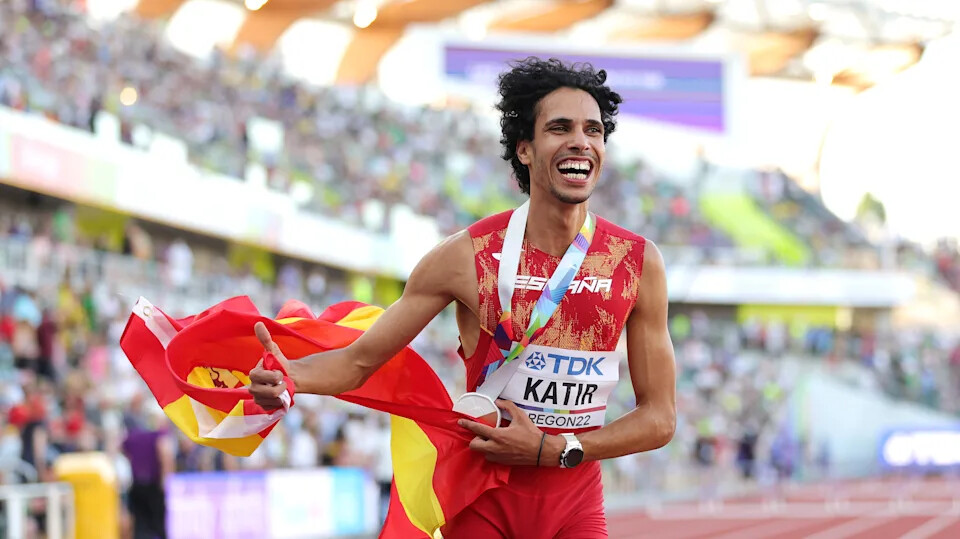
“Today, the Athletics Integrity Unit (AIU) has informed me of a provisional suspension due to what it considers to be a violation of the rules derived from three whereabouts failures in the last twelve months.”
“During the duration of the disciplinary proceedings, AIU has agreed to my provisional suspension. Since I do not agree with the above-mentioned decision taken by AIU, I am prepared to appeal against it to the appropriate authorities to be able to compete during the course of the proceedings.”
I do not consider that there is an infringement resulting from three whereabouts failures. In some of the whereabouts failures reported by AIU, I was available at the place, date and time provided by me. Over the last few months and years, I have been subjected to a large number of out-of-competition doping controls on both urine and blood samples, without the slightest problem on my part. I am going to proceed to defend myself in the appropriate instances, as it cannot be otherwise. For this reason, I request that the right to the presumption of my innocence be respected until the corresponding procedure is processed and concluded.”
His case will now be sent to the Court of Arbitration for Sport (CAS), the highest independent authority in international sport. During the appeal process, he is still eligible to compete, but he could end up facing a longer ban if he loses the appeal.
American 100m sprinter Christian Coleman was suspended under similar circumstances in 2019. Coleman appealed the whereabouts suspension, which was upheld by the CAS, leaving him out of the 2020 Tokyo Olympics.
by Marley Dickinson
Login to leave a comment
Paris 2024 Olympic Games
For this historic event, the City of Light is thinking big! Visitors will be able to watch events at top sporting venues in Paris and the Paris region, as well as at emblematic monuments in the capital visited by several millions of tourists each year. The promise of exceptional moments to experience in an exceptional setting! A great way to...
more...Ugandan middle-distance runner Prisca Chesang given two-year ban for masking agent
On Friday, the Athletics Integrity Unit (AIU) issued a two-year ban for two-time U20 world championship medalist Prisca Chesang of Uganda. Chesang tested positive for the banned diuretic and masking agent furosemide.
Chesang’s positive test came out-of-competition, at a training camp in Kapchorwa, Uganda, on Sept. 14. She was in Kapchorwa preparing for the women’s mile at the 2023 World Road Running Championships in Riga, Latvia, where she placed 18th overall, on Oct. 1.
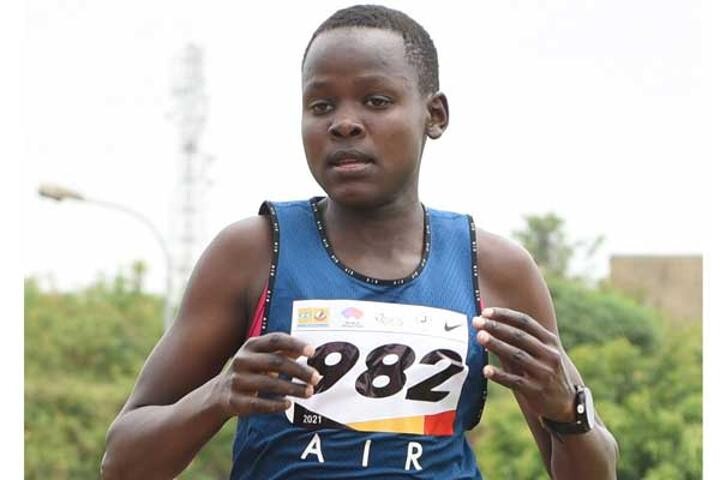
The 20-year-old is a two-time world U20 medalist in the women’s 5,000m, winning bronze at both the 2021 and 2022 U20 championships. According to the AIU, they did not discover any evidence that Chesang’s actions were intentional and therefore she was only given a two-year ban instead of four years. Chesang admitted to the Anti-Doping Rule Violation (ADRV); her result from the 2023 World Road Running Championships will be disqualified, and she will serve a two-year ban, until Dec. 6, 2025.
Furosemide is a diuretic, meaning it increases urine production, eliminating excess water and salt from the body. (It is also used for losing weight.) Furosemide also serves as a masking agent for other performance-enhancing substances that leave the body through urination, and therefore show up in a urine test. The drug has been prohibited by the World Anti-Doping Agency (WADA) for decades.
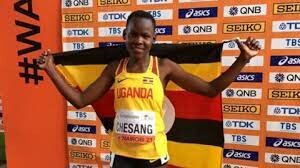
Chesang is one of Uganda’s top up-and-coming distance runners and represented the East African nation at the 2020 Tokyo Olympics in the women’s 5,000m (but failed to advance from the heats). Her top senior championship finish was a seventh-place result at the 2023 World XC Championships in Bathurst, Australia, helping Uganda’s women’s team win bronze.
Chesang is only the second female Ugandan runner to be suspended by the AIU. The country’s first came in Nov. 2023, when Janat Chemusto was given a four-year ban for the use of a prohibited substance.
by Marley Dickinson
Login to leave a comment
Grenadian Kirani James Teams Up with Chris Lawrence for Paris 2024 Olympics Preparation
Kirani James, the distinguished Grenadian 400m runner and Olympic medalist, is embarking on a new phase in his illustrious career as he prepares for the Paris 2024 Olympics. Under the guidance of his new coach Chris Lawrence, formerly an assistant to the late Harvey Glance, James is setting his sights on his fourth Olympic appearance.
This strategic coaching change aims to build upon Kirani James’ already impressive track record, which includes three Olympic medals in the 400 meters.
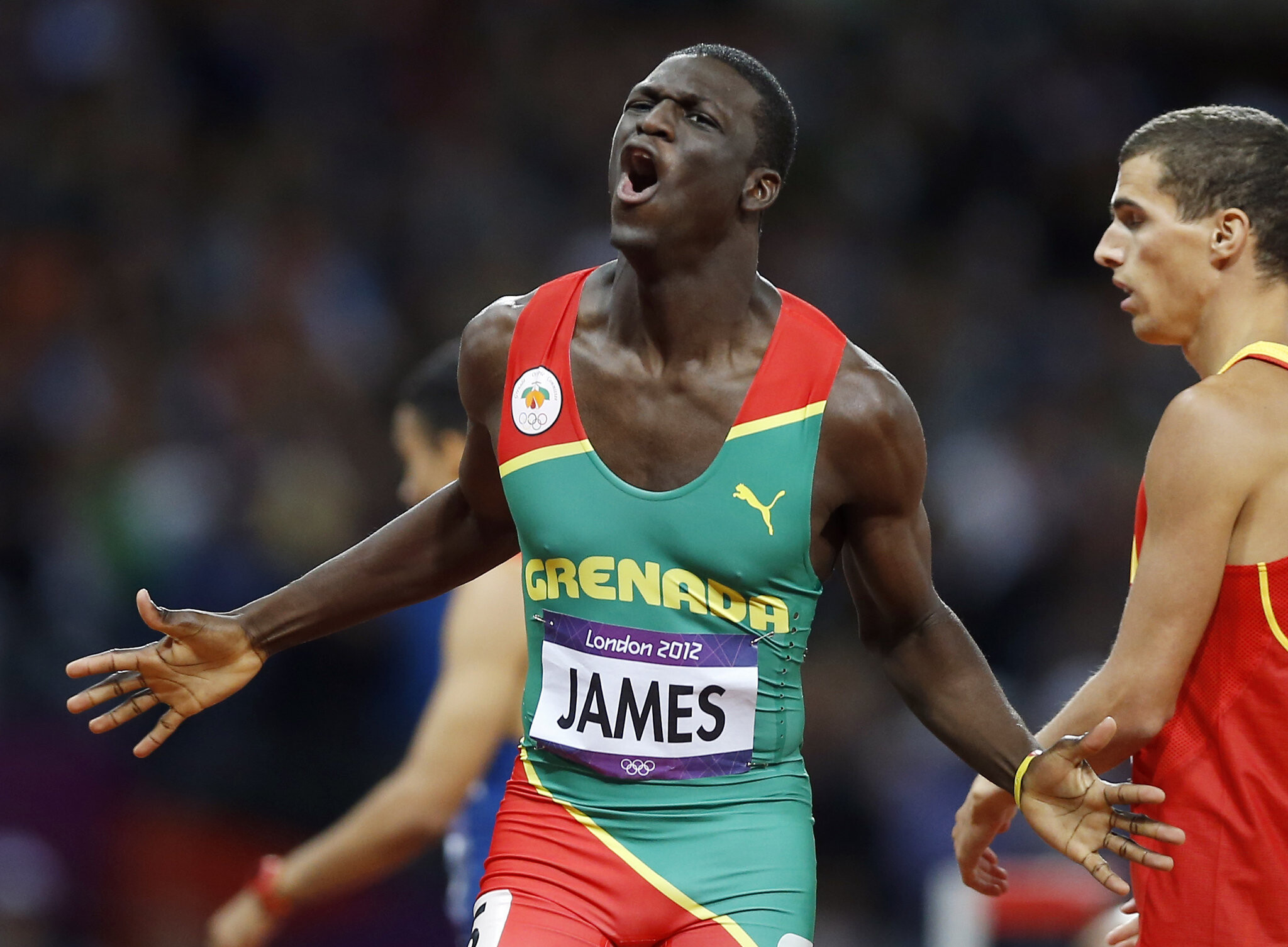
Kirani James Sets Sights on Paris Olympics under Guidance of Coach Lawrence
Kirani James concluded the previous season on a high note with a win at the Diamond League Final in Eugene. His decision to work with Lawrence reflects his commitment to continuing the legacy of Coach Glance. “I’m pleased that Chris will be able to accompany and help aide me to continue the journey and path set out by coach Glance,” James commented.
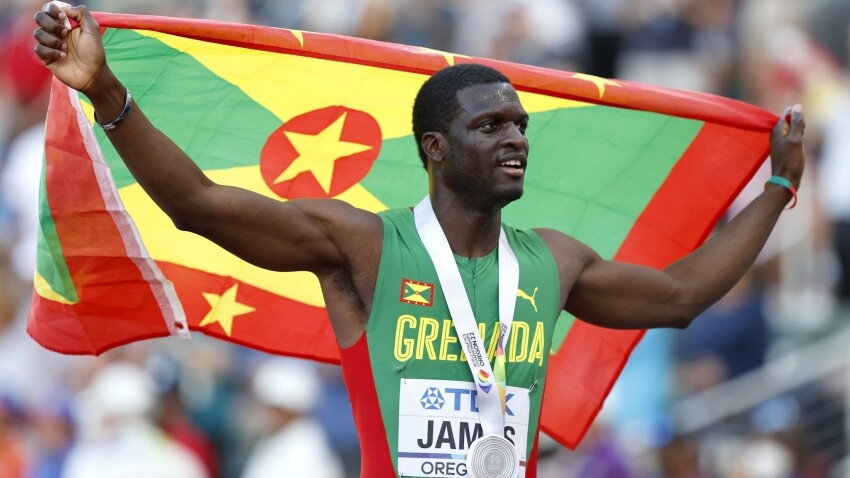
Kirani James’ journey in athletics has been nothing short of remarkable. He burst onto the scene with victories at the Carifta Games and the World Youth Championships in the 200m. He continued his rise by winning the World U20 (Junior) 400m title in 2010. His crowning achievement came with a gold medal at the 2012 London Olympics, followed by silver at the 2016 Rio Olympics and bronze at the 2020 Tokyo Olympics, making him the first athlete to win all three medals in the 100-year history of the event.
Additionally, James secured a silver medal at the 2022 World Championships in Eugene and a bronze at the 2015 World Championships in Beijing. He also claimed two Diamond League titles in 2022 and 2023, along with a Commonwealth Games gold medal in 2014. These accomplishments have established James as one of the elite athletes in the 400m discipline and Grenada’s first and only Olympic medalist.
As James and Lawrence collaborate towards the Paris Olympics, the athletics world will be eagerly watching. With his resilience, dedication, and proven track record, James is poised to add yet another chapter to his already legendary career in the world of athletics.
by Alfonz Juck
Login to leave a comment
Paris 2024 Olympic Games
For this historic event, the City of Light is thinking big! Visitors will be able to watch events at top sporting venues in Paris and the Paris region, as well as at emblematic monuments in the capital visited by several millions of tourists each year. The promise of exceptional moments to experience in an exceptional setting! A great way to...
more...Ethiopian marathon star Tsehay Gemechu suspended for anti-doping violation
On Thursday, the Athletics Integrity Unit (AIU) provisionally suspended top Ethiopian marathoner Tsehay Gemechu for the use of an unidentified prohibited substance, according to the athlete’s biological passport (ABP) data.
Gemechu is one of Ethiopia’s top distance runners. She was second at the 2023 Tokyo Marathon in 2:16:56—the ninth-fastest marathon time in history. Additionally, she holds personal bests of 14:29 over 5,000m and won the TCS World Bengaluru 10K in 31:38 earlier this year.
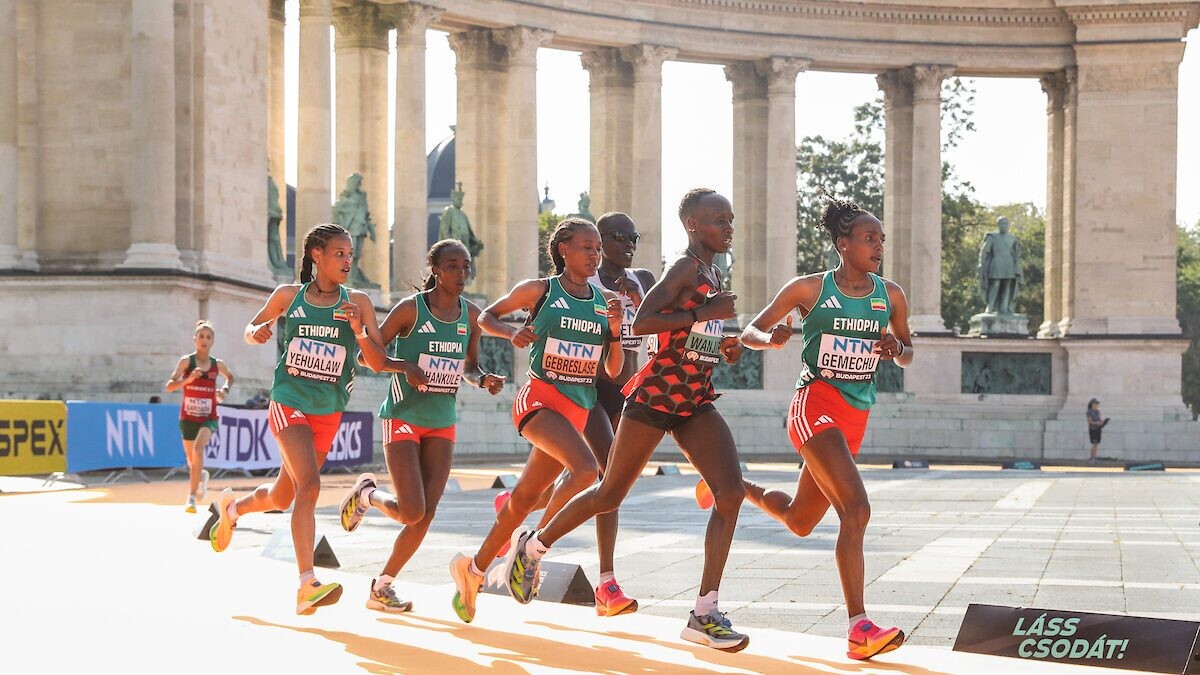
The 24-year-old was listed on the start list for the 2023 Valencia Marathon this weekend, but will be a scratch due to this provisional suspension. Under a provisional suspension, Gemechu is temporarily banned from participating in any athletic competition or activity before a final decision is reached at a hearing conducted under the World Athletics Anti-Doping Rules or the Integrity Code of Conduct.
ABP data monitors select biological parameters over time that may indirectly reveal the effects of doping. This approach enables the AIU to create individual, longitudinal profiles for each athlete and to identify any fluctuations that may indicate the use of performance-enhancing drugs.
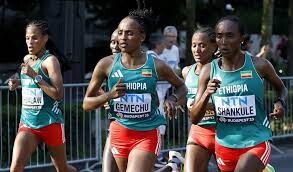
The profile for each athlete is generated based on statistics that utilize data from previous samples to predict the individual’s performance limits or range for future samples. According to the AIU, if any data from a test sample falls outside of the athlete’s range, it could be an indication of doping.
Gemechu represented Ethiopia at the 2020 Tokyo Olympics in the women’s 10,000m but was disqualified for lane infringement (TR 17.3.2.). One month later, she won the Copenhagen Half Marathon, setting a new course record and achieving a personal best of 65:08.
by Marley Dickinson
Login to leave a comment
World Athletics launches tracking tool for Olympic qualification
Finding out if your favorite athlete will qualify for the Paris 2024 Olympics has just become much more accessible. Earlier this week, World Athletics introduced a new online tool called “Road to Paris 2024,” designed to assist athletes, media and fans by providing real-time insights and an overview of athletes in a qualifying position.
Users of the tool can conveniently search for information by discipline, country, and qualification status, ensuring easy access to the data they need. The tool doesn’t, and will not, indicate which athletes have been selected for entry by their National Olympic Committee (NOC), as those lists will be published by each NOC closer to the 2024 Games.
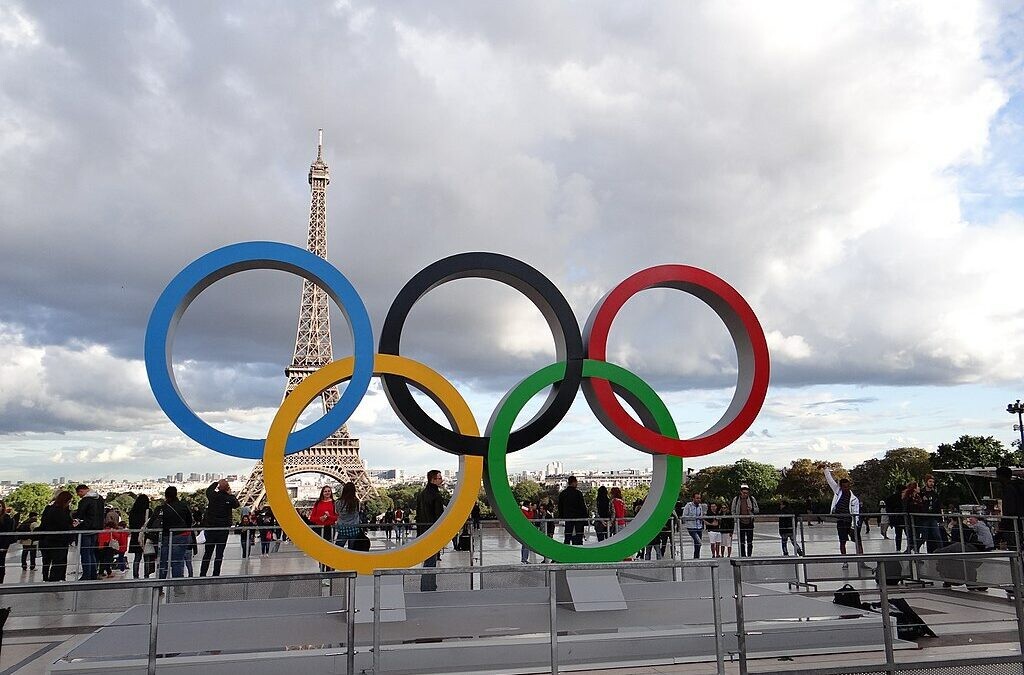
The qualification process for the 2024 Paris Olympics will be a similar arrangement to the 2020 Tokyo Olympics and the last two World Championships held in Eugene and Budapest. 50 per cent of athletes will qualify based on entry standards, while the remaining 50 per cent will have to secure their spots through the World Athletics world rankings.
The deadline for marathon, race walking events and 10,000m qualification is May 5, while athletes for all other events must be finalized by June 30.
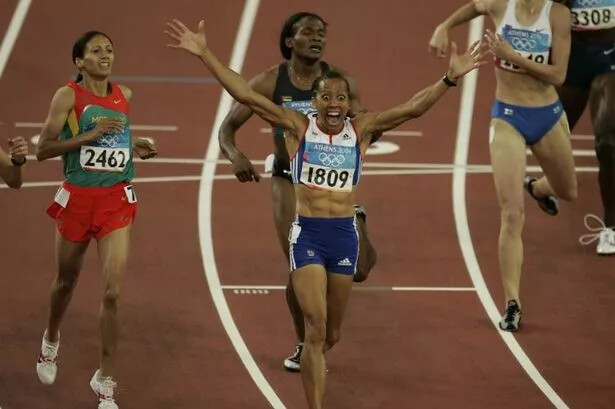
Team Canada sent 57 track and field athletes to the 2020 Tokyo Olympics, where they won six of Canada’s 24 medals (two gold, two silver, and two bronze), making it one of the most successful Olympic Games for Team Canada in history. This tied the mark of six from Rio and was only three behind the country’s best total of nine won at the L.A. Olympics in 1932.
The online qualification tool can be found at: https://worldathletics.org/stats-zone/road-to/7153115
by Marley Dickinson
Login to leave a comment
Paris 2024 Olympic Games
For this historic event, the City of Light is thinking big! Visitors will be able to watch events at top sporting venues in Paris and the Paris region, as well as at emblematic monuments in the capital visited by several millions of tourists each year. The promise of exceptional moments to experience in an exceptional setting! A great way to...
more...TCS Toronto Waterfront Marathon: elite women’s and men’s preview
For the first time in the 34-year history of the TCS Toronto Waterfront Marathon, the race has reached over 25,000 runners. Toronto has established itself as Canada’s premier marathon and has set a precedent in the global running community, with participants coming from 78 countries around the world for the marathon on Sunday, Oct. 15.
The elite field at the 2023 edition of the marathon looks significantly different from last year, and two new champions will be crowned on the men’s and women’s sides, as Ethiopia’s Yihunilign Adane and Kenya’s Antonina Kwamboi will not be returning. The 2023 elite field features up-and-coming stars, along with several American women aiming to achieve the Olympic standard of 2:26:50 ahead of the upcoming U.S. Olympic Trials in February.
The race will also determine two new Canadian marathon champions, with compelling storylines on both the men’s and women’s sides.
Women’s race
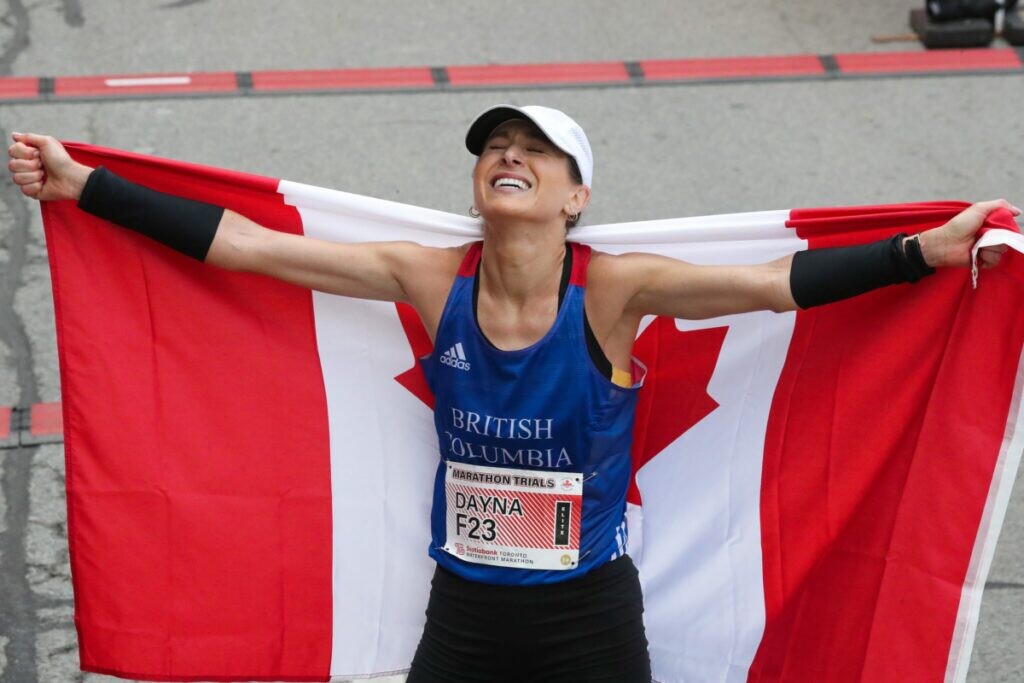
Will we see an American winner?
It has been 22 years since an American woman last won the TCS Toronto Waterfront Marathon (Leslie Gold in 2001) but in this year’s field, two American elites could possibly end the drought. One of them, Emily Durgin, a road racing specialist based out of Flagstaff, Ariz. came to Toronto looking for redemption after a less-than-ideal marathon debut in NYC last year.
Durgin said during Friday’s elite press conference that she felt the pressure to hit times and perform during her debut and ended up dropping out of the race before 30 km. “I learned a lot from New York and my build for Toronto has been different,” said Durgin. “As for a goal time, I want to run in the low 2:20s and be competitive.” The 29-year-old marathoner hopes to use Toronto as a stepping stone for the U.S. Olympic Marathon Trials in February 2024 in Orlando. Durgin was able to qualify for the trials from her time at the 2022 Houston Half Marathon where she finished 6th overall, clocking the seventh-fastest half-marathon in U.S. history with 67:54. “I came to Toronto to be competitive and contend for the the podium, as that’s what it will take to qualify at trials come February,” she said.
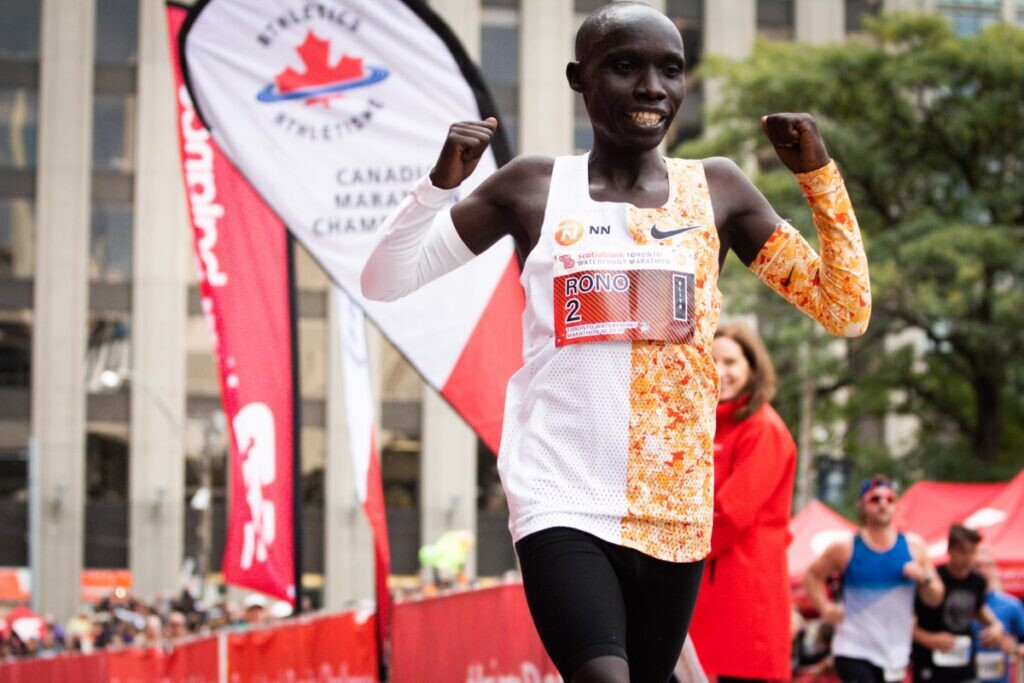
Another U.S. name in the women’s elite field to watch is Molly Grabill, who is running her sixth career marathon in Toronto on Sunday. Grabill told the media that she has similar plans to her compatriot Durgin and hopes to bounce back after, in her words, falling short of her goals in her last marathon in Hamburg earlier this year. Although Grabill ran the second-fastest marathon time of her career in Hamburg, she said she was disappointed as she took a swing and missed, struggling in the second half. “The goal in Toronto is to control the second half of the race better and gain strong momentum heading into the U.S. Olympic Marathon Trials,” said Grabill. The 31-year-old from Boulder, Colo., is coming off a top-15 finish in 69:53 at the inaugural World Athletics Road Running Championships in Riga, Latvia, earlier this month, which she says has given her a lot of confidence for Sunday.
Eyes on the course record?
Outside of the American duo, two other international athletes to watch are the Ethiopian duo of Afera Godfay and 2023 Ottawa Marathon champion Waganesh Mekasha. For Godfay, Toronto is her first marathon in three years after giving birth to her daughter. Her last marathon came in 2020 when she ran 2:26:43 to place third overall at the Xiamen Marathon in China. In her first two races back since becoming a mother, Godfay has run respectable half marathon times of 70 and 71 minutes but has not yet returned to her previous form. She said at Friday’s press conference that she hopes to come through the half mark in 1:11 and feels well-prepared for her marathon return. A glimpse of hope for Godfay is that she currently trains alongside the new women’s world record holder Tigist Assefa in Ethiopia. So, who knows what she is capable of?
The favourite in the women’s race is Mekasha, who is coming off a win in the scorching heat at the 2023 Ottawa Marathon in May. Mekasha is targeting the Canadian all-comers’ women’s marathon record on Sunday of 2:22:16, set four years ago by Kenya’s Magdalyne Masai at this race. Mekasha holds a personal best of 2:22:45 from the 2019 Dubai Marathon and said that she expects around a similar time on Sunday. “If the pacemaker runs a good pace, I hope to break the course record,” says Mekasha.
The Canadian contingent
Two of the top three Canadians from last year’s race have returned to the 2023 field, with Malindi Elmore, the reigning Canadian marathon champion, opting to run Berlin, where she clocked the second-fastest time in Canadian history (2:23:30). Returning are second and third place Canadian finishers Dayna Pidhoresky and Toronto’s own Sasha Gollish. Pidhoresky had an iconic moment here in 2019, when she raced just under the Olympic standard at the Canadian trials, winning in 2:29:03–qualifying her for the marathon at the 2020 Tokyo Olympics. Although the Olympic marathon didn’t go as planned for Pidhoresky, she was able to bounce back at this event last year to place seventh overall (second Canadian) in 2:30:58.
“Growing up in Windsor, Ont., I came to Toronto for so many races,” said Pidhoresky on tackling on her fourth Toronto Waterfront Marathon. “I feel I know the course very well, which is helpful in a marathon, and it’s great to have a high-quality field that’s close to home.” Pidhoresky told the media that this build has not been smooth but she is still confident she can run a personal best Sunday. “This course is advantageous, and I need to be smart and just run my race,” she said.
It is a similar story for Gollish, who is running in her second consecutive TCS Toronto Waterfront Marathon, less than eight weeks after her last marathon at the 2023 World Championships in August. Gollish told Canadian Running at the press conference that she wants to go into this race with a similar mindset that she had in Budapest. “It feels like a privilege to be here, and I am not putting any pressure of a personal best on myself,” says Gollish. “For the longest time, I avoided this race because I felt there would be pressure to perform, but why not run something in your backyard fuelled by a community that has done so much for me?” Last year, Gollish surprised herself with a personal best time of 2:31:40 after a short marathon build. Could she do the same on Sunday?
A few other Canadian marathoners to watch are Emily Setlack, Toronto’s Liza Howard and Kim Krezonoski of Thunder Bay, Ont. It has been four years since Setlack has last touched the marathon, but with a personal best of 2:29:48 from the 2019 edition of this race, her potential to finish as the top Canadian should not be ignored. Setlack has had a quiet 2023 season but has strung together solid performances, winning Toronto’s historic Sporting Life 10K and placing eighth overall at the Canadian 10K Championships in May.
Howard has a personal best of 2:35:29 (Chicago 2022) and was the top Canadian finisher at the 2023 Boston Marathon (37th overall) in cold, wet and windy conditions. Krezonoski moved to Toronto within the last year and has been studying the course thoroughly in the hope of crushing her marathon personal best come Sunday. She ran her personal best of 2:37 at the California International Marathon last year but has dropped her half-marathon PB by nearly four minutes since. The spots on the domestic podium are up for grabs, and each of these three women could break through.
Men’s race
The rise of Elvis
The absence of Adane opens the door for several East African men hoping to establish their marathon careers in Toronto. One of these men is Kenya’s Elvis Kipchoge, who may already lay claim to the title of the best running name. This Kipchoge is a little less well-known than the former world record holder but boasts a faster half marathon personal best of 59:15, which earned him third place at the 2022 Barcelona Half Marathon. However, this Kipchoge has not had much luck in the marathon. At the young age of 27, he ran 2:10:21 at the Vienna Marathon earlier this year. He hopes to turn things around on a fast and flat Toronto course. Kipchoge has ties to the race, training alongside women’s course record holder Magdalyne Masai in Iten, Kenya.
While there is no relation between Elvis and Eliud Kipchoge, besides sharing the same last name and initials, Ethiopian athlete Adugna Bikila hopes to follow in the footsteps of his uncle, Worku Bikila. Worku was a world-class 5,000m runner who finished sixth in the 1992 Olympic 5,000m final in Barcelona and took fourth place at the World Championships the following year. Bikila enters Toronto with the fastest time in the field, holding a personal best of 2:05:52 from the 2022 Seville Marathon, where he finished fourth.
All the East African men will be aiming to break the Canadian all-comers record and course record of 2:05:00, held by Kenya’s Philemon Rono, set in 2019. The weather forecast for Sunday indicates cool and favourable conditions for both the men’s and women’s fields, which should make both course records vulnerable.
Who’s next for Canada?
A new men’s Canadian champion will be crowned Sunday, and for the first time since 2016, their last name will not be Levins or Hofbauer. The 2023 men’s field is full of up-and-coming Canadian talent on the precipice of breaking into the elite scene. Mississauga’s Sergio Raez Villanueva returns to Toronto after a stunning 2:18:04 debut last year, which earned him top-five Canadian honours. Challenging Raez Villanueva is Ottawa’s Blair Morgan, who was the second Canadian at the hot and humid Ottawa Marathon in May, running 2:19:50. Morgan ran his personal best of 2:18:29 at the 2018 Toronto Waterfront Marathon but is looking for a sub-2:18 result this time around.
Challenging Raez Villanueva and Morgan are debutants Thomas Broatch of Vancouver and 4:01 miler Kyle Grieve. Broatch is coming off a win at the Vancouver Eastside 10K where he beat three-time Toronto champion Trevor Hofbauer. “Winning the Eastside 10K was a huge confidence booster for me,” says Broatch. “Whenever you take the start line the objective is to win and run fast.” The 24-year-old software engineer told Canadian Running that he has ambitious goals to run under 2:15 on Sunday and that his marathon build has gone near perfect.
For Grieve, who grew up and still resides in Toronto, this marathon has always been on his bucket list. “I’ve been wanting to try a marathon for a few years and have just kept putting it off,” says Grieve, who got married in the summer. “Canada Running Series is a big reason I am still competing today, so it was never a question of where I wanted to run my first marathon.” His goal is to be competitive against a strong Canadian field and let the time come along with it.
How to watch?
Marathon fans from around the world will have the opportunity to watch the 2023 TCS Toronto Waterfront Marathon live on Sunday, Oct. 15, 2023, beginning at 8:00 a.m. ET with a pre-race introduction followed by the introduction of the elite field. The gun for the men’s and women’s elite field fires at 8:45 a.m. ET. All race action can be followed on torontowaterfrontmarathon.com or CBCsports.ca /CBC Gem or AthleticsCanada.tv.
by Marley Dickinson
Login to leave a comment
TCS Toronto Waterfront Marathon
The Scotiabank Toronto Waterfront Marathon, Half-Marathon & 5k Run / Walk is organized by Canada Running Series Inc., organizers of the Canada Running Series, "A selection of Canada's best runs!" Canada Running Series annually organizes eight events in Montreal, Toronto and Vancouver that vary in distance from the 5k to the marathon. The Scotiabank Toronto Waterfront Marathon and Half-Marathon are...
more...Faith Kipyegon nominated for 2023 athlete of the year award
World 1,500m and mile world record holder Faith Kipyegon has been nominated for the female World athlete of the year award by World athletics.
The award is a prize that is awarded to athletes participating in events within the sport of athletics organised by World Athletics (formerly IAAF), including track and field, cross-country running, road running, and race-walking.
World athletics announced on Wednesday that 11 nominees have been picked for the female athlete of the year after selection from an international panel of athletic experts.
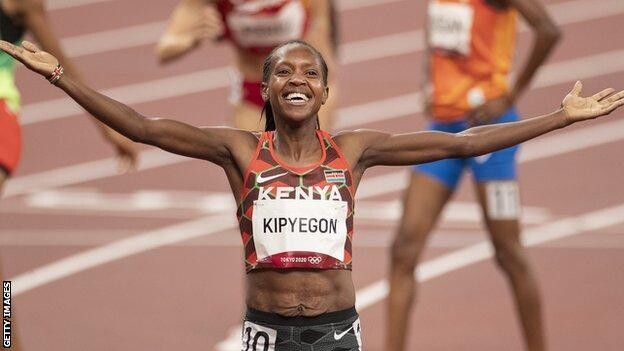
"World Athletics is pleased to confirm a list of 11 nominees for Women’s World Athlete of the Year. These athletes were selected by an international panel of athletics experts, comprising representatives from all six continental areas of World Athletics.”
The athletics body said the nominations reflect performances from Budapest championships and other championships held in the year.
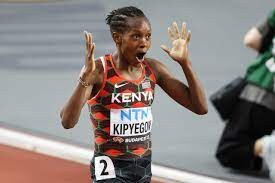
"In what has been another memorable year for the sport, the nominations reflect some of the standout performances achieved at the World Athletics Championships in Budapest 23, one-day meeting circuits, label road races and other events around the world."
Kipyegon was selected after a memorable performance at the World Athletics Championships in Budapest where she won both the 1,500m and 5,000m races to become the first female in history of the championships to clinch double accolades.
She will face competition from Ethiopia’s Tigist Assefa who is the female World Marathon record holder with a time of 2:11.53 set at the Berlin Marathon in September.
Also joining the pair will be world record holder in the 5,000m Tsegay Gudaf of Ethiopia who set the record during the 2023 final Diamond League.
USA’s Sha’carri Richardson is also nominated alongside Kenyan-born Bahraini female athlete Winfred Yavi.
The 2020 Tokyo Olympics bronze medalist in the high jump Yaroslava Mahuchikh, Venezuelan Yulimar Rojas who holds the world record for women's triple jump, Jamaica’s Shericka Jackson who boosts of 5 Olympic medals and 8 World championships medals are also part of the list.
Winner of the 35km walk in Budapest, Maria Perez from Spain and 2023 world champion in the 400m Femke Bol conclude the list.
Voting for the World Athletes of the year will close on October 28 at midnight after which five women and five men finalists will be announced by World Athletics on November 13 and 14.
World athletics also said their vote would account for 50 per cent of the total results whereas the public vote and athletics family vote would each account for 25 per cent of the results.
The winners will be revealed on World Athletics’ social media platforms on December 11.
by Teddy Mulei
Login to leave a comment
Molly Seidel Stunned the World (and Herself) with Olympic Bronze in Tokyo. Then Life Went Sideways.
She stunned the world (and herself) with Olympic bronze in Tokyo. Then life went sideways. How America’s unexpected marathon phenom is getting her body—and brain—back on track.
On a clear December night in 2019, Molly Seidel was at a rooftop holiday party in Boston, wearing a black velvet dress, doing what a lot of 25-year-olds do: passing a joint between friends, wondering what she was doing with her life.
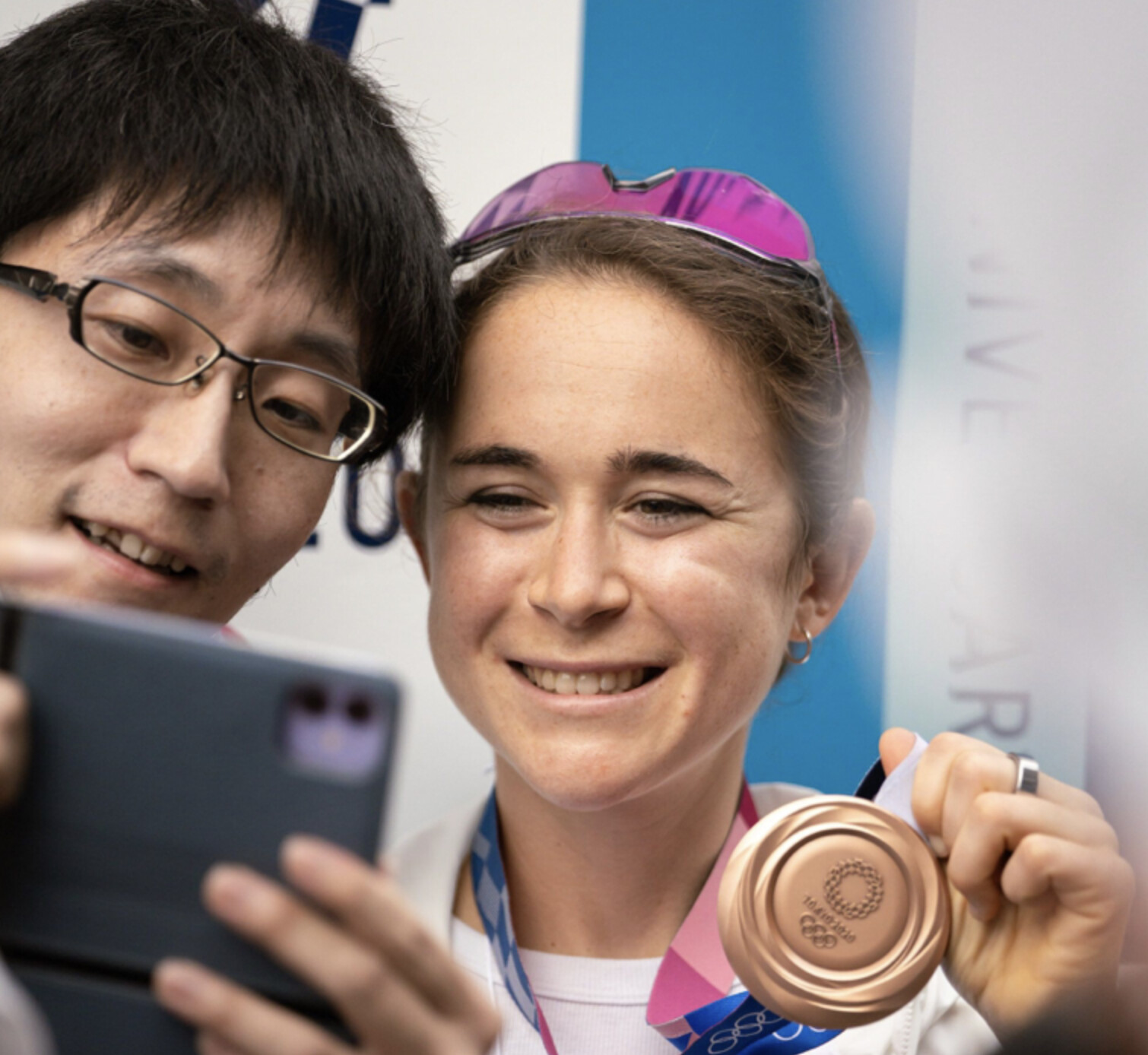
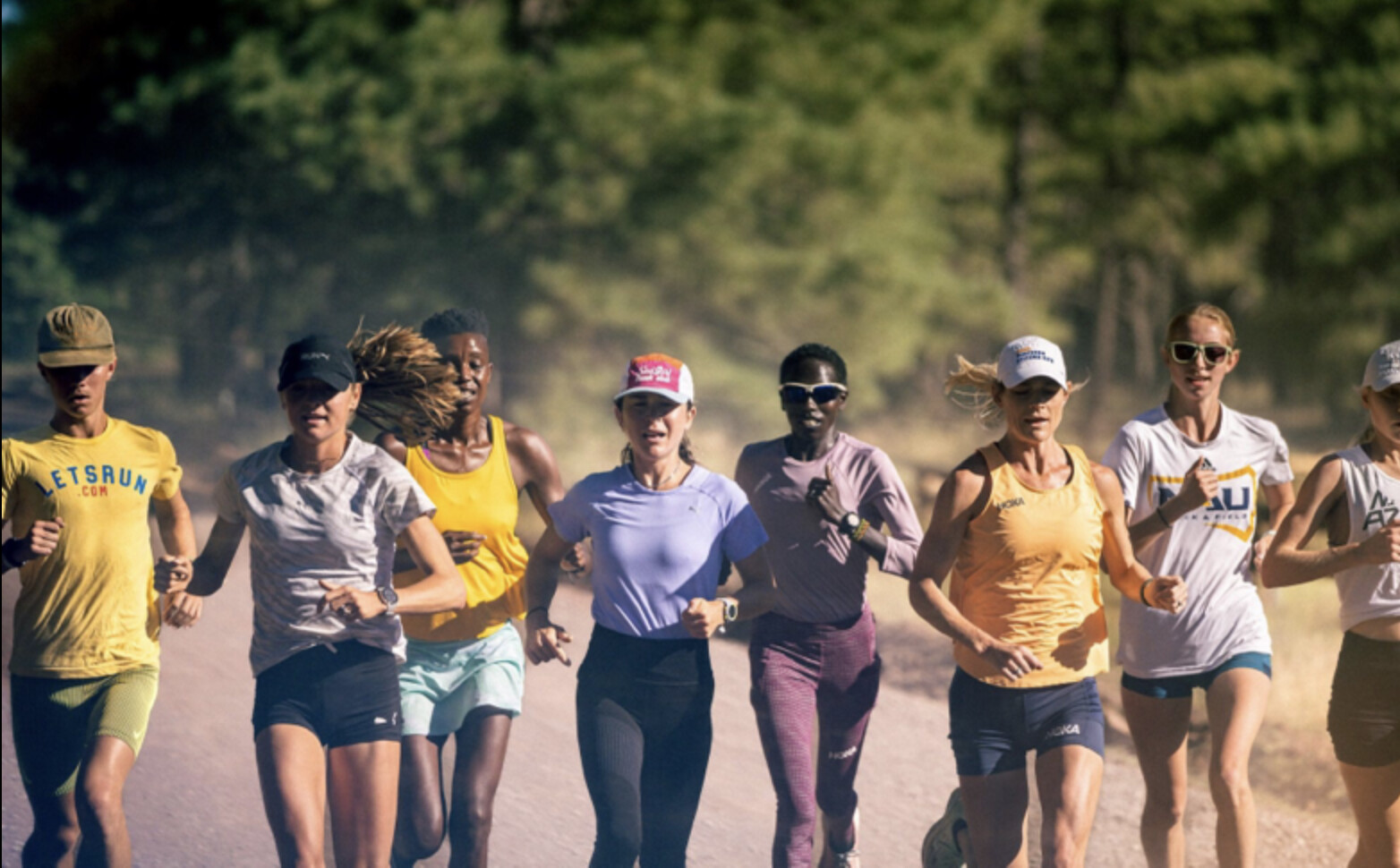
“You should run the Olympic Trials,” her sister, Izzy, said, as smoke swirled in the chilly air atop The Trackhouse, a retail shop and community hub on Newbury Street operated by the running brand Tracksmith. “That would be hilarious if you did that as your first marathon.”
Molly, an elite 10K racer who’d spent much of 2019 injured, looked out at the city lights, and laughed. Why the hell not? She’d just qualified for the trials, winning the San Antonio Half with a time of 1:10:27. (“The shock of the century,” as she’d put it.) True, 13.1 miles wasn’t 26.2—but running a marathon was something to do. If only because she never had before.
A four-time NCAA track and cross-country champion at The University of Notre Dame in Indiana, Molly had moved to Boston in 2017, where she’d worked three jobs to supplement her fourth: running for Saucony’s Freedom Track Club. The $34,000 a year that Saucony paid her (pre-tax, sans medical) didn’t go far in one of America’s most expensive cities. Chasing kids around as a babysitter, driving around as an Instacart shopper, and standing around eight hours a day as a barista—when you’re running 20 miles a day—wasn’t ideal. But whatever, she had compression socks. And she was downing free coffee and paying rent, flying to Flagstaff, Arizona, every so often for altitude camps, and having a good time. Doing what she loved. The only thing she’s ever wanted to do since she was a freckly fifth-grader in small-town Wisconsin clocking a six-minute mile in gym class.
“I was hustling, and I loved it. It was such a fun, cool time of my life,” she says, summarizing her 20s. Staring into Molly’s steely brown eyes, listening to her speak with such clarity and conviction about her struggles since, it’s easy to forget: She is still only 29.
After Molly had hip surgery on her birthday in July 2018, her doctors gave her a 50/50 chance of running professionally again. By summer 2019, she’d parted ways with FTC, which left her sobbing on the banks of the Charles River, getting eaten alive by mosquitoes and uncertainty. Her biggest achievement lately had been being named #2 Top Instacart Shopper (in Flagstaff; Boston was big-time).
The day after that rooftop party, Molly asked her friend and former FTC teammate Jon Green, who she’d newly anointed as her coach: “Think I should run the marathon trials?” Sure, he shrugged. Nothing to lose. Maybe it’d help her train for the 10K, her best shot—they both thought—at making a U.S. Olympic team.
“I’m going to get my ass kicked six ways to Sunday!” she told the host of the podcast Running On Om six weeks before the trials in Atlanta.
Instead, on February 29, 2020, she kicked some herself. Pushing past 448 of the fastest, most-experienced women marathoners in the country, coming in second with a 2:27:31, earning more in prize money ($60,000) than she had in two years of racing—and a spot on the U.S. trio for the 2020 Tokyo Olympics, along with Kenyan-born superstars Aliphine Tuliamuk and Sally Kipyego. “I don’t know what’s happening right now!” Molly kept saying into TV cameras, wrapped in an American flag, as stunned as a lottery winner.
Saucony who? Puma came calling. Along with something Molly hadn’t anticipated: the spotlight. An onslaught of social media followers. And two weeks later, a global pandemic and lockdown—and all the anxiety and isolation that came with it. She was drowning, and she hadn’t even landed in Tokyo yet.
The 2020 Olympics, as we all know, were postponed to 2021. An emotional burden but a physical boon for Molly, in that it allowed her to get in a second marathon. In London, she finished two minutes faster than her debut. When the Olympics finally rolled around, she was ready.
Before the race, Molly says, “I was thinking: ‘Once I cross the starting line, I get to call myself an Olympian and that’s a win for the day.’”
But then she crossed the finish line—with a finger-kiss to the sky and a guttural Yesss!—in third place with a 2:27:46, just 26 seconds behind first (Kenya’s Peres Jepchirchir). And realized: She gets to call herself an Olympic medalist forever. Only the third American woman to ever earn one in the marathon.
Lots of kids have fleeting hopes of making it to the Olympics. I remember thinking I could be Mary Lou Retton. Maybe FloJo, with shorter fingernails. Then I decided I’d rather be Madonna or president of the United States and promptly forgot about it. But Molly held tight to her Olympic aspirations. She still has a poster she made in 2004, with stickers and a snapshot of her smiley 10-year-old self, to prove it. “I wish I will make it into the Olympics and win a gold medal,” she wrote, and signed it: Molly Seidel, the “y” looping back to underline her name. In case there was any doubt as to who, specifically, would be winning the medal.
Molly grew up in Nashotah, Wisconsin, and is the eldest of three. Her sister and brother, younger by not quite two years, are twins. Izzy is a running influencer and corporate content creator for companies like Peloton; and Fritz favors Formula 1 racing and weightlifting and works for the family’s leather-tanning business. The family was active, sporty. Dad, Fritz Sr., was a ski racer in college; Mom, Anne, a cheerleader. You can tell. Watching clips of Molly’s mom and dad watching the Olympic race from their backyard patio, jumping up and down, tears streaming, is the kind of life-affirming moment you wish you could bottle. “I’m in shock. I’m in disbelief,” Molly says into the mic, beaming. “I just wanted to come out today and I don’t know…stick my nose where it didn’t belong and see what I could come away with. And I guess that’s a medal.” When the interviewer holds up her family on FaceTime, Molly breaks down. “We did it,” she says into the screen between sobs and smiles. “Please drink a beer for me.
Molly hasn’t always been unabashedly herself, even when everyone thought she was. A compartmentalizer to the core, she spent most of her life hiding a huge part of it: anorexia, bulimia, anxiety, obsessive-compulsive disorder, debilitating depression.
It started around age 11, when she learned to disguise OCD tendencies, like compulsively knocking on wood, silently reciting prayers “to avoid God getting mad at me,” she says. “It was a whole thing.” She says her parents were aware of the behaviors, but saw them more as odd little habits. “They had no reason to suspect anything. I was very high-functioning,” she says. “They didn’t realize that it was literally taking over my life.”
She wasn’t officially diagnosed with OCD until her freshman year of college, when she saw a therapist for the first time. At Notre Dame, disordered eating took hold, quietly yet visibly, as it does for up to 62 percent of female college athletes, according to the National Eating Disorders Association. As recently as the Tokyo Olympics, she was making herself throw up in the airport bathroom, mere days before taking the podium. Molly hesitates to share that detail; she fears a girl might read this and interpret it as behavior to model. “Having been in that place as a younger athlete, I know I would have,” she says. But she also understands: Most people just don’t get how unrelenting eating disorders can be.
In February 2022, she finally received a diagnosis of the root cause for all of it: ADHD. About being diagnosed, she says, “It made me feel really good, like [I don’t have] a million different disorders. I have a disorder that manifests itself in a lot of different symptoms.”
She waited to try Adderall until after the Boston Marathon in April, only to drop out at mile 16 due to a hip impingement. Initially, the meds made her feel fantastic. Focused. Free. Until she realized Adderall hurt more than it helped. She couldn’t sleep, couldn’t eat, lost too much weight. Within weeks, she devolved. “The eating disorder came roaring back,” she says, referring to it, as she often does, as its own entity, something that exists outside of herself. That ruthlessly takes control over her very need for control. “I almost think of it as an alter ego,” she explains. “Adderall was just bubblegum in the dam,” as she puts it. She ditched the drug, and her life—professionally, physically—unraveled.
In July 2022, heading into the World Championships, she bombed the mental health screening, answering the questions with brutal honesty. She’d been texting Keira D’Amato weeks prior. “Yo girl, things are pretty bad right now. Get ready…” Sobbing on the sidewalk in Eugene, Oregon, she texted D’Amato again. And the USATF made it official: D’Amato would take her spot on the team. Then Molly did what she’d been “putting off and putting off”— checked herself into eating disorder treatment for the second time since 2016, an outpatient program in Salt Lake City, where her new boyfriend was living at the time.
Somehow (see: expert compartmentalizer) mid-meltdown, in February 2022, she had met an amateur ultrarunner named Matt, on Hinge. A quiet, lanky photographer, he didn’t totally get what she did. “I didn’t understand the gravity of it,” he tells me. “I was like, Oh she’s a pro runner, that’s cool. I didn’t realize she was, like, the pro runner!”
Going back to treatment “was pretty terrible,” she says. At least she could stay with Matt. Hardly a honeymoon phase, but the new relationship held promise. “I laid it all out there,” says Molly. “And he was still here for it, for all the messiness. It was really meaningful.” And a mental shift. “He doesn’t see me as just Molly the Runner.”
Almost a year later, on a freezing April evening in Flagstaff, Molly is racing around Whole Foods, palming a head of cabbage, grabbing a thing of hummus, hunting for deals even though she doesn’t need to anymore.
“It’s all about speed, efficiency, and quality,” she says, explaining the secret to her earlier Instacart success. She checks the expiration date on a container of goat cheese and beelines for the butcher counter, scans it faster than an Epson DS3000, though not without calculation, and requests two tomato-and-mozzarella-stuffed chicken breasts. Then she darts over to the beverage aisle in her marshmallow-y Puma slip-ons that Matt custom-painted with orange poppies. She grabs a case of La Croix (tangerine), then zips to the checkout. We’re in and out in under 15 minutes and 50 bucks, nothing bruised or broken.
Other than her body. Let’s just say: If Molly were an avocado or a carton of eggs, she probably wouldn’t pass her own sniff test. The week we meet, she is just coming off a month of no running. Not a single mile. She’s used to running twice a day, 130 miles a week. No wonder she’s spraying her kitchen counter with Mrs. Meyer’s and scrubbing the stovetop within minutes of welcoming me into her new home.
The place, which she shares with Matt and his Australian border collie, Rye, has a post-college flophouse feel: a deep L-shaped couch draped in Pendleton blankets, a bar cluttered with bottles of discount wine, a floor lamp leaning like the Tower of Pisa next to a chew toy in the shape of a ranch dressing bottle. Scattered about, though, are reminders that an elite runner sleeps here. Or at least tries to. (“Pro runner by day, mild insomniac by night” reads the bio on her rarely used account on what used to be Twitter.) There’s a stick of Chafe Safe on the coffee table. Shalane Flanagan’s cookbooks on the counter. And framed in glass, propped on the office floor: Molly’s Olympic kit—blue racing briefs with the Nike Swoosh, a USA singlet, her once-sweat-drenched American flag, folded in a triangle. “I’m not sure where to hang it,” she says. “It seems a little ostentatious to have it in the living room.”
With long brown curls and a round, freckly face, Molly has an aw-shucks look so innocent that it’s hard, at first, to perceive her struggles. Flat-out ask her, though—How are you even functioning?—and she’ll tell you: “I’m an absolute wreck. There’s no worse feeling than being a pro runner who can’t run. You just feel fucking useless.” Tidying a stack of newspapers, she adds, “Don’t worry, I’ve had therapy today.”
She’s watched every show. (Save Ted Lasso, “too sickly sweet.”) Listened to every podcast. (Armchair Expert is a favorite.) She’s got nothing else to do but PT and go easy on the ElliptiGo in the garage, onto which she’s rigged a wooden bookstand, currently clipped with A History of God: The 4,000 Year Quest of Judaism, Christianity and Islam. “I don’t read running books,” she says. “I need something different.”
Like most runners—even the most amateur among us—running, moving, is what keeps her sane. “What about swimming? Can you at least swim?” I ask, projecting my own desperation if I were in her size 8.5 shoes. “I fucking hate swimming,” says Molly. Walking? “Oh, yeah, I can go on walks. Another. Long. Walk.”
The only thing she has on her schedule this week is pumping up a local middle school track team before their big meet. The invitation boosted her spirits. “Should I just memorize Miracle on Ice?” she says, laughing. “No, I know, I’ll do Independence Day.”
Injuries are nothing new for Molly. Par for the course for any professional athlete. But especially for women, like her, who lack bone density—and have since high school, when, according to a study in the Orthopedic Journal of Sports Medicine, nearly half of female runners experience period loss. Osteoporosis and its precursor, osteopenia, are rampant in female runners, leading to ongoing issues that threaten not just their college and professional running careers, but their lives.
Still, Molly admits, laughing: She’s especially accident-prone. I ask her to list every scratch she’s ever had, which takes her 10 minutes, and goes all the way back to babyhood, when she banged her head against the bathtub spout. There was a cracked spine from a sledding incident in 8th grade, a broken collarbone from a ski race in high school, shredded knee cartilage in college when a driver hit her while she was riding a bike. “Ribs are constantly breaking,” she says. In 2021, two snapped, and refused to heal in time for the New York City Marathon. No biggie. She ran through the pain with a 2:24:42, besting Deena Kastor’s 2008 time by more than a minute and setting the American course record.
Molly’s latest injury? Glute tear. “Literally a gigantic pain in the ass,” she posted on Instagram in March. Inside, Molly was devastated. Pulling out of the Nagoya Marathon—the night before her 6:45 a.m. flight to Japan, no less—was not in the plan. The plan, according to Coach Green, had been simple. It always is. If the two of them even have one. “Just to have fun and be consistent.” And get a marathon or two in before the Olympic Trials in February 2024.
She’d been finally—finally—fit on all fronts; ready to race, ready to return. She needed Nagoya. And then, nothing. “It feels like I’m back at the bottom of the well,” says Molly, driving home from Whole Foods in her Toyota 4Runner. “This last year-and-a-half has been so difficult. It’s just been a lot of doubt. How do I approach this, as someone who has now won a medal? Like, man, am I even relevant in this sport anymore?” She pops a piece of gum in her mouth. I wait for her to offer me some, because that’s what you do with gum, but she doesn’t. She’s so in her head. “It’s hard when you’re in the thick of it, you know, to figure out: Why the fuck do I keep doing this? When it just breaks my heart over and over and over again?”
We pull into her driveway. “I was prepared for the low period after Tokyo,” she says. “But this has been much longer and lower than I expected.”
The curse of making it to the Olympics, let alone coming back with a medal: expectations. Molly’s own were high. “I think I thought, after the Olympics, if I win a medal, then I will be fixed, it will fix everything.” Instead, in a way, it made everything worse.
That’s the problem that has plagued Molly for most of her running career: Her triumphs and troubles intermingle, like thunder and lightning. Which, by the way, she has been struck by. (A minor backyard-grill, summer-thunderstorm incident. She was fine.)
The next morning in Flagstaff, Molly’s feeling like she can run a mile, maybe two. It’s snowing, though, and she doesn’t want to risk the slippery track, so we meet at Campbell Mesa Trails. She loops a band around the back of her truck to stretch and sends me off into the trees to run alone while she does a couple of laps on the street.
Molly leaves for an acupuncture appointment, and we reunite later at Single Speed Coffee (“the best coffee in Flagstaff,” promises the ex-barista who drinks up to three cups a day). We curl up on a couch like it’s her living room, and she talks as freely—and as loudly—as if it was. Does she realize everyone can hear her? She doesn’t care. I guess that’s what happens when you’ve grown so comfortable sharing—in therapy, on podcasts, in a three-part video series on ADHD for WebMD—you just…share. Loud and proud.
Mental illness is so insidious, says Molly. “It’s not always this Sylvia Plath stick-my-head-in-a-fucking-oven thing, where you’re sad all the time,” she says. “High-functioning depressed people live normal successful lives. I can be having the happiest moment, and three days later I’m in a total downward spiral.” It’s something you never recover from, she says, but you learn to manage.
“I’m this incredibly flawed person who struggles so much. I think: How could I have won this thing when I’m so flawed? I look at all the people around me, all these accomplished people who have their shit together, and I’m like, ‘one of these things is not like the other,’” she says, taking a sip of her flat white. “I was literally in the Olympic Village thinking: Everybody is probably looking at me wondering: Why the hell is she here?”
They weren’t. They don’t. She knows that.
And yet her mind races as fast as she does. It takes up So. Much. Space. When she’s running, though, the noise disappears. She’s not Olympic Molly or Eating Disorder Molly, she’s not even, really, Runner Molly. “When I’m running,” she says, “I’m the most authentic version of myself.”
Talking helps, too. Molly first shared her mental health history a few years ago, “before she was famous,” as she puts it. After the Olympics, though, she kept talking and hasn’t stopped. The Tokyo Games were a turning point, she says. Suddenly the most revered athletes in the world were opening up about their mental health. Molly credits Simone Biles’s bravery for her own. If Biles, and Michael Phelps and Naomi Osaka, could come clean... then maybe a nerdy, niche-y, unlikely medaling marathoner could, too.
“Those guys got a lot more shit for it than I did,” says Molly. “I got off easy. I’m not a household name,” she laughs. She knows she can be candid and off the cuff—and chat freely in a not-empty café—in a way Biles never could. “I’m a nobody!” she laughs.
Still, a nobody with 232,000 Instagram followers whom she has touched in very IRL ways—becoming an unintentional poster woman for normalizing mental health challenges among athletes. “You are such an incredible inspiration,” @1percentpeterson posts, one comment of a zillion similar. “It’s ok to not be ok!” says another. Along with all the online love is, of course, online hate. Molly rattles off a few lowlights: “She’s an attention-seeking whore,” “Her bones are so brittle she’ll never race again,” “She’s running so badly and posting a lot she should really focus on her running more.” Molly finds it curious. “I’m like, ‘If you hate me, you don’t need to follow me, sir.’”
It’s Molly’s nobody-ness—what Outside writer Martin Fritz Huber called her “runner-next-door” persona, and I’ll just call “genuine personality”—that has made her somebody in running’s otherwise reserved circles.
Somebody who (gasp!) high-fives her sister in the middle of a major race, as she did at mile 18 of the 2021 New York City Marathon. “They shat on me in the broadcast for it,” she says. “They were like, ‘She’s not taking this seriously.’” (Except, uh, then she set the American course record, so…)
Somebody who, obviously, swears like a sailor and dances awkwardly on Instagram, who dresses up like a turkey, and viral-tweets about getting mansplained on an airplane. (“He starts telling me how I need to train high mileage & pulls up an analysis he’d made of a pro runner’s training on his phone. The pro runner was me. It was my training. Didn’t have the heart to tell him.”)
Somebody who makes every middle-aged mom-runner I know swoon like a Swiftie and say: “OMG! YOU HUNG OUT WITH MOLLY SEIDEL!!?” Middle-aged dad-runners, too. “I saw her once in Golden Gate Park!” my friend Dan fanboyed when he heard. “I waved!” Did she wave back? “She smiled,” he says, “while casually laying down 5:25s.”
And somebody who was as outraged as I was that I bought a $16 tube of French toothpaste from my hip Flagstaff motel. (It was 10 p.m.! It was all they had!) “For that price it better contain top-shelf cocaine,” she texted. Lest LetsRun commenters take that tidbit out of context: It’s a joke. It’s, in part, what makes Molly America’s most relatable pro runner: She’s not afraid to make jokes. (While we’re at it… Don’t knock her for smoking a little legal weed, either. That’s so 2009. Per the World Anti-Doping Agency: Cannabis is prohibited during competition, not at a Christmas party two months before it. Per Molly: “People would be shocked to know how many pro runners smoke weed.”)
I can’t believe I never asked to see it. Molly’s medal. A real, live Olympic medal. Maybe because it was tucked into a credenza along with Matt’s menorah and her maneki-neko cat figurines from Japan. But I think it was because hanging out with Molly felt so…normal, I almost forgot she’d won one.
People think elite distance runners have to be one-dimensional, she says. That they have to be sculpted, single-minded, running-only robots. “Because that’s what the sport has been,” she says.
Molly falls for it, too, she says. She scrolls the feeds, sees her fellow pros living seemingly perfect lives. She wants everyone to know: She’s not. So much so that she requested we not print the photos originally commissioned for this story, which were taken when she was at the lowest of lows. (“It’s been...refreshing...to be pretty open and real with Rachel [about] the challenges of the last year,” she wrote in an email to Runner’s World editors. “But the photos [were taken at] a time when I was really struggling and actively trying to hide how bad my eating disorder had become.”)
Molly finds the NYC Marathon high-five thing comical but indicative of a more serious issue in elite running: It takes itself too seriously. It’s too…elitist. Too stilted. “Running a marathon is a pretty freaking cool experience!” If you’re not having fun, she asks rhetorically, what’s the point? Still, she admits, she isn’t always having fun. Though you wouldn’t know it from her Instagram. “Oh, I’m very good at making it seem like I am,” she says.
She used to enjoy social media when it was just her friends. Before she gained 50,000 followers in a single day after the trials, and some 70,000 on Strava. Before the pandemic, before the Olympics. Keeping up with content became a toxic chore. “You feel like you’re just feeding this beast and it’s never going to stop,” she says. She’s taken to deleting the app off her phone, reloading it only to fulfill contractual agreements and post for her sponsors, then deleting it again.
As much as she hates having to post, she enjoys plugging products the only way that feels natural: through parody. As does Izzy, her influencer sister, who, like Molly, prefers to skewer rather than shill (à la their idea behind their joint Insta account: @sadgirltrackclub). “The classic influencer tropes make me want to throw up,” she says (perverse pun as a recovering bulimic not intended). “New Gear Drop!’ or ‘This is my Outfit of the Day!’ Cringe. “Hot Girl Instagram is not how I identify,” she says.
Nor is TikTok. “Sponsors tell me all the time: You should TikTok! I’m like, ‘I am not doing TikTok.’ I know how my brain works. They’ll say, ‘We’ll pay you less if you don’t’—and I’m, like, I don’t care.”
And to those sponsors who ghosted her after she returned to eating disorder treatment, good riddance. “Michelob dropped me like a bad habit,” she says. “Whatever. You have watery-ass beer anyway.”
To those who have stood by her, though, she’s utterly devoted. Pissed she couldn’t wear the Puma panther head to toe in Tokyo, Molly took off her Puma Deviate Elites and tied them over her shoulder, obscuring the Nike logo on her Olympic singlet for all the world to see. Or not see. “Nike isn’t paying my fucking bills.”
The love is mutual, says Erin Longin, a general manager at Puma. After decades backing legends like Usain Bolt, Puma was relaunching road running and wanted Molly as their guinea pig. “She’s a serious athlete and competitor, but she also has fun with it,” says Longin. “Running should be fun. Molly embodies that.” At their first meeting, in January 2020, Molly made them laugh and nerded out over their new shoes. “We all left there, fingers crossed she’d sign with us,” says Longin.
Come February, they all flipped out. Longin was watching the trials, not expecting much. And then: “We were all messaging, “OMG!!” Then Molly killed in London. Medaled in Tokyo. “What she did for us in that first year…” says Longin. “We couldn’t have planned it!”
Then came the second year, and the third, and throughout it all—injuries, eating disorder treatment, missed races, missed opportunities—Puma hasn’t flinched. “It’s easy for a company to do the right thing when everything is going great,” Molly posted in April, heartbroken from her couch instead of Heartbreak Hill. “But it’s when the sh*t hits the fan and they’re still right there with you….” She received 35,000 hearts—and a call from Longin: “You make me feel so proud.”
Does it matter to Puma if Molly never places—never races—again? “Nope,” Longin says.
My last afternoon in Flagstaff, it’s cloudy skies, still freezing. I find Molly on the high school track wearing neoprene gloves, black puffy coat, another pair of Pumas. Her breath is white, her cheeks red. Her legs churning in even, elegant strides. Upright, alone, at peace, backed by snow-dusted peaks. Running itself is what matters, not racing, she tells me. “I honestly don’t give a shit about winning,” she says. All she wants—really wants, she says—is to be healthy enough to run until she’s old and gray.
Molly’s favorite runner is one who didn’t get to grow old. Who made his mark decades before she was born: Steve Prefontaine. “Pre raced in such a genuine way. He made people feel something,” she says. “The sports performances you truly remember,” she adds, “are the ones where you see the struggle, the work, the realness.”
Sounds familiar. “I hate conversations like, ‘Who’s the GOAT?’” Molly continues. “Who fucking cares? Who’s got the story that’s going to get people excited? That’s going to make some kid want to go out and do it?”
I know one of those kids: My best friend’s daughter, Quinn, a rising track phenom in Oregon, who has dealt with anxiety and OCD tendencies. She has a picture of Molly Seidel, and her times, taped to her bedroom wall. This past May, Quinn joined Nike’s Bowerman Club. She was named Oregon Female Athlete of the Year Under 12 by USATF. She wants to run for Notre Dame.
“Quinn loves running more than anything,” her mom tells me, texting photos of her elated 11-year-old atop the podium. “But I don’t know…” She’s unsure about setting her daughter on this path. How could she not, though? It’s all Quinn wants to do. Maybe what Quinn, too, feels born to do.
It’ll be okay, I tell her, I hope. Quinn has something Molly never had: She has a Molly.
Molly and I catch up via phone in June. A team of doctors in Germany has overhauled her biomechanics. She’s been running 110 miles a week, feeling healthy, hopeful. Happy. A month later, severe anemia (and accompanying iron infusions) interrupts her summer racing schedule. She cancels the couple of 10Ks she had planned and entertains herself by popping into the UTMB Speedgoat Mountain Race: a 28K trail run through Utah’s Little Cottonwood Canyon—coming in second with a 3:49:58. Molly’s focus is on the Chicago Marathon, October 8th; her first major race in almost two years.
Does it matter how she does? Does it matter if she slays the Olympic Trials in February? If she makes it to Paris 2024? If she fulfills her childhood dream and brings home gold?
Nah. Not if—like Matt, like Puma, like, finally, even Molly herself—you see Molly the Runner for who she really is: Molly the Mere Mortal. She’s the imperfect one who puts it perfectly: What matters isn’t her time or place, how she performs on the pavement. Or social media posts. What matters—as a professional athlete, as a person—is how she makes people feel: human.
She’d been finally—finally—fit on all fronts; ready to race, ready to return. She needed Nagoya. And then, nothing. “It feels like I’m back at the bottom of the well,” says Molly, driving home from Whole Foods in her Toyota 4Runner. “This last year-and-a-half has been so difficult. It’s just been a lot of doubt. How do I approach this, as someone who has now won a medal? Like, man, am I even relevant in this sport anymore?” She pops a piece of gum in her mouth. I wait for her to offer me some, because that’s what you do with gum, but she doesn’t. She’s so in her head. “It’s hard when you’re in the thick of it, you know, to figure out: Why the fuck do I keep doing this? When it just breaks my heart over and over and over again?”
by Runner’s World
Login to leave a comment
Kenyan Mark Otieno details his path to 2024 Paris Olympic Games
Mark Otieno ended his doping ban earlier this year and he has his work cut out if he has to qualify for the Olympic Games.
Kenyan sprinter Mark Otieno has officially begun his journey towards the 2024 Paris Olympic Games and has set a target to hit in order to make it to the global stage next year.
The Olympic Games are scheduled for Friday, July 26 to Sunday, August 11. In order to qualify for the showpiece, Otieno must hit the qualifying mark which stands at 10.00 by June 30 next year.
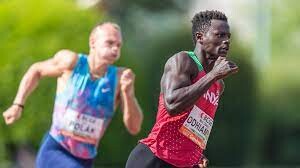
His Personal Best time currently stands at 10.05, meaning he has to put in the hard work to ensure that he hits the qualifying time for the men’s 100m.
In a post on his X (Twitter) handle, Otieno said: “Off-season training begins today, and it marks day one of my journey to the Olympics. I need to run 10.00s before June 30th, 2024.
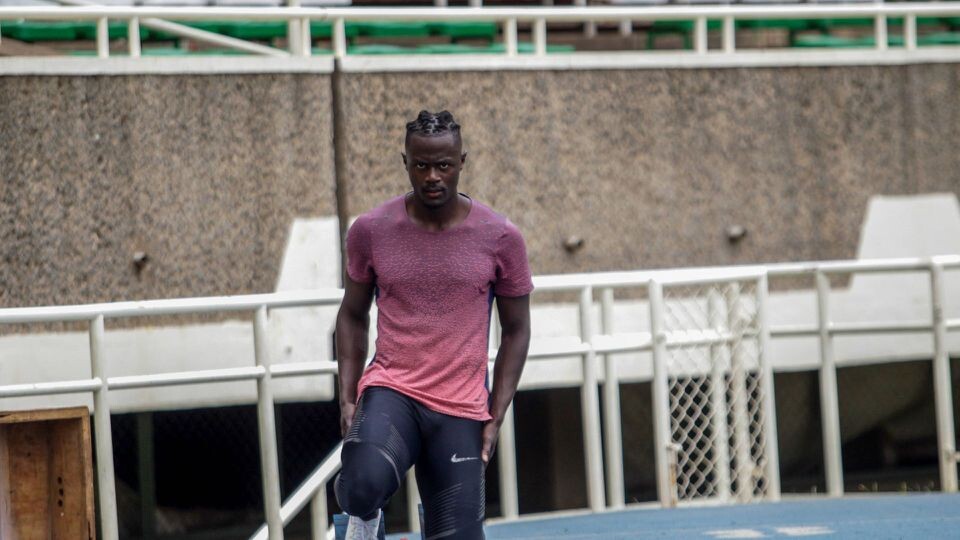
"My personal best is 10.05s, so that means a new personal best for me to get to the Olympics. Grateful that I have a chance at redemption.”
Earlier this year, Otieno’s doping ban came to an end and he has been taking his time to come back into competitive racing.
He was banned back in 2021 during the delayed 2020 Tokyo Olympics hours before he stepped on the start line of the men’s 100m semifinal.
At the time, the Athletics Integrity Unit (AIU) reported that he was banned due to the presence of the prohibited substance Methasterone in his system.
After ending his doping ban, the Kenyan has competed in one race, the 5° Meeting Brazzale in Italy, where he finished second in 10.39.
by Abigael Wuafula
Login to leave a comment
Paris 2024 Olympic Games
For this historic event, the City of Light is thinking big! Visitors will be able to watch events at top sporting venues in Paris and the Paris region, as well as at emblematic monuments in the capital visited by several millions of tourists each year. The promise of exceptional moments to experience in an exceptional setting! A great way to...
more...Kiptum eyes world record at next week's Chicago Marathon
London Marathon champion Kelvin Kiptum has his eyes set on breaking Eliud Kipchoge’s world marathon record when he steps up to compete at the 2023 Chicago Marathon on October 8.
Kiptum won the London Marathon on April 23 in a time of 2:01:25, in what was his second-ever marathon race—nearly obliterating the world record of 2:01:09 set by Kipchoge at the Berlin marathon in 2022.
He ran the fastest-ever marathon debut at the 2022 Valencia Marathon, becoming the third man in history to break two hours and two minutes after he wrapped up the race in 2:01:53.
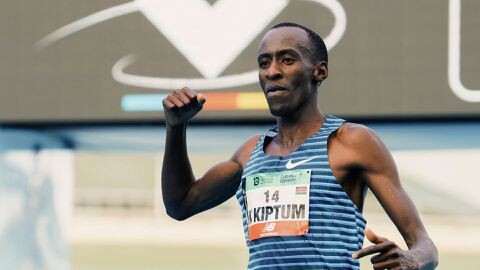
Only three men in history have run under 2:02, and Kiptum is the only marathoner to do it under the age of 35.
The 23-year-old announced his attendance in the Chicago Marathon on his Facebook page with an exciting message informing his fans to prepare for an incredible showdown.
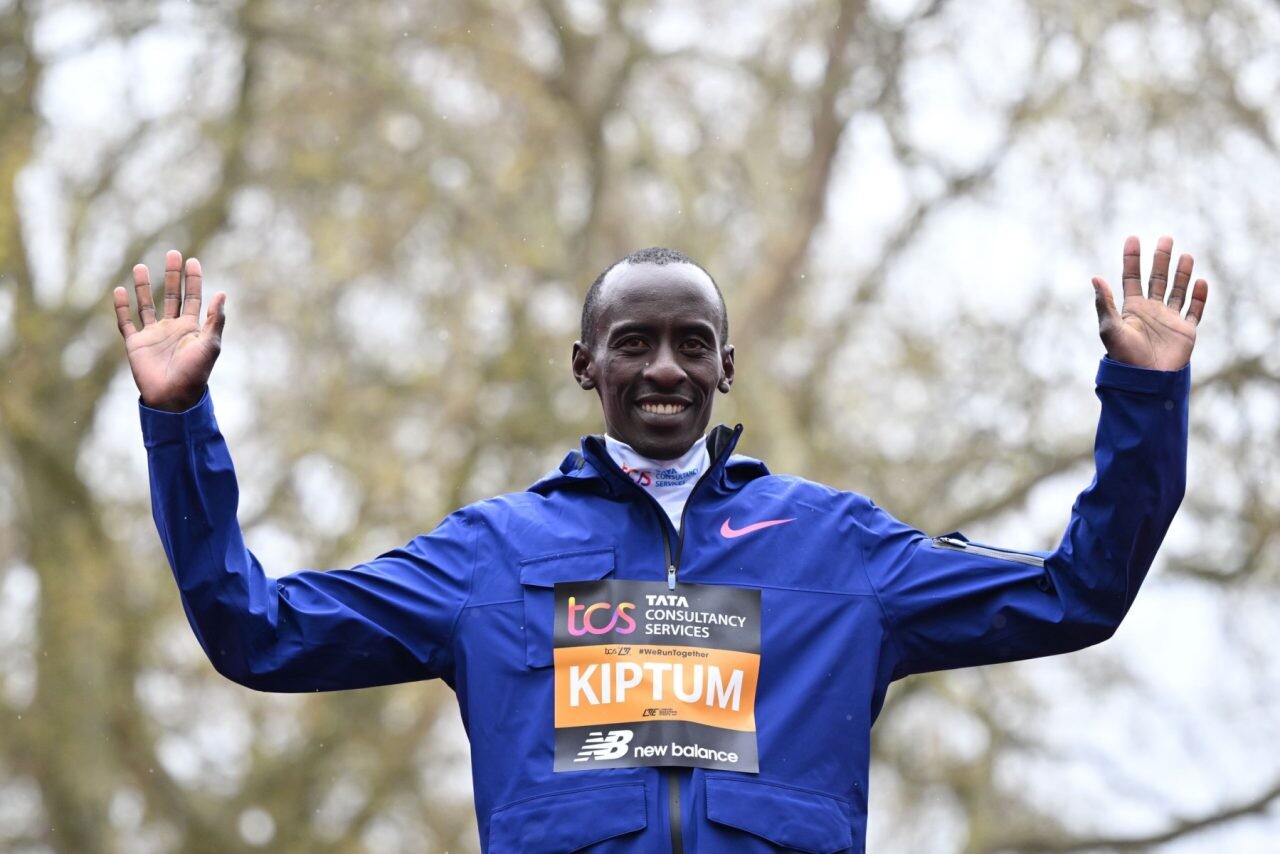
“I’m heading for the 2023 Bank of America Chicago Marathon. Get ready for the show,” the post from Kiptum read.
The elite athlete reportedly opted out of the Budapest 2023 World Athletics Championships and the Berlin Marathon to focus on Chicago.
A lot of fans had expected to witness the duel between Kiptum and Kipchoge at the Berlin Marathon track to gauge his speed against the two-time Olympic champion.
He will be joined by 2022 Chicago Marathon winner Benson Kipruto who set a personal best time of 2:04:24 when he won the race.
Kipruto also finished third in the 2022 and 2023 Boston Marathon with times of 2:07:27 and 2:06:06. He will be eying to defend his title against a youthful and promising Kiptum.
The two will be joined by fellow Kenyans John Korir who has a marathon best of 2:05:01 and debutants Daniel Mateiko and Wesley Kiptoo.
The Kenyan contingent will face a hard time from Somali-based Belgian Bashir Abdi who won gold in the 2020 Tokyo Olympics.
USA’s Galen Rupp, silver medalist in the men’s 10,000m at the London Olympics and bronze medalist in the men’s marathon in the 2016 Rio Olympics, will represent the hosts in the race.
They will also face stiff competition from Seifu Tura who won the 2021 Chicago Marathon and placed second at the 2022 edition.
Defending champion Ruth Chepngetich will lead the women’s pack seeking to break Ethiopia’s Tigst Assefa’s record of 2:11:53 set just recently at the Berlin marathon.
Chepng’etich, who won the Chicago Marathon in October last year, was only 14 seconds away from breaking the previous world record by Brigid Kosgei of 2:14:04.
She will be joined by Joyciline Jepkosgei, who finished second in the 2022 edition of the London Marathon, and Stacy Ndiwa who has a PB of 2:31:53.
Ethiopia’s Genzebe Dibaba will be a tough opponent for the Kenyan ladies. Dibaba is the current world record holder in indoor mile, 3,000m and 5,000m. She is also a gold medalist in the 1,500m at the 2015 World Championships.
USA’s Emily Sisson, who currently holds the American record in the marathon, will be seeking to upset the African girls. Sisson set the record on October 9 during the Chicago Marathon when she finished second in a time of 2:18:29.
The event has attracted 47,000 participants, the biggest field ever with the 2019 edition having featured 45,932 participants.
by Teddy Mulei
Login to leave a comment
Bank of America Chicago
Running the Bank of America Chicago Marathon is the pinnacle of achievement for elite athletes and everyday runners alike. On race day, runners from all 50 states and more than 100 countries will set out to accomplish a personal dream by reaching the finish line in Grant Park. The Bank of America Chicago Marathon is known for its flat and...
more...Great Britain’s Josh Kerr wins gold in men’s 1500m at World Athletics Championships
Great Britain’s Josh Kerr won 1500m gold at the World Athletics Championships in Budapest
Great Britain’s Joshua Kerr stunned hot favourite Jakob Ingebrigtsen to take 1500m gold at the World Athletics Championships in Budapest.
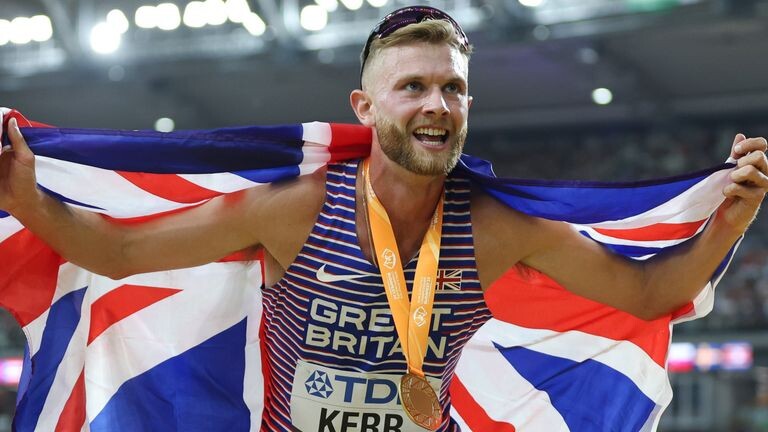
The Scot clocked 3:29.38 to win a massive battle with silver medallist Ingebrigtsen over the final 300m as Ingebrigtsen’s fellow Norwegian Narve Gilje Nordas took bronze in 3:29.68.
Kerr’s victory, achieved via his season’s best, saw Britain scoop men’s 1500m gold for the second World Championships running, after Jake Wightman triumphed in Eugene, Oregon last year by finishing ahead of Ingebrigtsen in similar style.
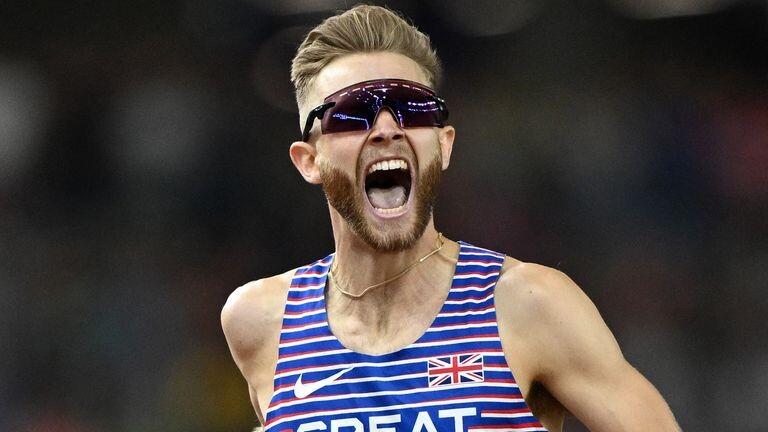
The medal is Kerr’s second on the global stage after he won bronze in the 1500m at the 2020 Tokyo Olympics – a race won by Ingebrigtsen.
Kerr’s medal is Britain’s fourth of the Budapest event, with Katarina Johnson-Thompson securing heptathlon gold; Lewis Davey, Laviai Nelson, Rio Mitcham and Yemi Mary John claiming silver in the mixed 4x400m relay; and Zharnel Hughes sprinting to bronze in the men’s 100m.
Kerr: I broke Ingebrigtsen with 50m to go
The 25-year-old told the BBC: « It’s been a long time coming. It’s an overwhelming experience, but I’m so proud of myself, of my team and my family.
« I threw my whole 16 years at that last 200m. I stayed calm, I just wanted to execute a race I would be proud of. I’m very glad to add to that medal count.
« I was battling with Jakob very hard, you can see by my face I’m throwing everything at this guy, I was hurting. I’ve wanted this my whole life. I’m so happy.
Kerr beat hot favourite Jakob Ingebrigtsen of Norway as Britain won the men’s 1500m for the second World Championships running
« At about 50m to go I kind of broke him, and it was holding on from that point. I’ve had the [Olympic] bronze [at Tokyo 2020] and the gold is much sweeter. »
Wightman: Kerr is like the Terminator
Wightman added: « Our little club in Edinburgh has had two back-to-back world champions. That’s hard to believe. Jakob Ingebrigtsen is going to start hating us Brits ain’t he?
« He showed so much promise for so long, that medal in Tokyo was just the start of this. When Josh Kerr gets it right and when he’s running well, he absolutely flies. I think Ingebrigtsen underestimated how well he was running at the moment.
« I’m so happy for him. Josh is like the Terminator. His internal confidence is crazy. »
Login to leave a comment
World Athletics Championships Budapest 23
From August 19-27, 2023, Budapest will host the world's third largest sporting event, the World Athletics Championships. It is the largest sporting event in the history of Hungary, attended by athletes from more than 200 countries, whose news will reach more than one billion people. Athletics is the foundation of all sports. It represents strength, speed, dexterity and endurance, the...
more...10 Things to Know About the World’s Fastest Man
Zharnel Hughes is the British record holder and the world’s top-ranked 100-meter sprinter this year who will bid for his first individual title at the World Championships in Budapest
American athletes have long dominated the 100-meter dash ever since the inaugural World Championships in 1983, amassing 11 titles in the event, the most of any nation. But for this year’s World Championships that kick off this Saturday—the most prestigious senior track competition outside of the Olympic Games—British record holder Zharnel Hughes wants to change the tally.
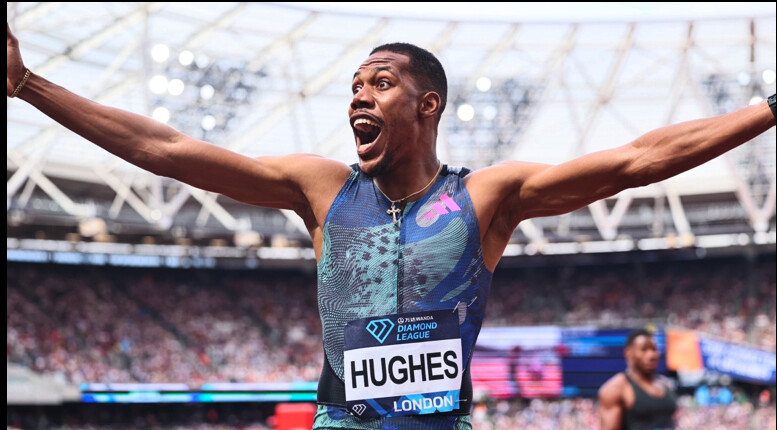
He enters the field with the fastest 100-meter time in 2023 (9.83 seconds), which he achieved in June at the USATF New York Grand Prix. The mark ranks Hughes as the 15th fastest of all time in the event, 0.25 seconds behind the world record held by eight-time Olympic gold medalist Usain Bolt.
Hughes, who has competed at three World Championships throughout his career, has twice-earned a silver medal in the 4 x 100-meter relay. And though he has come close—he was second in the 100-meter dash at the previous world champs—Hughes has never won an individual gold medal. If he is successful at the 2023 World Championships in Budapest, Hungary, August 19-27, Hughes will become the second man ever representing Great Britain to win the men’s 100-meter title, the marquee event of track and field.
Here are 10 things to know about the fastest man in the world in 2023:
Zharnel Hughes, 28, was born and raised on the island of Anguilla, a British territory in the Eastern Caribbean that is a mere 16 miles long and three-and-a-half miles wide. He holds dual citizenship for Great Britain and Jamaica. During his youth, Hughes competed for Anguilla, which is not recognized by the International Olympic Committee. In 2015, he opted to transfer his allegiance to represent Great Britain at international competitions.
Hughes hails from a family of runners on his father’s side, and his two younger brothers ran until high school. He got into the sport at age ten, often running against (and beating) peers. He competed in various track events, including the high jump, long jump, 400 meters, and 1500 meters.
“There was an annual sports day [at school], my first competition. At the end of it, I got seven medals—five gold, two silver. I got a trophy for being the most outstanding athlete of the day,” Hughes said. It gave him an early and strong impression of what else he might be capable of on the track.
Growing up, Hughes often watched YouTube videos of elite Jamaican sprinters, like world record holder Usain Bolt, as well as Yohan Blake, the third-fastest man in history. As fate would have it, Hughes would train alongside both of them when he moved to Jamaica as a teen to join the Racers Track Club, led by legendary coach Glen Mills.
Hughes describes his first in-person encounter with Bolt in 2012 as surreal. “I was striding on the grass field. I saw Usain on my left. He looked like a giant. He was striding as well. I just started mimicking everything he was doing. I don’t know why. I was young, 16. I was looking at Usain all in shock,” Hughes recalled. “Here’s the world’s fastest man. I’m right next to him!”
Hughes modified his training schedule to gym work in the morning and a two-hour sprint session in the afternoon and can be seen sprinting alongside “the youths” on the Racers Track Club, he says, adding, “they’re fast, they push me, and I like a challenge.”
Hughes points to nearly outrunning Usain Bolt in the 200-meter race in 2015 at his debut Diamond League meet—the Adidas Grand Prix in New York City—as one of his most memorable races. “Just before coming off the turn, I realized I was right there with Usain. I started running for my life,” Hughes said. “I was getting close to the line, and I was still there with him. I tried to lean forward, but his stride was longer than mine. The entire stadium thought that I won. Everybody was like, ‘Noooo!’” The race made headlines in Anguilla, and Hughes remembers motorcades and banners went up with his name on them.
The morning of June 24, 2023, prior to heading to the starting line of the New York City Grand Prix, Hughes wrote down the time he predicted he’d run: 9.83 seconds. He achieved exactly that, and it was a victory that shaved 0.04 seconds off the British record, previously set by Jamaican-born British Olympic champion Linford Christie at the 1993 World Championships in Stuttgart, Germany.
Hughes tore a ligament in his right knee after falling in a race in 2016 and consequently was absent from the Rio Summer Olympics. At the 2020 Tokyo Olympics, he qualified for the 100-meter final, but he couldn’t contend for a medal after a false start. Hughes later said the mishap was due to a sudden cramp in his left calf while in his set position in the starting blocks.
Hughes started investing in his nutrition at age 18. To this day, his diet is very conservative, partly the influence of a close friend, who is a bodybuilder. His morning routine includes a fruit smoothie, preferring bananas, pineapples, watermelon, and cantaloupe. He’ll sometimes blend spinach and oats. Boiled eggs, omelets, fish, and chicken are his protein staples. He likes to hydrate with coconut water every day, and he never leaves home without a snack, typically a Nature Valley granola bar. “Nutrition helps a lot, trust me,” Hughes said. “It helps keep injury away. Because your body is always being fed, it doesn’t feed on itself.”
While he had to wean himself away from his vice, chocolate cake, he maintains a nightly ritual of a bowl of corn flakes, which he says helps him sleep. On a rare occasion he splurges on a Burger King cheeseburger.
During a flight, Hughes will go to the back of the aircraft to stretch. “I don’t care if anyone is looking at me,” he said. As soon as he lands, he tries to do a shakeout run, sprinting 50 meters on a hotel walkway for up to 15 minutes, or else he’ll put on compression boots and later have his physio flush out his legs.
When he was 11, Hughes flew with a pilot from Anguilla to the British Virgin Islands. He remembers sitting in the cockpit, tempted to play with the instruments inside the aircraft. Only after the plane landed and was switched off did he have the opportunity to grab the control wheel. The experience encouraged his dream of becoming a pilot. He fulfilled his childhood goal of earning a pilot’s license in 2018, seven months after studying at the Caribbean Aviation Training Center in Jamaica.
So as not to interfere with track, he’d often arrive at the aviation center as early as 5 A.M. “I had to make a lot of sacrifices to make it happen,” he said, noting that on a couple of occasions he reconsidered pursuing the license. Flying is now one way he spends time before mid-afternoon track sessions. At times he has flown a Cessna 172, a single-engine prop plane, up to four days a week for an hour and as far away as Montego Bay in Jamaica.
Catch Hughes in action when he takes the starting line on August 19, day one of competition, for the first round of heats for the men’s 100-meter dash.
by Outside Online
Login to leave a comment
I'm hungry to reclaim my title in Budapest – Timothy Cheruiyot
2019 1500m World Champion Timothy Cheruiyot says he is ready to reclaim his title at the World Championships set for Budapest, Hungary from August 19-27.
The 19th edition of the biennial championships will last for eight days.
The 27-year-old will lead a team of former Olympian Abel Kipsang and reigning World junior champion Reynold Cheruiyot.
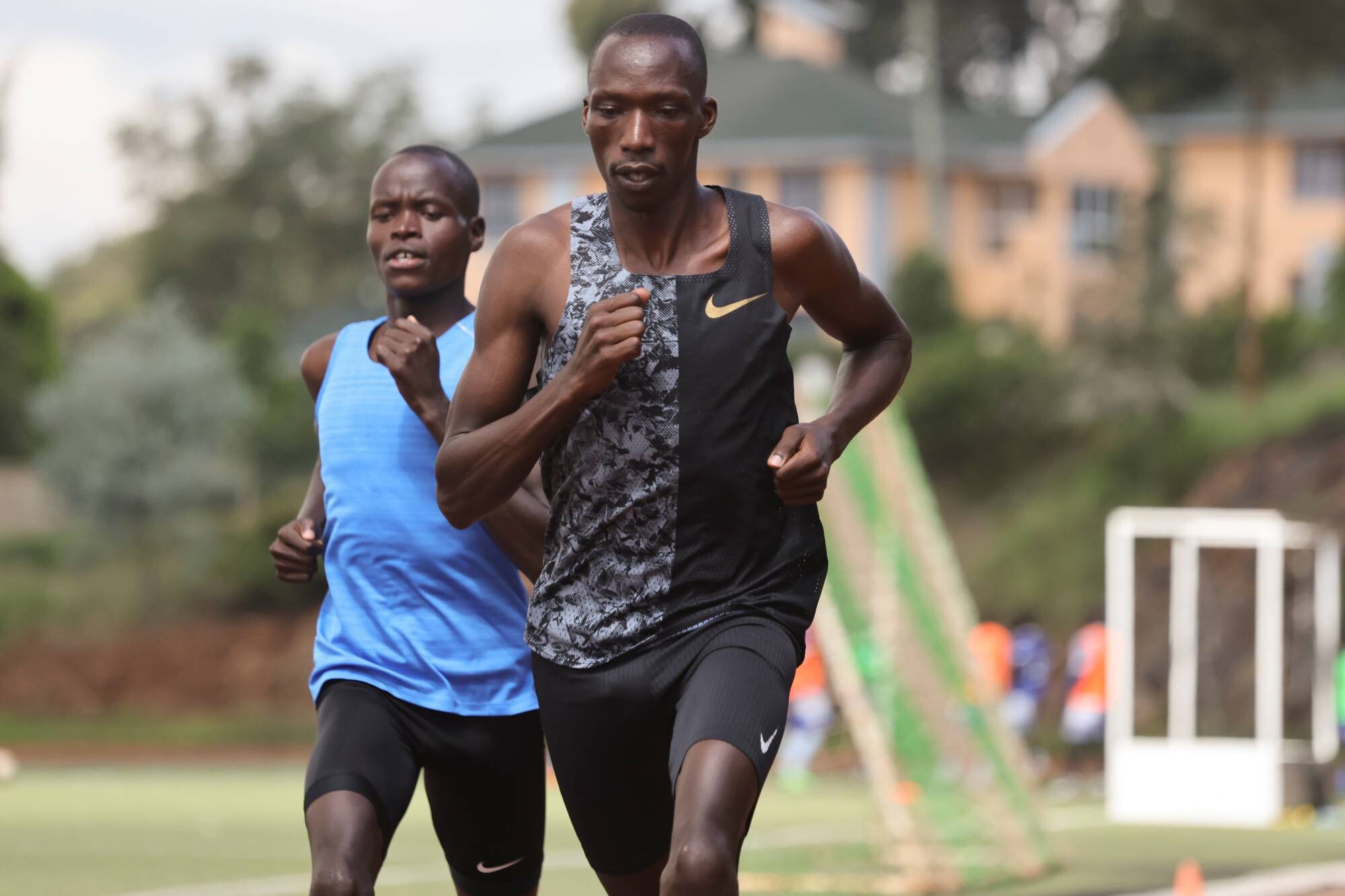
“Together with Reynold and Kipsang we have to plan well how we will execute the final. We know the competition will be very tough but we are ready. Similarly, we are also a threat to our competitors and if our plan goes on well, we will bring medals home,” he said.
The men’s 1500m heat will be the main event of the championships on the first day and will begin at 13:15 pm August 19.
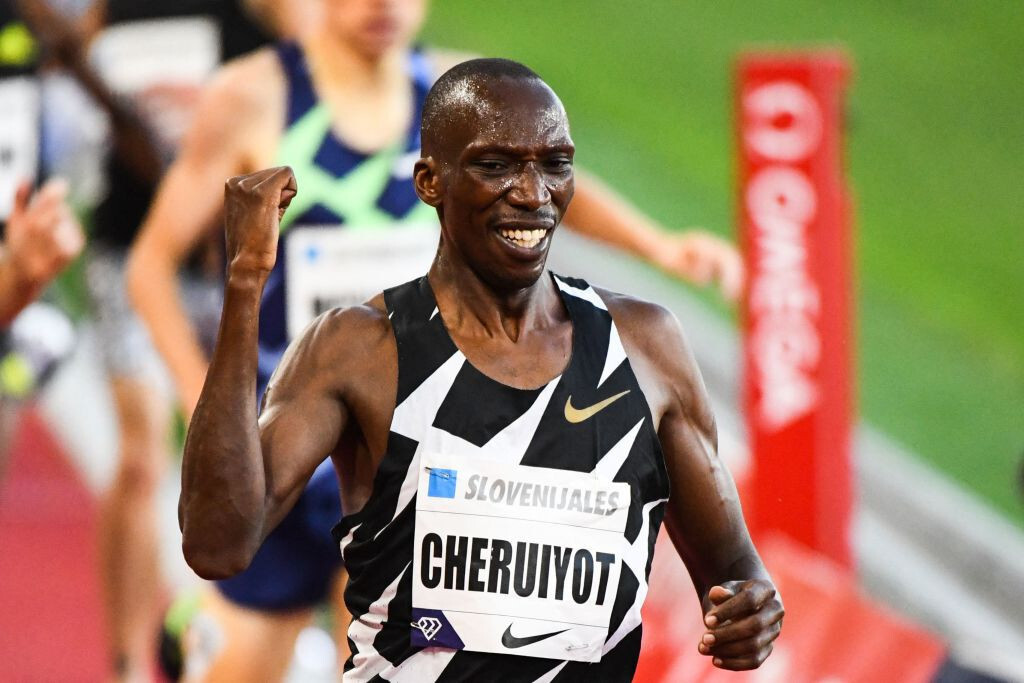
Cheruiyot will be seeking to emulate his Doha heroics that saw him cross the finish line in a time of 3:29:26.
“My preparation for the World Championships has been good. We have executed the training well and I can say that I am now ready.
"We will be competing on the first day of the championships and thus my strategy is to run well in the heats and semifinals and then plan for the finals. I am very hungry to reclaim my title,” Cheruiyot said.
Cheruiyot won a silver medal at the 2017 edition of the competition in London after clocking 3:33:99.
Cheruiyot has won the Diamond League meet four times (2017, 2018, 2019, 2021).
He is the 2020 Tokyo Olympics silver medalist.
by Teddy Mulei
Login to leave a comment
World Athletics Championships Budapest 23
From August 19-27, 2023, Budapest will host the world's third largest sporting event, the World Athletics Championships. It is the largest sporting event in the history of Hungary, attended by athletes from more than 200 countries, whose news will reach more than one billion people. Athletics is the foundation of all sports. It represents strength, speed, dexterity and endurance, the...
more...Sha’Carri Richardson runs 100m world lead at U.S. Track and Field Championships
On the first day of the USATF Track and Field Championships in Eugene, Ore., U.S. sprinter Sha’Carri Richardson made a triumphant comeback, leaving spectators in awe as she blazed to a 100m world lead. Richardson set a new personal best and the fastest women’s 100m time of the year, clocking an impressive 10.71 seconds (+0.1 m/s).
During the heats of the women’s 100m on Thursday evening, Richardson delivered an outstanding performance, winning the first heat and securing her spot in Friday’s semi-finals. Her time not only surpassed her competitors by a significant margin but exceeded the previous world-leading time of 10.75 seconds set by Marie-Josee Ta Lou of Ivory Coast at the Oslo Diamond League just a month ago.
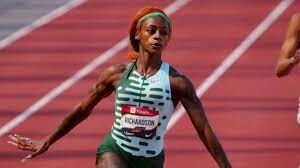
Richardson’s achievement was even more remarkable as she improved her best by one-tenth of a second from her previous record of 10.72 seconds, set in 2021 at the Miramar Invitational in Florida. Her new personal best now ranks as the sixth-fastest 100m time in history and the fourth-fastest ever by an American woman.
As anticipation grows, Richardson advances to the 100m semi-finals and ultimately aims for a spot in the final, scheduled for Friday evening. The stakes are high, as the top three U.S. sprinters in these races will earn the privilege to represent Team USA at the 2023 World Athletics Championships in Budapest next month. With her exceptional performance, Richardson is undoubtedly a strong contender for one of those positions.
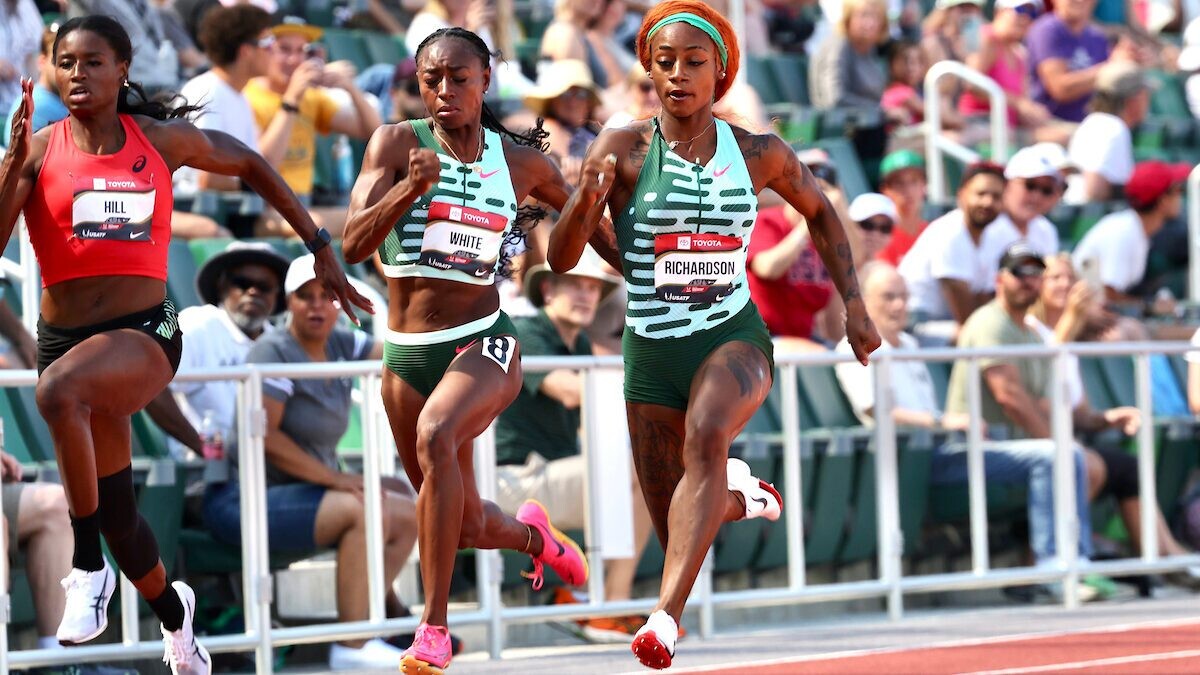
Richardson’s journey hasn’t come without obstacles. Following her victory in the 100m at the 2021 U.S. Olympic Trials, she faced a ban and disqualification due to a positive cannabis test, causing her to miss the delayed 2020 Tokyo Olympics. In 2022, she also faced challenges, failing to reach the final in the 100m and 200m at the U.S. Championships and missing out on qualification for the 2022 Worlds team.
The 2023 USATF Track and Field Championships are taking place from July 6 to 9 at Hayward Field in Eugene, Ore
by Running Magazine
Login to leave a comment
Natasha Wodak and Jeremy Coughler win Canadian 10,000m titles
Wodak secures her second national in three weeks, and Coughler wins his first Canadian 10,000m title at Pacific Distance Carnival in Langley, B.C.
Three weeks after successfully defending her Canadian 10K title in Ottawa, Natasha Wodak added another national title to her extensive resume at the Canadian 10,000m Championships in Langley, B.C. Wodak won by a significant margin of 30 seconds, securing her second Canadian title of the 2023 season. On the men’s side, London, Ont’s. Jeremy Coughleremerged as a first-time national champion, crossing the finish line in 28:46.96 on a warm and windy evening at the Pacific Distance Carnival.
Despite experiencing some minor hamstring tightness leading up to the 10,000m championships, Wodak displayed her exceptional fitness by establishing an impressive lead of nearly 100 meters after the 5K mark. Assisted by 2020 Olympian Natalia Allen for 12.5 laps, Wodak maintained her position and claimed victory overKatelyn Ayers and Cleo Boyd.
Ayers achieved a personal best time of 33:11.77, securing second place, while Boyd from Kingston, Ont., finished seven seconds behind Ayers in 33:18.27, taking the third spot. This marks the second time in the last four years that Wodak has achieved the remarkable feat of winning both the 10,000m and 10K titles. She previously accomplished this feat in 2019.
Wodak will now return to training as she continues her preparations for the marathon at the 2023 World Athletics Championships scheduled in Budapest in late August. Her last representation for Canada was at the 2020 Tokyo Olympics, where she placed 13th in the marathon.
Coughler captures Canadian crown
For Coughler, following his third-place finish at the Canadian 10K Championships last month, the desire for further success propelled him to secure his first individual Canadian national title. Representing the London Western Track Club and working as a full-time chiropractor, Coughler has been on a roll in 2023, winning multiple races and showcasing his talent. Perry MacKinnon from Sherbrooke, Que., impressed with a commendable time of 28:52.60, securing the second position.
Meanwhile, Mexican Olympian Juan Luis Barrios claimed third place with a time of 28:55.82. However, since Barrios is ineligible for Canadian championship recognition, the third-place medal was awarded to Andrew Alexander from Toronto, who finished fourth in 29:25.64.
by Running Magazine
Login to leave a comment
Sheila Chepkirui over the moon after making Team Kenya to Budapest
Kenyan marathon runner, Sheila Chepkirui, has expressed her delight at being selected for the 2023 World Championships in Budapest, Hungary.
Chepkirui, 33, comprises the stellar list of headliners unveiled by Athletics Kenya (AK) last week to hold forte for the country in the flagship global extravaganza set for August.
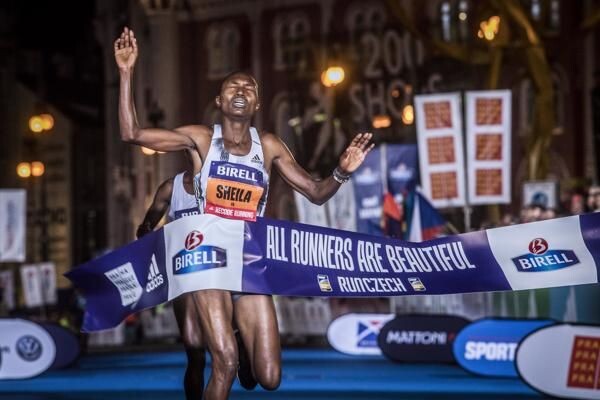
The Commonwealth Games 10,000m bronze medalist said she has already begun her preparations in anticipation of a monumental conquest in the central European nation.
"I'm overjoyed to have made the team. It is always a wonderful honour to be given the rare opportunity to represent the country on such a stage. "I'm hoping to do well," Chepkirui said.
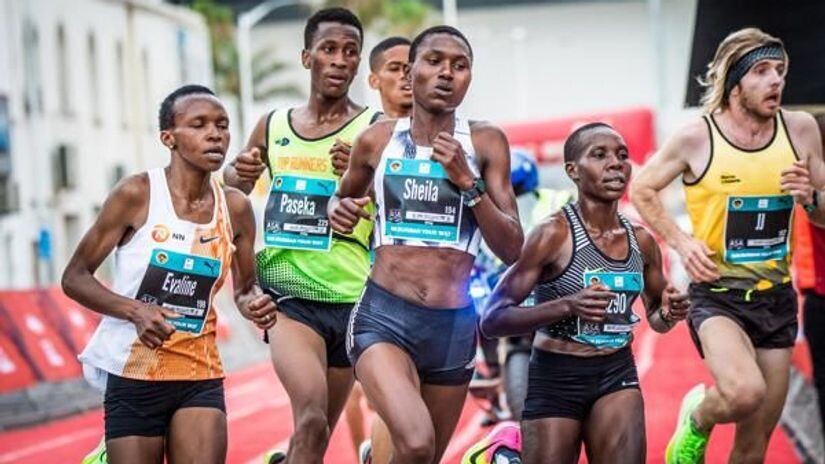
She said she plans to participate in the Boston 10k race on June 25 as part of her training program."Right now my focus is to prepare adequately for the World Championships. I'll be traveling to the US to battle out in the Boston 10k race to evaluate my speed," Chepkirui remarked. "I don't intend to compete in any major marathon events until then," Chepkirui said.
Budapest will be her third marathon attempt after she clocked 2:17:29 to wrap up sixth on her debut over the distance in Valencia last year.
She heads into the championships buoyed by her impressive show at the 2023 London Marathon on April 23, where she placed fourth behind Holland's Sifa Hassan, Ethiopian Alemu Megertu, and compatriot Peres Jepchirchir respectively.
The Kenya Defence Forces officer said she is currently on vacation in Kericho county, where she is perfecting her act for the herculean task. I am currently on leave, so I am training alone at home in Kericho. I usually work out with the KDF team in Ngong," she stated.
Chepkirui will be heading to Budapest strengthened by a recent heartwarming report that ranked her fourth in the 10 km road race on the world all-time list.
A natural trailblazer, Chepkirui defeated Japan's Yuriko Kobayashi over 1500m at the 2005 World Youth Championships to storm her maiden global title after posting a championship record of 4:12.29.
After enrolling with Kenya Defence Forces around 2012, she secured a spot on the plane to the 2016 African Cross Country Championships, where she bagged the silver in a Kenyan podium sweep alongside compatriots Alice Aprot and Beatrice Mutai.
Chepkirui will, however, first have to fend off a stiff challenge from 2020 Tokyo Olympics silver medals Brigid Kosgei who won the 2018 and 2019 Chicago Marathons, the 2019 and 2020 London Marathons, and the 2021 Tokyo Marathon.
She won the Paris Half Marathon title in France after clocking 66.00 minutes ahead of Ethiopian Betelihem Yemer (66.45) and Kenyan Marion Kibor (66.45). Unforeseen visa gremlins saw her painfully miss out on this year's Boston Marathon as well as the Oregon22 World Athletics Championships.
She nonetheless secured a place in Team Kenya for the Birmingham Commonwealth Games last year, where she blazed to the 10,000m bronze podium behind Scot Eilish McColgan and compatriot Irene Cheptai.
by Tony Mballa
Login to leave a comment
World Athletics Championships Budapest 23
From August 19-27, 2023, Budapest will host the world's third largest sporting event, the World Athletics Championships. It is the largest sporting event in the history of Hungary, attended by athletes from more than 200 countries, whose news will reach more than one billion people. Athletics is the foundation of all sports. It represents strength, speed, dexterity and endurance, the...
more...Sifan Hassan dazzles on the track in her season opener
Six weeks after winning the London Marathon, Sifan Hassan returned to action on the track in dazzling fashion at the FBK Games in Hengelo, Netherlands. On Saturday, Hassan won the women’s 10,000m, clocking the seventh-fastest time in history and a world lead of 29:37.80. She followed up her 10,000m win with a 3:58.12 in the women’s 1,500m, dropping the field over the final lap to win with ease.
In a post-race interview, Hassan told reporters that she entered the two races to see where she was at, two months out from the 2023 World Athletics Championships in Budapest. Hassan confirmed after her historic win in London that she is now shifting her focus to the track for the world championships, but said she plans to race another marathon in the U.S. (Chicago or New York), possibly as soon as this fall.
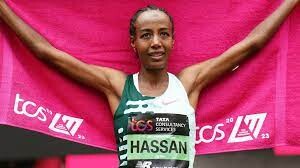
“I had the marathon just six weeks ago, and for me, the change was very hard,” said Hassan. “I am happy with my performance.” Her times for both distances are inside of the 2023 World Championships qualifying standards.
This isn’t the first time Hassan has demonstrated her extraordinary range over a short period. At the 2020 Tokyo Olympics, Hassan attempted the distance trifecta, winning gold in the 5,000m and the 10,000m but falling short in the 1,500m, taking bronze behind Faith Kipyegon and Laura Muir.
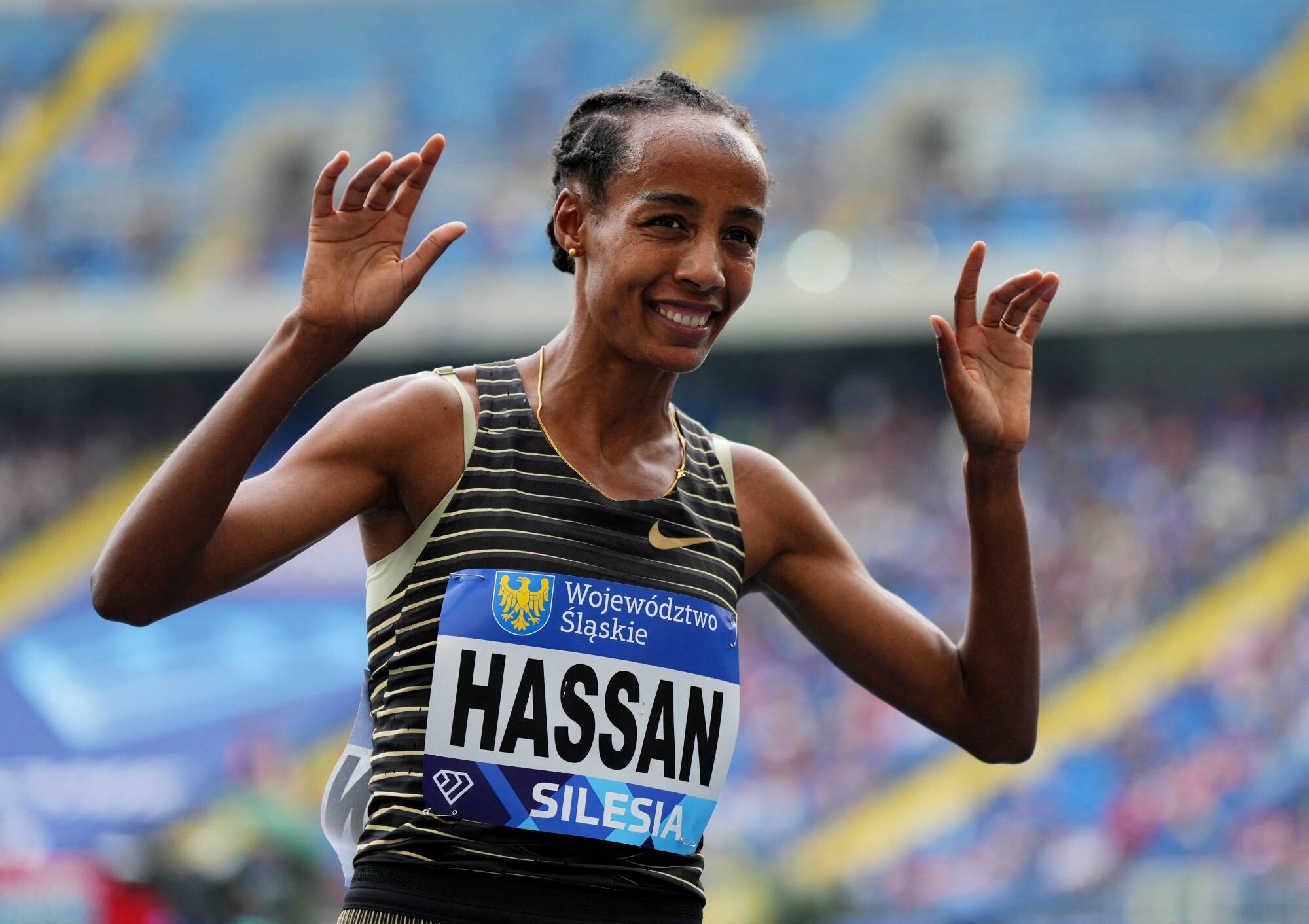
by Marley Dickinson
Login to leave a comment
Sydney McLaughlin-Levrone to return to the track at Paris Diamond League
Sydney McLaughlin-Levrone, the current world-record holder in the women’s 400m hurdles, will return to the track at the Paris Diamond League meeting on June 9. On Monday, Paris Diamond League event organizers announced that McLaughlin-Levrone will race in the women’s 400m, an event she has not run in two years.
At 23, the American athlete achieved two remarkable feats at the last two major championships. At the 2020 Tokyo Olympics, McLaughlin-Levrone won gold in both the 400m hurdles and 4x400m relay, breaking her hurdles world record in 51.64 seconds. A year later, at the 2022 World Championships in Eugene, Ore., she smashed her record again in 50.68 seconds, becoming the first woman to go under the 51-second barrier.
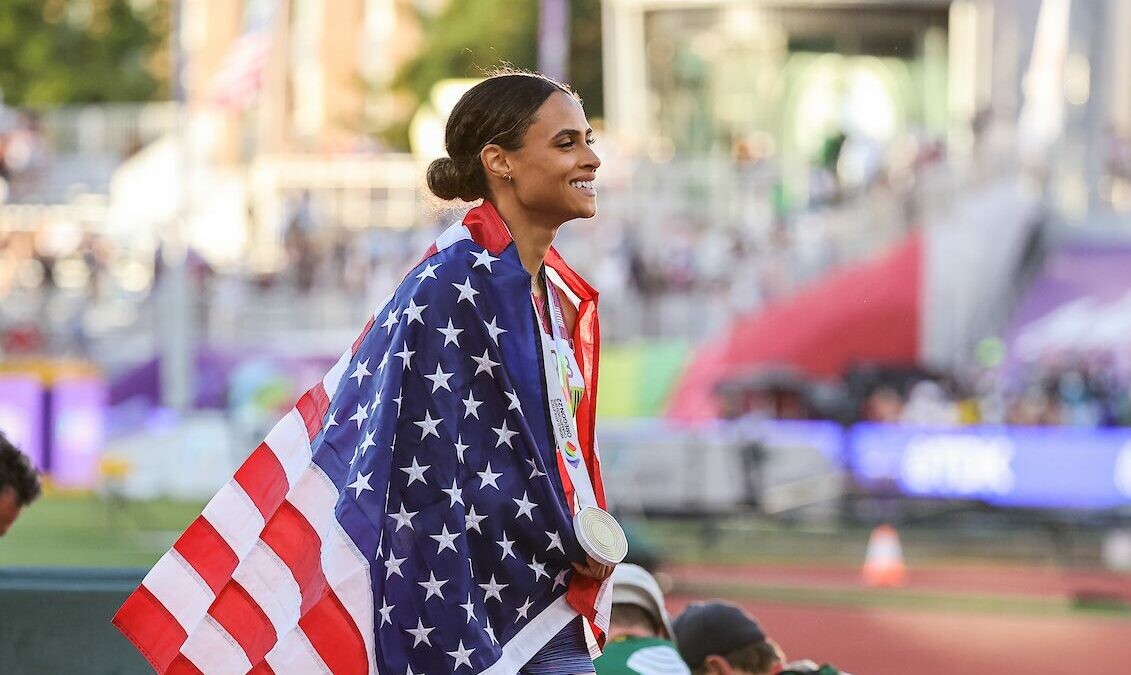
For two years, U.S. track fans have speculated if generational talent McLaughlin-Levrone could challenge the American 400m record of 48.70 seconds held by Sanya Richards-Ross. McLaughlin-Levrone’s last 400m came at the 2021 Bryan Clay Invitational, where she won the race in 51.16 seconds. She has a one-lap personal best of 50.07 seconds from 2018.
McLaughlin-Levrone has only raced once this season, an indoor 60m race at the 2023 Boston New Balance Grand Prix in February. She was initially scheduled to return at the USATF Los Angeles Invitational meet on May 27, but her coach Bobby Kersee withdrew her last week, citing hamstring soreness.
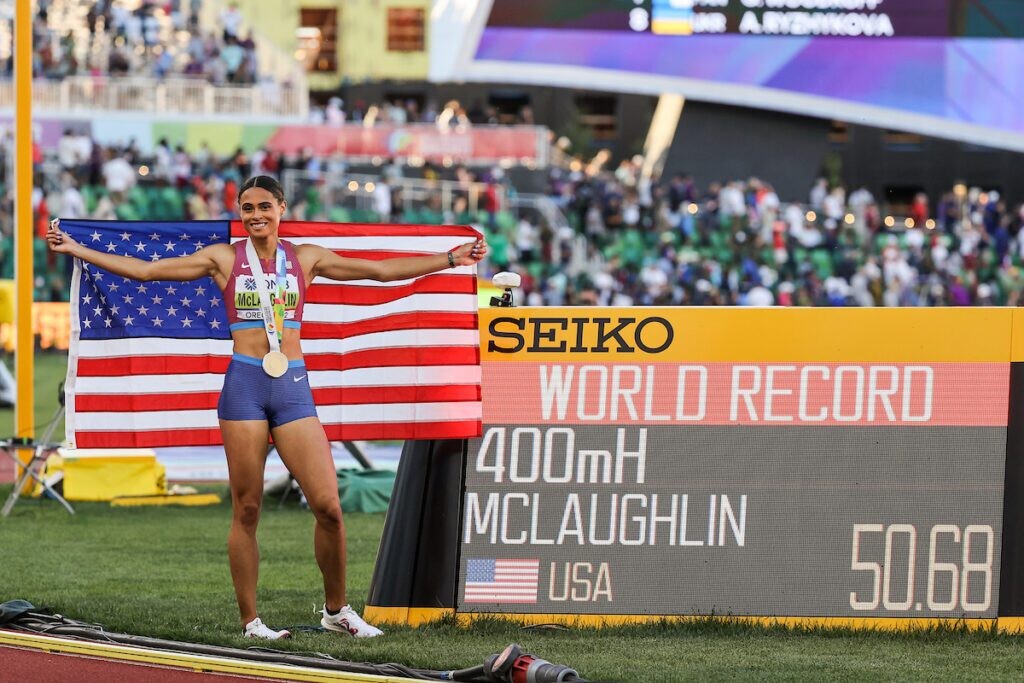
At the June 9 Paris Diamond League meeting, McLaughlin-Levrone will share the track with Marileidy Paulino of the Dominican Republic, the silver medallist in the 400m from the 2020 Tokyo Olympics. This will be the first time McLaughlin-Levrone has competed at a European Diamond League event since 2019.
Login to leave a comment
European half-marathon record holder Melat Kejeta to take on Tartan Ottawa International Marathon
The fastest European half-marathoner in history, Germany’s Melat Kejeta, will take on former Canadian marathon record holder Malindi Elmore and other international elites at the 2023 Tartan Ottawa International Marathon on May 28. Kejeta won a silver medal for Germany at the 2020 World Half Marathon Championships in Poland, setting a European half marathon record of 65:18.
Throughout her 12-year professional career, Kejeta has produced a few remarkable results. In 2019, she was sixth at the Berlin Marathon with a personal best time of 2:23:57. She followed up her debut marathon with another sixth-place finish against the world’s best at the 2020 Tokyo Olympics.
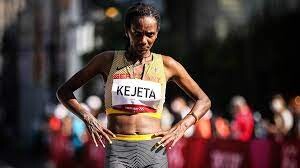
The 2023 Ottawa Marathon will be Kejeta’s first race since 2021. The 30-year-old runner, who also works as an officer in the German police force, gave birth to her first child in early 2022. “When I ran the Olympic marathon, I was pregnant, but I didn’t know that (at the time). It was not planned. So it was a bit of a surprise,” said Kejeta in an interview with Run Ottawa.
In Ottawa, Kejeta will renew a rivalry from her last marathon, facing off against a fellow mom, Elmore, the top Canadian finisher in the 2020 Tokyo Olympic marathon, who finished three spots behind her for ninth.
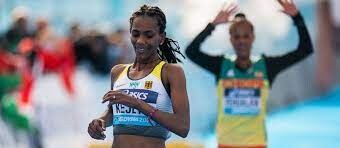
Kejeta said the 2023 Ottawa Marathon will be special for her, as it will be her first marathon with her daughter in attendance. “I am looking forward to having her on the sidelines at the halfway point,” she said.
With under two weeks until race day, Kejeta and Elmore are just two of the extensive list of female elites at the 2023 Ottawa Marathon. The Ethiopian contingent of Adanech Anbesa, Waganesh Mekasha and Ayana Mulisa will provide Kejeta and the experienced Elmore with a challenge. All three women have personal bests of 2:24:30 or faster, with Mekasha finishing in the top five at the 2022 Chicago Marathon.
by Marley Dickinson
Login to leave a comment
Ottawa Marathon
As one of two IAAF Gold Label marathon events in Canada, the race attracts Canada’s largest marathon field (7,000 participants) as well as a world-class contingent of elite athletes every year. Featuring the beautiful scenery of Canada’s capital, the top-notch organization of an IAAF event, the atmosphere of hundreds of thousands of spectators, and a fast course perfect both...
more...Abel Kipsang eyes gold at World Championships in Budapest
The 2022 World Indoor Championships 1500m bronze medalist, Abel Kipsang will be targeting gold in his specialty at the World Championships in Budapest, Hungary.
"I'm aiming for gold, but if things go wrong, I should be able to finish on the podium in Budapest," said Kipsang in an exclusive interview on Monday.
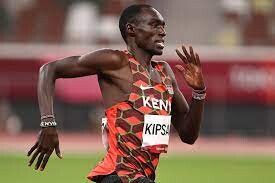
Kipsang has been honing his skills at the Traffic Police headquarters training ground under the watchful eye of legendary athletics coach Alfred Sang.
The National Police officer will attempt to beat his personal best time of 3:31.65, which he set at the Tokyo Games last year.
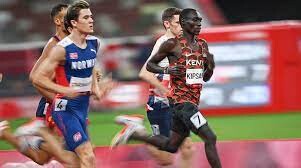
"I also want to beat my previous best time. I've already clocked a 3:29.56 and my new goal is a 3:28.00."
Kipsang expressed his satisfaction with his performance at the weekend's Kip Keino Classic at Moi Stadium in Kasarani. He clocked 3:32.70 minutes to finish second to Reynold Kipkorir, who won in 3:32.01.
"I prepared well for the race, and my body was in top shape. I'm pleased with the time I set at Kasarani. I'm hoping to accomplish a lot more in the coming events," Kipsang remarked.
With his sights set on boarding the Team Kenya jet to Budapest, Kipsang is overjoyed to have already met the qualification standards for the much-anticipated annual global extravaganza, which will be held in August.
"The qualification time set by World Athletics is 3:34.20, and I managed a 3:32.70 at the Kip Keino Classic on Saturday," Kipsang stated.
Despite the stiff competition he is going to face in Budapest from a talented field of rivals, Kipsang says he is not nervous.
"I'm not training with any particular opponent in mind. It's all about getting the greatest time possible to give me an advantage in competition."
He will rely primarily on his extensive knowledge and superior skill to lead him to stardom in Budapest.
Kipsang won the bronze medal at the 2022 World Indoor Championships in Belgrade after finishing fourth in the 1500m at the 2020 Tokyo Olympics.
At the 2019 African Games in Rabat, he competed in his first international competition, finishing fourth in the 800m with a time of 1:45.43 mins.
On June 9, 2021, in Marseille, he ran a personal best of 3:32.6 in the 1500m. He had placed third at the Kenyan Olympic trials 10 days earlier, securing his spot in the postponed 2020 Tokyo Olympics.
His score from Marseille put him in the top ten in the world. Kipsang achieved a new Olympic record in the semifinals of the 1500m on August 5, 2021, in Tokyo, clocking 3:31.65, to improve his personal best.
This record was eventually surpassed by Jakob Ingebrigtsen, who ran 3:28.32 in the final, while Kipsang finished fourth in 3:29.56. Timothy Cheruiyot won silver in 3:29.01, while Josh Kerr finished third in 3:29.05.
In 2022, he won a bronze medal at the World Indoor Championships in Belgrade, clocking a personal best of 3:33.36 and finishing behind Samuel Tefera (3:32.77) and Ingebrigtsen (3:33.02).
by Tony Mballa
Login to leave a comment
World Athletics Championships Budapest 23
From August 19-27, 2023, Budapest will host the world's third largest sporting event, the World Athletics Championships. It is the largest sporting event in the history of Hungary, attended by athletes from more than 200 countries, whose news will reach more than one billion people. Athletics is the foundation of all sports. It represents strength, speed, dexterity and endurance, the...
more...Kenya's track sensation Mary Moraa has her eyes firmly focused on a World Championship conquest in Budapest later in the year
Barely in her 20s, Kenya's track sensation Mary Moraa is already hogging the global limelight and stealing headlines at whim.
The 2022 Commonwealth Games 800 metres gold medallist has rocked premier global athletics shows in recent years to deservedly cut herself a niche in the Hall of Fame.
Fondly known as "The Kisii Express" by her dotting fans, Moraa has already claimed her space in the cutthroat world of athletics. Undoubtedly, the decorated track prodigy deserves every ounce of international acclamation.
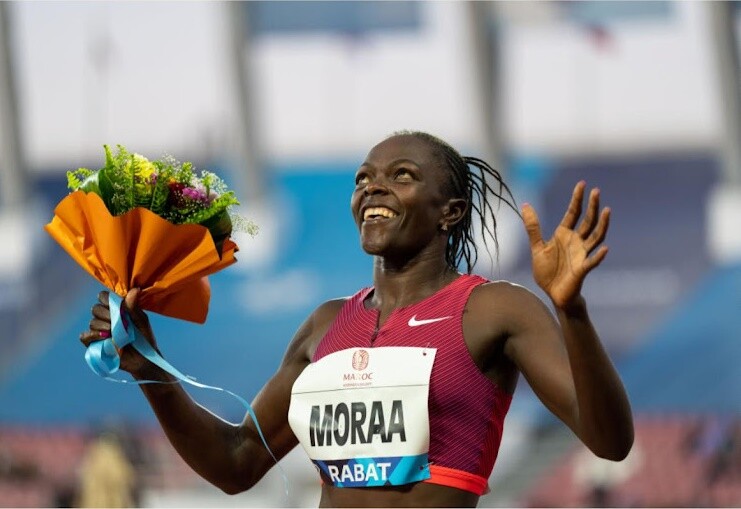
Only recently, she set a new PB in April after storming to the 400m title at the Botswana Golden Grand Prix in an astonishing time of 50.44.
The sublime performance she pulled off in the blistering contest saw her smash her previous national record by 0.24 seconds, subsequently attaining the World Athletics Championships qualifying standards of 51.0 seconds.
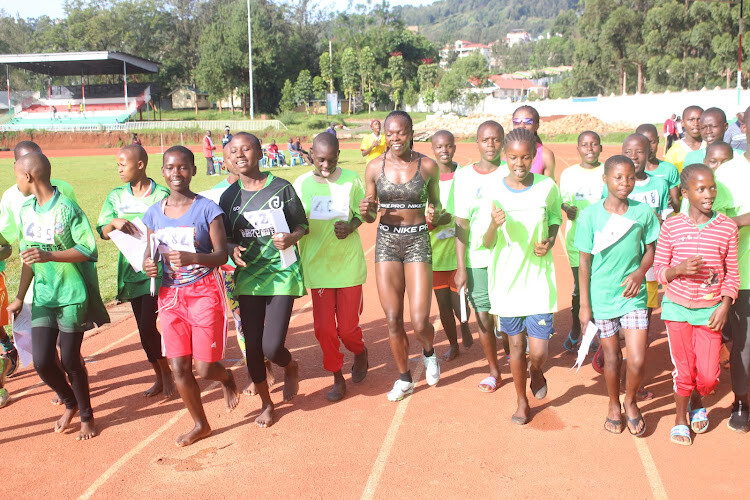
"My previous 400m best was 50.67, which I attained at the Diamond League meeting in Brussels in September."
In Botswana, the two-lap specialists obliterated a stellar field that boasted Olympic and world finalist Candice McLeod of Jamaica, USA’s Kyra Jefferson, and the Botswana duo of Naledi Lopang and Thompang Basele.
She breezed to victory ahead of South Africa’s Miranda Coetzee and McLeod who crossed the line in 51.13s and 51.17s respectively.
She rallied from behind to take the lead with 30m to go on her way to the winner's podium at the National Stadium, Gaborone.
Moraa smashed the national record when she won the Kenyan trials for World Championships and Commonwealth Games in 50.84 on June 25, last year at the Moi Stadium, Kasarani.
Moraa, 23, has vowed to step into the big shoes of her role model Hellen Obiri, the middle and long-distance track sensation.
"I've always admired Obiri. I grew up watching her clinch titles and her amazing performances have inspired me a great deal. To an extent, there is a part of her that lives in me. I just want to be exactly like her," Moraa said.
"To date, Obiri still inspires me a great deal and I'm eager to emulate her success on the international stage," she added.
Indeed, Moraa has every reason to admire Obiri. She is the only woman to have won world titles in indoor track, outdoor track, and cross-country races.
Notably, Obiri is a two-time Olympic 5000 metres silver medallist from the 2016 Rio and 2020 Tokyo Olympics, where she also placed fourth over the 10,000 meters.
She is a two-time world champion, having claimed the 5000 m title both in 2017 and 2019 when she set a new championship record.
Obiri also tucked away a bronze in the 1500 metres during the 2013 World Championships and a silver in the 10,000 m in 2022.
She won the 3000 meters race at the 2012 World Indoor Championships, claimed silver in 2014, and placed fourth in 2018. She romped to the 2019 World Cross Country title and triumphed in the 2023 Boston Marathon.
Moraa said she and Obiri share a lot in common. Besides being compatriots, Moraa is elated they hail from the same county.
Coached by seasoned National Police athletics team gaffer Alex Sang, Moraa has her eyes firmly trained on a World Championship conquest in Budapest, Hungary later in the year.
She said she intends to run the 800m race at the World Championships in Budapest, Hungary in August, adding that she is determined to breast the tape in under two minutes.
Born on June 15, 2000, Moraa attended Nyangononi Primary School in Bassi Borabu, Kisii County where she sat for her Kenya Certificate of Primary Education (KCPE) in 2014.
Her potential in athletics came to the fore at Nyangononi when she ran away with several titles in the sprints and middle-distance races.
"I stamped authority in 100m, 200m, 400m, and 800m and even shattered the 400m East Africa school games record in 2014," Moraa proudly recounted.
Upon completing her studies, Moraa proceeded to Ibacho Secondary School in Kisii County but lasted there for only two years before transferring to Mogonga PAG Mixed secondary school where she sat for her Kenya Certificate of Secondary Education (KCSE) in 2018.
"While at Ibachi, I experienced difficulties paying my school fees and it was the principal who would chip in most of the time. Unfortunately, he got transferred from the school and I was left stranded.
"I later joined Mogonga Mixed Secondary School, where I got a lot of support from the principal who also happened to be my coach."
An orphan from a disadvantaged background, Moraa got financial help from her school principal Aron Onchonga who paid all her school fees at Mogonga. Indeed, aside from affording her pertinent financial assistance, Onchong'a played a key role in honing her skills and carving her path to stardom. It was during her years in Mogonga that Moraa started jutting out her talons on the track.
"I am grateful to the school administration and the Principal for the moral and financial support they gave me while there."
During my years in Mogonga, I wanted to remain a role model to the young girls who shied away from sporting activities. I was determined to train and participate in various activities even after completing school," said Moraa.
by Tony Mballa
Login to leave a comment
World Athletics Championships Budapest 23
From August 19-27, 2023, Budapest will host the world's third largest sporting event, the World Athletics Championships. It is the largest sporting event in the history of Hungary, attended by athletes from more than 200 countries, whose news will reach more than one billion people. Athletics is the foundation of all sports. It represents strength, speed, dexterity and endurance, the...
more...Five things all runners can learn from London Marathon champion Sifan Hassan
Two-time Olympic champion Sifan Hassan made her marathon debut at the 2023 London Marathon, and she won in heroic fashion–making a comeback after stopping twice to stretch an impinged hip. Heading into the race, Hassan said she went through the typical pre-race antics that every runner has: why did I decide to do this? Did I train enough? I don’t know what to expect.
Hassan executed her resiliency, showing that anything can be possible and how normal it is to question everything before your race. Here are five takeaways from the 2023 London Marathon champion.
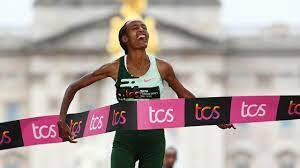
1.- It is OK to be nervous!
Even after setting world records and winning multiple Olympic medals in her career, Hassan said she was excited, yet very nervous about her marathon debut in London.
Runners are only human, and most put in countless hours of training into a goal race–so being nervous is not a bad thing. Nerves are just runners’ sympathetic nervous system (SNS) kicking in, which is one of two components of the body’s central nervous system. The SNS releases two hormones in response to high-stress situations–epinephrine and norepinephrine (also known as adrenaline and noradrenaline), which result in that feeling of having butterflies in your stomach.
According to research, nerves are a good thing, and they can help your body perform better. Nerves help your reflexes become faster and improve blood circulation before exercise.
2.- Put expectations to rest
Before the London Marathon, the 2019 world 1,500m champion said during a pre-race press conference she did not change much in her training and had no goal time in her mind. “The marathon is a different distance for me; I do not know what to expect, but I want to try it,” said Hassan.
If you are trying a new distance or race, you will not know what to expect until you finish. Try to leave your expectations behind and embrace the experience. There’s a good chance you’ll surprise yourself.
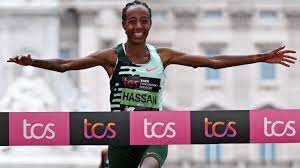
3.- Trust yourself
There are a million training tips online on what to do before your first marathon or how much mileage you should run per week, but not all tips will work for you. Hassan said she did not change up much of her training and kept a similar schedule similar to her 2020 Tokyo Olympics build.
It is okay to take advice, but there’s no 100 per cent blueprint on how to train for the marathon since all runners are different. Find out what works for you, and stick with it.
4.- Don’t be afraid to stop
Hassan might be the first woman to win a marathon major while stopping twice to walk. She clarified after the race that she had hip tightness and found that the pain only increased as she continued to run. Once she stopped, walked, and stretched out the discomfort, she started running again, eventually catching the lead group around 35 km.
Running is a high-impact sport on your joints and muscles. If there is any tightness or tenderness, it can usually be better to stop and quickly address the issue rather than running and doing more damage.
There is a negative connotation around stopping during a race, but a short walking interval can also break up the monotony and help you deal with the mental challenges or discomfort you may be feeling. This tip is helpful for runners doing longer distances (like a half or full marathon) for the first time.
5.- Have fun out there
Although trying something new can bring challenges, have fun and enjoy the experience. Hassan had no thoughts of winning the London Marathon beforehand, she just wanted to try something she wasn’t used to doing, which ended up working in her favor, leading to her first Abbott World Marathon Major win.
by Marley Dickinson
Login to leave a comment
TCS London Marathon
The London Marathon was first run on March 29, 1981 and has been held in the spring of every year since 2010. It is sponsored by Virgin Money and was founded by the former Olympic champion and journalist Chris Brasher and Welsh athlete John Disley. It is organized by Hugh Brasher (son of Chris) as Race Director and Nick Bitel...
more...World champion Norah Jeruto suspended for doping
On April 7, the Athletics Integrity Unit (AIU) provisionally suspended the 2022 world 3,000m steeplechase champion Norah Jeruto of Kazakhstan. Jeruto has been suspended for the use of an unidentified prohibited substance, according to the athlete’s biological passport (ABP) data.
Last July, Jeruto became the first Kazakhstan athlete to win gold at the World Athletics Championships, setting a new championship and national record of 8:53.02 in the women’s 3,000m steeplechase. She also won the 2021 Diamond League title in the same event.
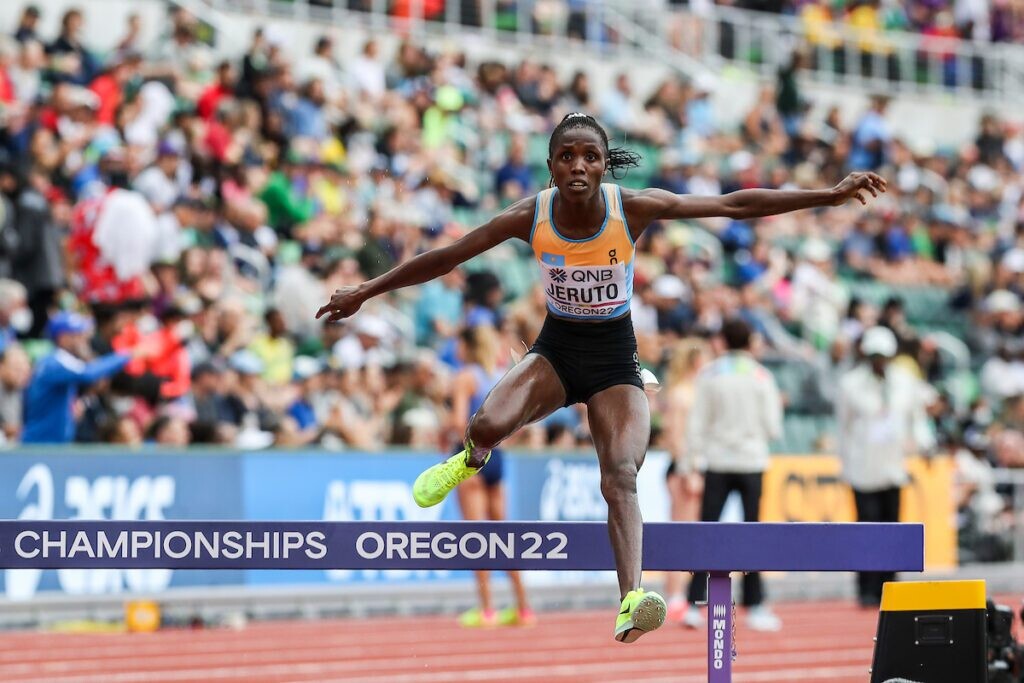
Jeruto is suspended temporarily from participating in any competition prior to a final decision at a hearing conducted under the World Athletics anti-doping rules, or the Integrity Code of Conduct. If Jeruto’s provision suspension stands, she will be stripped of her world championship gold medal.
The purpose of analyzing an athlete’s ABP data is to monitor select biological parameters over time that may indirectly reveal the effects of doping. This approach allows the AIU to generate individual, longitudinal profiles for each athlete and to look for any fluctuations that may indicate that the athlete has been using performance-enhancing drugs.
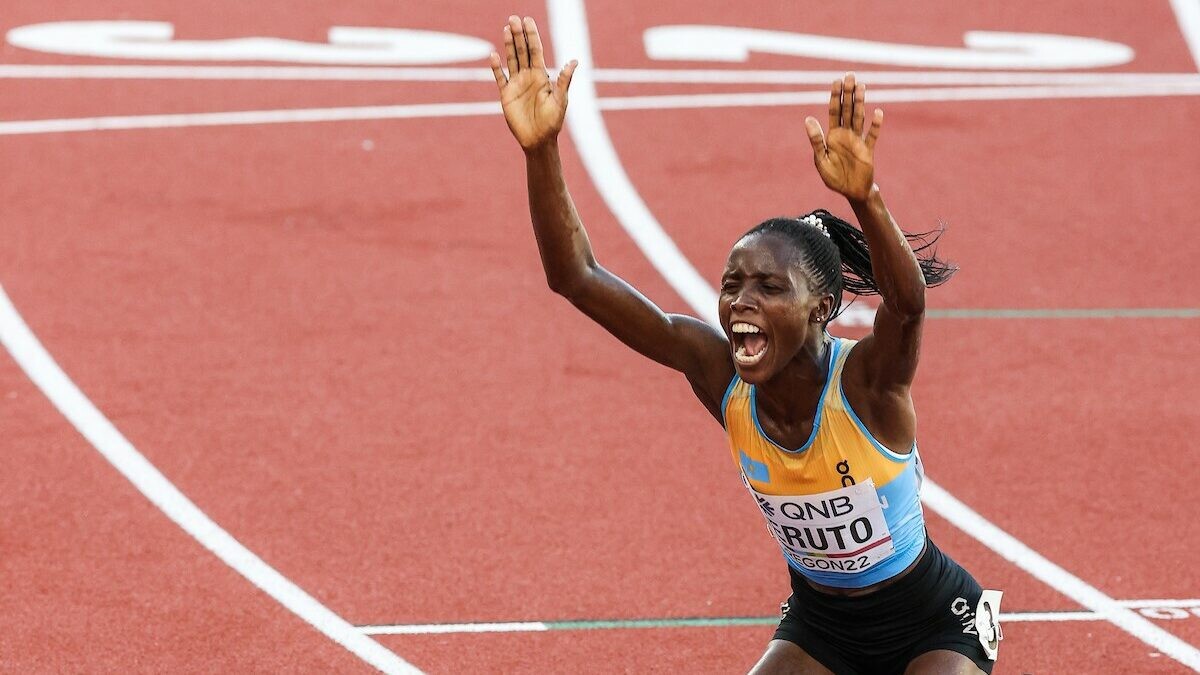
The profile for each athlete is generated based on statistics that utilize data from previous (given) samples to predict the individual’s performance limits or range for future samples. According to the AIU, if any data from a test sample falls outside of the athlete’s range, it could be an indication of doping.
ABP data is usually used as evidence of doping during an anti-doping rule violation case.
Jeruto’s time of 8:53.02 is the third fastest women’s 3,000m steeplechase in history behind her former compatriot, world record holder Beatrice Chepkoech’s 8:44.32 from Monaco Diamond League in 2018.
The 27-year-old was born in Kenya, but switched allegiances to Kazakhstan before the 2020 Tokyo Olympics in hopes of selection. She received citizenship in January 2022.
by Marley Dickinson
Login to leave a comment
Peter Bol’s positive doping test revealed as “blunder” by Sports Integrity Australia
After two long months, the Peter Bol EPO-doping saga has concluded. Two independent laboratories have cleared the Australian 800m runner of using the banned substance, noting a “catastrophic blunder” in testing from Sports Integrity Australia (SIA).
In January, the 29-year-old faced a four-year suspension after he returned a positive result for the banned substance erythropoietin (EPO) from a urine sample taken in October. Upon further investigation, according to Sports Integrity Australia, neither of Bol’s A nor B samples showed the presence of EPO in his urine: “Only naturally occurring, endogenous erythropoietin was present during both tests.”
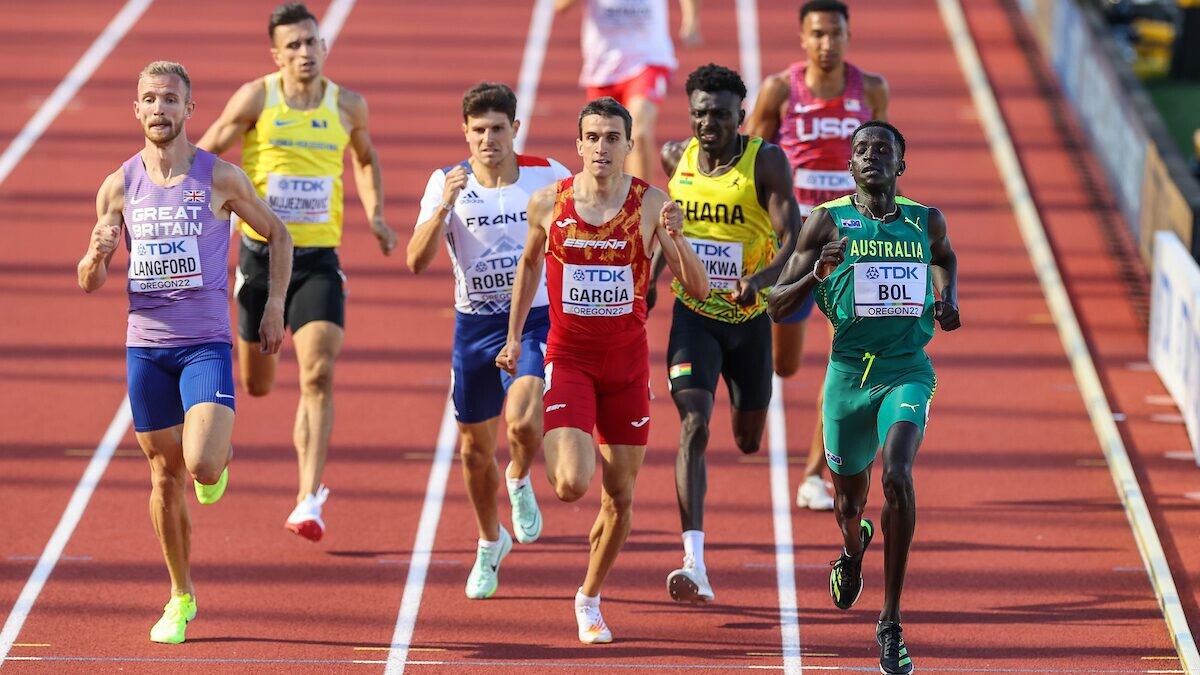
Bol said in an interview with Australia’s 9News that the entire process from the SIA was nothing but unfair to him. “To accuse me of doping without scientific proof… it’s tough, but deep down, I knew I was innocent,” said Bol.
He became a household name in Australia at the 2020 Tokyo Olympics after breaking two national records in qualifying to reach the men’s 800m final, where he finished fourth. At the 2022 Commonwealth Games in Birmingham, U.K., he won silver in the 800m behind Kenya’s Wyclife Kinyamal.
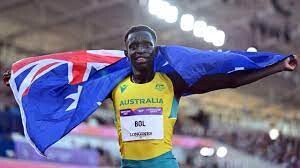
Pleading innocence
Bol hired a lawyer and throughout the process, stressed his innocence on social media, saying he would do whatever was necessary to clear his name. “I told everyone that I was innocent and asked everyone in Australia to believe me and let the process play out,” Bol wrote on Twitter.
Bol voluntarily handed over his laptop, iPad and phone to the SIA to help prove his innocence and paid $1,200 to have his B-sample tested.
Subjective testing
During the investigation process, a group of Norwegian scientists raised their doubts about Peter Bol’s positive A-sample, saying the testing for EPO by the World Anti-Doping Agency remains subjective, especially in cases such as Bol’s, which delivered a “borderline” positive result.
According to the Sydney Herald, his legal team sent a letter to SIA demanding an end to the investigation.
The letter includes two independent expert analyses of Bol’s sample from October last year “never showed the presence of any synthetic EPO” and that “inexperience and incompetence at the Australian Sports Drug Testing Laboratory (ASDTL) led to an incorrect determination” of his positive A-sample.
Last month, the SIA lifted Bol’s suspension, allowing him to return to training after the B-sample tested by the World Anti-Doping Authority (WADA) returned an atypical finding.
Bol said he does not intend to sue SIA for damages, although his legal costs are around $50,000.
“I want SIA to see this situation as an opportunity to improve,” he said to Sydney Herald. “Not me trying to fight them. We’ve been transparent the whole time. They should be the same. What my family has gone through should never happen, but it did happen, and we want people to be held accountable.”
by Marley Dickinson
Login to leave a comment
Iraqi sprint coach receives lifetime ban for drugging athlete
On Wednesday, the Athletics Integrity Unit (AIU) announced the lifetime ban of Iraqi national sprint coach Karokh Salih Mohammed for giving an athlete the prohibited substances stanozolol and clenbuterol without the athlete’s knowledge.
The athlete, Danah Hussein of Iraq, is a two-time Olympian, eight-time national sprint champion and the country’s record holder in the 100m (11.24) and 200m (22.51). Hussein was her country’s flag bearer at the London Olympics in 2012.
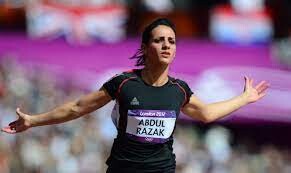
Hussein tested positive during an in-competition urine test following her gold medal-winning finish in the 100m final at the Arab Championships in Rades, Tunisia, on June 17, 2021. She qualified to represent Iraq at the 2020 Tokyo Olympics, but was forced to withdraw, due to a provisional doping suspension.
According to the report, Mohammed was advised by a friend of the benefits of using stanozolol and clenbuterol in combination to enhance an athlete’s performance and help them lose weight. He went ahead and purchased the drugs, knowing they were on the Prohibited Substances List.
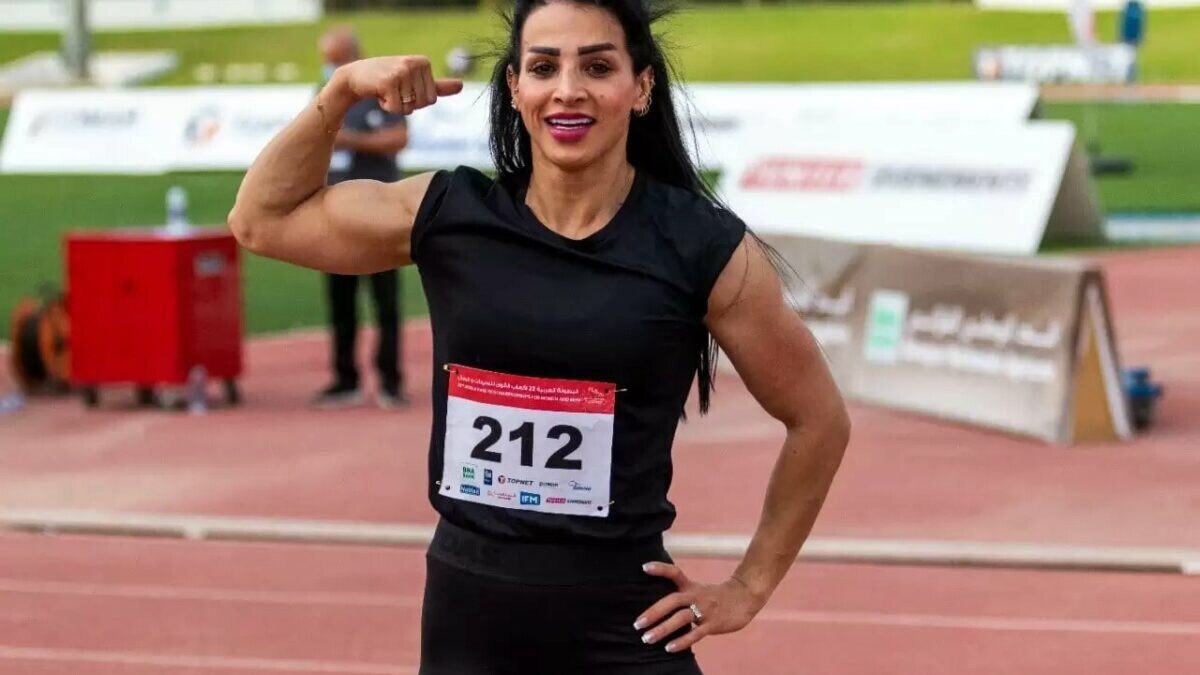
Mohammed said he had presented the pills to the athlete in a vitamin C container immediately before her race on June 17, telling her it was something that would relax her and help relieve pain.
The report says Mohammed was responsible for giving Hussein daily training doses for more than two years, as well as nutritional supplements and vitamins without the athlete’s knowledge of what she was taking.
Stanozolol and clenbuterol are both prohibited substances under the WADA 2021 Prohibited List.
“The coach has fundamentally abused his trusted position as an Athlete Support Person and admitted to deliberately opportunistic behaviour aimed specifically at doping an Athlete, without her knowledge, to enhance her performance and thereby his own reputation,” states the AIU.
Mohammed receives a lifetime period of ineligibility from the sport, while Hussein serves a three-year suspension effective from 16 July 2021.
by Marley Dickinson
Login to leave a comment
Bahrain's Eunice Chumba wins Adnoc Abu Dhabi Marathon in her fourth attempt, Kenyan Timothy Kiplagat takes the men’s title after starting the race as a pacemaker
Kenyan-born Bahraini athlete Eunice Chumba made her experience count as she won the elite women’s section of the Adnoc Abu Dhabi Marathon on Saturday.
She clocked 2 hour 20 minutes and 41 seconds, just outside her personal best 2:20:02, to clinch the top prize.
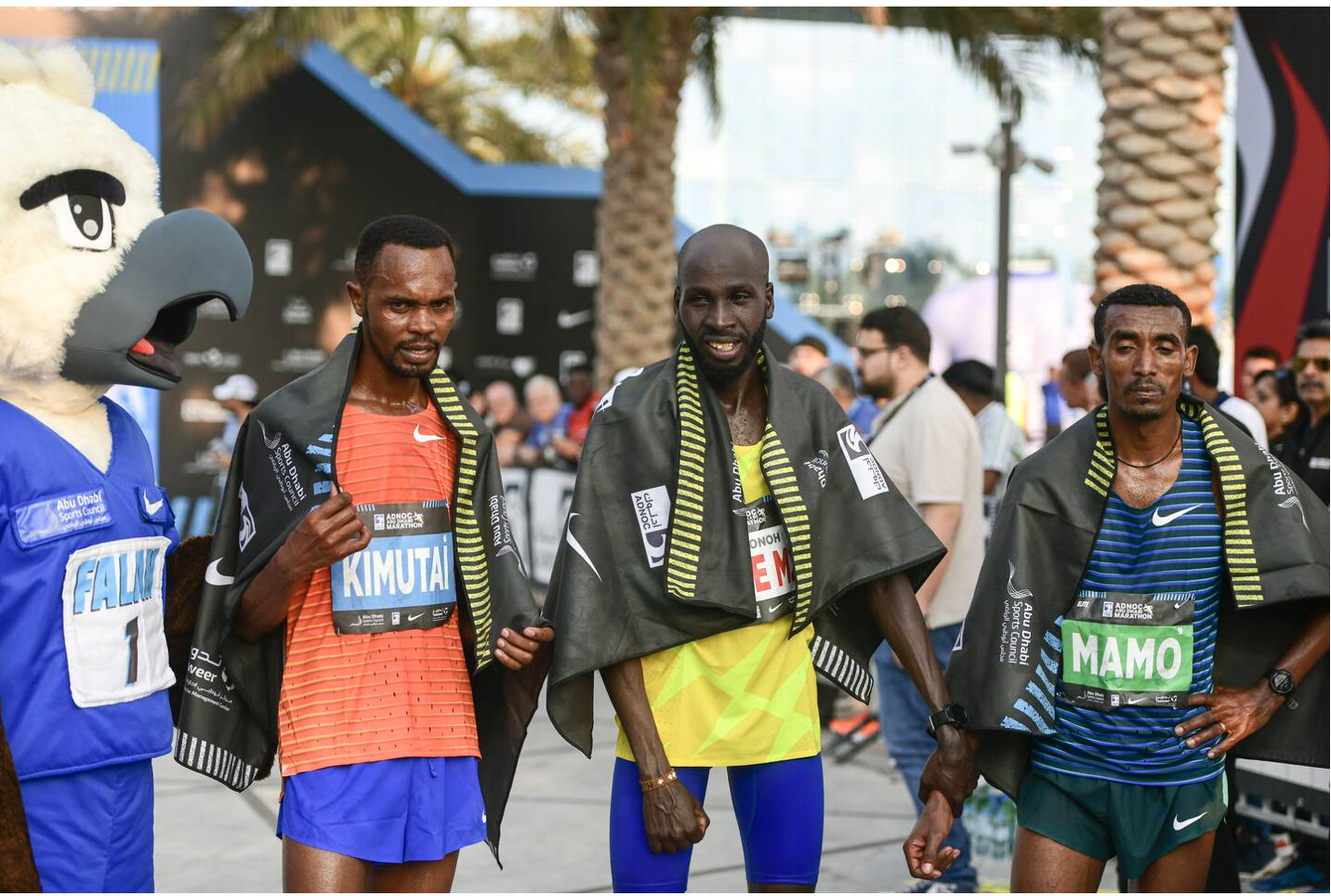
Chumba changed gears in the final two kilometres to beat Kenya's Angela Tanui (2:21:14). Mare Dibaba (2:21:25) of Ethiopia was third.
In the men’s race, Kenyan Timothy Kiplagat ran the race of his life after starting as a pacemaker to become the fourth man to win the Adnoc Abu Dhabi Marathon.
Kiplagat crossed the winning line in a personal best 2:05:20, nearly four minutes ahead of compatriot Felix Kimutai and Ethiopian Adeladhew Mamo, who was a further 10 seconds down in third.
Chumba, 29, was runner-up in the inaugural Abu Dhabi Marathon in 2018 and was fourth in 2019. She was runner-up again last year after the 2020 event was cancelled following the Covid-19 outbreak.
It was a festive atmosphere in the UAE capital as the fourth edition of the Abu Dhabi Marathon drew more than 20,000 runners in various categories - elite marathon, marathon relay, 10k run, 5k run, 2.5k 'Fun Run' and wheelchair race.
“I tried to win this race for Bahrain from my first visit to Abu Dhabi and I have finally managed to fulfil that dream in my fourth attempt,” Chumba told The National.“It was a very challenging race with Angela and Mare, who have both run better than my personal best time. We raced together for a long time and it wasn’t until the final five kilometres of the race I felt I could win.
“I tried my best to better my personal best time but just couldn’t do that. Perhaps on another day and another race. Having said that, I’m just delighted to win in Abu Dhabi.”
Chumba won a silver medal for Bahrain in 10,000m at the 2018 Jakarta Asian Games and ran a creditable seventh at the 2020 Tokyo Olympics.
“Yes, 2024 Paris is very much on my radar,” she said of her plans.
“This year was fantastic and it certainly was a nice way to end the year. I’m going to take a small break and be back in training from January, and hopefully return to defend my title in Abu Dhabi.”
Kiplagat, 25, bettered his previous personal best time of 2:07:01, set at the Marathon Eindhovan in October 2021. He arrived in Abu Dhabi on the back of winning the Melbourne Marathon in October.
“I felt so good today, setting the pace and with nobody to challenge towards the finish. This was a great opportunity to win a race,” Kiplagat said.
“It was my first time in Abu Dhabi and what a wonderful day it has been for me. The race route was flat and fast, the weather was pretty ideal. It was one of those days when everything turned out to be beautiful for me.”
The Relay Marathon was won by the Irish pair Michelle Nagle and Niall McCarthy of Slainte Endurance in 2:58.53.
Anouar El Ghouz (29.09) led the first four home for Morocco in the men’s 10km race while Briton Eilish McCologan (31.44) took the women’s race.
Joren Selleslaghs of Belgium took the men’s 5km run while Egyptian Sara Salama won the women’s prize. UAE's Badr Al Hosani bagged the men’s wheelchair title.
Login to leave a comment
ADNOC Abu Dhabi Marathon
The Abu Dhabi Marathon is shaping up to being first class marathon for both elite runners and average runners as well. Take in the finest aspects of Abu Dhabi's heritage, modern landmarks and the waters of the Arabian Gulf, at this world-class athletics event, set against the backdrop of the Capital's stunning architecture.The race offered runners of all abilities the...
more...Coros introduces limited-edition Molly Seidel watch
The endurance sports watch company Coros has released a limited Molly Seidel edition of the Pace 2, which celebrates the Olympic bronze medallist’s achievements and captures her unique and fun personality.
The design of this special edition watch was a collaborative process with Seidel and her team, and features colors to represent her: two shades of green (her favorite color–a vibrant green to match her Puma race kit, and a more earthy green as a nod to the environment).
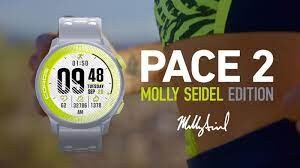
Seidel’s limited edition Pace 2 comes with two watch bands: a green silicone band and an extra nylon band with Seidel’s famous “full send” catchphrase after she won bronze in the marathon at the 2020 Tokyo Olympics.
The watch also comes with a scannable QR code to a custom 12-week marathon training plan created by COROS, Seidel and her coach, Jon Green of Verde Track Club in Flagstaff.
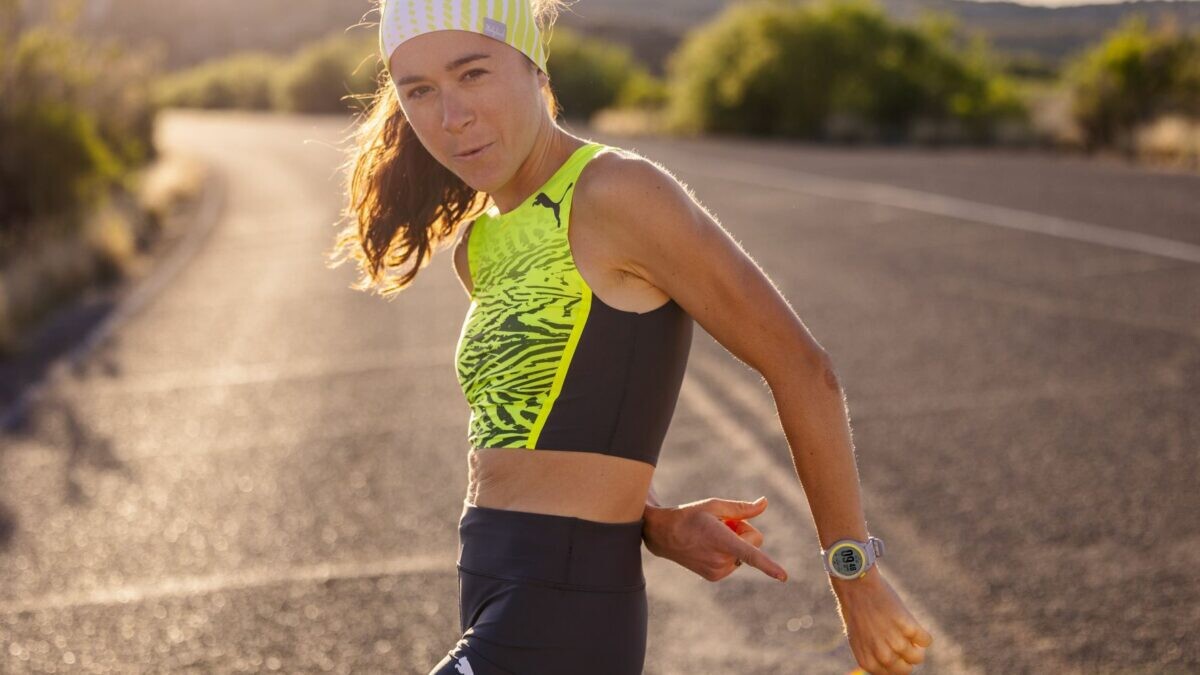
Seidel was using a Coros watch before she signed on as an official athlete for the brand. When she won her Olympic bronze, Seidel wore the Coros Apex, and made headlines as her bronze-medal-winning marathon quickly became the most kudo’d women’s activity on Strava. In November 2021, she officially signed on as a Coros athlete and was the top American at the 2021 New York City Marathon, where she wore the lighter-weight Coros Pace 2.
The Pace 2 is an excellent watch for anyone who likes to walk, run or cycle daily and wants to understand the simple statistics around their exercise. The watch also has everything you need for serious training, with stellar 30-hour GPS battery life and easy-to-understand metrics and statistics.
“This watch is Molly, and it represents all aspects of her personality, from her grit and determination to her youthful energy,” said Dan Suher, Director, Global Sales at Coros. “It is an honor to celebrate everything she has already accomplished in her career and know how much is still to come.”
The Coros Pace 2 Molly Seidel edition is available now on Coros.ca and through select running specialty retailers with a retail price of CAD $349.00.
by Running Magazine
Login to leave a comment
Natasha Wodak smashed Canadian marathon record in Berlin
The 40-year-old from North Vancouver, B.C., who grew to love training for the marathon, shattered the Canadian record in that distance in Berlin on Sunday.
Wodak finished 12th at the Berlin Marathon in two hours 23 minutes 12 seconds, lowering Malindi Elmore's record of 2:24.50 set in 2020.
Wodak, who was 13th in the marathon at the 2020 Tokyo Olympics, was a 10,000-metre specialist on the track for the better part of a decade, and said she didn't enjoy her first marathon experience in 2013.
"I was kind of like 'I don't know how much I want to do this,'" Wodak said.
"But as I've gotten older, and become a more disciplined runner, and I'm in a better place in my life, I really enjoy the training. And I've had a lot of fun with every marathon build, and challenging myself. Because it's new, right? The move to the marathon was a lot of fun, doing new training and challenging myself, and I really enjoyed it. And I think that's a huge part of why I've been successful, is because I really liked the training."
Ethiopia's Tigist Assefa won Sunday's race in 2:15.37. Two-time Olympic champion Eliud Kipchoge of Kenya broke his own men's marathon world record to win the men's race in 2:01.09.
Wodak, who is coached by Trent Stellingwerff, said her recent training indicated she could run 2:24.
On Sunday, she ramped up the pace over the 42.195-kilometre course. Her second half was more than a minute faster than her first.
"I knew at 35K, because we had significantly dropped the pace through the last 5K, that we were well under Canadian record pace," Wodak said, moments before sitting down to a celebratory drink with her family.
"I had a pacer, and he just was like, ‘Let's go, let's go.’ And I just kept on him. I was tired over the last 5K, I was working really, really hard. But I knew that was just because we were running fast.
"I didn't think that I could do 24.12 . . . when I saw that time at the finish line, I was like, 'oh, wow, what?'"
Wodak's record comes amid a surge in Canadian women's distance running.
The Canadian record has dropped five minutes in the past nine years, although Wodak noted the huge improvements in shoe technology have seen distance running times plummet across the board in recent years.
Still, Elmore was ninth in the Tokyo Olympics, and the battle between the Canadian women to make that team was fierce.
"It's really exciting to be a part of women's distance running right now," said Wodak. "We just sort of are feeding off of each other. If Malindi hadn't run 2:24.50, I don't know if I would have set my goal to run 2:24 flat.
"So now Malindi is going to go run Toronto (Waterfront Marathon on Oct. 16), and she's gonna be like, 'OK, I want to run sub-2:23.' We just keep lowering the bar and it’s great when we all build each other up. She wished me good luck (Saturday) and said, 'I hope you have an amazing race.' That's a really cool run community to be a part of when we all support each other."
Elmore tweeted on Sunday, "Congrats Natasha! Huge impressive run today!"
Wodak planned to vacation in Germany with her family. She doesn't plan to race for awhile, and is considering competing in the Canadian cross-country championship Nov. 26 in Ottawa.
Login to leave a comment
BMW Berlin Marathon
The story of the BERLIN-MARATHON is a story of the development of road running. When the first BERLIN-MARATHON was started on 13th October 1974 on a minor road next to the stadium of the organisers‘ club SC Charlottenburg Berlin 286 athletes had entered. The first winners were runners from Berlin: Günter Hallas (2:44:53), who still runs the BERLIN-MARATHON today, and...
more...The new 2023 World Championships entry standards are wild
On Thursday evening, World Athletics published the entry standards for the 2023 World Athletics Championships in Budapest. The time athletes are required to run for automatic qualification is faster than ever.
The championship will run later in the year than in 2022, from Aug. 19 to Aug. 27, 2023. Although these standards mean automatic qualification, there are still ways to qualify through a confusing qualification system that the World Athletics implemented for the World Championships in 2019. If an athlete is highly ranked in their respective event but has not run the standard, the athlete is still eligible for nomination by their national governing body.
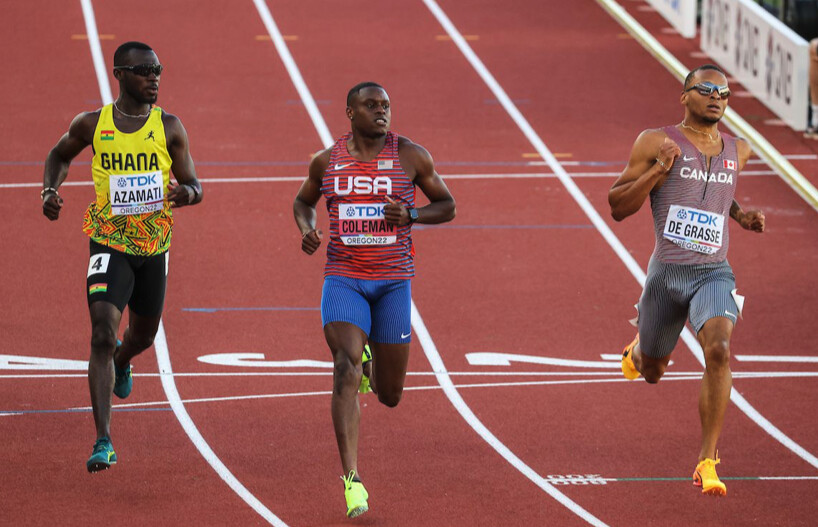
For the first time ever, the mile – both in-stadium and road mile – will now be a qualifying event for the 1500m, while performances achieved on the road in the 5K and 10K will now be eligible for qualification in the 5,000m and 10,000m, respectively. In addition, the top eight athletes in the world cross country rankings not otherwise qualified through other pathways will be considered qualified for the 10,000m.
The 2023 championships will be held in the National Athletics Centre in Budapest, which is currently under construction, and will have a capacity of 36,000.
The 2022 championship standards were similar, but some events have gotten a lot quicker. Most notably, the men’s 800m, 100m, 5,000m and marathon standards have become more challenging, along with the women’s 3,000m steeplechase, 1,500m and 10,000m. The 2022 standards are below.
Due to the postponement of the 2022 World Championships and the 2020 Tokyo Olympics, athletes now have five years of straight major games, with Budapest 2023, the Paris Olympics in 2024 and the Tokyo world championships 2025 on the horizon.
by Running magazine
Login to leave a comment
Five high school boys have combined to break the four-minute barrier seven times in 2022 and no one has enjoyed it more than Jim Ryun
Jim Ryun was the first high school boy to break the four-minute barrier in the mile as a Kansas 17-year-old in 1964 and went on to a legendary track and field career that included three Olympic appearances in the 1,500m, a silver medal in the 1968 Mexico City Olympics, and numerous American and world records.
Ryun’s name always surfaces when a high schooler dips under 4 minutes in the mile. And in 2022, his name has been coming up a lot.
Ryun’s career was also in the spotlight earlier this month when he was one of 30 former college track and field athletes inducted into the inaugural class of the USTFCCCA’s Athlete Hall of Fame in conjunction with the NCAA Championships in Eugene, Ore.
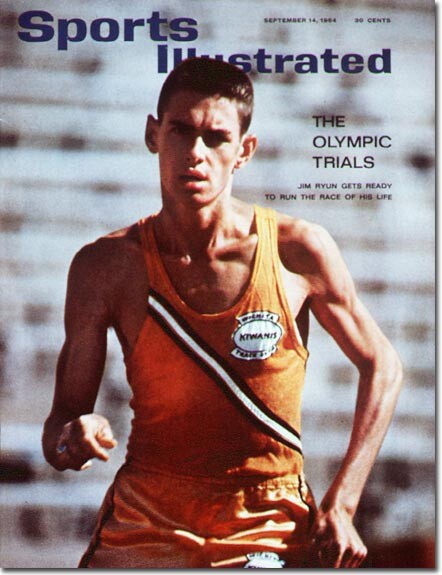
The original 4-minute high school barrier breaker celebrates the resurgence of American high school distance running and says for too long runners were held back in fear of what would happen if they ran under 4 minutes for the mile.
“I think they realize it’s not a barrier that can’t be broken, it’s more of a matter that if you break it,” Ryun said, “will you go on from there, which you can because we’re seeing more and more of them that are doing that.
“It’s not the barrier that it once was, should never have been there. For a long time, there were three of us. Myself, Marty Liquori and Tim Danielson. We were the only (sub) 4-minute milers from high school for years and I think it was the result of people being afraid of that, and coaches saying if you run too fast, too soon you’ll never make it very far.”
Growing up, Ryun often wondered if he would ever be successful in an athletic endeavor. He tried basketball and football and was cut from his church baseball team. At a high school assembly, Bob Timmons, the school’s track and field and cross country coach, encouraged students to run on his cross country team in the fall.
Ryun had never run more than one lap around a track before joining the cross country team, but in one season at Wichita East High School, he went from the last runner on the third-string team to a sixth-place finish at the Kansas state meet.
“Running was so new to me, I didn’t know who the heroes were,” Ryun recalled. “In fact, my first thought was I wanted to be a baseball, football, basketball player. Running, what’s that? So, it took a while. The first book Coach Timmons gave to me was about Emil Zatopek, the great Olympian, so I read that, and it began helping me understand about the sport.”
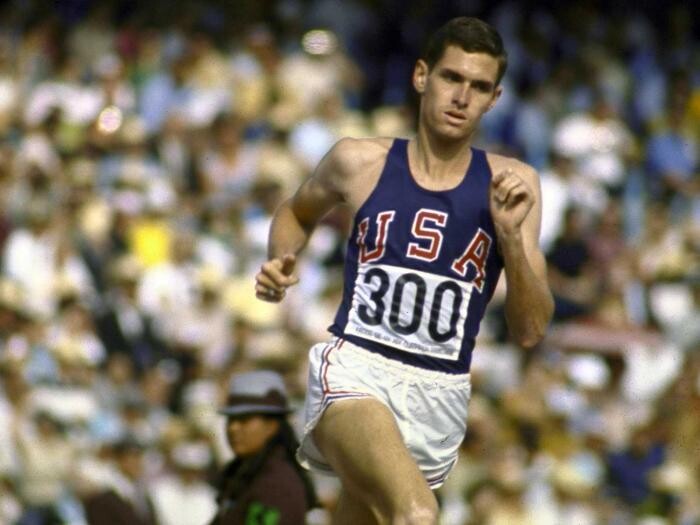
Ryun said Timmons was convinced he could be the first high school runner to break 4 minutes in the mile. That came true on June 5, 1964, when Ryun ran 3 minutes, 59.0 seconds to finish eighth at the Compton Invitational in Los Angeles.
“The goal originally was my coach’s because I was the kid that got cut from the church baseball team, didn’t have great talent and when I started running, I was looking for direction,” Ryun said. "And he began basically teaching me about goals, how to reach goals, and gave me workouts to get there. The night that I ran 4 minutes, 3:59.0, I didn’t sleep that night (before) because I realized that it was his goal.
“But my thought was, what happens if I take ownership, ownership being there’s certain things you as an athlete know you could do like maybe a little extra weightlifting, better eating. It was a transformational moment, because I mean when you finish eighth in a race and become the first kid to run under 4 minutes, that has to change your life – and it did.”
Ryun’s running career took off from there. He made the 1964 U.S. Olympic team in the 1,500m that went to Tokyo and was the last U.S. high school men’s track and field athlete to make the U.S. Olympic team until teenager Erriyon Knighton qualified for the 2020 Tokyo Olympics in the 200m and finished fourth there.
As a high school senior, Ryun broke 4 minutes four more times. His time of 3:58.3 at the 1965 Kansas state meet was the first time 4 minutes was broken in a high school-only meet. On June 4, 1965, Ryun returned to the Compton Relays, the site of his first sub-4-minute mile and ran 3:56.8. A little over three weeks later, he ran 3:55.3 at the U.S. AAU Championships in San Diego and beat New Zealand’s Peter Snell, the 1964 Olympic champion in the 800m and 1,500m.
Ryun, who would stay close to home and attend Kansas University after graduating from high school in 1965, roomed with a former Jayhawks great, Billy Mills, during U.S. training camps leading up to the 1964 Olympics. In Tokyo, Mills stunned the world by becoming the only U.S. athlete to ever win the Olympic 10,000m.
In 1966, Tim Danielson became the second American high schooler to break 4 minutes when he ran 3:59.4. A year later, Marty Liquori ran 3:59.8 to become the third high schooler under 4 minutes.
Ryun and Liquori had illustrious careers after high school, particularly Ryun. At age 19 in 1966, Ryun set two world records, first in the 800m (1:44.9), and then the mile (3:51.3). He was the NCAA indoor mile champion for Kansas in 1967, 1968 and 1969, and the 1967 outdoor NCAA mile champion. In 1967, he set a 1,500m world record of 3:33.1 that stood for seven years.
That same year, he lowered his mile world record to 3:51.1., a mark that stood for almost eight years. Ryun was the last American man to hold the mile world record. He still holds American junior records for the mile (3:51.3) and 2-mile (8:25.1), and his 800m American junior record of 1:44.9 stood for exactly 50 years.
In 2003, ESPN.com ranked Ryun as the greatest U.S. high school athlete of the 20th century, ahead of Tiger Woods, LeBron James, Lew Alcindor (now Kareem Abdul-Jabbar), Wilt Chamberlain, Marion Jones, and others.
After Ryun, Danielson, and Liquori, the 4-minute mile wasn’t broken by a prep athlete again for more than 32 years until Alan Webb ran 3:59.86 at the New Balance Games in New York on Jan. 20, 2001. Sensing something special in Webb, the promoters of the Prefontaine Classic in Eugene, Ore., invited him to run in the Bowerman Mile, the signature event of the meet that has since become a Diamond League event, on May 27, 2001.
Morocco’s Hicham El Guerrouj, still the world record-holder in the 1,500m and mile, won the event in 3:49.92, followed by Kevin Sullivan of Canada and Bernard Lagat, then of Kenya, who later ran for the U.S. They helped pull Webb to a fifth-place finish in 3:53.43, breaking Ryun’s 36-year-old high school record.
“I thought he would. I just didn’t know how much he would break it by," Ryun said. “It was one of those moments in time where he had run well, but he needed somebody to help him get over that finish line, just as I did running under 4 minutes for the first time. You need someone to help set the pace. You can relax a little bit, and he was able to take advantage of that.
“So, there was no real surprise to me. The biggest surprise was that there weren’t more high school boys running under 4 minutes.”
It would be another 10 years before a high schooler would break 4 minutes in the mile. In 2015, Matthew Maton and Grant Fisher, now the U.S. record-holder in the men’s 10,000m, both ran 3:59.38 about one month apart. In 2016, two runners broke 4 minutes, including Drew Hunter, who did it twice in a 15-day span in February indoors, both times in New York.
The 4-minute barrier was broken by high schoolers once in 2017 and again in 2020 during the height of the COVID-19 pandemic. In 2021, Hobbs Kessler ran the fastest high school mile since Webb when he ran 3:57.66 indoors. Kessler later that year broke Ryun’s 1,500m American junior record of 3:36.1 that stood for almost 55 years.
The lack of American high school runners breaking 4 minutes in the mile for decades might be a big reason why U.S. men haven’t enjoyed much Olympic or international success until recently. When Matthew Centrowitz won the men’s 1,500m at the 2016 Rio de Janeiro Olympics, he was the first American man to do so since 1908. At the same Olympics, Clayton Murphy won the bronze medal in the 800m, the first American man to medal in the event since 1992.
And when the World Athletics Championships are hosted on U.S. soil for the first time next month in Eugene, Ore., the defending 800m men’s champion is American Donavan Brazier.
“If you look back in history, you’d see there was a dominance maybe by a country for a time like Great Britain had all those great runners. America at one time was dominant in that area as well,” Ryun said. “So, I think it’s a matter of floating from place to place, and I think it comes down to motivation. How motivated are you?
“Over time you start realizing that motivation has to come down to you be willing to get up, run in all kinds of weather, race all over the world and let those talents be developed that God’s given you. So, it takes time. I think America can come back with dominance, but it also comes down to how motivated you are. I see the Kenyans as very motivated, and America can be just as motivated as you see with these new young runners that are developing quickly.”
That has proven to be the case this season. Seventeen high school runners have broken the 4-minute barrier, and 2022 has been the banner season for it so far with five runners breaking the mark seven times.
“I think a lot of coaches are seeing, too, that kids are just developing a lot faster doesn’t mean you’re going to burn out,” Ryun said. “It means you’ve got great opportunities. Will you decide to keep it going and, in my case, will you take ownership? The coach can only take you so far, but then you have to establish ownership.”
The owner of the fastest prep mile this year is Colin Sahlman, who ran 3:58.81 indoors in February, and, like Webb, was invited to the Bowerman Mile at the Prefontaine Classic. In a field that included 2020 Tokyo Olympic 1,500m gold medalist Jackob Ingebrigtsen, defending World Athletics Championships 1,500m gold medalist Timothy Cheruiyot, and defending 1,500m NCAA outdoor champion Cole Hocker, Sahlman finished 13th in 3:56.24. Of the 14 men who finished the race, seven set personal bests and seven set season bests, including Ingebrigtsen, whose time of 3:49.76 is the fastest in the world this year.
Sahlman’s time moved him to third on the all-time prep list behind Webb and Ryun. Sahlman, who is headed to Northern Arizona University for college, was part of a high school powerhouse at Newbury Park High in Southern California. In 2021, Newbury Park became the first high school team to have four runners break 4:10 for the mile in the same season.
“That mindset has really evolved and developed over these last three to four years,” Sahlman said in a March article in the Los Angeles Times. “It’s just like it’s transformed into something that we never thought was possible. Now we think anything’s possible.”
Gary Martin has also broken 4 minutes twice this year, running 3:57.98 on May 14 and 3:57.89 on June 2 in the Festival of Miles in St. Louis. At the Festival of Miles, Connor Burns ran 3:58.83 to become the first high school junior since Ryun to break 4 minutes. It was also the first time two prep runners broke 4 minutes in the same race.
Those two performances gave the Festival of Miles four prep runners who have broken 4 minutes. That’s where Fisher did in 2015, a feat repeated by Reed Brown a year later.
And one day after Martin and Burns broke 4 minutes, Rheinhardt Harrison ran 3:59.33 in Florida on June 3. On June 15, Simeon Birnbaum added to the list of sub-4 minute runners when he became the second high school junior this season to break the mark with a time of 3:59.51.
Will this high school running resurgence lead to greater U.S. success against international competition and major global championships? Only time will tell.
by Ashley Conklin (World Athletics)
Login to leave a comment
Team Kenya coach Janeth Jepkosgei hopeful of Kenya's chances in World Indoor event
Team Kenya coach Janeth Jepkosgei is confident that her young charges will win some medals for the country at the World Athletics Indoor Championships starting Friday at Štark Arena, Belgrade, Serbia.
The 38-year-old, who last competed for Kenya at the 2015 World Championships in Beijing, said that though she can’t predict the type of the medal they will get, something nice will come from the Balkans.
Jepkosgei is in a team of 10 athletes and six officials that was to left at 11.55pm on Tuesday aboard an Emirates flight for the three-day championships.
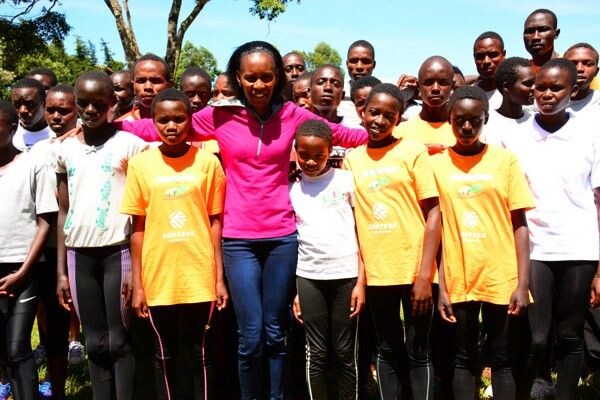
“You can tell from their body language in training that they are hungry for results. They are simply happy free souls,” said Jepkosgei, the 2007 World 800m champion and 2008 Beijing Olympics 800m silver medallist.
Though a different experience virtually for all the members, this being an indoor championship event, Jepkosgei said that she has instilled the essence of being courageous and tough at that particular stage.
“They need not to be scared and should fight to the finishing tape,” said Jepkosgei, who described her team as Kenya’s future stars.
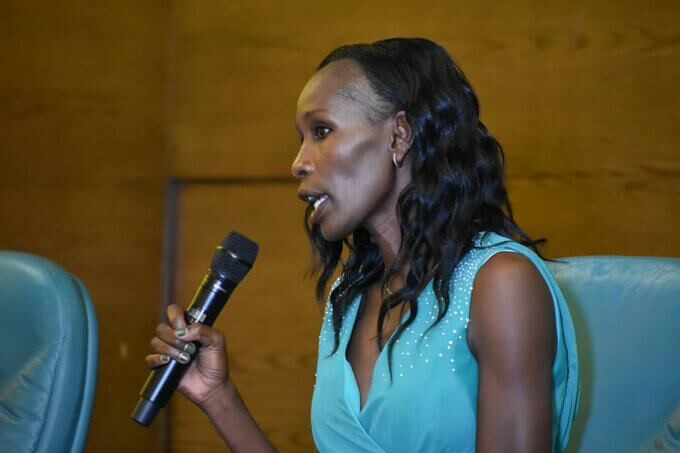
“I have told them that they have a long and bright future ahead, hence being in the team should motivate them. They deserve to represent Kenya, “explained Jepkosgei, who is indebted to Athletics Kenya for giving her a chance to handle the national team for the first time.
“This is another responsibility and stage in my athletics career after having hang up my spikes from competitive running back in 2015. I am happy but I am in the process of learning,” said Jepkosgei.
Kenya only won one medal- bronze by Bethwell Birgen in men’s 3,000m-from the last 2018 World Athletics Indoor Championships in Birmingham, United Kingdom.
The last time Kenya won gold in the men’s event was in 2014 in Sopot, Poland where Caleb Mwangangi reigned supreme in the 3,000m.
Hellen Obiri (3,000m) and Pamela Jelimo (800m) won last for the country in 2012 Istanbul, Turkey.
Team captain and Africa’s 100m record holder, Ferdinand Omanyala and his teammates have promised a good show with the sprinter targeting a sub 6.57 seconds in the men’s 60m.
The 2018 World Under-20 5,000m champion Beatrice Chebet is eyeing a podium place in the women’s 3,000m alongside Collins Kipruto in the men’s 800m.
Kipruto will partner with World Under-20 800m bronze medallist Noah Kibet in the 800m event.
Chebet, 22, said she is eager to emulate Obiri on her maiden major tour as a senior in the women’s 3,000m where she will team up with prodigy Edinah Jebitok.
Jebitok, who competed at the 2020 Tokyo Olympic Games, will also double up in the 1,500m.
World Relay 2x2x400m silver medalist Naomi Korir makes the women’s 800m team that also has Eglay Nalianya.
Abel Kipsang, who represented Kenya at the 2020 Tokyo Olympics, is a lone ranger in men’s 1,500m, while Jacob Kiprop and Daniel Simiu will battle in the men's 3,000m.
by Ayumba Ayodi
Login to leave a comment
World Athletics Indoor Championships
World-Class Competition Lands in China: 2025 World Athletics Championships The global spotlight shines on China as it hosts the 2025 World Athletics Championships, bringing together the planet’s most elite runners, jumpers, and throwers. This prestigious event, organized by World Athletics, represents the pinnacle of track and field competition—where national pride, personal records, and world titles are on the line. ...
more...Africa’s 100m record holder Ferdinand Omanyala will lead Kenya's team of 10 athletes and six officials to the World Indoor Championships
Ferdinand Omanyala will lead Kenya's team of 10 athletes and six officials to the World Indoor Championships set for March 18-20 this year in Belgrade, Serbia.
The team, coached by 2017 World 800m champion Janeth Jepkosgei, will leave the country on March 16.
Athletics Kenya Director for Youth and Development, Barnaba Korir disclosed that Omanyala will take the blocks in the 60m event, while 2018 World Under-20 5,000m champion Beatrice Chebet will compete in the women’s 3,000m.
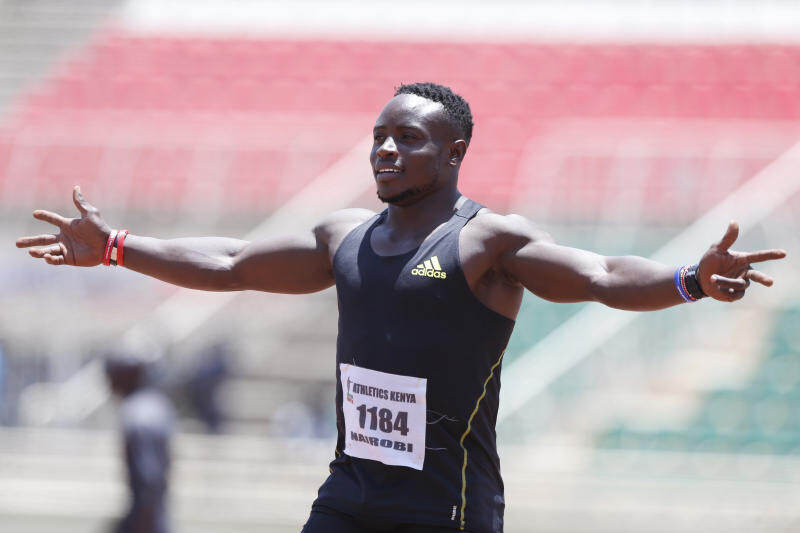
Chebet will team up with fast-rising Edinah Jebitok, who will also double up in the 1,500m.
World Relay 2x2x400m silver medalist Naomi Korir makes the women’s 800m team alongside Eglay Nalianya.
Abel Kipsang, who represented Kenya at the 2020 Tokyo Olympics, is the lone ranger in the men’s 1,500m, while Collins Kipruto, who has won several races at the World Indoor Tour, will fly the country’s flag in the men’s 800m, alongside World Under-20 800m bronze medallist Noah Kibet.
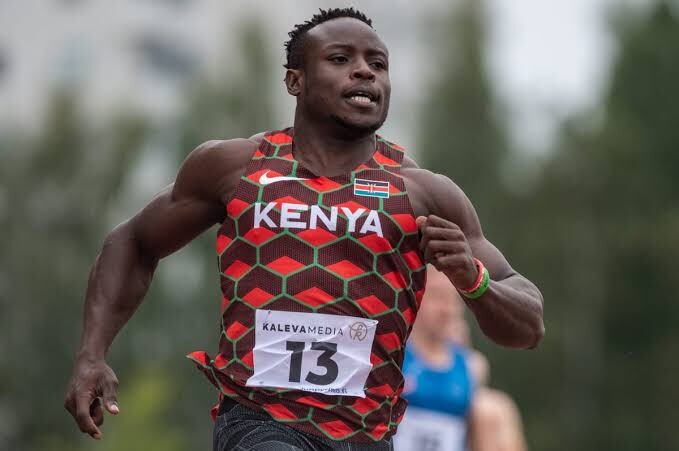
Jacob Kiprop and Daniel Simiu will battle it out in the men's 3,000m.
After a series of breathtaking performances at the World Indoor Tour where he broke the national record in 60m thrice, Omanyala will be hoping to reach the final.
Omanyala, who holds the Africa Record in 100m outdoor of 9.77sec, broke the national record in 60m indoor for the first time on February 4 this year when he won at Meeting Elite de Miramas in France.
He glided to 6.63 to shatter the previous National Record of 6.70 set by Paulvince Obuon in 2005.
Omanyala had won his semi-final heat in Lievin 6.63 before losing to Olympic 100m champion Jacobs Marcell from Italy, who won in 6.50.
He then bettered the National Record for the second time when winning in 6.60m at Meeting Metz Monselle Athlelor in France on February 12, before lowering it further to 6.57 when he finished fourth at the Meeting Hauts-de- France Pas-de-Calais on February 17 in Lievin, France.
Kipruto competed in five races at the World Indoor Tour where he won two of them.
Kipruto’s best showing was when he won the men's 800m race at Müller Indoor Grand Prix in a personal best of 1:45.39 at Utilita Arena Birmingham on February 19.
Kipruto had held off 17-year-old Kibet and Morocco’s Mostafa Smaili to claim victory in the men's 800m at the Meeting de l’Eure in Val-de-Reuil in a meeting record time of 1:47.05 on February 14 in France.
Nalianya has three wins from her indoor outing in European, but her best show came from Meeting Hauts-de- France Pas-de-Calais on February 17 in Lievin, where she finished third in a personal best of 2:00.26.
Her compatriot Korir has taken part in five races this season and managed a second place in three, which includes a personal best of 2:00.66 from Míting Internacional de Catalunya in Spain on February 8.
Team
Men:
Ferdinand Omanyala (60m), Collins Kipruto (800m), Noah Kibet (800), Abel kIpsang (1,500m), Jacob Krop (3,000m), Daniel Simiu (3,000m).
Women
Naomi Korir (800), Egpay Naliaka (800), Edinah Jebitok (1,500m, 3,000m), Beatrice Chebet (3,000m).
Officials
Barnaba Kitilit (team leader), Hassan Ahmed( technical leader), Janeth Jepkosgei (team coach), Francis Philomena (Doctor), Lydia Muraya (official), Irene Wamui (official).
by Ayumba Ayodi
Login to leave a comment
World Athletics Indoor Championships
World-Class Competition Lands in China: 2025 World Athletics Championships The global spotlight shines on China as it hosts the 2025 World Athletics Championships, bringing together the planet’s most elite runners, jumpers, and throwers. This prestigious event, organized by World Athletics, represents the pinnacle of track and field competition—where national pride, personal records, and world titles are on the line. ...
more...How to train like a Norwegian: norwegian endurance athletes have been dominating competitions around the world. What's their secret?
Norway has long been known for producing some of the world’s best cross-country skiers, but in recent years the small Nordic country has also been turning out several other world-class endurance athletes. Kristian Blummenfelt took home the gold in the men’s triathlon at the 2020 Tokyo Olympics, and of course, few runners are unfamiliar with the Ingebrigtsen brothers, led by Jakob Ingebrigtsen’s gold medal performance in the Olympic 1,500m final.
How are so many incredible athletes coming out of such a small country? Olympian, doctor, and coach Marius Bakken recently published a lengthy article about the Norwegian training system, and their approach may surprise you.
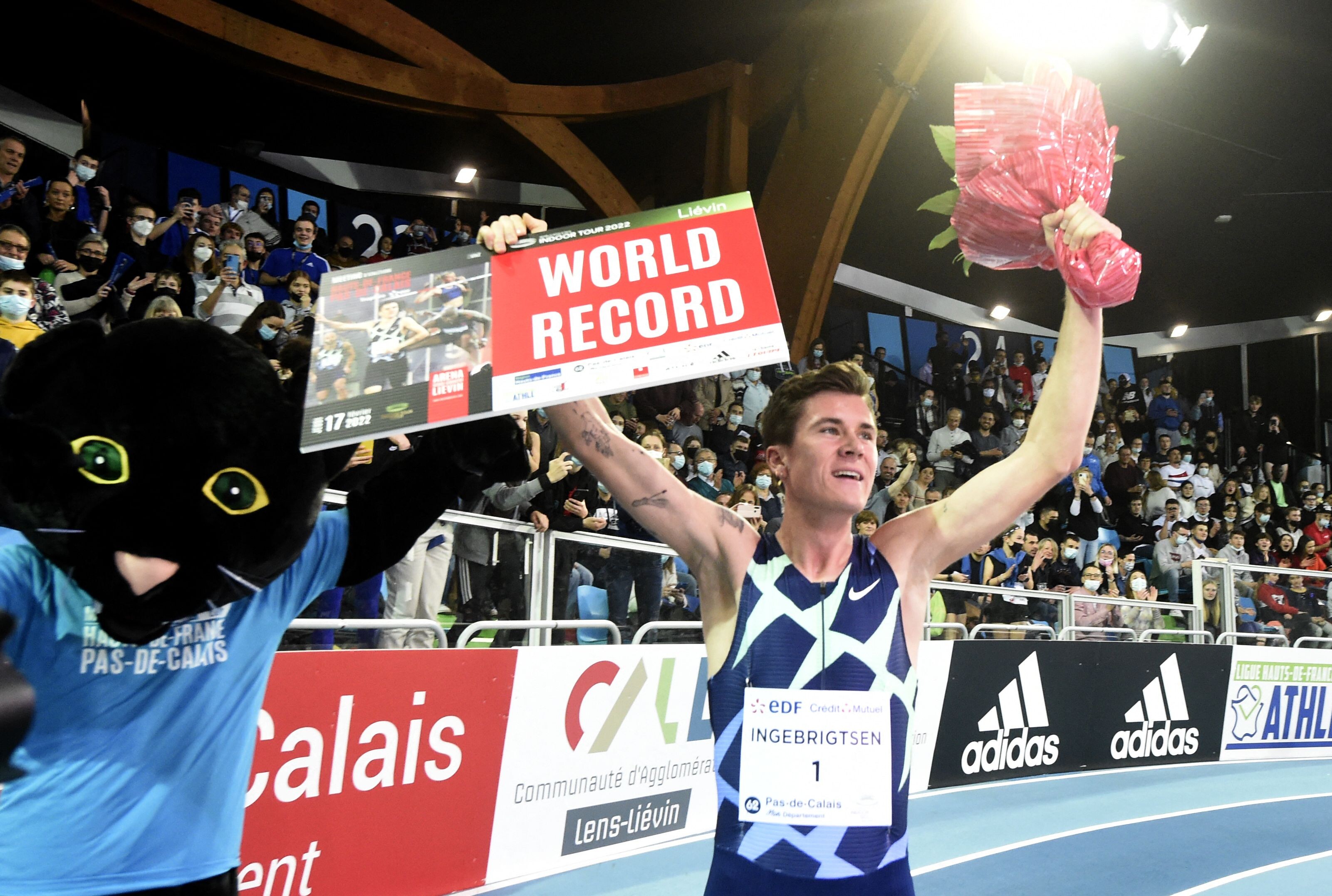
Before we get started
The article, which can be read in full here, is very lengthy and includes a tonne of detail. It is a bit heavy, so we’re going to pull out the main points to give you an overview so you can apply some of the Norwegian training principles to your own training.
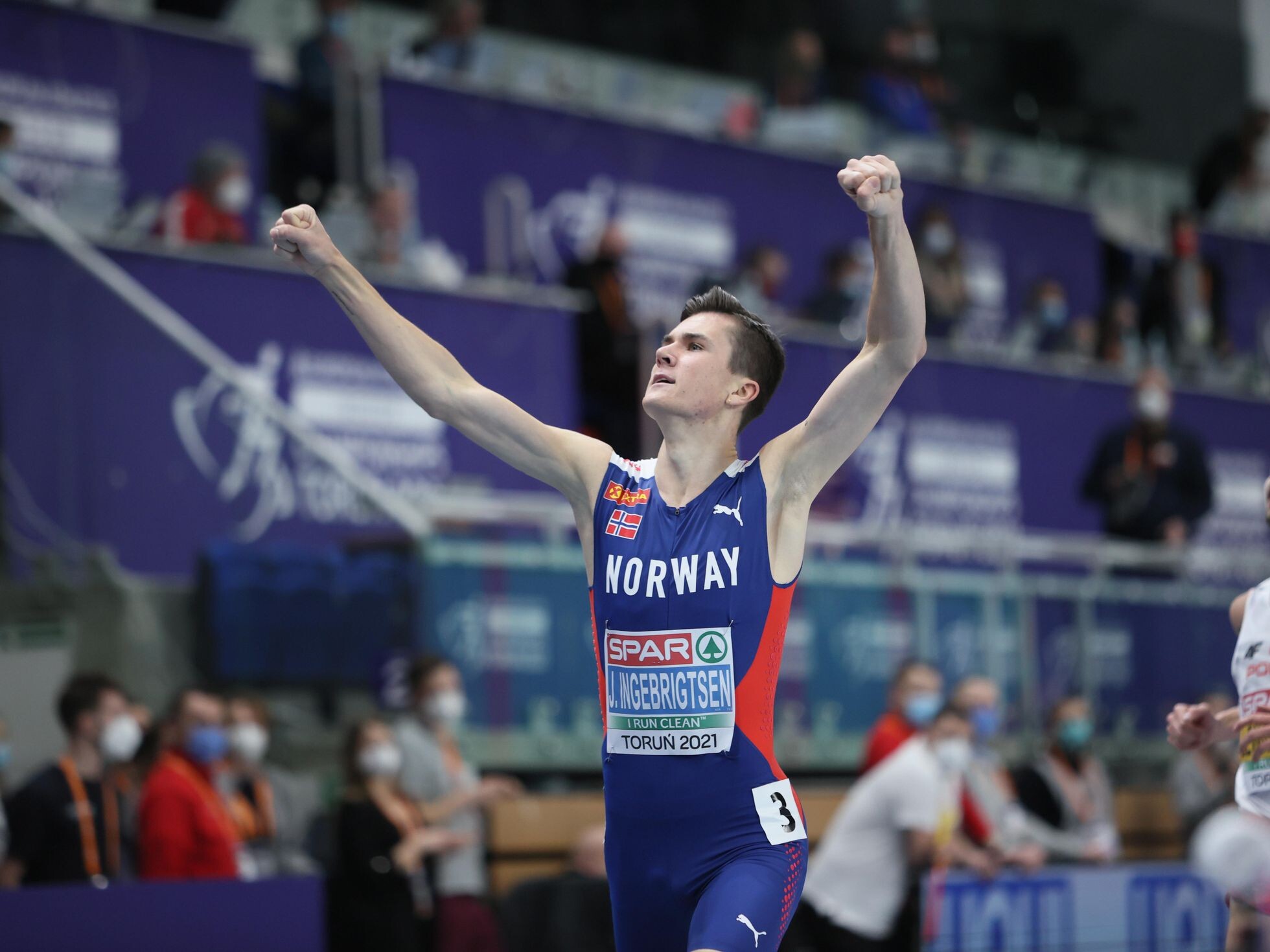
Before we do that, there are a few important things to keep in mind. The first is that these training principles have almost exclusively been tested on elite athletes, who are genetically different from the average runner. This doesn’t mean that none of these principles apply to recreational runners, but understand that your results may differ depending on your age, sex and experience.
With that in mind, here are the big takeaways from Bakken’s paper:
Controlled intensity + high volume = success
The Norwegian training model has athletes control their intensity by monitoring their lactate levels, with a large portion of their running volume done at an easy pace (or zone one, according to this study). The majority of their interval training is done at an intensity that is just below their lactate threshold (zone two), and a very small amount of their training is done at zone three (high intensity).
This is important because there are two factors that might cause you to slow down during a race or a hard effort: mechanical factors (your musculoskeletal, neuromuscular and biomechanical systems) and your aerobic system (your heart, lungs and cells). For many athletes, their aerobic system tends to be the limiting factor between the two.
This is where your lactate threshold comes in. Lactate is a by-product of glucose metabolism and energy production, and your body can re-cycle that lactate to be used to produce even more energy using a lactate-shuttling mechanism. When that mechanism is over-stressed, your lactate levels rise, you accumulate fatigue, and you have to slow down. Raising your lactate threshold (the point at which lactate begins to accumulate) can produce significant performance benefits.
This is the reason why the Norwegians focus the majority of their interval work at that lactate threshold zone. Could they go faster? Absolutely. But they would be missing out on the aerobic benefits. Of course, most recreational athletes don’t have the tools to monitor their lactate threshold, but you can keep yourself within that zone 2 range during an interval workout using effort-based cues, like running a pace you can maintain for an hour, running 15K or half-marathon pace or simply by avoiding that muscle-burning feeling (a sure-fire sign you’ve accumulated lactate).
Running at this pace also allows you to do a much greater volume of intervals (as long as you have the base to do so), which will ultimately improve performance.
A small amount of high-intensity work
As we mentioned above, the Norwegians don’t neglect high-intensity work altogether. In his description of the Norwegian training system, Bakken still includes top-end, high-intensity (zone 3) work, but it is primarily made up of fast strides and short hill repeats. This type of work will develop those mechanical factors mentioned earlier, which will improve your speed and power.
The Norwegian training approach operates on the principle that you don’t need a tonne of volume at that intensity to elicit the desired training effect. This is because, for most runners, the speed you can run will be largely dictated by your aerobic capacity.
The caveat to this, as explained in this article, is that younger athletes, or less-experienced athletes, may need to spend more time developing their speed at their VO2 max in order for this type of training to be effective. This may also be true for athletes who aren’t able to do a tonne of volume in their training, either because of injury issues or time constraints.
Double down
According to Bakken’s paper, one of the biggest differences between the Norwegian training model and other training models is the inclusion of days when the athlete does not one, but two threshold workouts. Of course, the concept of doubling (running once in the morning and then again in the afternoon/evening) is not new. In fact, it is a very commonplace practice for most elite runners. In most cases, though, the athlete will do one workout and one recovery run in the same day, not two workouts.
If doing two workouts in one day sounds outrageous to you, remember that both of these sessions are threshold workouts, so athletes are not running at their all-out max. When these workouts are run at the correct intensity, athletes don’t accumulate too much fatigue so they can turn around and do it again a few hours later. This allows them to do a greater volume of work than they could if they tried to do one big session.
This final point is when the Norwegian training approach becomes less approachable for the recreational runner. Most of us don’t have the time to do two workouts in one day, nor do we have the physical ability (it takes time to build up the capacity to do consistent double runs at an easy pace, let alone doing two workouts in one day).
The bottom line
While most of us won’t be (and shouldn’t be) doing doubles, there are still a number of valuable takeaways from Bakken’s paper.:
According to the Norwegian training principles, developing your aerobic system should be your highest priority as a distance runner. This means the majority of your workouts should be done at your lactate threshold pace, and shouldn’t leave you completely spent at the end. In other words, don’t race your workouts.
Developing speed is still important, but it should only make up a small part of your training program.
Always keep your easy days easy. Control is key.
by Brittany Hambleton
Login to leave a comment
Kenyans Hellen Obiri and Titus Ekiru added to star-studded RAK Half Marathon list
Kenya's two-time world 5,000m champion Helen Obiri and Titus Ekiru have been added to the 2022 Ras Al Khaimah Half Marathon field slated for February 19.
Obiri, who retired from the track after the Tokyo Olympics last year, has a personal best of 1:04.51 in the half marathon set in Istanbul in April last year. Obiri will have Olympic silver marathon medalist, Brigid Kosgei for company in what promises to be an entertaining race.
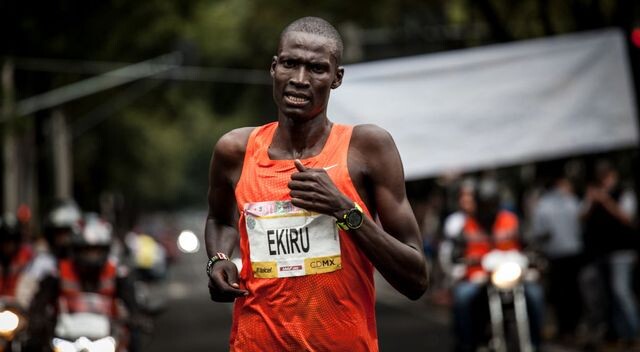
Kosgei is the world marathon record holder and a two-time London Marathon champion (2019 and 202). She was also runner up at the Ras Khaimah Marathon in the 2020 edition and has a personal best time of 1:04;49 in the 21km race.
Ekiru has fond memories of the UAE, having won the Abu Dhabi Marathon last year in 2:06:13.
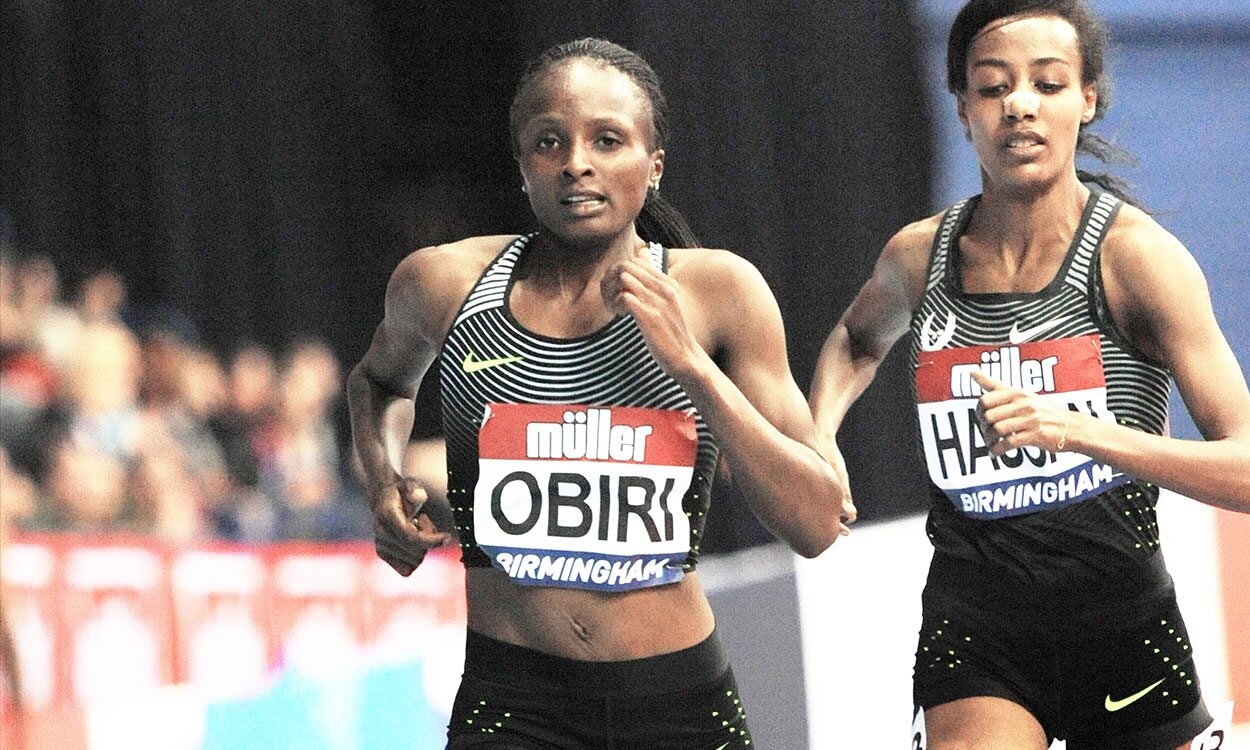
Joining Ekiru in a competitive field will be Abel Kipchumba, who famously secured the second-fastest time in the 2021 Half Marathon distance category, with an incredible personal best of 58:07.
However, Jacob Kiplimo, who had a spectacular season, will be the man to beat. He completed the 2021 Lisbon Half Marathon in a record-breaking time of 57:31.
The world half marathon record holder is expected to set a quick pace and deliver fierce competition in the men’s category. Kiplimo won the World Half Marathon in Gdynia, Poland in 2020 and a bronze medal in 10,00om at the 2020 Tokyo Olympics.
by William Njuguna
Login to leave a comment
Rak Half Marathon
The Rak Al Khaimah Half Marathon is the 'world's fastest half marathon' because if you take the top 10 fastest times recorded in RAK for men (and the same for women) and find the average (for each) and then do the same with the top ten fastest recorded times across all races (you can reference the IAAF for this), the...
more...Olympian Abdalelah Haroun dies at age 24 after car crash in Doha
Abdalelah Haroun, bronze medallist at the 2017 World Championships in London, has died aged 24. Qatar Athletics Federation chairman Mohammed Issa al-Fadala announced that he was killed in an incident in Doha, and mourned losing "a great hero". Haroun was seeking to qualify for the delayed Tokyo 2020 Olympics.
Qatari sprinter Abdalelah Haroun has died after a car crash in Doha, aged 24.
Haroun won the bronze medal in the 400m at the 2017 World Championships in London, and was seeking to qualify for the delayed 2020 Tokyo Olympics.
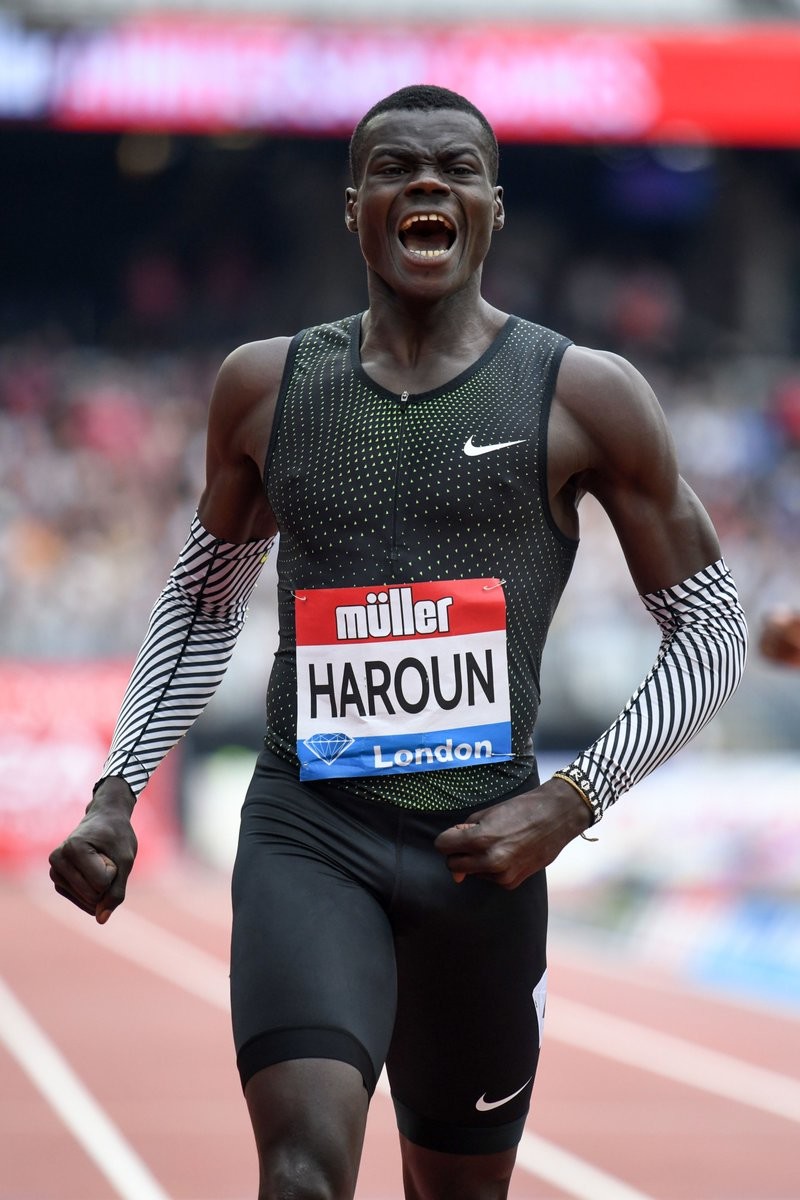
He also won silver in the 400m at the World Indoor Championships in 2016, and double gold in the 400m and 4x400m at the Asian Games in 2018.
"Qatar sports and athletics, on a global level, lost a great hero," said Qatar Athletics Federation chairman Mohammed Issa al-Fadala.
by Euro Sport UK
Login to leave a comment
Former Kansas track and field athlete Bryce Hoppel qualified for the 2020 Tokyo Olympics
Bruce Hoppel finished third in the men’s 800 meters with a time of 1:44.14 and secured a spot on the U.S. Olympic team for next month’s Olympics.
“I tried to give it everything I had,” Hoppel said in a post-race interview. “That wasn’t me out there. That was all my support, my family, my friends, my coaches, just everybody. I left it all out there. It’s incredible.”
While at Kansas, Hoppel dominated on the track, winning four Big 12 titles, including a sweep of the 800-meter title both indoors and outdoors during the 2019 season. Hoppel also collected five All-American honors and was a two-time National Champion. He also is the KU indoor school record holder in the 800 meters and the second-fastest in school history outdoors in the 800 meters.
Hoppel continued his success after leaving Kansas. He placed fourth at the 2019 IAAF World Indoor Championship in Doha, Qatar, and won the 2020 USA Indoor Championship. Also, in February, Hoppel set a new American record in the 1,000 meters at the New Balance Indoor Grand Prix in Boston.
The Tokyo Olympics will take place from Friday, July 23, to Sunday, August 8, 2021.
Login to leave a comment
Tokyo 2020 Olympic Games
Fifty-six years after having organized the Olympic Games, the Japanese capital will be hosting a Summer edition for the second time, originally scheduled from July 24 to August 9, 2020, the games were postponed due to coronavirus outbreak, the postponed Tokyo Olympics will be held from July 23 to August 8 in 2021, according to the International Olympic Committee decision. ...
more...

